




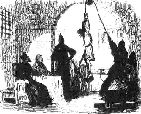

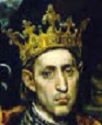


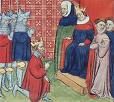



























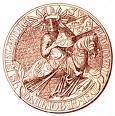
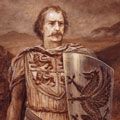




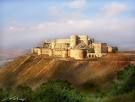


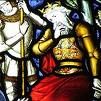
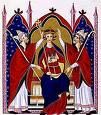


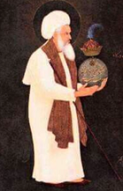
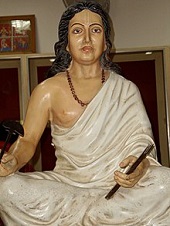
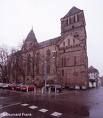
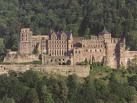

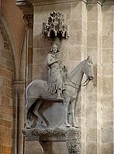
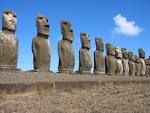


1200 Pop. of Paris: 50K; 60K Italian merchants live and work in Constantinople. All modern Ashkenazi Jews trace their roots to a group of about 330 people who lived in this cent. According to Austrian historian Friedrich Heer (1916-83), this year marks the line between the expansionary freedom era of Europe and the contracting repression era, known for persecution of Jews, heretics, women, lepers, witches, and homosexuals; according to Am. historianNorman F. Cantor (1929-2004), it should be 1270. John I of England and Philip II of France fight before the fortified town of Angiers, which swears allegiance to the king of England but wants to wait to see whether it's going to be John or Arthur; Sir Richard, bastard son of Richard I Lionheart (formerly Philip Falcounbridge, disinherited brother of Robert Falcounbridge, who gives up his inheritance for the name, saying, "Brother, you take my land, I'll take my chance", according to Shakespeare (King John, 1.1.151), proposes that they all combine temporarily and take Angiers first, causing John to propose that Philip II's son Louis the Lion marry Princes Blanche of Spain, and give Philip some of the disputed French land as dowry, which Philip accepts, his quarrel with Pope Innocent III diverting him anyway, causing him to abandon Arthur's cause; on May 25 Philip II and John I sign the Peace of Le Goulet, recognizing England's holdings in France, and recognizing Arthur as John's vassal, while ceding Vexin and Evreux, and promising the French a large sum of money; Arthur I, already duke of Brittany (since 1196) is created 1st earl of Richmond in N England, and lord of Angiers (until 1203). Is that wine all you want? On Sept. 7 Pope Innocent III lifts the interdict on France after Philip II discards his concubine Agnes. Welsh prince Llywelyn the Great (1173-1240) seizes breadbasket land Anglesey, and makes a treaty with John I of England, maintaining good relations for the next decade, and marrying John's daughter Joan in 1205; in the future Angelesey becomes the Achilles heel of the Welsh? Saladin's brother Melek al-Adil (al-Adel) Sayf al-Din (d. 1218) restores unity and becomes sultan of the Ayyubid Dynasty in Egypt and Syria. Alaeddin Takish dies, and his son Alaeddin (Ala ad-Din) Muhammad (Mohammed) II (-1220) becomes ruler of Khwarzem (until 1220). Yaroslav Vsevolodovich (b. 1191), 4th son of grand prince Vsevolod II the Big Nest of Vladimir is sent to rule the town of Pereyaslav near the Kypchak Steppes, beginning his rise to grate powah. King John of England marries 12-y.-o. Isabella of Angouleme (1187-1246), maternal great-granddaughter of Louis VI of France. Sergius, count of Senigallia in E Italy receives alleged relics of Mary Magdalene from the count of Marseilles as dowry for his daughter, causing an annual fair to be held by merchants from the Levant and Europe, becoming one of the largest in Italy. In this decade King John of England is allegedly excommunicated by Pope Innocent III for picking his nose, causing him to do penance. Early in this cent. the English strategy in Ireland changes from invasion to colonization, with immigrants coming from England, Wales, France, and Flanders, all being considered higher than the native Irish "betaghs" (serfs). Early in this cent. after Mongol conquests in the area turn him into an ascetic mystic, causing him to give away his wealth and go itinerant, visiting the seminaries in Bukhara and Samarkand to acquire religious learning, Herat, Afghanistan-born Persian mystic Sunni Muslim preacher Moinuddin Chishti (Chishti Mu'in al-Din Hasan Sijzi) (Khwaja Ghareeb Nawaz) (1142-1236 from Sistan settles in Delhi, India, moving to Ajmer, Rajasthan and founding the Chisti Order of Sunni mysticism in Ajmer and Lahore, Punjab, which becomes #1 in India, spawning Sunni saints Muhammad Nizamuddin Awliya (Auliya) (1238-1325), Abul Hasan Yamin ud-Din Amir Khusrau (Khusrow) (1253-1325) et al., going against Prophet Muhammad by permitting devotional music (qawwali) to attract Hindus, also spreading to Afghanistan. In this cent. the Writ of Trespass on the Case originates in the royal courts of London. In this cent. Jewish Kabbala (Qabbala) studies begin in the Christian Iberian kingdoms - when does Madonna sign up? In this cent. Islam begins to displace Buddhist religions in India. In this cent. Paris develops into a modern capital. In this cent. the Christian legend of the Wandering Jew begins to spread in Europe. About this time the English church requires that marriage banns be announced in church on three separate occasions. By this year the monastic revival in England, begun with the conquest, sees 500 new monasteries founded, and only 157 more during Henry III's long reign (1216-72); however, Cistercian houses now spread more rapidly than Cluniac, which have suffered spiritual decay; the new order of friars (non-secluded monks) begins to arise in this cent.; meanwhile in this cent. the papacy begins the policy of making provisions in England, providing benefices or incomes to papally-appointed parish priests, usually Italians; as a consequence, Italians who couldn't speaka da English begin to arrive in charge of parishes all over England, pissing-off the natives (see 1232). In this cent. the Ajuran (Ajuuraan) Sultanate in S Somalia is founded, working to make converts to Islam while engaging in tyrannical rule, spurring many rebellions that cause it to disintegrate by the end of the 17th cent. after fighting off an invasion by the Portuguese in the early 16th cent. and the Oromo people from S Ethiopia in the mid-17th cent. In this cent. the Kingdom of Sine (Siin) on the N bank of the Saloum River Delver in modern-day Senegal is founded by a group of animists from the Senegal River Valley fleeing Islam who meet up with the Gelwar Mandinka group coming from the SE; in the late 14th cent. more Mandinka immigrants arrive; the king (maad a sinig) rules from the capital of Mbissel; Mahecor Joof becomes the last king in 1924-69, after which the kingdom is incorporated into Senegal. In this cent. vanilla is first cultivated in Papantla, Mexico, and taken over by the Totonacs in Veracruz. The 800 y.-o. Buddhist U. of Nalanda in India (founded about 400) is destroyed by Muslims under Muhammad Bakhtiyar Khilji (-1206), the first Muslim conqueror-ruler of Bengal and Bihar, whose missionaries make a large number of converts while Buddhism declines in E India. About this time William I the Lion of Scotland charters the highland capital Inverness (Gael. "mouth of the River Ness") (modern-day pop. 63K) as a royal burgh. About this time the town of Tipperary (Gael. "Tiobraid Arann" = Well of the Ara) on the Ara River in Munster, S Ireland (AKA Tipp Town) (modern-day pop. 4.9K) is founded, becoming the home of the Clanwilliam barony and seat of County Tipperary; it goes on to house a large British army barracks that is used as a base by the Black and Tans; on Jan. 30, 1912 Jack Judge and Henry James "Harry" Williams compose the popular British music hall song It's a Long Way to Tipperary. About this time Chester Rows in Chester, Cheshire, England is established, consisting of first floor covered walkways leading to shop entrances, becoming the oldest continuously-occupied shopping mall on Earth. In this cent. the small border town of Braunau Am Inn in the Waldvertiel (wooded quarter) W of Vienna is founded, later becoming the birthplace of Adolf Hitler. The city of Amsterdam in the Netherlands is founded by this decade. In this cent. the seaport of Fukuoka (modern pop. 1M) on Hakata Bay in Japan is founded. In this cent. the Teutonic Knights found the town of Grodek (modern-day Grudziadz or Graudenz) in NC Poland on the Vistula River 60 mi. S of Gdansk (Danzig). In this cent. the independent duchy of Raciborz (Ratibor) on the Oder River 100 mi. SE of Breslau (Wroclaw) is founded by Duke Ratibor of Pomerania in memory of his marriage to Emma. In this cent. the Basques equip large sailing ships for hunting right whales in the Bay of Biscay. In this half-cent. the Seljuk Sultanate of Rum (founded 1077) in Anatolia (modern-day Turkey) reaches its zenith. Early in this cent. the Mon kingdom of Haripunjaya in Thailand is overrun by Thai (Shan) peoples from the N. About this time the Patzinak Turks NW of the Black Sea are converted to Christianity. During this cent. Jerusalem declines to the status of a village due to the waning of the Crusades and Ayyubid internecine struggles, and after the Crusaders are finally kicked out of the Middle East in 1291, the Christian pilgrims are fewer than before the Crusades started, and the Muslims are far less tolerant. In this cent. the Rhine River course shifts away from Duisburg, which is still on the Ruhr River. In this cent. the Samurai-like Aztecs ("people of the heron [Aztlan] place") leave their home near modern-day Mexcaltitan ("the Venice of Mexico") on Nayarit's San Pedro River Delta (450 mi. NW of Mexico City) and, under orders of their hummingbird-god Huitzilopochtli, move to the dry lands N of the Valley of Mexico to Tula, capital of the declining Toltec Empire, then change their name from Azteca to Mexica (pr. meh-SHEE-kah), and pick up Toltec culture; coming as refugees, they are assigned to a rocky area full of snakes, which they learn to enjoy as food - tastes like chicken? In this cent. the Athabascans migrate from Alaska to the Am. SW; the Anasazi (Ancestral Puebloan), Hohokam, and Mogollon cultures begin to move and disintegrate by 1300; the descendants end up in New Mexico by modern times. In this cent. Islam reaches Brunei? In this cent. the Walloon language emerges with a clearly-defined identity in SE Belgium (Wallonia) centered in Namur, combining French with German elements, although its pop. traces to the Celts. By this time the sweet potato is being cultivated in Polynesia; they got it from South Am.? About this time Easter Island (Rapa Nui) is settled by Polynesians from the Marquesas Islands or Gambier Islands led by Hotu Matu'a; they really came from South America because they brought the sweet potato?; they begin carving colossal Moai (stone figures), denuding the thick palm forest, causing the pop. to dwindle; their diet consists mainly of rats, and little seafood?; they actually walk the moai and don't waste trees? In this cent. soap reaches France. In this cent. engagement rings come into fashion in Europe. In this cent. English men begin to wear short hair which is kept bushy at the sides, cut close over the forehead, and curled below the ears (ends 1500), while women wear their hair in a caul, or curled and ornamented (ends 1400). For the first half of the cent. prices are on a rising trend in England; Italians develop banking firms, which compete with the Jews. In this cent. the English/British Bulldog is developed for bull-baiting; the first mention of the word "bulldog" is in 1631/2 by Preswick Eaton; in 1666 English scientist Christopher Merret gives it the scientific name Canis pugnax. In this cent. the Roman Catholic Church begins to be attacked for the corruption, greed, ignorance and immorality of its officials in all ranks, and its vast tax-free possessions, comprising up to one-third of all land in Europe, which pisses-off the landless peasants. In this cent. prof. bards begin working in Ireland. Early in the cent. the legend of the Wise Men of Gotham arises, about the village of Gotham in Nottinghamshire, 7 mi. SW of Nottingham, where King John intends to build a castle, but the villagers, not wanting to foot the bill feign idiocy until he changes his plans, with the soundbyte "We ween there are more fools pass through Gotham than remain in it." In this cent. wandering musicians settle down and acquire official recognition as town pipers in Europe. In this cent. trumpets begin to be used in battles in Europe to signal an attack. In this cent. the Mongols bring the tea-drinking habit to Persia. In this cent. the brewing of coffee into a beverage (as opposed to a medicine) is discovered by the Arabs, causing coffeehouses to proliferate in Arabia and Turkey, becoming gathering places for the intelligentisia; for the next 4 cents.; it becomes a capital offense to export fertile coffee seeds. About this time the soapmaking industry begins in England, centered in the large towns of Bristol, Coventry, and London, decimating woodlands to make wood ashes and causing a winter fuel shortage. The U. of Paris is chartered by French Capetian king (1179-1223) Philip II Augustus (1165-1223); in 1210 Pope Innocent III permits its teachers to form a corporation, and in 1212 gives them a degree of independence from the bishop of Paris; in 1215 it is chartered by Pope Innocent III, who on Nov. 16, 1219 prohibits the teaching of civil (Roman law), permitting only canon law to be taught; in Dec. 1219 new pope Honorius III supports the univ. in its conflict with the bishop of Paris; on Feb. 26, 1229 street battles between students and sgts. of the provost of Paris escalate, and on Apr. 15 the univ. temporarily vacates the city in protest, while students launch the first major student strike in history over the price of wine in a tavern in the Faubourg Saint-Marcel, with some leaving for Oxford and Cambridge in England; the name "Picard" originates as an academic epithet applied to its quarrelsome students. The first Red Masses (named from the red vestments symbolizing the red-hot Holy Spirit worn by celebrants) are held for those who seek justice, such as judges. In this cent. Euro adults begin developing the concept of childhood, according to French historian Philippe Aries (1914-84). In this cent. Verdun, France becomes famous for its Dragees (Dragée) hard-shell candy. Sports: In this cent. bowls (lawn bowling) (Lat. "bulla" = bubble) becomes popular in England, spreading to Scotland. Architecture: In this cent. Duke Leopold VI of Austria builds Burg Castle near Vienna. Early in this cent. St. Michael Paternoster Royal Church in London is built; the earliest record is dated 1219. The Gothic-Romanesque Church of St. Thomas in Strasbourg is begun, later going Protestant. The Facade of Notre Dame Cathedral in Paris is begun (finished 1250). In this cent. the Transition style Romanesque-Gothic Church of San Pablo (St. Peter) in Saragossa, Spain is built. King John of England orders the construction of King John's Castle on the S bank of the Shannon River in Limerick, Ireland (finished 1210). In this cent. Heidelberg Castle is begun on the ruins of a castle belonging to Charlemagne, becoming the #1 German historic landmark by modern times; the Heidelberg Tun (cellar) contains a 49K-gal. wine vat. Early in this cent. Balcony House in Mesa Verde in modern-day Colo. is built. Inventions: About this time chaperon ("little cape") headgear, consisting of a hood and a short cape is invented in W Europe, and it slowly grows into a complex, versatile and expensive fashion item, with a cornette (liripipe) (tippit) (becchetto) tail tied on top, a patte (cockscomb) (foggia) cape hanging behind, and a round bourrelet (rondel) (mazzocchio) tied around the face or twisted under the neck (beginning of a tie); by 1300 some prefer to wear it upside-down, and some prefer a scarf-like cornette. In this cent. Christian knights begin embroidering their family insignia on their surcoats, coining the term "coat of arms". Buttons for clothes are developed in this cent. - perfect to wear with the tidy whities, unless you're a Mennonite? By this this time the Guitar (Persian "tar" = string) is in use in Europe, incl. the Moorish guitar (Guitarra Moresca) and the Latin guitar (Guitarra Latina). About this time the Camshaft is invented in Iraq by Al-Jazari, who describes it in 1206; Europe picks it up by the next cent. In this cent. the Italians invent the Mannaia ("executioner's axe"), a type of horizontal guillotine, adopted by the Scots and Germans in the 16th cent. In this cent. Iron Anchor Chains, which were last used during the 1st cent. B.C. begin to be used again in Europe infrequently. In this cent. Mechanical Clocks (no water propulsion) begin to appear in Europe. Science: In this cent. alcohol begins to be used for medicinal purposes. Music: In this cent. the hymn Bogurodicza ("Mother of God") is written, becoming the first Polish religious hymn and the first known example of the Polish language. Nonfiction: In this cent. Sefer Raziel Hamalakh (AKA Liber Razielis Archangeli or the Book of Raziel the Angel), a Qabbalistic grimoire is trans. into Latin by the court of Alfonso X of Spain. Early in this cent. the Pre-Alphonsine Medieval Romance Bible (Biblia Medieval Romanceada Prealfonsina) is pub., becoming the first complete Spanish Bible. In this cent. Pedigree of the Saints (Achau'r Saint), The Book of Anerin, The Black Book of Caermarthen (Canu Myrddin), Vita Santorum Wallensium, De Situ Brecheniauc, Life of Carannog, Life of Cuby (Cybi), Life of Illtyd, and The Dream of Rhonabwy are written in busy little Ireland. In this cent. the 165-lb. 36 in. long x 9 in. thick Codex Gigas (Big Book) is supposedly created by Herman the Recluse in the Benedictine Monastery of Podlazice in Bohemia near modern-day Chrudim, Czech. in one night with the Devil's help, but really produced by a single monk over a 25-year period?; contains a large portrait of the Devil, causing it to be known as the Devil's Bible; in 1295 it is pawned to the Sedlec Monastery; in 1648 the Swedish army takes it as plunder, ending up in the Swedish Nat. Library, becoming the largest medieval ms. to survive to modern times; it took 160+ animal skins to make it; contains the Vulgate Bible, Josephus' "Antiquities of the Jews" and "De Bello Iudaico", Isidore of Seville's "Etymologiae", Cosmas of Prague's "Chronicle of Bohemia", two books by Constantine the African et al. In this cent. the 93-chapter Liber Juratus (Sworn Book of Honorius) is written, becoming a grimoire (magician's handbook). Plays: Jean Bodel (1167-1210), Jeu de St.-Nicholas (The Game of St. Nicholas) (Dec. 5) (St. Nicholas' Day) (Arras); the first known miracle play in France, in which St. Nicholas appears to robbers and persuades them to give their loot back. Poetry: Early in this cent. Fabliaux, bawdy (fart-heavy) farcical mainly anon. stories showing how the clever always win begin to circulate in France and Italy, spreading throughout Europe by the next cent. Hartmann von Aue (1170-1210), Der Arme Heinreich; a leper is cured by a young girl. In this cent. Indian Hindu Sanskrit poet Jayadeva (Jaidev) (1170-1245) of Puri, Orissa in E India composes the love poem Gita Govinda (Song of Govinda), about Krishna and the cowgirls (gopis) of Vrindavana, esp. cute little cowgirl Radha, who is presented as greater than Krishna, becoming important to Bhakti Hinduism and later incl. in the Guru Granth Sahib, the main scripture of Sikhism. About this time Suleyman of Bakirghan (a subject of the Khwarezmshahs) writes Poem on the Death of the Virgin, inspired by Nestorian writings. One way, or the other, I'm gonna getcha getcha getcha? In this cent. Holy Grail (san graal) (saint graal) legends begin to appear in lit., portraying it as a dish, cup, or magic talisman, and danbrowning, er, culminating in a woman, incl. the poem Lanzelet by Ulrich von Zatzikhoven, a 4-part French Arthurian work later used by Sir Thomas Malory that he claims came to Germany in the luggage of Hugh de Morville, one of the hostages for Richard I Lionheart while imprisoned by HRE Henry VI (1192-4); incl. Lancelot of the Lake (Launcelot du Lac), Quest for the Holy Grail (Queste del Saint Graal) by Galahad, Grand Saint Graal, The Death of King Arthur (La Mort du Roi Artu), and Roman de Joseph of Arimathea and Merlin (Le Roman de l'Estoire du Graal) by Robert de Borron (Boron), dedicated to Count Walter of Montbeliard (-1212), regent of Cyprus and constable of Jerusalem; Joseph of Arimathea and his followers allegedly brought the Holy Grail to Glastonbury, Britain, connecting King Arthur and Merlin with it; according to the 1982 book "Holy Blood, Holy Grail" by Michael Baigent, Richard Leigh, and Henry Lincoln, it's really "sang raal" or "sang real", i.e., royal blood, because Jesus Christ was married to red-haired Mary Magdalene, who fled to S France with their child after St. Peter staged a coup to oust her as first pope, and that bloodline has the right to be pope and king of the Jews and/or world, and the Holy Grail story was cooked up as a coverstory to keep the authorities off their trail. Births: German landgrave of Thuringia (1217-27) Ludwig (Louis) IV (d. 1227) on Oct. 28 in Creuzburg; son of Hermann I (-1217) and Sophia (daughter of Otto of Wittelsbach); brother of Henry Raspe (1204-47); husband (1220-) of St. Elizabeth of Hungary (1207-31); father of Hermann II (1222-41), Sophie of Thuringia (1224-75), and Gertrude of Altenberg (1227-97). French "Roman de la Rose" poet-scholar Guillaume de Lorris (d. 1240). Italian "Dies Irae" Franciscan friar-poet Thomas of Celano (d. 1255) in Celano, Abruzzi Province; becomes one of the first disciples of St. Francis of Assisi in 1215. English "Chronica Majora" monk-chronicler Matthew Paris (d. 1259) in Hildersham, Cambridgeshire; educated at St. Albans Abbey; known for illuminating his mss. with watercolors. Armenian historian Kirakos Gandzaketsi (d. 1271) (b. 1202?) in Gandzak (modern-day Ganja, Azerbaijan). Muslim Bektashi Persian Sufi mystic order founder ("Dervish of the Dervishes") ("Sultan of Hearts") Haji Bektash (Baktash) Wali (Veli) (1209-71) in Neyshabur, Khorasan (NE Iran); his mystic humanist combo Sunni-Shiite-Christian Bektashi belief system is later adopted by the Ottoman Janissary corps, teaching Alevism, worship in assembly houses rather than mosques, along with love, respect, and tolerance, equality of women, and monogamy. Austrian knight-minnesingerUlrich von Lichtenstein (d. 1278) in Murau; knighted in 1223 by Duke Leopold VI; gov. of Styria, which he helps bring into the Hapsburg Empire. Deaths: Chinese philosopher Zhu Xi (Chu Hsi) (b. 1130) on Apr. 23; leaves Commentaries on the Four Books of Confucius, which forms the basis of Chinese civil service exams in 1313-1905. English bishop St. Hugh of Lincoln (b. 1135); his tomb in Lincoln becomes a place of pilgrimage competing with Becket's in Canterbury.


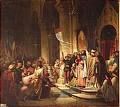
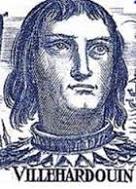
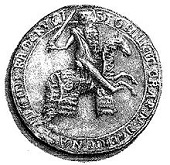

1201 In Apr. (Lent) Fourth Crusade envoys Geoffrey I of Villehardouin (Geoffroi de Villehardouin) (1169-1229) (Marshal of Champagne), Doge (1192-1205) Enrico (Henricus) Dandolo (1107-1205) et al. conclude the Treaty of Venice, with Venice, agreeing to transport 33.5K men and 4.5K horses in return for a 85K mark payment, and leave on June 29, 1202 for Egypt, which is thought to be the best route to the Holy Land; on May 24 Crusade leader Count Theobald III of Champagne (b. 1179) dies in Troyes, and his posth. son (born on May 30) Theobald (Thibaud) (Thibault) IV (the Troubadour) (the Chansonnier) (the Posthumous) (1201-52) succeeds him as count of Champagne in France (until July 8, 1253), immediately facing crushing debts from his crusading uncle Henry II of England, plus a succession dispute by Henry II's daughter Philippa and her hubby Erard I of Brienne, Count of Ramerupt (1170-1246), which takes until 1222 to resolve by buying him off; meanwhile in June the Assembly of Crusaders in Soissons elects famous Lombard soldier Marquess Boniface I of Montferrat (1150-1207) to lead the Crusade. In May King John sails to Normandy and seizes the lands of rebellious barons in Poitou; in June Philip II entertains him in Paris, ignoring the complaints of the Lusignans about his treatment of them. In June Pope Innocent III approves the Order of the Humiliati, who soon get into wool? On Dec. 25 a meeting is held in the forest town of Hagenau in Alsace-Lorrane between Philip of Swabia, dethroned Byzantine emperor Isaac II Angelus' son Alexius (brother of Philip's wife Irene), and Boniface, where a successful pitch is made to divert the Fourth Crusade to Constantinople to reinstate Isaac I, obviously in return for much baksheesh? Pope Innocent III openly espouses the side of Otto of Brunswick (son of Henry the Lion, duke of Bavaria and Saxony and his wife Matilda of England) in the contest for German king - that goes to show, try it before you judge? Sultan Suleyman II of Rum conquers Erzurum, then plans an invasion of Georgia from the SW - everybody needs good feet? King John of England grants the Jews a charter to live in Merry Ole Christian England - Merry Christmas? Bulgar Tsar Kaloyan makes peace with the Byzantines, being allowed to retain most of the E Balkan area. After landing in Riga last year with 500 Westphalian crusaders on 23 ships, Bishop Albert of Riga (Livonia) (Latvia) (1165-1229) founds the city of Riga, Latvia on the Gulf of Riga (modern-day pop. 641K/1M), transferring the seat of the Livonian bishopric from Ikskile, and builds a cathedral in 1221. The Hashemites begin ruling Mecca (to 1925). The first German merchants arrive in Novgorod via the Dvina River. Architecture: Early in this cent. St. Gotthard Pass is opened, connecting the northern German-speaking Swiss canton of Uri with the Italian-speaking southernmost Swiss canton of Ticino, which is on the route to Milan; in 1236 it is dedicated to St. Gotthard of Hildesheim. Births: Persian Shiite theologian-astronomer Nasir ad-Din (ed-Din) (al-Din) (Arab. "defender of the faith") Tusi (et-Tusi) (d. 1274) on Feb. 18; Mongol khan Hulegu builds him an observatory in Maragha. French poet, king of Navarre (1234-53), and count of Champagne (1201-53) Theobald (Thibaud) I/IV (the Troubadour) (the Chansonnier) (the Posthumous) (d. 1253) on May 30 in Troyes; posth. son of Thibaud III (1179-1201) and Blanche of Navarre (1177-1229) (youngest daughter of Sancho VI). French duchess of Brittany (1203-21) Alix (Alis) of Thouars (d. 1221) on Sept. 5 in Brittany; daughter of Duchess Constance of Brittany (1161-1201) and Guy of Thouars (-1213); wife of Peter I (1187-1250). French theologian (founder of the Sorbonne) Robert de Sorbon (d. 1274) on Oct. 9 in Sorbon. French "Bestiary of Love" deacon, surgeon and trouvere-philosopher Richard de Fournival (Fornival) (d. 1260) on Oct. 10 in Amiens; son of Roger de Fournival (physician of Philip II Augustus) and Elisabeth de la Pierre; half-brother of Bishop Arnoul of Amiens (-1246). Deaths: Persian scholar-soldier Imad ad-Din al-Isfahani (b. 1125) in Cairo, Egypt; leaves bios. of Sultan Saladin incl. "Kitab al-Barq a-Shami" (5 vols.), and "Al-Fath al-Qussi fi-l-Fath al-Qudsi". Danish statesman-soldier Archbishop Absalon (b. 1128). Christian prince of Antioch (1163-1201) Bohemond III (b. 1144) French duchess of Brittany (1186-96) Constance of Brittany (b. 1161) on Sept. 5 in Nantes (leprosy?). French count of Champagne (1197-1201) Theobald III (b. 1179) on May 24 in Troyes.







1202 The Fourth Crusade (ends 1204) finally gets going after only a fraction of the promised Crusaders trickle into Venice, and the whole affair gets in trouble for lack of the 85K marks, the fleet under Boniface of Montferrat finally accepts a Venetian proposal and starts down the Adriatic on Oct. 8, and on Nov. 11-24 despite a papal prohibition conquers and sacks the Christian city of Zara on the Dalmatian coast (known for their oak used in Venetian shipbuilding) to pay the Venetians for the ice cream trucks, er, ships and expenses. On Mar. 13 Polish duke (since 1138) Mieszko III the Old (b. 1126) dies, and his gay son Wladyslaw III Laskonogi (Spindleshanks) (1165-1231) becomes duke of Poland, but his cousin rival (son of Casimir II the Just) Leszek I the White (1184-1227) gets him deposed by 1206 and ascends to the throne of Cracow (main province in Poland), making him overlord of the other Polish dukes; meanwhile the nobles and clergy conspire to keep any ruler weak? The first trial of a peer in France, or, You've got a friend? On Apr. 28 after the barons of Anjou, Maine, Poitou, and Touraine protest to Philip II that he is oppressing their provinces, causing Philip II to summon his royal vassal to Paris to defend himself, King John fails to obey a summons to his court, claiming the feudal exemption of the duke of Normandy, pissing-off Philip II, who regards him only as the non-exempt count of Poitou and causing a French court to declare John to have forfeited his French fiefs (Aquitaine, Poitou, and Anjou), putting France and England back in war; the court awards them to John's nephew Arthur of Brittany, who claims the throne of England, raises an army, and sieges John's 80-y.-o. mommy Eleanor of Aquitaine at Mirebeau in Normandy, where she leads the defense personally; too bad, on Aug. 1 John swings south from S of Rouen with his mercenary army accompanied by his Anjou seneschal William de Roches and surprises Arthur, capturing him; too bad, John mistreats William de Roches and mistreats the rebel leaders, causing 22 to die, pissing-off the locals, who are their kin, causing John's regional allies in Anjou and Brittany incl. de Roches to switch sides to Philip II, raising a new revolt in Brittany, while Philip II keeps an army of 3,307 men incl. 257 knights on the Norman border to defend it; John's chamberlain Hubert de Burgh becomes Arthur's jailer in Falaise, and repeatedly refuses to obey John's orders to blind him? In May Pope Innocent III issues the decretal Venerabilem Fratrem Nostrum, outlining how the German princes have the right to elect a German king, but how the pope has the right to approve their choice before crowning him HRE because the papacy is superior to the whole empire - keep your head together and call my name out loud now? The Bulgarians campaign against the Serbs, taking Nish, then campaign against the Hungarians, driving them back over the Danube River. Sverre Sigurdsson dies, and his illegitimate son Haakon III (1175-1204) becomes king of Norway (until 1204), facing a resurgence of the rival Bagler party. Canute VI (b. 1163) dies childless, and his younger brother Valdemar II (the Victorious) (1170-1241) becomes king of Denmark (until Mar. 28, 1241), going on to take on the last remaining pagan tribes in the Baltic. Vukan II Nemanjic becomes grand prince of Rascia (Serbia) (until 1204). The Livonian Knights (Order of Livonian Brothers of the Sword) (German Order of Swordbearers) (Militia of Christ of Livonia) of warrior monks are founded by Bishop Albert of Riga (Livonia) (Latvia) (1165-1229) to convert the pesky pagan Finnish Livonians (N of the Lithuanians) to Christianity (finished 1236); Pope Innocent III sanctions them in 1204. Minamoto Yoriiye becomes Kamakura shogun #2. The first court jesters appear in European courts. Architecture: The Louvre in Paris (begun 1190) is completed. Krak des Chavaliers in Syria is damaged by an earthquake, causing it to be further reinforced. Nonfiction: Leonardo Fibonacci (1170-1250), Liber Abaci (Book of the Abacus); introduces the Hindu-Arabic place-value system and Arabic numerals to Europe, and discussing the Fibonacci Sequence ("How many pairs of rabbits can be produced from a single pair in a year's time?"); forever after science and sex are romantically intertwined in Euro minds? Poetry: Jean Bodel (1167-1210), Les Conges (Leave-Takings); autobio. poem written after he has to give up on participating in the Fourth Crusade this year when he contracts leprosy and retires to a leper colony in Arras. Births: English Franciscan scholastic scholar Bartholomew of England (Bartholomeus Anglicus) (d. 1272); educated at Oxford U. Dutch countess of Flanders (1244-78), countess of Hainaut (1244-53, 1257-80) Margaret II of Flanders (Constantinople) (d. 1280) on June 2; daughter of Baldwin I of Constantinople (1172-1205) and Marie of Champagne (1174-1204); sister of Countess Joan of Flanders (1200-44); wife of Bouchard IV of Avesnes (1182-1244) and William III of Dampiere (1224-51); mother of Baldwin (1217–1219), Count John I of Hainaut (1218–1257), Lord Baldwin (1219–1295) of Beaumont, Count William III of Flanders, Count Guy of Flanders, John I of Dampierre, and Joanna. Deaths: Polish duke (1138-1202) Mieszko III the Old (b. 1126) on Mar. 13. Persian poet Nisami (b. 1141). Italian Millennium Fever mensch Joachim of Fiore (b. 1135) on Mar. 30; dies a Catholic pop star, praised by Dante, Richard Lionheart et al.; his Armageddon-predicting followers become known as the Joachites (Joachimites). French trouvere Blondel de Nesle (b. 1155) (d. 1241?); his "L'amours dont sui espris" (Love, which I'm in love with) is later used in "Carmina Burana"'s song "Procurans Odium".


1203 On Apr. 6 after Bosnian ruler Kulin became a heretic in 1199 along with his family and 10K Bosnians, causing King Emeric of Hungary to see his chance and extend his influence over Bosnia, a synod is held at Kulik's instigation to limit Hungarian influence, resulting in the Abjuration of Bilino Polje that corrects errors in the Bosnian Church. Ain't it good to know you got a friend? On Apr. 20 the Fourth Crusaders leave Zara for Corfu, then take Durazzo, where Isaac II Angelus' son (by his wife Margaret of Hungary) (the Crusaders' eager-to-please accomplice) Alexius IV Angelus (Alexios IV Angelos) (1182-1204) is proclaimed emperor, and on June 23 they arrive in Constantinople and begin a siege, causing Alexius III to flee to Adrianople on the night of July 18, after which they free and restore Isaac II Angelus, and make him proclaim Alexius IV co-emperor on Aug. 1, becoming Roman Byzantine emperor #160 (until Jan. 28, 1204); as the Crusaders' puppet Alexius IV bankrupts the treasury to pay them a heavy tribute of 100K marks, and the Greek and Roman churches are remarried for the time being, on paper, but not in reality, as the patriarch has no intention of going to Rome to request the grant of the pallium and the believers ain't about to change any of their ways; meanwhile Alexius asks the Crusader army to delay their planned Sept. 29 (Michaelmas) departure for Syria for one year, giving them time to discover how totally incompatible they and their new bride are, resulting in spousal abuse and a permanent dysfunctional relationship? Evil King John throws away northern France with a lame move? In Apr. Duke Arthur I of Brittany (b. 1187) mysteriously dies in captivity in Rouen under the charge of John I's close friend William de Braose (Briouze), 4th Lord of Bramber, 3rd (7th?) Baron Abergavenny (1153-1211), who was paid off on Feb. 24 with a grant of the choice lands of Gower in the Welsh Marches of S Wales, making him the man who needs shades his future is so bright?; the Margam Annals later claim that John got drunk on the Thur. before Easter, personally killed his nephew, then threw him in the Seine River, where a fisherman later discovered him in his net, after which he was secretly buried in Notre Dame de Pres, the priory of Bec; Arthur's death ends the Angevin Plantagenet Dynasty in Brittany (begun 1181), and after John I is suspected of murdering him, the French unite against him (Shakespeare in King John claims that Arthur falls from a wall while making an escape after Hubert de Burgh chickens out in obeying John's order to blind and kill the innocent boy, but the barons think Hubert really did it and switch to the French side, all with no mention of Brownose?); white fairy-tale castle Chateau Gaillard on the Siene River near Rouen, France, built in 1196-8 by Richard I on a hill overlooking the town of Les Andelys, and held for King John by Baron Roger de Lacy, 6th Baron of Pontefract, 7th Baron of Halton (1170-1211) (AKA Roger le Constable) is sieged by Philip II of France after taking the town, and falls next year after a long seige and battles in underground tunnels, during which an undermined wall collapses into the moat, after which John retreats from France in Dec.; Arthur I's stepfather (2nd husband of Duchess Constance of Britanny) Guy of Thouars (-1213) becomes duke of Brittany and count of Richmond (until 1206) by right of his wife, who died in 1201, leaving him skating on thin ice, causing Philip II to take control, making him regent for his infant daughter Alix of Thouars (1201-21) (until 1213). The Almohads from Algeria and Denia conquer Mallorca (until 1229). The Battle of Basian 35 mi. NE of Erzurum sees 250K-300K Seljuks under sultan Suleyman II defeated by 90K Georgians under Queen Tamar and her hubby David Soslani 35 mi. NE of Erzurum, causing Suleyman to barely escape to Erzurum, and his brother Kilij Arslan ("Lion Sword") III (-1205) to become Seljuk sultan of Rum (until 1205). Temujin (Genghis Khan) defeats his rival Ongkhan (Wang Khan). Minamoto no Sanetomo (1192-1219) becomes Kamakura shogun #3 (until Feb. 13, 1219). The boys-will-be-boys island of Mont-Saint-Michel in Manche Dept., France begins a village below the fortress abbey that will later make it a tourist's dream; the fortifications around the 2-mi. base of the island (ramparts, towers and bastions) are added in the 16th cent. Births: Savoy count (1263-8) Peter II (the Little Charlemagne) (d. 1268) in Suze, Albon; 7th of 9 sons of Thomas I of Savoy (1178-1233) and Margaret of Geneva (1180-1252); brother of Philip I (1207-85); uncle of English queen Eleanor of Provence (1223-91); builder of Savoy Palace in London; husband (1236-) of Agnes of Faucigny (-1268); starts out as a prelate. Deaths: Flemish "universal doctor" Alain of Lille (b. 1114); leaves De Planctu Naturae (The Complaint of Nature) (satire on human vices), and Anti-Claudianus (treatise on morals); "Many false Christians of our time say there is no resurrection, since the soul perishes with the body." French duke of Brittany (1196-1203) Arthur I (b. 1187) in Apr.; killed by or under orders of King John of England.


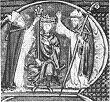
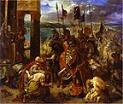
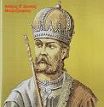

1204 Everyone wants an old school lord and master? On Jan. 1 after some Crusaders attack a mosque in Constantinople, causing citizens to confront them, and a fire ravages a section of the city, causing the Latin pop. to take refuge in the Crusader camp, Byzantine emperor Alexius IV launches fire ships at the Venetian fleet, which they stop; on Jan. 25 after pissed-off Greeks mad about paying money to stinkin' heretic Latins start a riot, Alexius III's son-in-law Alexius V Ducas (Alexios V Dukas) Mourtzouphlos (Gr. "bushy eyebrows"?) (1140-1204) sees his chance and has Alexius IV Angelus (b. 1182) and Isaac II Angelus (b. 1156) arrested and killed on Jan. 27/28, and is crowned as Byzantine emperor on Feb. 5 (until Apr. 12), ending negotiations with the Crooked Crusaders and refusing to make any more payments, while strenghtening the city defenses, personally leading a surprise attack on the Crusader camp and beating back a Crusader assault on Apr. 9; too bad, on Apr. 12-13 soldiers of the Fourth Crusade, comprised of French nobles and their followers, as well as Venetians and Flemings (OE "men from the lowlands"), surprise, capture, and Sack the Hell Out of Constantinople, then rub this date rape in by declaring it a marriage, announcing the Latin Empire of the East (Romania), based in Constantinople (ends 1261), conveniently cutting Venice's rival "La Superba" Genoa (who is backed by Greece) out of the trade routes; Alexius V ducks out and escapes to Mosynopolis in Thrace, HQ of deposed emperor Alexius III, and marries his daughter Eudocia Angelina, until his new father-in-law turns on him and has him blinded and cast out, after which the Crusaders under Thierry de Loos capture him in Nov., bring him back to Constantinople, condemn him for treason against their puppet Alexius IV, and throw him from the top of the Theodosian Column in Dec., and he becomes the last Byzantine emperor in Constantinople until 1261; Boniface of Montferrat captures Boukoleon Palace on the shore of the Sea of Marmara, discovering a gaggle of women incl. Empress Margaret, daughter of Bela II of Hungary, whom he marries; happy camper Pope Innocent Three Times is the Charm declares the Great Schism ended, but the icon-loving Greeks refuse to give up that easy, and the result is its permanent hardening within two generations as the rapee tries to get loose and turn states' evidence or set the bed on fire?; a council composed equally of Crusaders and Venetians divides the Eastern Empire, giving the imperial crown to Count (since 1194) Baldwin of Flanders, crowning him Baldwin I (1171-1205), Latin emperor #1 of the East on May 16 in Constantinople (until 1205); Thomas Morosini (1170-1211) of Venice replaces the Greek patriarch, becoming the first Latin patriarch of Constantinople (until July 1211); Boniface of Montferrat is made king of Salonika (Thessalonica), which incl. part of Thrace, Macedonia, and Thessaly; the rest of the empire is split up among various baron vassals; Venice receives three-eighths of the city, plus Adrianople, Gallipoli, Crete (until 1669), Euboea (a triarchy), Naxos, Andros, the SW tip of the Peloponnesus (Coron and Modon), Durazzo and other posts on the coast of Epirus, the Ionian islands, and some islands in the Aegean; some believe the Shroud of Christ is taken back to France among the huge loot of holy relics by Knight Templar Richard de Clare, 4th Earl of Hertford, Earl of Clare (1162-1218), along with many priceless treasures melted down into coins; the looting happened because the Venetians, who supplied the ships took so long that many Crusaders made their own way and thus underbooked them, causing them to look for a way to get paid?; actually the long-simmering animosities between Venice and Constantinople, exacerbated by religious rivalry and that old Greek-Roman thang helped to breed a bank-robber-in-the-family mentality?; Pope Innocent III professes to be (really is?) shocked (innocent?), along with most of Europe, and excommunicates the Venetians for it, but makes hay of his opportunity to Latinize the Greek Orthodox Church, hardening the schism further; in 1207 after living through the Apr. 13, 1204 battle for Constantinople between the W Euro Roman Catholics and Byzantine Orthodox Catholics, French marshal of Champagne Geoffrey of Villehardouin (Geoffroi de Villehardouin) (1160-1212) begins writing De la Conquete de Constantinople (On the Conquest of Constantinople), a 3rd person memoir in lovely French, becoming one of the first works of French prose - another day here in the park, I think it was the Fourth of July, or, what a lady what a night, or, get that icon down? Now you know why they call him Augustus? In Mar. despite King John's attempts to raise more money to hire mercenaries for his war in France, Chateau Gaillard is captured; John sends a peace embassy to negotiate in the spring, but Philip II takes advantage of him being busy honeymooning in Rouen to conquer all of Normandy except the Channel Islands by June, playing the Norman barons off against each other, backed by the towns and rich bourgeoisie; Philip II, now master of Normandy, Anjou, Brittany, Maine, and Auvergene then retakes English-held (since 1152) Touraine in WC France, but is stopped at Poitou as John's vassals in S France finally decide they prefer an absent Angevin to a nearby Capetian, and stop Philip S of the Loire River; the loss of all of John's Angevin holdings in France N of the Loire River (Anjou, Maine, Normandy, and Touraine) except Aquitaine (minus part of Poitou) reduces England's power and prestige, and cuts the Norman barons off, making them begin to look to England rather than France for their future and take more interest in their English rights, leading to the Magna Charta of 1215?; Normandy remains under French control for the next two cents. (except 1346) (until 1415). On Nov. 14 Pope Innocent III writes to the Roman Catholic clergy in the East, calling the transfer of imperial power in Constantinople from the Greeks to the Latins "the Lord's doing, and it is marvelous in our eyes", a quote from Psalms 118:23; the overthrow of the Byzantine Empire leads to successor Latin states in Greece; Michael I Comnenus Ducas (Michael I Komnenos Doukas) (1170-1214) sets up the independent Greek Empire (Despotate) of Epirus (ends 1340, then 1356-1479), which attempts to expand to the E and lasts until the Turks take it over in the 15th cent.; Theodore I Comnenus Lascaris (Theodoros I Komnenos Laskaris) (1174-1222), son-in-law of Alexius III founds the Empire of Nicaea in Bithynia (which eventually becomes top dog) as Theodore I (until 1221), and makes an alliance with sultan Kilij Arslan III of Rum to block the Crusader advance into Anatolia, but is defeated by the Crusaders under Peter de Bracheuil; Alexius III and David Comnenus sets up the Empire of Trebizond (Trapezuntine Empire) on the N coast of Anatolia, with Alexius at Trebizond and David at Sinope (ends 1461); the capture of Big C ends trade with Kiev, causing it to further decline until its final destruction by the Mongols in 1240; after they pass him as Latin emperor of Constantinople for Baldwin of Flanders because his brother Conrad married into the Byzantine royal family, the Venetians send Crusade leader Boniface of Montferrat (1150-1207) to conquer Thessalonica, which he does, founding the Kingdom of Thessalonica (ends 1224), which acknowledges subordination to Baldwin I, expanding by next year S through Thessaly, Boeotia, Euboea, and Attica; meanwhile crusading barons led by Burgundian nobleman Otto (Othon) II de la Roche (1170-1234) conquer Attica and the Peloponnesus, and he becomes the first duke of Athens (until 1225), acquiring Thebes by 1211; Bulgarian Tsar Kaloyan uses the opportunity to firm his kingdom up, seizing W Macedonia and aligning with Pope Innocent III, who sends a papal legate to crown him, along with a primate for Bulgaria. Emeric I (b. 1174) dies, and his 5-y.-o. son (by Constantia of Aragon) Ladislas III (1199-1205) becomes Arpad king of Hungary (until 1205). Haakon III dies, and Birkebeiner faction man Inge II Baardson (1185-1217) becomes king of Norway (until 1217). Jaffa is recaptured by the Roman Catholic Christians, who hold it until 1268. Sultan Kaykhusraw I regains the throne of Rum (until 1211). John of Ibelin (1179-1236) becomes lord of Beirut after relinquishing the office of constable of Jeruslam, going on to rebuild it and construct an opulent palace, which becomes the home of the Ibelin family for the rest of the cent.; he lives so long that he becomes known as the Old Lord of Beirut. The Assizes of Romania, a clone of the Assizes of Jerusalem are created to govern the new Latin Empire of the East. Vicenza U. in Veneto, Italy is founded. The coal trade of Newcastle-upon-Tyne (2nd cent. C.E. Roman town of Pons Aelius and 5th cent. C.E. Anglo-Saxon Northumbrian town of Monkchester/Munucceaster) (modern-day pop. 300K/879K) is founded as King John accepts money in exchange for deforestation rights - later becoming the home of Eric Burdon and the Animals? The sack of Constantinople ends the production of Tyrian purple, although it continues in Egypt until ?; W Europe turns to vermillion (crimson) (grana), produced by the insect Kermes vermilio. Philip II of France begins replacing feudal prevots (prévôts) with royal baillis and senechaux (sénéchaux) on his new Capetian lands, extending royal collection of customs, tolls, fines, and fees, but as yet no modern-style taxes. The bronze horses that once adorned the triumphal arch of Nero at Rome are taken from Constantinople to Venice. Births: Spanish king of Castile and Toledo (1214-17) Henry I of Castile (d. 1217) on Apr. 14 in Valladolid; son of Alfonso VIII (1155-1214) and Eleanor of England (daughter of Henry II of England and Eleanor of Aquitaine); brother of Ferdinand of Castile (1189-1211). German landgrave of Thuringia (1241-7) Henry (Heinrich) Raspe (d. 1247); brother of Ludwig IV (1200-27). Deaths: English queen of France (1137-52) and England (1154-89) Eleanor of Aquitaine (b. 1122) on Apr. 1 in Fontevraud Abbey; outlives all her children except King John and Queen Eleanor of Castile. Spanish-born Jewish physician-philosopher-rabbi Moses Maimonides (b. 1135) on Dec. 13 in Cairo, Egypt; buried in Tiberias, Palestine; his example causes medicine in Egypt to be dominated by Jews; "Everything except God has been brought into existence out of nonexistence"; "The other nations vanish, but the Jews last forever"; "The nation of Ishmael, who persecute us severely, and who devise ways to harm us and to debase us... No nation has ever done more harm to Israel. None has matched it in debasing and humiliating us. None has been able to reduce us as they have... We have borne their imposed degradation, their lies, and absurdities, which are beyond human power to bear." Greek Byzantine emperor (1185-95, 1203-4) Isaac II Angelus (b. 1156) in Jan. (executed). Bosnian ruler (1180-1204) Ban Kulin (b. 1163). Greek Byzantine emperor (1203-4) Alexius IV Angelus (b. 1182) on Feb. 8 (executed). Spanish (Cordova) Muslim astronomer Nur ad-Din Ibn Ishaq al-Bitruji (Alpetragius) (b. ?); leaves the astronomical treatise Kitab-al-Hay'ah, criticizing Ptolemy's system of epicycles and eccentricities and substituting a system of geocentric spheres. which spreads through Europe for the rest of the cent.
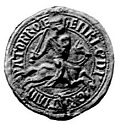

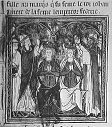
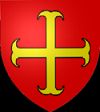
1205 On Apr. 1 Amalric II (b. 1145) dies in Acre, and his son Hugh (Hugues) I de Lusignan (1194-1218) becomes king of Cyprus (until Jan. 10, 1218), while the throne of Jerusalem-Acre passes to 13-y.-o. Maria of Montferrat (1192-1212), daughter of his wife Isabella by her previous marriage to Conrad of Montferrat, with her half-brother John of Ibelin, lord of Beirut as regent (until 1210). The Latins take over Byzantium only to inherit their problem with the Bulgar buggers? On Apr. 14 the Bulgars under Kaloyan, supported by the Cumans and local Greeks kick Frankish Crusader butt at the Battle of Adrianople, and capture Emperor Baldwin I (b. 1172), imprison him in Baldwin's Tower in Veliko Tarnovo, then kill (poison?) him; after receiving the bad news, next Aug. 20 his brother Henry of Flanders (1174-1216) succeeds him as Henry I, Latin emperor of Constantinople #2 (until June 11, 1216) (the ablest of the Latin emperors?) while the Bulgars overrun Thrace and Macedonia and exterminate much of the Greek pop. On July 13 Archbishop of Canterbury and Chancellor Hubert Walter dies; his influence was so great that King John utters the soundbyte: "Now, for the first time, am I truly king of England"; King John persuades the older monks of Canterbury to elect Norwich Bishop John de Grey (Gray), but in Sept. a group of younger monks elect Subprior Reginald, with both parties sending missions to Rome. Ladislas III is dethroned (killed?) by his daddy Emeric I's brother-rival Andras (Andrew) II (-1235), who becomes Arpad king of Hungary, going on to spend the kingdom into bankruptcy - are you aware that you have some addictions? Guillaume (William) de Champlitte (1160-1209) and Geoffrey of Villehardouin conquer Achaea, and divide it into 12 feudal baronies on the French pattern (until 1278), with William I of Champlitte becoming prince #1 of Achaea (until 1209); the Achaean armorial is a cool yellow Latin cross on a red shield; despite being run by Roman Catholics, the Orthodox Greco-Slavic pop. is well treated and the govt. is popular with them? The seaside town of Cumae in S Italy is destroyed by the Neapolitans retaliating against pirates operating there, leaving nothing but ruins. As of this year all Englishmen over the age of 12 are subject to military service, with many being pressed into navy service - I think you're ready for battle, what do you think? Science: The first written Christian reference to using a magnetic compass for navigation. Poetry: Layamon, a priest on the Severn River writes Brut, a rhymed chronicle in the Middle English dialect, based on the "Roman de Brut" of Wace, introducing the Arthurian legend starting with Brut (Brutus), great-grandson of Aeneas, who settled London and became Britain's first king; "The most valuable single production in English speech between the conquest and Chaucer" (William Henry Schofield). Births: ChineseSong emperor #14 (1224-64) emperor Li zong (Zhao Yun) (Zhao Yuju) (Zhao Guichent) (d. 1264 on Jan. 26 in Shaoxing, Zhejiang. Kurdish Ayyubid ruler of Egypt (1240-9) As-Salih Ayyub (Al-Malik as-Salih Najm al-Din Ayyub) (d. 1249) on Nov. 5 in Cairo; son of Al-Kamil. Bohemian king (1230-53) Wenceslaus (Wenceslas) (Wenceslav) (Vaclav) I Premyslid (d. 1253); son of Ottokar I (1155-1230) and Constancia of Hungary; maternal grandson of Bela II and 2nd wife Agnes of Antioch. German semi-legendary knight, lyric poet and minnesinger Tannhauser (d. 1270); seeks absolution afer giving himself up to revelry in the Venusberg. Italian surgeon-bishop Theodoric Borgognoni of Lucca (d. 1298) in Lucca; educated at the U. of Bologna; student of Hugh Borgognoni. Deaths: French Waldensians founder Peter Waldo (b. 1140). Cyprus king (1194-1205) and Jerusalem king (1197-1205) king Aimery (Amalric) II (b. 1145) on Apr. 1 in Saint Jean d'Acre; dies of dysentery after a "surfeit of white mullet" (poisoned?). English archbishop of Canterbury (1193-1205) Hubert Walter (b. 1160) on July 13. Latin emperor of Constantinople #1 (1204-5) Baldwin I (b. 1172) in Veliko Tarnovo (murdered). Jerusalem queen (1190-1205) Isabella I of Jerusalem (b. 1172) on Apr. 5 in Acre. English archbishop of Canterbury (1193-1205) Hubert Walter (b. ?) on July 13.




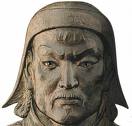
1206 On Mar. 15 Mohammed of Ghor (b. 1149) dies after completing his conquest of N India, turning the former caste-conscious Brahma-Vishnu-Shiva worshipers into Allah-akbar shouters; Delhi viceroy (former slave) Kutub (Qutb) al-Din (Kutb-ud-din) (not to be confused with the Persian Muslim astronomer born in 1236), leader of the Muslim raiders in N India proclaims himself sultan, and sets up the Slave Sultanate of Delhi (ends 1288) as an independent Muslim state in Delhi (part of the Khivan Empire) called Hindustan. In June King John lands in France at La Rochelle to defend Aquitaine, and captures a castle in Gascony, then moves N and captures Anjou; on Oct. 26 John and Philip II agree to a 2-year truce, and John returns Anjou to France. On Dec. 11 after Subprior Reginald spills the beans on his trip to Rome for confirmation, King John forces them to elect John de Grey as Canterbury archbishop; meanwhile Pope Innocent III has his own ideas, and invalidates both of them and selects his old Paris U. student friend Stephen Langton (1156-1228) (inventor of the chapter division of the Bible this year) to fill the vacancy, but John refuses to recognize his election, protesting that this Frenchie has no political qualifications, starting a 6-year war. Temujin ("iron-worker") is acknowledged as the supreme leader of the steppes at a kuriltai (tribal meeting), and given the name Genghis (Chingis) (Jengis) Khan (1162-1227), "emperor of all emperors" (chief prince of the Mongols), uniting the Mongols and molding them into a fighting force before invading Manchuria - I don't care, it's 5 o'clock somewhere, let's get going? St. Sava (1174-1236) brings the body of his daddy St. Stefan I Nemanja's (b. 1199) back to Serbia, and reburies it in Studenica Monastery, where holy oil again allegedly seeps from his tomb, causing the civil war between his sons Stefan II and Vukan II to end, and the Cult of St. Simeon to be founded. Yaroslav Vsevolodovich is summoned by the boyars of Halych (Galicia) on the Dniester River in W Ukraine to rule their town, but fails to stick, after which his daddy Vsevolod III sends him to take Ryazan, but they resist so stubbornly that he burns it - things are always better when they fit you right? Spanish Castilian priest St. Dominic (Domngo Felix de Guzman) (1170-1221) attempts to convert Albigensians in Prouille, France with litttle success until he allegedly receives a vision of the Blessed Virgin, who gives him the Rosary as a tool against heretics, going on to found the Dominican Order (Order of Preachers, which is approved by Pope Honorius III via the bull Religiosam vitam of Dec. 22, 1216. Bonds issued by the govt. of Venice (first issued in 1157) become negotiable and transferable, becoming the first negotiable gold certificates; Como does ditto in 1250. Inventions: U. of Paris prof. Stephen Langton introduces the Chapter Division of the Bible - that way we can keep hoping to read Christ's imminent return in between the lines? Births: Bavarian Wittelsbach duke and count palatine of the Rhine (1222-53) Otto II (the Illustrious) of Bavaria (d. 1253) on Apr. 7 in Kelheim; son of Louis I (1173-1231) and Ludmilla of Bohemia (-1240). Hungarian-Croatian king (1235-70) Bela IV (d. 1270); also Bela III of Croatia (1235-70); son of Andras II (1175-1235) and 1st wife Gertrude of Merania (1185-1213) (sister of Merania, wife of Philip II of France).

1207 On June 17 Pope Innocent III consecrates Stephen Langton at the papal palace in Viterbo (40 mi. NW of Rome), and in Aug. threatens an interdict against King John; not phased, John bans Langton from England, threatens to burn the cloisters over any rebellious monks, and swears "by the teeth of God" that if the interdict is laid on England he will banish all Roman Catholic clergymen from England, and put out the eyes and cut off the noses of some for funners. In Oct. Kaloyan is killed (murdered?) while sieging Salonika (Thessalonica), and his nephew (son of his sister) Boril (-1218) becomes tsar of Bulgaria (until 1218), causing the intended heirs Ivan Asen and Alexander to flee; he adopts the Byzantine appanage system, preventing the emergence of self-governing cities; meanwhile the snubbed Asen family heirs attempt to set up independent principalities. Theodore I Lascaris of Nicaea, allied with the Seljuks of Rum defeats David Comnenus and drives him back to Sinope, then concludes a truce with Latin emperor Henry I to oppose the advance of Alexius III of Trebizond, who is allied with the Seljuks. Papal legate Pierre de Castelnau (-1208) excommunicates Count Raymond VI of Toulouse (1156-1222) for supporting (tolerating) the Cathars (Albigensians). Bishop Albert of Livonia begins fortification of the new (1201) bishopric town of Riga at the mouth of the Daugava River on the Gulf of Riga (modern-day pop. 641K/1M) with Philip of Swabia investing bishop Albert of Riga with Livonia as a fief and principality of the Holy Roman Empire; the Livonian Order is given one-third of all the land in order to create a standing army; Bishop Albert otains papal bulls giving German merchants a mandate to carry on all Baltic trade through Riga, insuring its commercial success, becoming the largest city in Latvia. Seljuk sultan Kaykhusraw I of Rum seizes Antalya from the Byzantines, giving Rum a port on the Mediterranean. Pope Innocent III switches sides in the contest for HRE from Otto of Brunswick to Philip of Swabia; too bad, he dies next year before he can be officially crowned. The port city of Liverpool (OE "muddy pool") (modern-day pop. 485K/2.4M) on the E side of the Mersey Estuary in NW England is chartered by Beatle, er, King John as a borough; the name was first mentioned about 1190 as Liuerpul; King John designs the street plan, with seven streets laid out in an H shape, incl. Bank (later Water) St., Castle St., Chapel St., Dale St., Juggler (later High) St., Moor (later Tithebarn) St., and Whiteacre (later Old Hall) St.; since 18333 the inhabitants are called Liverpudlians, also Scousers (after the local stew scouse or lobscouse); in 1699 Parliament makes Liverpool a parish, and its first slave ship Liverpool Merchant sails for Africa; since Roman times the nearby town of Chester on the Dee River has been the principal Irish Sea port, but as it silts up Liverpool takes over; in modern times middle-class Liverpudlians are called Liverpolitans. Poetry: Anon., Poema del Cid; written in Vivar, Spain. Art: Unkei, Asanga (sculpture). Births: Persian Mevlevi Sufi (Whirling Dervishes) founder and mystical poet Mawlana (Mevlana) Jalaluddin (Jalal al-Din) Muhammad Rumi (Balkhi) (d. 1273) on Sept. 30 in Balkh, N Afghanistan; flees from the Mongols W to Konya in Anatolia (Iconium) near the Neolithic ruins of Catal Huyuk, preaching a gospel of love. English king #28 (1216-72) Henry III (of Winchester) (d. 1272) on Oct. 1 at Winchester Castle; son of John I (1167-1216) and Isabella of Angouleme (1187-1246). Hungarian princess (St.) Elizabeth (Elisabeth) (Heb. "pledged to God") of Hungary (d. 1231) on July 7 in Sarospatak; daughter of Andras II (1175-1235) and Gertrude of Andechs-Merania (1185-1213); canonized in 1235; feast day: Nov. 17/19; wife (1220-7) of Ludwig IV of Thuringia (1200-27); mother of Hermann II (1222-41), Sophie of Thuringia (1224-84), and Gertrude of Altenberg (1227-97). Savoy count (1268-85), bishop of Valence (1241-67), and archbishop of Lyon (1245-67) Philip I (d. 1285) in Aiguebelle; 8th son of Thomas I (1178-1233) and Marguerite of Geneva (1180-1252); brother of William of Savoy (-1239); father of Amadeus V (1249-1323). Deaths: German minnesinger Reinmar the Old of Hagenau (b. ?); born in Alsace.

1208 On Jan. 15 a knight working for Count (since 1194) Raymond VI of Toulouse (1156-1222) kills papal legate Pierre de Castelnau, and Pope Innocent III deposes him for it; the pesky Byzantine heretics seemingly in hand, Pope Innocent III first vainly appeals to Philip II of France, who refuses to get involved, then proclaims a Crusade against #2 on his list, the Cathars (Albigensians) (Catharists of Albi) ("the Western Buddhists"), a group of sects of too loose heretical dualistic vegetarians in S (Provencal) France centered in Toulouse, which started out as a reaction against clerical corruption but was joined by the nobles as a way to appropriate Church lands, becoming fabulously wealthy and getting mixed-up with the Templars; believing that Christ was a prophet of Amor (love), they refuse to make a big deal of the Crucifixion, which they regard as an emblem of Rex Mundi (Lord of the Material World), which has twisted Amor into its opposite, Roma, also denying the sacraments of Baptism and Communion, and practicing birth control and abortion, accepting reincarnation and the female principle, allowing women parfaits (priests), and insisting on direct personal contact with God rather than mere faith; looking for a get-out-of-purgatory-free card, Duke Eudes III of Burgundy steps up to the plate and organizes a campaign against the Cathar strongholds in Languedoc next year, starting the Albigensian Crusade (ends 1229). On Feb. 24 (Feast of St. Matthias) (St.) Francis of Assisi (1182-1226) (Giovanni Francesco Bernardone) takes up the Apostolic life. On Mar. 24 Pope Innocent III gets the bishops of London, Ely, and Worcester to impose an interdict on England suspending all ecclesiastical rites except for baptism and extreme unction, closing churches and burying the dead in unconsecrated ground, after which they are forced to flee England; King John seizes the revenues of Canterbury and drives its monks into exile, causing Archbishop Geoffrey of York to excommunicate the king's tax collectors and flee to France; the clergy support the interdict despite the consequences, and the commoners are distressed, but the nobles aren't too pissed off at King John, as he confiscates the property of all clergy who obey the pope, leaving their own wealth alone - I am Sharpei all the way? On June 21 just when he had the German throne sewn up, and had made a deal to marry off one of his daughters to the pope's nephew and give him the dukedom of Tuscany, Philip of Swabia (b. 1177) is murdered in Bamberg by Bavarian count palatine Otto VIII von Wittelsbach (1180-1209) for refusing the hand of one of his daughters, and on Nov. 1 the Diet of Frankfurt confirms his election as German king; Pope Innocent III can count to one, and switches to his side again. On June 30 after invading Thrace and defeating the Crusaders in June at the Battle of Beroia (Stara Zagora), 33K Bulgarians under Boril are defeated by the main Crusader force of 2K knights plus several thousand soldiers at the Battle of Plovdiv (Philippopolis); this time the Crusaders don't fall for the same tricks as in Adrianapole, and instead lure Boril into a trap, causing him to flee and his army to follow; he refuses to give up and make peace until 1213. Gwenwynwyn ab Owain Cyfeiliog (-1216), ruler of S Powys in middle Wales is arrested by King John of England, allowing his son-in-law Llywelyn the Great to steal Powys and Ceredigion (until 1210), becoming the last major ruler of middle Wales before the 1066 Norman Invasion. Ermengol VIII (b. 1158) dies, and his daughter Aurembiaix (Aurembiax) (1196-1231) becomes the last count of Urgell in N Spain. Pope Innocent III warns the Knights Templar about their unchristian behavior incl. necromancy. Fulda in Hessen, C Germany, home of a Benedictine abbey since 744 becomes a town. Births: Spanish king of Aragon, count of Barcelona, king of Majorca, and lord of Montpellier (1213-76), and king of Valencia (1238-76) James I (the Conqueror) (d. 1276) on Feb. 2 in Montpellier; only son of Peter II of Aragon (1174-1213) and Mary of Montpellier (1182-1213) (daughter of William VIII of Montpellier); soon after his birth Peter II dumps his mommy Mary, who becomes a local saint for her piety and marital suffering; father of Peter III of Aragon (1239-85) and James II of Majorca (-1311). English soldier ("Father of the English Parliament") Simon de Montfort, 6th Earl of Leicester, 1st Earl of Chester (d. 1265) on May 23 in France; son of famous Albigensian Crusader Simon de Montfort, 5th earl of Leicester (1160-1218). Mongol Great Khan (1251-9) Mongke (Möngke) (Mangu) Khan (d. 1259); son of Genghis Khan's son Tului and a Nestorian woman; elder brother of Kublai Khan (1214-94) and Hulagu Khan (1217-65). Turkish humorist writer Nasrettin Hoca (d. 1284) in Sivrihisar. Deaths: German king (1198-1208) Philip of Swabia (b. 1177) on June 21 in Bamberg (assassinated).



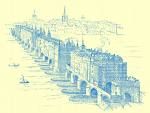

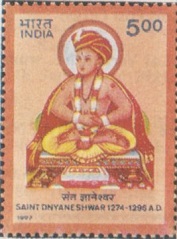
1209 A 140-year drought begins in Calif. (ends 1350), causing water levels to drop 50+ ft. On Mar. 30 (Easter Mon.) Black Mon. sees 500 English settlers from Bristol massacred in Dublin, Ireland by the O'Byrne Clan near Ranelagh Wood, starting a trend (1351, 1360). In Apr. after a decade of negotiations over Northumberland, rumors that William I of Scotland is negotiating with the French cause John I to come N with an army and meet him personally at Roxburgh, where they face each across the Tweed River, and after a lot of diddley doo William caves in, signing an agreement on Aug. 7 at Norham agreeing to pay John 15K marks, renounce his rights to Northumberland but reserve them for his son Alexander II when he comes of age, and give his daughters Margaret and Isabel to John's care so that one of them might marry one of his sons Henry or Richard and produce an heir that would become Alexander's heir. On June 18 Raymond VI of Toulouse does public penance; on July 22 after 30K Crusader knights and foot soldiers under Simon de Montfort storm Languedoc in SE France along the Garonne River, the most advanced and civilized section of France, known for religious tolerance along with mass abandonment of Roman Catholic faith, 15K-20K are massacred in Beziers (Béziers) after an officer allegedly asked a papal rep how to distinguish Cathar heretics from true Roman Catholic believers, and was told "Kill them all, God will recognize his own"; they then do ditto to Perpignan, Narbonne, Carcassone, and Toulouse. On Oct. 4 Otto of Brunswick, Welf count of Flanders is crowned HRE Otto IV (1175-1218) by Pope Innocent III (until 1215). Theodore I Lascaris of Nicaea repulses a 2nd attempt by the Crusaders under Peter of Bracheuil to conquer Bithynia and gain access to Anatolia. In Nov. after King John meets with Stephen Langton's brother Simon, then decides to confiscate the property of clergy who refuse to celebrate their offices, Pope Innocent III excommunicates him; John responds by invading Scotland and holding the children of suspect barons as hostages to insure their loyalty. William of Champlitt dies, and Geoffrey I of Villehardouin (1160-1218) becomes prince of the Latin principality of Achaea (until 1218). Peter II names his uncle Count Sancho of Roussillon, gov. of Provence and Languedoc as regent for James I the Conqueror (b. 1208) (until 1213). Pope Innocent III commissions Cistercian monk Christian to convert the heathen Prussians; meanwhile Hermann von Salza (1179-1239), friend and councilor of HRE Frederick II becomes grandmaster #4 of the Teutonic Knights (until Mar. 20, 1239), with his first Mission: Impossible being to defend Transylvania against the pesky Cumans. The Council of Avignon mocks Jewish laws of cleanliness by prohibiting "Jews and harlots" from touching bread or fruit exposed for sale, renewing Church laws against Jews hiring Christian servants, and warning the faithful not to exchange services with Jews, but to avoid them as a pollution. A student at Oxford U. kills a woman and flees, and his roommates, vainly claiming clerical immunity are hanged in his stead, causing teachers and students to leave Oxford for close (but not too close) (80 mi.) Cambridge(shire) ("bridge over the Cam or Granta River") in protest until a new agreement is made with the town in 1214; when some like it and decide to stay, the second great English U. is born, eventually forming the Oxbridge nexus of English eggheads - like switching from Ford to Chevy but staying with Detroit? Genghis Khan defeats the Kirghiz and Uighurs, then invades NW China and conquers the Tanguts (Western Xia) (of Tibetan origin). St. Francis of Assisi issues the first Rules of the Franciscan Brotherhood, with the First Order being Friars Minor. Architecture: The stone London Bridge across the Thames River is completed after 33 years (begun 1176), with the Chapel of St. Thomas on the Bridge in the center dedicated to martyr Thomas Becket, becoming the official start of the pilgrimage to his shrine in Canterbury; in 1212 a fire breaks out on both ends; by 1358 it is home to 138 shops plus a number of latrines; another fire during Wat Tyler's Peasant Revolt of 1381 burns a number of houses, and ditto during Jack Cade's rebellion of 1450; a major fire in 1633 destroys the northern third of the bridge, forming a firebreak preventing further damage during the 1666 Great Fire of London. St. Peter's Church in Riga, Latvia is built. Nonfiction: Vatican MS. 1209 is created, becoming for cents. the oldest preserved genuine text of the Christian Greek scriptures (New Testament) among some 4K; it doesn't come into the Vatican's possession until the 15th cent., after which it is locked up to scholars until the pub. of the Codex Sinaiticus, a 4th cent. ms. found in 1844 on Mount Sinai in St. Catherine's Monastery causes the Vatican to finally pub. facsimiles. Poetry: St. Dnaneshwar (1274-96), The Konkani; a commentary on the Bhagavad Gita in Konkani, the language of W coast India; "Om! I salute you, O Primal Lord, propounded by the Vedas; glory to you, who are known only to yourself, O supreme Self." (opening) Births: Portuguese king #4 (1223-46) Sancho II (the Pious) (the Caped) (d. 1248) on Sept. 8 in Coimbra; eldest son of Afonso II (1186-1223) and Infanta Urraca of Castile (1186-1220); brother of Afonso III (1210-79). Deaths: Welsh poet-satirist Walter Map (b. 1140). Persian romantic poet Nizami Ganjavi (b. 1141); leaves the untranslatable Khamsa (Quintet) (Five Masterpieces). Muslim theologian Fakhr al-Din al-Razi (b. 1149).
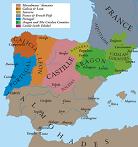
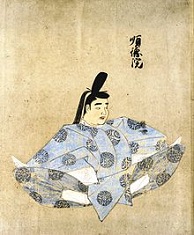
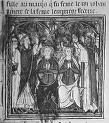

1210 On Sept. 13 French Crusader John of Brienne (1170-1237) reaches Acre, and on Sept. 14 he marries Marie de Montferrat (1192-1212) (queen of Jerusalem since 1205), and on Oct. 3 is crowned king of Cypress and Jerusalem in Tyre (until 1225). In Sept. rainstorms in Scotland cause flooding and destroy the harvest; the royal castle at Perth is swept away, and William I and his brother narrowly escape by boat; a revolt then begins in Moray, which William I quashes at the expense of his failing health. On Nov. 18 after HRE Otto IV invades Sicily (papal territory) to seize it from his boy Frederick II of Hohenstaufen, Pope Innocent III excommunicates him for it. On Dec. 12 retired emperor Go-Toba (b. 1180) pressures emperor (since Feb. 18, 1198) Tsuchimikado (b. 1196) into abdicating, and Go-Toba's 3rd son Juntoku (1197-1242) (personal name Morinari) becomes Japanese Yamato emperor #84 (until May 13, 1221), while Go-Toba wields the real power as a cloistered emperor. Loose brown lips sink ships? After once up-and-coming William de Braose, 3rd baron Abergavenny and his wife Maude de St. Valery shoot off their mouths and tattle that John I killed his nephew Arthur, John sends a force which invades Wales and lacklands their domains, claiming unpaid fees; he then goes on a second expedition to Ireland (first 1185) to capture his pesky son William de Braose, 4th Baron Abergavenny (1175-1210), husband of Mathilde (Maude) de Clare (1180-1213) (daughter of Richard de Clare, 3rd earl of Hertford), after which he starves them to death in Windsor and/or Corfe Castle; 20 Irish kings do homage to King John, and he expands his king's council in Ireland, forming the basis of the Irish parliament; too bad, John's cruelty backfires, scaring the other barons into fomenting a revolt, becoming his greatest mistake; he does let Little Brownose's sons John, Giles, Philip and Walter live, and they are released from prison in 1218 to carry on the Brownose, er, Braose name. The Council of Avignon excommunicates Raymond VI of Toulouse, and he goes to Rome to try and clear himself with Pope Innocent III; on his return he finds his dominions overrun by Simon IV de Monfort, baron of Ile de France, who becomes count of Toulouse. The Khwarezmians defeat the Qara-Khitai and conquer Transoxiana. John "Francesco" Bernardone (1182-1226) of Italy (St. Francis of Assisi) gets Rome's support for his group of teenaged "little brothers", founding the Franciscan Order - they peak sexually at age 17 anyway? Yaroslav II Vsevolodovich (1191-1246) is sent by his daddy Vsevolod III to fight new prince Mstislav Mstislavich the Bold of Novgorod, who raises his siege of Tozzhok, and after several battles they make peace in 1214 and Yaroslav secretly marries his daughter Rostislava Mstislava (maternal granddaughter of Kotian Khan); too bad, they divorce in 1216. The Council of Paris reacts to the shock of Latin translations of Aristotle's "Physics" and "Metaphysics" and the commentaries of learned Muslim infidel brain man Averroes by condemning Aristotle proponents Amalric of Bena (-1207) and David of Dinant (1160-1217) (who began attacking Christian doctrines incl. miracles, creation, and immortality, leading their followers to deny heaven, hell, and the sacraments), and forbidding the reading of Aristotle's "metaphysics and natural philosophy" along with any "comments" (commentaries); too bad, this only makes them more popular, and in 1215 a papal legate arrives in Paris to repeat the prohibition, which doesn't stop Aristotle from being required reading at the U. of Paris in 1255; 10 Amalricians are burned at the stake, and Amalric's bones are exhumed and burned in a Paris square; David of Dinant's book Quaternuli is condemned and burned. Beginning in this decade anti-Semitism markedly rises in France, with Jewish goods being seized and special taxes imposed (until 1289). In this decade tiles begin replacing thatched and wooden roofs on London houses. In this decade the village of Cosmeston in the Vale of Glamorgan in S Wales begins as a fortified manor built by the Norman invader De Constentin family. In 1210-50 (1230-70?) Old French trouvere Colin Muset from Lorraine flourishes in Champagne. Architecture Blarney Castle 5 mi. from Cork, Ireland is built on the site of a timber house by the MacCarthy clan of Muskerry, becoming the site of the famous Blarney Stone in 1446. Births: Portuguese king (1248-79) Afonso III (the Brave) (d. 1279) on May 5 in Coimbra; 2nd son of Afonso II (1186-1223) and Infanta Urraca of Castile; brother of Sancho II (1209-47). Scottish queen consort (1221-38) Joan (Joanna) (d. 1238) on Jully 22; 3rd child of King John and Isabella of Angouleme; wife (1221-) of Scottish king Alexander II. Swedish statesman Birger Jarl Magnusson (d. 1266). Italian surgeon-cleric William of Salicet (Guglielmo da Saliceto) (d. 1277) in Saliceto. Scottish king's mother Devorguilla of Galloway (d. 1290); wife (1223-) of John I de Balliol, 5th baron de Balliol (-1268); mother of John I (1249-1314). Persian poet Sadi (Saadi) (Abu Muhammad Muslih al-Din bin Abdallah Shirazi) (d. 1291) in Shiraz. Deaths: French poet Jean Bodel (b. 1167) early in the year in Arras (leprosy); leaves La Chanson des Saisnes (Song of the Saxons), about Charlemagne's war with the Saxons and their king Widukind (Guiteclin). German poet Hartmann von Aue (b. 1170); leaves Iwein (based on the Arthurian cycle), Gregorius (romance). German poet Gottfried von Strassburg (b. ?); leaves the unfinished epic Tristan (and Isolde), based on a vers. by French trouvere Thomas; Tristan (Tristram) (Lat. "sad") is a knight sent to Ireland by King Mark of Cornwall to bring back Princess Isolde to be his bride, but they fall in love and tragically die together; in some versions Isolde is a princess of Brittany; helps inspire Richard Wagner's 1865 opera "Tristan und Isolde".

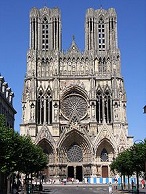
1211 In Jan. Gofraid (Guthred) mac Domnaill (MacWilliam) (-1213), son of Donald Mac William (d. 1187) begins a bloody revolt in Ross, N Scotland, causing bedridden William I to have to leave Kintore with his physician Master Martin and fight him for 3 mo., then return S and leave his troops to carry on without him, who luck out when Gofraid's supporters go fraidy cat and betray him to William Comyn, justiciar of Scotia (warden of Moray), who beheads him. On Mar. 27 Sancho I (b. 1154) dies, and his son Afonso II (the Fat) (Gordo) (1185-1223) becomes king #3 of Portugal (until Mar. 25, 1223), dropping the territorial enlargement war with Castile to insure peace, dealing with pesky brother Peter I and sisters Mafalda, Sancha, and Theresa, eventually exiling Peter I; going on to design Portugal's first written laws and send ambassadors to Euro kingdoms outside the Iberian Peninsula to establish commercial relations, attempting to weaken the power of the clergy by applying a portion of Church revenues to govt. use, ending up getting excommunicated by Pope Honorius III. On Mar. 31 the 1211 Synod of Rome announces the excommunication of HRE Otto IV; in Sept. the Diet of Nuremburg invites Frederick of Hohenstaufen (later HRE Frederick II) to be German king in Otto IV's place. In July Latin patriarch #1 of Constantinople(since 1204) Thomas Morosini (b. 1170) dies; his see remains vacant until Nov. 15. In Aug. after falling out with Llewelyn the Great and invading Gwynedd and being driven back, John I reinvades, crosses the Conwy River and invades Snowdonia, then burns Bangor and captures its bishop, causing Llywelyn to sign a peace, giving up all his lands E of the Conwy River along with his illegitimate son Gruffydd as a hostage (until 1215). On Oct. 15 the Battle of the Rhyndacus River is a V by the Latin Empire over the Nicaean Empire, allowing the Latins to push into Pergamum and Nymphaeum until being slowed by guerrilla warfare. Theodore I Lascaris is defeated by HRE Henry I at the Battle of Luparcos, and makes peace, abandoning part of Mysia and Bithynia to the emperor, who begins the invasion of Anatolia. Seljuk sultan Kaykhusraw I of Rum is KIA in single combat with Theodore I Laskaris of Nicaea, and his eldest son Kaykaus I (-1220) becomes sultan of Rum (until 1220); under his rule the sultanate peaks. Mongol attacks on the Manchurian Jin Dynasty begin, led by Genghis Khan, who gets the edge when the stupid Jin cmdr. sends messenger Ming-Tan to talk rather than attack first, and he defects and gives away their position at Badger Pass, allowing the Mongols to massacre thousands of Jin troops and win a big V. At the request of King Andras II of Hungary, Hermann von Salza leads his Teutonic Knights to the Burzenland in Transylvania to fight the Cumans, but after the Hungarian nobles complain, they leave by 1225. 300 Jewish rabbis leave persecution in England and France to settle in Jerusalem, where they are welcomed by Saladin's brother Sultan al-Adil. Riga mints its first coinage. The town of Kirkintilloch (Gael. "fort at the end of the hill") (AKA Kirkie or Kirky) on the old Antonine Wall in modern-day East Dunbartonshire, Scotland is granted burgh status, becoming an important staging post for W-E journeys from Glasgow to E and NE Scotland. Architecture: The Cathedral of Santiago de Compostela (begun 1060) is finished. On May 6 after the original 5th cent. church burned down last May 6, the new High Gothic Notre-Dame de Reims (Our Lady of Reims) Cathedral in Reims (Rheims), France is begun by architects Jean d'Orbais (1175-1231) (master architect), Jean-le-Loup (who replaces Jean d'Orbais in 1231-47 or 1235-51), Bernard de Soissons (1255-90 or 1259-94), and Gaucher de Reims (1247-55 or 1251-9), complete with 3-tier elevation and qudripartite vaults; it is finished in 1275, with the upper facade taking until 1311. Riga Cathedral (Riga Dom) is begun, becoming the largest medieval church in the Baltic states. Nonfiction: Ralph of Coggeshall, Suffolk, England, Chronicum Anglicanum; claims that some fishermen netted a naked, bearded, hairy-chested merman, who can't speak and likes to eat raw fish; also claims that two mysterious green-skinned children appeared in Woolpit, England wearing strange clothes and speaking an unknown language - Mel Gibson's ancestor? Klaas van Haarlem, William of Orange (1211-17). Births: Austrian-Styrian Babenberger duke (1230-46) Frederick (Friedrich) II (the Quarrelsome) (the Warlike) (d. 1246) on Apr. 25 in Wienr Neustadt; son of Leopold VI (1176-1230) and Theodora Angelina. Deaths: English fallen brownose William de Braose, 3rd Baron Abergavenny (b. 1153) on Aug. 2 in Corbil, Marne, France. Roman Byzantine emperor #159 (1195-1203) Alexius III Angelus (b. 1153). Portuguese king (1185-1211) Sancho I (b. 1154) on Mar. 27. Italian Latin patriarch of Constantinople #1 (1204-11) Thomas Morosini (b. 1170) in July.


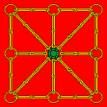
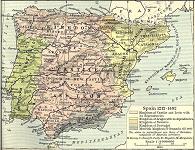
1212 Early in the year Llywelyn the Great allies with other Welsh princes and recovers his lands from King John er, Lackland, who summons his English feudal army for an Aug. campaign in Gwynedd, Wales, but dismisses it after he learns that his barons are plotting treason against him, and restores some of the lands of Gwenwynwyn ab Owan, which doesn't fool Llywelyn any, allying with Philip II of France (until 1216). In Feb. Scottish Queen Ermengarde meets with King John to renegotiate the 1209 Scottish-English treaty, and John agrees to arrange the marriage of his infant daughter Joan (Joanna) (1210-38) to her 14-y.-o. son Alexander II (b. 1198), causing the latter to travel S with King John to be knighted at Clerkenwell Priory in London (HQ of the Hospitallers) next year. On Apr. 12 Vladimir grand prince (since 1177) Vsevolod III the Big Nest (b. 1154) dies, and his 3rd son Yuri (Gyorgy) II Vsevolodovich (1189-1238) becomes grand prince #4 of Vladimir (until 1216), getting into a war with dispossessed #1 son (elder brother) Konstantin Vsevolodovich (1186-1218), who allies with Mstislav the Bold against him; meanwhile #4 son Yaroslav Vsevolodovich is bequeathed Pereslavl-Zalessky, and allies with Yuri II. In Apr. after leaving Ireland and arriving in Ross to raise a rebellion against aged unloved Scottish king William I, the latter leads a great army N but fails to win a decisive V, returning to England and leaving Maol (Mael) Choluim (Malcolm), Mormaer of Fife (1204-28) as his lt. in Moray, then facing another army led by Alexander I's son Alexander II followed with another army led by William I incl. Brabant mercenaries supplied by King John of England, Scottish rebel Gofraid Mac William (Domnaill) (b. ?) is betrayed to William Comyn, Justiciar of Sotia and Warden of Moray, captured and beheaded this year or next. In June the Children's Crusade in France (poor people not children?) is preached by big-mouthed boys Stephan (Stephen) of Cloyes (b. 1200) and Nicholas of Cologne (b. 1202); too bad, it fizzles when Stephan's crowd is sold into slavery or returns home after reaching Marseilles, while Nicholas' contingent allegedly reaches as far as Pisa and the Papal States before being turned back; the origin of the legend of the Pied Piper? In the summer King John oversees the hanging of 28 sons of Welsh princes and lords who were being held hostage for their fathers' good behavior, incl. one less than 7 years old. 1200 years of Christ's teachings and 600 years of Muhammad's teachings collide in Spain, and the total loser Christians turn their trash into cash with a big Muslim yard sale? On July 16 (Mon.) Alfonso VIII of Castile and Leon, leading a 50K-80K-man kiss-and-make-up Christian army (largest yet in Spain) which incl. the armies of rivals 7-ft.-tall Sancho VII of Navarre, Peter II the Catholic of Aragon, and Afonso II of Portugal sneaks through the Despenaperros Pass and surprises, defeats, and systematically slaughters a 300K-400K-man Berber Almohad army from Spain and N Africa under caliph Muhammad al-Nasir at the turning point Battle of Las Navas de Tolosa, with 100K Muslim vs. 2K Christian casualties; the battle is won when 7-ft.-tall Sanho VII of Navarre leads his men through the wall of nearly naked chained African slave soldiers carrying hippo hide shields surrounding the tent of caliph al-Nasir, who dies shortly afterward (next year) in Marrakesh, and is succeeded as Almohad caliph #5 by his 16-y.-o. son Yusuf II (1197-1224) (until 1224); Muslim rule in Iberia begins to slide as 1M panicked Muslims flee back to N Africa, after which the Almohads become kaput in Spain by 1232, and all the Muslims have left in Iberia is a toehold in Granada in the S, which is a tributary of Castile; Sancho VII of Navarre adopts the Chains and Emerald Emblem; July 16 becomes the Spanish holiday called Triumph of the Holy Cross until the Second Vatican Council abolishes it; meanwhile, as Peter II is out slaughtering Muslims, Simon IV de Montfort, 5th Earl of Leicester (1160-1218), leader of the anti-Cathar Albigensian Crusade conquers Toulouse and exiles Count Raymond VI, causing him to call on the aid of his brother-in-law Peter II, who comes a-runnin'. In Nov. Pope Innocent III gives King John an ultimatum to submit by June 1, 1213 or be declared deposed, and he finally begins to crack? On Dec. 2 the Diet of Frankfut elects Frederick II of Hohenstaufen as German king Frederick II (1194-1250) (until Dec. 13, 1250), and deposes HRE Otto IV of Brunswick, who refuses to abdicate, causing pissed-off Pope Innocent III to conclude an alliance with Philip II Augustus of France to aid Frederick II against the "usurper", who allies with King John of England to make war on France; meanwhile Ottokar I of Bohemia receives the Golden Bull of Sicily, a decree by Frederick II on Sept. 26 in Basel proclaiming Bohemia a kingdom and Bohemian princes hereditary kings; of course, popes don't give you the world without buying your soul, so Frederick II has to promise his former guardian Innocent III to relinquish his possessions in Sicily and S Italy to calm the papal fear of a union of Italy and Germany, plus free the clergy from lay jurisdiction and taxation, and practice exemplary cruelties upon German heretics to earn brownie points; too bad, after his seat is warm, well-read freethinker Frederick II reneges, preferring balmy Sicily as a residence to freezing Germany, continually baffling his guardian Pope Innocent III until his death in 1216 - didn't he follow Dr. Spock? Venice conquers Crete. France enacts the death penalty for sodomy, becoming the first Euro criminal law against it since Visigoth Spain in 654, which didn't have a death penalty; in 1250 Norway and Castile enact the death penalty for homosexuals, followed by Bologna, Italy in 1259, Siena, Italy in 1262, England in 1275, France in 1283, and Florence, Italy in the 1340s - Norway or the highway? Queen Mary de Montferrat of Jerusalem (b. 1191) dies of puerperal fever from childbirth, and her hubby John of Brienne becomes regent for their infant daughter Yolande (Isbella) II de Brienne (1212-28). Bishop Albert of Riga forces the city of Polotsk on the Polota and Divina Rivers to grant German merchants free river passage, and they concede Kukenois (Koknese) and Jersika, also ending the pagan Livs' tribute to Polosk. St. Francis and his friend Claire found the Second Order of Franciscans (cloistered nuns). Births: Japanese Yamato emperor #86 (1221-32) Go-Horikawa (Yutahito) (d. 1234) on Mar. 22; 3rd son of prince Morisada, 2nd son of Takakura (1161-81). Welsh prince (1240-6) Dafydd ap Llywelyn (d. 1246) in Mar./Apr.; son of Llywelyn the Great (1173-1240). Italian holy domestic servant (St.) Zita (d. 1272) in Monsagrati (near Lucca), Tuscany; feast day: Apr. 27 (bake some bread?); patron saint of domestic servants, helps find lost keys. Portuguese king #5 (1248-79) Afonso (Alfonso) III (the Brave) (d. 1279); son of Afonso II (1186-1223); brother of Sancho II (1210-48). Deaths: German duke of Saxony (1180-1212) Count Bernhard of Anhalt (b. 1134) in Ballenstedt. Russian grand prince Vsevolod III the Big Nest (b. 1154) on Apr. 12. French knight-historian Geoffrey de Villehardouin (b. 1160). Jerusalem queen (1205-12) Maria of Montferrat (b. 1291) (puerperal fever).


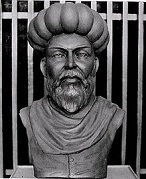
1213 Medieval soundbyte of the century by Pope Geraldo? Pope Innocent III declares that Muhammad has been positively identified as the Antichrist, and that the Second Coming of Christ will happen in 1284 because it is 666 years after the founding of Islam (618). On Jan. 18 Georgian queen (since Mar. 27, 1184) Tamar the Great (b. 1160) dies, having expanded her pan-Caucasian realm from the Greater Caucasus Crest in the N to Erzurum in the S, and from Zygii in the NW to Ganja in the SE, with Shirvan as a vassal, Trebizond as an ally, and the Zachariad regime in Armenia as an ally; her son (coregent since 1207) George (Giorgi) IV Lasha (1191-1223) succeeds as king of Georgia (until Jan. 18, 1213), going on to face the horrific Mongols and see the empire crumble while going for Sufism. On Jan. 27 Philip II of France arranges the marriage of Alix of Thouars (b. 1201) to his cousin Peter Mauclerc of Dreux (1190-1250), whose father Robert I of Dreux is Louis VII's younger brother, and who becomes duke-regent Peter I in Alix's name; too bad, she dies in childbirth in 1221 without ever gaining control; meanwhile Peter becomes a pawn of John I of England, who dangles the earldom of Richmond in his face, at a price, causing him to leave the English army alone next year as it moves through Brittany. On Apr. 21 after seeing him alienate his own subjects by his many excesses, incl. fathering illegitimate children, jailing Jews to milk them of money, insulting nobles, allowing prelates to die in jail, and enforcing unpopular forestry laws, Pope Innocent III issues a Bulla Aurea (Golden Bull) calling for an ecumenical council, and deposes King Kong, er, John, authorizing Philip II of France to execute the sentence, fomenting a revolt in John's ranks and causing him to end up without support by his subjects who hate his werewolf guts, esp. when they hear rumors of a French invasion. On May 30-31 the English fleet led by Earl Wllliam Longespee of Salisbury stops the planned invasion by accidentally encountering and destroying the French fleet off the coast of Flanders in the Flanders; the French now turn against the count of Flanders, who counters on July 27 by forming the Anti-Capetian Alliance of King John, Emperor Otto IV (John I's nephew), the count of Boulogne, and most of the nobles of Flanders, Belgium, and Lorraine, causing Philip II and the pope to back a rival candidate for the imperial crown; on July 20 John's excommunication is lifted; on July 30 Stephen Langton is allowed to enter England from exile in France and act as archbishop of Canterbury; on Aug. 25 at a council in Westminster, Langton announces a mutual security agreement for the preservation of English laws, and reads Henry I's charter of liberties to the barons, persuading John not to punish them for not paying their scutages (shield taxes) (monetary payments in lieu of military service). It finally happens: An army of real turn-the-other-cheekers get more than their cheeks slapped by the Catholic Reality TV Show of the time? On Sept. 12 after king (since Apr. 25, 1196) Peter II of Aragon (b. 1178) comes to the aid of his brother-in-law Count Raymond VI Count of Toulouse against Simon IV de Montfort, he is unhorsed, shouts "I'm the king", but is KIA anyway by enemy troops at the Battle of Muret, after which his 30K-40K Albigenses panic and are defeated by 1.8K Roman Catholic Crusaders, who split their army into three divs. in honor of the Trinity; the Provencal culture in S France is now systematically wrecked along with the Albigensian heresy in a long series of horrors by disgusting Simon IV de Montfort, and many troubadors flee S France to Aragon and Catalonia; Peter II's son James I (the Conqueror) (1208-76) becomes king of Aragon (until July 27, 1276), going on to expand Aragon into Valencia to the S, Languedoc to the N, and the Balearic Islands to the N, plus get hold of the county of Barcelona from Louis IX, establishing naval supremacy in the W Mediterranean, and making Catalan the official state language. On Oct. 2 King John signs a royal charter with papal legate Pandulf at St. Paul's Cathedral in London, pledging to return all confiscated Church property and submit his crown and his kingdom in England and Ireland to Pope Innocent III as a fief of the Holy See, and swear an oath of fealty, ruling as the pope's vassal and promising to accept the pope's buddy Stephen Chapter-and-Verse Langton as archbishop of Canterbury, and pay damages to the clergy, plus a tribute to the pope of 1K marks a year; after John surrenders his kingdom to the pope, he receives it back after five days as a papal fief subject to perpetual tribute and fealty; in 1216 the pope sends Guala (Gualo) Bicchieri (1150-1227) as his legate to England (until 1218) to work John's leash, creating an "inglorious league" (Shakespeare, King John, 5.1.65) that pisses-off the nobles and sticks in the English craw for cents.; "This England never did, nor never shall,/ Lie at the proud foot of a conqueror" (Sir Richard in King John, 5.7.112-3) - this is as good as it gets for papal power over European kings, but too bad he couldn't keep his former diaper stuffer Frederick II in line? The limestone Grotto of Adelsberg (Postojna) near Trieste is discovered. Births: French duke of Burgundy (1218-71) Hugh IV (d. 1272) on Mar. 9 in Villaines-en-Duesmois; son of Eudes III (1166-1218) and Alice of Vergy; husband of Yolande de Dreux (1212-48); father of Robert II (1248-1306). Arab physician superbrain (in Egypt) Ala al-din (Alaeddin) Abu al-Hassan Ali ibn Abi-Hazm al-Qarshi al-Dimashqi (AKA Ibn al-Nafis) (d. 1288) in Damascus, Syria; first to describe the pulmonary circulation of the blood 400 years before the backward European William Harvey (1628). Deaths: Georgian queen (1184-1213) Tamar the Great (b. 1160) on Jan. 18 in Agarani Castle near Tbilisi. Spanish king of Aragon (1196-1213) Peter II the Catholic (b. 1178) on Sept. 12 in Muret, France (KIA).

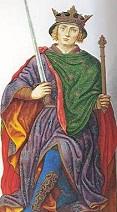
1214 Should I stay or should I go? You thought the title of Augustus was overrated? On June 29 the papal interdict against Merrye Olde Catholic England is lifted, and King John sails for Aquitaine, although many of his English barons refuse to follow him, holding a meeting in the abbey of St. Bury Edmunds in Suffolk NE of London and swearing to make him accept their Magna Charta of their liberties, causing him to hire mercenaries and tell them to stuff it, then landing in Poitou while HRE Otto IV of Brunswick and the count of Flanders prepare to invade from the N, and passing virtually undisturbed through the Loire Valley in Brittany; on July 27 Philip II Augustus of France and his son Prince Louis the Lion (1187-1226) (later Louis VIII), allied with the Hohenstaufens under papal-approved HRE Frederick II Hohenstaufen crushingly defeat the combined forces of John I, excommunicated-deposed HRE Otto IV of Brunswick, and the count of Flanders at the Battle of Bouvines in S Flanders near Tournai (10 mi. SE of Lille) in modern-day Belgium, with their prof. cavalry and bourgeois commune military besting old-style feudal infantry, although both sides suffer thousands of casualties; deprived of his German and other allies, John accepts a truce and returns to England in the fall, pretty much ruined; Flanders is now under French influence, and France is now in the top rank of Euro powers; Otto retires to his estates in Brunswick, and Frederick II becomes undisputed ruler of the Holy Roman Empire; there are no more major battles in W Europe until 1294, when France and England begin to chew each other up; meanwhile the long peace gives nobles time to decorate and furnish their drafty castles and chateaus, and take up court ritual and hunting. On Oct. 5 king (since Aug. 31, 1158) Alfonso VIII the Noble (b. 1155) dies, and his 10-y.-o. son (by Eleanor of England, daughter of Henry II of England and Eleanor of Aquitaine) Henry I (1204-17) becomes king of Castile and Toledo (until June 6, 1217), with his older sister Berengaria of Castile (wife of Alfonso IX of Leon) as regent. On Dec. 4 after making a summer trip to Moray to sign an accord with Earl John of Orkney, becoming sick on the return journey, and taking to bed when he reaches Stirling on Sept. 8, king (since Dec. 9, 1165) William I the Lion (b. 1143) dies, and on Dec. 4 his son (by Ermengarde de Beaumont) Alexander II (1198-1249) becomes king of Scotland (until July 6, 1249), and is crowned Canmore king of Scotland at Scone, attending his daddy's funeral on Dec. 9; his coronation before the funeral is a ploy to get the stubborn Scots to accept male primogeniture and keep his uncle (William I's brother) David, Earl of Huntington (1144-1219) (founder of the line leading to King John I Baliol and King Robert I) and the Mac William clan from having time to object that only an adult traditionally can become king in Scotland?; this doesn't stop Donald Ban Mac William (Meic Uilleim) (-1215) (descendant of Duncan II, who staged an uprising in 1181 and captured Ross) from starting a rising in Ross and Moray, which ends with his death next June 15 - another head in a box addressed to the king? In Dec. the 1214 Treaty of Nymphaeum (Nymphaion) is signed between the Latin Empire and the Nicaean Empire, halting the Latin advance into Asia Minor, confining Latin holds to NW Anatolia incl. the coasts of Bithynia and most of Mysia. Michael I Comnenus Ducas (b. 1170) dies, and next year his nephew Theodore Comnenus Ducas (Theodore Komnenos Doukas) (-1253) becomes despot of chuckalucka Epirus with whipped cream (until 1230), and announces his intention of expanding at the expense of the Latins and Bulgars by taking Durazzo and Corfu from the Venetians. Genghis Khan signs a peace treaty with the Manchurians, allowing him to capture Peking next year. Ottokar I of Bohemia begins a conflict with the Christian clergy over independence (until 1221). After Pope Innocent III, in an effort to reward the Crusaders issues the bull Quia Major, proclaiming the Fifth Crusade and ordering Jews to forgive all interest on loans made to them, Philip II of France balks, ordering Crusaders to settle up with "our men" (hominem nostris); Innocent III utters the soundbyte: "No Christian shall do the Jews any personal injury... or deprive them of their possessions... or extort money from them by threatening to exhume their dead"; Hugh of Lucca is appointed surgeon for Bologna, Italy for 600 Bolognini/year, with his contract requiring him to join the Fifth Crusader army in Egypt, where he discovers that wine cleanses and disinfects wounds, and that pus is unhealthy and not what other doctors call "praiseworthy pus" that cleans toxins from blood. Alaeddin Mohammed destroys the Qara-Khitai Empire (founded 1124) and the Gurid Sultanate of India. Frederick II invests the House of Wittelsbach (founded 1119) with the Palatinate, whose heraldic symbol is a cool lion (see 1240). The papal legate to England orders a chancellor chosen for Oxford U. to preside over a self-governing guild of masters; like the U. of Paris, Oxford U. is divided into "nations", the North for Scottish students and the South for Irish and Welsh students. Births: French Capetian king (1226-70) (St.) Louis IX (d. 1270) on Apr. 25 in Poissy (near Paris); son of Louis VIII (1187-1226) and Blanche of Castile (1188-1252); father of Philip III (1245-85); friend of Jean de Joinville (1224-1317); feast day: Aug. 24. English scholastic philosopher-scientist (Franciscan friar) Roger Bacon (d. 1294) (b. 1220?) in Ilchester, Somerset; early advocate of the methods of modern science; born into one forked-up superstitious mess of a Europe, he becomes the greatest scientist of his time? Deaths: Scottish king (1165-1214) William I the Lion (b. 1143) on Dec. 4 in Stirling; buried before the high altar of Arbroath Abbey. Spanish king of Castile and Toledo (1158-1214) Alfonso VIII (b. 1155) on Oct. 5 in Gutierre-Munoz.



1215 Don't slice off me balls, where do I sign? Nyaa, I renege? In Jan. English king John I is presented with the Articles of the Barons, demands by his northern barons (allied with Llywelyn the Great of Wales), who are pissed-off by the tyrant's long series of abuses in the admin. of justice, as well as his new attempts to tax them to pay a large ransom for his truce with France, demanding that he issue a charter modeled on Henry I's charter guaranteeing them their political and personal rights; he asks for a delay until Easter to answer while attempting to round up support against them, and on May 17 after assembling in Stamford and capturing Shrewbury without resistance, an army led by rebel baron Robert Fitzwalter (-1235) takes London, causing him to seek a truce on May 27; on June 15 the two parties meet in Runnymede Meadow on the Thames River 20 mi. SW of London in Surrey (Egham Parish) near Windsor (an open area where both armies can guard against ambush by facing each other across the field?), and under considerable duress (at swordpoint in a tent?) (a dagger under his balls under the table?) (his chamberlain Hubert de Burgh urges him to do it?) King John signs the Magna Carta (Charta) AKA the Great Charter, authored by Stephen Langton, who puts the first witness signature on it along with 25 barons and earls known as the Magna Charta Sureties, guaranteeing the freedom, rights, and liberties of the Church of England (Article 1), providing that only a gen. council of the kingdom can impose scrotum, er, scutage (Article 12), guaranteeing the freedom of the city of London and its merchants (Article 40), and granting to the aristocracy the right to habeas corpus (Article 36), and the right to lawful judgment of their peers (not necessarily trial by jury) (Article 39), and protection against arbitrary acts of the king incl. taxes by a House of Lords (archbishops, bishops, abbots, earls, and "greater barons of the realm") (the precursor to "no taxation without representation") (Article 14); widows can't be forced to remarry; standard measures will be used for wine, ale, cloth, and corn; towns can't be forced to build bridges; royal officials can't steal wood, horses, or carts; no murder arrest can be made if a woman brings charges unless the victim is her husband; Article 39 provides for due process of law; Article 60 says that "All the aforesaid customs and liberties... all people of our kingdom, as well clergy as laity, shall observe, as far as they are concerned, towards their dependents"; King John acknowledges that Welsh Wales is still under Welsh law; recalcitrant barons break the charter's terms even before it is signed, harrying the king's lands and men, and within 2 mo. John sends abroad for mercenaries to fight them, while kibbitzing Pope Innocent III, who gets pissed-off by lack of recognition of his powers and issues a bull on Apr. 21 backing John, which doesn't stop the barons, who renounce their feudal ties to John in May and March on London, Lincoln, and Exeter, spurring a wave of royalist defectors, starting the First Barons' War (1215-17), leading King John to appeal to the pope to excommunicate the rebel barons, which he does, along with the citizens of London and the Cinque Ports; after Stephen Langton refuses to pub. the ban he is suspended by the papal legates, who help King John raise money for mercenaries from Flanders and France, while the rebel barons, lacking public support outside London invite Prince Louis the Lion, son of Philip II Augustus to invade England and become their king (big mistake?); the papal legates forbid Prince Louis and his followers from crossing the Channel, and excommunicate them when they try it, along with 17-y.-o. Alexander II of Scotland, who in Oct. leads an army over the Tweed River and takes the homage of the barons of Northumbria, something his daddy William I Lion couldn't do in 50 years; King John appoints his chamberlain Hubert de Burgh (1165-1243) as chief justiciar of England (until 1232), going on to personally lead the fight against the invading French army; in Nov. King John seizes the castle of ringleader Richard de Clare, 3rd Earl of Hertford (1153-1217) in Tonbridge and grants his lands to Robert de Bohun; meanwhile the Scots take Carlisle; Rochester Castle is captured by the baronial forces from Stephen Langton, causing the king to siege it for seven weeks until the garrison surrenders from hunger, after which the French recapture it; Millennium Feverists see it all as a sign that the Kingdom of Christ on Earth is drawing nigh?; the Melrose Chronicle is written by Scottish borders monks, becoming the first independent account of the Magna Charta, containing the soundbyte: "A new state of things begun in England; such a strange affair as had never been heard; for the body wishes to rule the head, and the people desired to be masters over the king"; in 1984 U.S. millionaire H. Ross Perot buys one of the 17 surviving copies of the Magna Charta for $1.5M - does that make him English nobility? Start the music, the Catholic Unmagna Charta, or, Oh Hell, you can't stop us now? Perfect opportunity to kick the Eastern Church when it's down? On Nov. 1-30 the first three Lateran Councils (1123, 1139, 1179) are topped by the Fourth Lateran (12th Ecumenical) (Great) Council, called by Pope Innocent III and attended by two Eastern patriarchs incl. Raoul of Merencourt (-1225), Latin patriarch of Jerusalem (1214-25) (who gives a killer speech on day 1 calling for a new Crusade), new Latin patriarch #2 of Constantinople Gervasius (Gervais) of Heraclea Pontica, plus reps. of many secular princes, 412 bishops, and 800 abbots and priors; it approves 70+ decrees, incl. a condemnation of the Cathari, Waldenses, Albigenses, and other heresies (true Christians?), along with a call to all bishops and princes to be especially vigilant against all heresy (now a combo civil-religious crime), esp. blasphemy of their precious Jesus Christ (the beginning of the horrible Inquisition?), the first confession of faith containing a definition of the new don't-say-cannibal doctrine of Transubstantiation (the turning of the bread and wine of the Lord's Supper into Christ's actual body and blood after a prayer by the priest), a requirement for all church members of the age of discretion to confess their sins to a priest and take Communion at least once a year ("Omnis utriusque sexus") (so they can be checked for heresy?), a decree forbidding priests to take part in ordeals, the command that damned Jews and Muslims in Christian Europe must wear items of clothing distinguishing themselves from saved Christians (color-coding for infidels, usually a 3-in. yellow cloth circle) probably taken from the Muslim World, which did it to Christians and Jews), and are prohibited from holding public office or going out during Holy Week (for their protection, of course), and a decree forbidding new monastic orders (new women have to join the existing ones); common-law-marriage is outlawed, and all marriages must be announced in a church by a priest; the Roman Catholic Church is declared the only true faith, outside which nobody can be saved, although the council recognizes the patriarchs of Constantinople, Alexandria, Antioch, and Jerusalem after the numero uno pope, in that order; Jews are doomed to perpetual servitude for crucifying Jesus; the council bans the teaching of the works of Aristotle except those on logic and ethics; all that remains is to prohibit Bible reading by laymen, which is done in 1229 - it took them over a thousand years to finally make up their minds about all this, and they leave a back door for the Greek Orthodox Church in hopes of reconciling? On Nov. 30 (last day) Pope Innocent III issues a Call for the Fifth Crusade at the Fourth Lateran Council, with Egypt as the objective and the date to be 1217; meanwhile he imposes another income tax on his clergy to pay for it, and prohibits trade with the Muslims to ensure a supply of ships; meaning to control it personally this time so it won't end up a bummer like the Fourth Crusade, he orders the Crusaders to meet with him in Brindisi next year, where he plans on offering each of them an indulgence for fighting or even helping with expenses; Frederick II vows to go on Crusade, and abdicate the kingdom of Sicily when he gains full recognition of the German princes, and is crowned as Hohenstaufen German king #6 Frederick II (1194-1250) in Aix-la-Chapelle, and the Hohenstaufen family rules Germany again until 1254. In Dec. after Welsh prince Rhys Gryg (the Hoarse) ap Rhys Fychan (the Younger) (-1234), held in captivity since 1213 is released by the English in hopes that he will start a civil war, but instead joins with Llewelyn the Great, the Welsh take advantage of English troubles and capture many castles in South Wales. Simon de Monfort sieges Toulouse and Narbonne; Raymond VI retires to England, goes to Rome to plead with Pope Innocent III again, then goes to Aragon after being refused. A party of Ghibellines from Genoa begin construction of a fortress on top of the Rock of Monaco, inviting fellow Genoese to settle by offering land grants and tax exemptions; later war in Genoa between the Ghibellines and Guelphs cause many of the later to seek refuge in Monaco, after which in Jan. 1297 Francois Grimaldi (-1309) (nicknamed "Malizia" = The Cunning) disguises himself as a Franciscan far and captures the fortress along with his cousin and stepson Rainier I (1267-134), who succeeds him. The Scottish clans of Meic Uilleim (MacWilliam) and MacHeths revolt against new king Alexander II, and are quickly put down. Genghis Khan and 75K men successfully siege the Chinese capital of Chungtu (modern-day Beijing), defended by 600K, finally getting even for cents. of oppression. The Khwarazmians finish conquering the Afghan possessions of the Ghurids, forcing them to withdraw to their remaining lands in N India. Yaroslav Vsevolodovich accepts an offer to become prince of Novgorod, but decides to put revenge first and captures Torzhok in order to block grain supplies, causing Mstislav the Bold to defeat him at the Battle of the Lipitsa River; Yaroslav loses a helmet in the battle, which is recovered by archaeologists in 1808. The Roman Catholic Church decrees that marriage partners have to publicly post banns in a local parish; it eliminates the reqt. in 1988. Poetry: English poet-chronicler Layamon (Lawman), a Roman Catholic priest in Ernley (modern-day Areley Regis in Worcestershire on the Severn River) writes the 16K-line Brut d'Angleterre, a paraphrase of Robert Wace's rhymed chronicle about the Arthurian Legend into unrhymed alliterative "Semi-Saxon" (early English, with only 150 Anglo-Norman words), becoming the earliest long English poem, and the first English history written since the Anglo-Saxon Chronicle; "The most valuable single production in English speech between the conquest and Chaucer" (Schofield); he also writes History of England to the Death of Welsh Prince Cadwallader in 1172. Births: Crusader count of Jaffa and Ascalon John of Ibelin (Jaffa) (d. 1266); son of Philip of Ibelin and Alice of Monteliard; nephew of John of Ibelin, Old Lord of Beirut (1179-1236). Mongol emperor (1260-94) Kublai (Kubilai) (Khubilai) (Hubilai) Khan (Shizu of Yuan) (d. 1294) on Sept. 23; 4th son of Tolui and 2nd son with Sorghaghtani Beki; grandson of Genghis Khan; founder of the Yuan Dynasty (1271-1368); keeps a kennel with 5K mastiff dogs. Italian pope (1294) Celestine V (Pietro Angelerio or Angelieri) (Pietro da Morrone) (d. 1296) near Isernia. Deaths: English troubadour Bertrand de Born (b. 1140) in Dalon. German poet Hartmann von der Aue (b. 1163). Italian Benedictine Cardinal-Bishop of Sabina (1204-) Giovanni di San Paolo (b. ?); nephew of Celestine II; of the Bobone not the Colonna family; friend of St. Francis of Assisi, helping obtain papal approval of the Franciscan Rule.
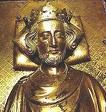



1216 In Jan. the northern rebels in England turn to Alexander II of Scotland for aid, and he receives their homage and fealty, pissing off King John, who swears to "make the fox cub enter his lair" (referring to Alexander's youth and red hair), and invades and sacks SE Scotland, causing Alexander II to launch a counterraid into Cumberland; meanwhile Llywelyn the Great holds a council in Aberdyfi to receive homage of the other Welsh princes, causing Gwenwynwyn ab Owain of Powys to reverse his allegiance again back to John I, after which Llywelyn drives him out of Wales into England, where he dies, and is succeeded by his young son Gruffydd ap Gwenwynwyn (-1286), who has been brought up in England at John I's expense, and becomes an English puppet against Llywelyn. On Apr. 22 the Battle of Lipitsa sees Konstantin Vsevolodovich allied with Mstislav the Bold defeat Yuri II and take the throne of Vladimir (until 1218); meanwhile the infighting in Russia softens it up for the coming Mongol invasion? In May French dauphin Prince Louis the Lion (later Louis VIII), son of Philip II Augustus invades England, landing in Kent, and being greeted by the barons and proclaimed king in London, capturing Winchester on June 14, causing King John's position in N England to collapse, giving it to Louis, and allowing Alexander II to recapture Carlisle on Aug. 8, then turn it into his seat of Scottish admin. over Cumberland and Westmorland. On June 11 Henry I of Flanders, Latin emperor of Constantinople (since 1205) dies in Thessaloniki (poisoned), and is succeeded by his brother-in-law (through his sister Yolande) Peter II of Courtenay (1155-1219), who is consecrated in Rome by Pope Honorius III next Apr. 9, and is captured en route to Constantinople by Theodore Comnenus Ducas of Epirus, dying in prison in 1219; his wife Yolanda of Flanders (Hainaut) (1175-1219) reaches Constantinople and rules as regent (until Aug. 1219), making peace with Theodore I Lascaris of Nicaea, who marries her daughter Marie (Maria) de Courtenay (1204-28). On June 16 Pope (since 1198) Innocent III (b. 1160) dies without having crowned his former ward Frederick II as HRE, and on July 18 Pope (#176) Honorius III (-1227) (yet another Roman) is elected, taking charge of the Crusade; meanwhile Stephen Langton travels to Rome to argue for the Magna Charta. In Aug. while Alexander II of Scotland meets with Fresh Prince Louis in Dover, becoming the farthest S any Scottish king has ever penetrated, King John moves to attack Alexander's rear, causing him to hurry back to Scotland; on Oct. 12 (Thurs.) bad king (since May 27, 1199) John Lackland (b. 1167) loses his royal baggage and treasure incl. his crown jewels (the scutage tax that caused the revolt) in the fens of the Wash in Norfolk in Lincolnshire, perhaps driving him mad (have you ever lost your baggage in the Fens of Norfuck?); on Oct. 18/19 (Wed./Thurs.) he dies of dysentery at Newark Castle in Swineshead in Nottinghamshire (Lincolnshire?) after eating at an abbey (according to William Shakespeare, he was poisoned by a monk named Brother Simon with a Death Cap (Amanita Phalloides) Mushroom, who tastes some of it first to prove it isn't poisoned, and dies with him) (a plot by the pope?) (or was it someone he ate?), and the English rapidly reunite around his 9-y.-o. son Henry III (1207-72), who is declared too young to have any responsibility for his father's crimes, and is crowned on Oct. 28 by a papal legate in Gloucester (the 28th English monarch) (until Nov. 16, 1272) (first crowned during his minority); he is controlled by regent William Marshal, 1st Earl of Pembroke (1146-1219) (top jousting champ, who lives in Pembroke, Wales, where he gets plenty of practice?), who designates the pope as his guardian; Peter des Roches (-1238), bishop of Winchester becomes his tutor; he grows into an artist-king who rebuilds Westminster Abbey; the rebel barons are ordered by Pope Honorius III to return to their natural allegiance under the threat of excommunication; the spat over the Magna Charta is dropped until Henry III grows up after William Marshal reissues it minus a few clauses (esp. the ones authorizing the barons to use force against the king, and those backing Alexander's grievances), and extends amnesty; later monks hear sounds from King John's grave, causing them to dig up his body as a suspected werewolf and move it from consecrated ground?; "Thus the ill presage of his surname Lackland was completely realized, for he lost in his lifetime almost all the domains under his suzerainty, and even after his death he could not keep peaceful possession of his tomb" (Norman Chronicle); Gilbert de Clare, 4th Earl of Hertford, 5th Earl of Gloucester, 7th Lord of Clare, 1st Lord of Glamorgan (1180-1230), son of rebel baron Richard de Clare, 3rd Earl of Hertford (1153-1217) is captured in Lincoln by William Marshall, and in 1217 after kissing and making up marries his daughter (by his wife Isabel Fitzgilbert de Clare, daughter of Richard "Strongbow" de Clare - you figure it out?) Isabel Marshall (1206-40), later becoming close friends with Henry III even though their daddies were enemies, and getting a new title of earl of Gloucester; meanwhile John I's sister Eleanor Plantagenet "the Fair Maid of Brittany" (1184-1241), who was captured along with her younger brother Arthur I at the Battle of Mirabeau and imprisoned with him is passed over like a bag of manure, and kept imprisoned in Corfe Castle in Dorset for life; King John's wife (since 1200) Isabella of Angouleme returns to France and marries her old beau Hugh X of Lusignan, count of La Marche; under Henry III Norman power in the British Isles rapidly expands, and the Irish are screwed bigtime, with native Irish turned into serfs who cannot make a will or sue an English defendant, and whose murder is not considered a felony by the courts, while Irish are denied access to higher ecclesiastical offices; meanwhile on Nov. 12 Henry III of England issues the Great Charter of Ireland, a version of the English Magna Charta securing rights for Anglo-Norman magnates in Ireland. Dominica nica nica? The Age of Friars begins after the disappointment of no Armageddon in 1216? On Nov. 29 Pope Honorius III approves the Rule of St. Francis, followed on Dec. 22 by the Rule of St. Dominic; the former place their chief stress on holy living and experience and poverty, eschewing learning (friars minors), the latter on evangelizing the world with well-read intellectual shock troops (friars preachers); while the Franciscans could be confused with Waldensian heretics, the difference is their complete acceptance of the Roman Catholic hierarchy and rejection of Donatism, accepting sacraments even from a bad priest, making the pope a fan; Franciscans become a hit with the bourgeoisie with their Horatio Alger message that personal religious devotion and purity rather than socioeconomic status bring salvation; Spanish priest (St.) Dominic (1170-1221) cuts his teeth preaching against the Albigensians in Languedoc, and his order follows rules derived from the Austin canons and the Premonstratensians, promoting candidates on intellectual ability rather than seniority, culminating in Thomas Aquinas; later both orders own property, become priests, and administer sacraments, pissing off the rest of the clergy, and both orders become scholars, with Franciscans dominating Oxford U. and Dominicans dominating the U. of Paris; eventually both orders degenerate into an indistinguishable mass of powerful, rich, obese, drunken monks professing phony poverty and hiding their vices under their robes? On Dec. 22 Pope Honorius III issues the bull Religiosam vitam, approving the Dominican Order (of Preachers). Science: Seville, Spain-born Andalusian Muslim scientist Abu'l Abbas al-Nabati (1166-1239) pub. Botanical Journey, a work on botany covering plants from the Atlantic to the Red Sea, earning him the name al-Nabati (the Botanist). Births: Danish king (1241-50) Eric IV Plovpenning (Plough-Penny) (d. 1250); son of Valdemar II (1170-1241) and Berengaria of Portugal (daughter of Sancho I); brother of Abel of Denmark (1218-52) and Christopher I (1219-59). English patriarch Sir William Howard (Haward) (d. 1308); justice of common pleas (1297-1308); founder of the pesky Howard Family, which refuses to give up its Roman Catholicism after England goes Protestant; his descendant Sir Robert Howard marries the daughter of Thomas Mowbray, duke of Norfolk, giving their descendants starting with John Howard (1430-85) the dukedom and beginning their rise. Deaths: Italian pope (1198-1216) Innocent III (b. 1160) on July 16 in Perugia, allegedly leaving the bull Quaedam Moralitas de Scaccario (The Innocent Morality), which claims that chess bishops (aufins) "are prelates wearing horns", and that "they move and take obliquely because nearly every bishop misuses his office through cupidity"; he also established the first foundling wheel in Rome, where mothers of newborns that don't want to raise them can deposit them for care by the Church in a kind of bank night depository drawer, which survives to modern times. English king (1199-1216) John I (b. 1167) on Oct. 18/19 in Newark Castle, Newark-on-Trent, Nottinghamshire (dysentery) (poison?); buried in Worcester Cathedral; he once outlawed Eustace the Monk but never heard of any Robin Hood? Latin emperor of Constantinople #2 (1205-16) Henry of Flanders (b. 1176) on June 11 in Thessaloniki (poisoned by Oberto di Biandrate, ex-regent of Thessaloniki at the instigation of his wife Maria of Bulgaria?)






1217 Peter II of Courtenay is captured by Theodore Dukas Angelus, despot of Epirus, and his wife Yolande becomes regent (until 1219), while her daddy John of Brienne (1170-1237) becomes Latin king of Jerusalem (until 1225); meanwhile in the spring after Pope Honorius III bars pesky Frederick II from participating, the Fifth Crusade begins (ends 1221); the Crusaders, led by Leopold VI of Austria and Andrew II of Hungary leave for Acre, where they are joined by John of Brienne, Hugh I of Cyprus, and Prince Bohemund IV of Antioch in an attack against the Ayyubids in Syria; Jerusalem Patriarch Raoul of Merencourt goes along, carrying a relic of the True Cross to pump them up; too bad, a screwup in funding causes a motley crew of cripples, aged, infirm, thieves et al. to join the army and be transported to the Holy Land, where they prove useless (except to prove to Muslims that Christians stink?); too bad, after they reach Jerusalem they find the walls and fortifications torn down and the Muslim defenders gone, and the Euros end up returning home next year; meanwhile, while no field battles are fought, both sides fight battles near their opponent's camps with the object of capturing or destroying their facilities; Andrew II overspends, causing him to sell royal land to oligarchs; the Latin Province of Syria is established, with Franciscian brother Elias as minister; by 1229 the Franciscans have a small house in Jerusalem near the 5th station of the Via Dolorosa. On Apr. 23 king (since 1204) Inge II Bardson (b. 1185) dies, and in June Haakon IV Haakonsson (the Old) (1204-63), the illegitimate son of Haakon III becomes king of Norway (until Dec. 16, 1263), which reaches its zenith as the civil wars rocking Norway since 1130 finally end; the first treaty of commerce with Norway is concluded with England. On May 20 Prince Louis the Lion (future Louis VIII) is defeated at the Second Battle of Lincoln (first in 1141) by a relief force under William Marshal; the Comte de la Perche is KIA, and Robert Fitzwalter is captured, after which the French sack the city of Lincoln, causing it to be called "Lincoln Fair"; meanwhile as much as the English hated John, now that he's gone they begin to react against Louis (because, according to Shakespeare in King John, 5.4.15-16, "Lewis means to recompense the pains you take/ By cutting off your heads"?). On June 6 king (since Oct. 5, 1214) Henry I (b. 1204) is killed by a tile falling from a roof, and his sister Berengaria (the Great) of Castile (1179-1246) becomes queen of Castile and Toledo, renouncing the throne on Aug. 31 in favor of her son (by Alfonso IX of Leon) Ferdinand III (the Saint) (1199-1252) (until May 30, 1252), who becomes one of Castile's top kings, expanding the dominions of Castile in al-Andalus incl. Cordoba and Seville, and securing the permanent union of the crowns of Castile and Leon after becoming king of Leon and Balicia on Sept. 24, 1230. On Aug. 24 the naval Battle of Sandwich is V for the English navy under Hubert de Burgh over the French navy under Eustace the Monk, who is KIA. On Sept. 11 after most of the rebel baron turn on Prince Louis the Lion, the Treaty of Lambeth (Kingston) is signed, and Louis agrees that he has never been the legitimate king of England; the French leave England and free Fitzwalter, ending the First Barons' Revolt (begun 1215); Henry III is acknowledged undisputed king of England, but the pope really rules it through his legate Guala (Gualo); the Charter of the Forest is agreed to by Henry III as a supplement to the Magna Charta, providing for the right of common access to royal forests for fuel, and abolishing the death penalty and mutilation as punishments for taking royal game, going on to become the longest-lasting statute in England until superseded on July 1, 1971 by the Wild Creatures and Forest Laws Act. On Sept. 12 Raymond IV retakes Toulouse while Simon IV de Montfort is away, causing the latter to return and in Oct. begin the Siege of Toulouse (ends June 25, 1218). In mid-Dec. Alexander II of Scotland travels to Northampton and gives homage to Henry III for his English lands, giving up his gains and going back to trying to win Northumbria by negotiation. Serbian grand prince (since 1196) Stephen II Nemanjic is crowned king of Serbia (Raska) by a legate of Pope Honorius III, causing him to be called Stephen Provencani (the First-Crowned) (until 1228). (St.) Ferdinand III (1199-1252) becomes king of Castile (until 1252), going on to fight the Moors in S Spain and reconquer all of Andalusia except Granada while pleasing the Roman Catholic Church by turning mosques into cathedrals dedicated to the Blessed Virgin and living a monastic lifestyle complete with itchy-scratchy hairshirt. The govt. of England issues an order prohibiting Irishmen from holding episcopal offices or serving as cathedral deans, and creating John St. John (-1302) as the first lord high treasurer of Ireland (high treasurer until 1695) (ends 1817). John (Ivan) Asen II (-1241), son of John Asen begins a revolt in N Bulgaria with aid from Galicia, and takes Tirnovo after a siege. Salamanca U. is founded in Spain by Alfonso IX of Leon to keep students from having to travel to Castile to study. Middelburg in the Netherlands is granted city rights, becoming an important trading center between England and Flanders. Births: French king of Cyprus (1218-53) Henry I (the Fat) (le Gros) of Lusignan (d. 1253) on May 3; son of Hugh I of Cyprus (1194-1218) and Alice of Champagne (1193-1246). Mongol Baghdad-burning Persian Ilkhanid khan #1 Hulagu (Hulegu) (d. 1265); son of Tolui and Sorghaghtani Beki (a Christian); brother of Arik Boke (-1266), Mongke (1208-59), and Kublai Khan (1214-94); grandson of Genghis Khan. French duke of Brittany (1221-86) John (Yann) (Jean) I (the Red) (le Roux) (d. 1286); son of Peter I (1190-1252) and Alix of Thouars; husband of Blanche of Navarre. German Hapsburg king and HRE #1 (1273-91) Rudolph (Rudolf) I (d. 1291) in Limburg an der Lahn; son of Count Albert IV of Hapsburg and Hedwig (daughter of Count Ulrich of Kyburg); starts with estates in Alsace and Aargau in 1239, then in 1245 marries Gertrude, daughter of Count Burkhard III of Hohenburg, becoming a big vassal in Swabia. Births: Malian emperor #1 (Muslim) Sunjata (Sundjata) (Sundiata) Keita (Maria Djata I) (Sogolon Djata) (d. 1255); founder of the Mali Empire; father of Mansa Wali Keita, Outai Keita, and Khalifa Keita; granduncle of Mansa Musa; basis of Disney's "The Lion King". Latin emperor of Constantinople (1228-61) (last) Baldwin II of Courtenay (Constantinople) (d. 1273); son of Peter I of Courtenay (1155-1218) and Yolande; brother of Robert I of Courtenay (-1228). Flemish scholastic philosopher ("the Solemn Doctor") Henry of Ghent (Henricus de Gandavo) (d. 1293) in Mude (near Ghent); claims that the human authors of the Bible are true authors, not merely organs or channels for God. Death: English scholar Alexander Neckam (b. 1157) in Kempsey: "Science is acquired at great expense, by frequent vigils, by great expenditure of time, by sedulous diligence of labor, by vehement application of mind." French pantheistic philosopher David of Dinant (b. 1160). English Norman knight Richard de Clare, 3rd earl of Hertford (b. 1162) on Dec. 30 in Tonbridge Castle, Kent. Norwegian king (1204-17) Inge II (b. 1185) on Apr. 23 in Nidaros.

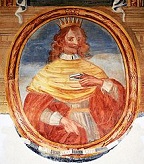
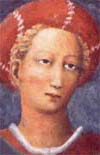
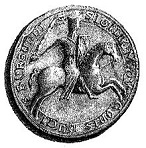

1218 On Jan 10, 1218 king (since Apr. 1, 1205) Hugh (Hugues) I de Lusignan (b. 1194) dies, and his infant son Henry I (the Fat) (le Gros) of Lusignan becomes king of Cyprus, with his mother Alice of Champagne (1193-1246) (eldest daughter of Count Henry II of Champagne and Isabella I of Jerusalem) as regent (until 1223). On Feb. 2 Konstantin Vsevolodovich (b. 1186) dies, and his younger brother Yuri II returns as grand prince of Vladimir (until 1238), going on to install his loyal younger brother Yaroslav (b. 1191) as prince of Novgorod and fight the pesky Volga Bulgarians; Yaroslav tries to keep up with his daddy Vsevolod III the Big Nest by marrying 3rd wife Fedosia Igorevich of Ryazan and having 12 children to feather his big nest, incl. Alexander Nevsky (b. 1220). On May 19 HRE Otto IV (b. 1175) dies, freeing his rival and pope's pet Frederick II to sail for the Holy Land to fulfill his 1215 vow to the pope; however, he keeps reneging, and never tucks in his booties and leaves, although his councilor Herman von Salza (grandmaster of the Teutonic Knights) goes, and gets decorated for bravery by Jerusalem king (1217-25) John of Brienne; meanwhile Frederick II has no intention of giving up Naples and Sicily, and instead ignores Germany, undoing the centralizing work of his predecessors Frederick I Barbarossa and Henry VI for his great dream of a Hohenstaufen Italy, which requires conquering N Italy, with the Papal States being expandable, scaring the pope. On June 7 Henry III of England agrees to the Peace of Worcester with Llywelyn the Great of Wales. On June 25 after the defenders of Toulouse, France construct a trebuchet, and the Crusaders construct a cat (mobile shelter), which is destroyed by the trebuchet, Provencal-killer Simon IV de Montfort (b. 1160) is KIA by a siege engine operated by women, and Raymond VI regains his position as count of Toulouse. In June after Oliver of Cologne arrives with a fresh German army, and Count William I of Holland arrives with a Dutch-Flemish-Frisian army, and they hook up with Leopold VI of Austria and John of Brienne and decide to go straight to the Ayyubid heartland in Damietta, Egypt, allying with Seljuk sultan Keykavus I of Rum in Anatolia to attack the Ayyubids in Syria as a diversion, the Crusaders siege Damietta, and on Aug. 25 take the tower outside the city; Saladin's brother Al-Adil dies (of grief?) upon hearing of the Crusaders' seizure of the chain bridge, and is succeeded by his son Al-Malik al-Kamil (al-Kamal) Muhammad (1180-1238) as sultan of the Ayyubid Dynasty in Egypt and Syria (until 1238); too bad, the siege bogs down and the Crusaders begin dying from disease, causing William I and his army to sail for home. On July 6 Eudes III (b. 1166) dies, and his eldest son Hugh IV (1213-72) becomes duke of Burgundy, France (until 1271), going on to expand his duchy to incl. the counties of Chalon and Auxonne. John (Ivan) Asen II (-1241) kills Boril, and becomes tsar of Bulgaria's Second Empire (until June 24, 1241), which reaches its height under his rule. Genghis Khan and his hordes conquer the neighboring Xi (Western) Xia, Jin, and Qara-Khitai (founded in 1124) empires (ruled by Naiman), capturing Semirechye and the Tarim Basin, and occupying Kashgar, followed by Persia; Alaeddin Mohammed signs a treaty with him. Peter II of Courtenay (b. 1155) dies, and his son Robert I of Courtenay (-1228) becomes Latin emperor of Constantinople (until 1228), with his mother Yolande as regent until next year when he reaches the age of majority, spending his career watching his empire shrink while begging for Western aid. Stephen Langton is reinstated as archbishop of Canterbury. Christmas in England: The gift you'll love at a price you'll love even more? Henry III proclaims the Edict of the Badge, based on the Fourth Lateran Council of 1215, making England the first Euro nation to require Jews to wear a marking badge, causing many Jews to emigrate; next year France does ditto, followed by Hungary in 1279; a mass protest in Spain in 1219 causes it to be revoked in England; between this year and 1272 England imposes 49 levies for a total of 200K marks; in 1275 the Statute of the Jewry outlaws lending money at interest; after being given 15 years to get used to living without engaging in usury, the Jews are finally expelled in 1290, and not allowed to return until the time of Oliver Cromwell (1655). Duke Peter I de Dreux of Brittany is finally recognized as earl of Richmond by William Marshal, regent for young Henry III, although Yorkshire remains in control of the earl of Chester; the increased revenue emboldens him to demand the same privileges from his nobles as the other dukes of France have, causing a minor civil war (ends 1223). A tower in Nafferton in N England is suspended during construction, later becoming the hideout of the black bandit and boogie man Long Longkin. Yaroslavl 150 mi. NE of Moscow at the confluence of the Volga and Kotorosl Rivers becomes capital of the principality of Rostov (until 1463). Architecture: Amiens Cathedral is burned; rebuilt in 1220-69. Births: Japanese shogun #4 (1226-44) Kujo Yoritsune (Fujiwara no Yoritsune) (d. 1256) on Feb. 12. Dutch count of Hainault (1246-57) John I of Avesnes (d. 1257) on May 1 in Houffalize; eldest son of Margaret II of Flanders (1202-80) and Bouchard IV of Avesnes (1182-1244). German king and Hapsburg (Habsburg) HRE (1273-91) (first court-king) Rudolf (Rudolph) I (d. 1291) on May 1; founder of the Hapsburg (Habsburg) Dynasty in Germany; son of Count Albert IV the Wise of Hapsburg (1188-1239) and Hedwig, daughter of Count Ulrich of Kyburg. Japanese Yamato emperor #85 (1221) Chukyo (Kanenari) (d. 1234) on Oct. 30; eldest son of Juntoko (1197-1242). Danish king Abel of Denmark (d. 1252); son of Valdemar II (1170-1241) and Berengaria of Portugal; brother of Eric IV (1216-50) and Christopher I (1219-59). Sardinian king (1238-72) Enzo (Enzio) (d. 1272); illegitimate (favorite) son of HRE Frederick II and Adelaide (of Urslingen?). Deaths: French noble Simon IV de Montfort, 5th earl of Leicester (b. 1160) on June 25 in Toulouse. French duke of Burgundy (1192-1218) Eudes III (b. 1166) on July 6. German king and HRE Otto IV of Brunswick (b. 1175). French king of Cyprus (1205-18) Hugh I (b. 1194) on Jan. 10 in Tripoli.



1219 In 1219-66 the Hawaiian Islands are settled by East Polynesians, according to radiocarbon dating done in 2010. On Mar. 7 Pope Honorius III approves the religious congregation of Val des Ecoliers (Valley of the Scholars) at the U. of Paris. On June 3 after Philip II's hittin'-the-gym-every-day son Prince Louis da Lion (later Louis VIII) of France fights against the Albigenses in S France, he directs the brutal massacre of 5K townspeople in Marmande - I'll take my toast with marmalade? On May 14 William the Marshal (Marshall) (b. 1146), marshal to four kings, the greatest knight who ever lived, and the flower of medieval knighthood, subject of the famous sonnet about his sparing of Count Richard dies, and chief justiciar Hubert de Burgh becomes regent and virtual ruler of England (until 1227); Cardinal Pandulph (-1226) becomes the papal legate (until 1221), and is opposed by Canterbury archbishop Stephen Langton, while Hubert de Burgh is opposed by Henry's tutor Peter des Roches; actually, he's not a cardinal, but everybody confuses him with Cardinal Pandolfo (Pandolfo) Masca da Lucca (1140-1211). On June 15 the Battle of Lyndanisse (Tallinn) (Reval) is a decisive V for Christian Valdemar II of Denmark against the pagan Estonians after a red cloth with a white cross allegedly falls from the sky during the battle, and becomes the Dannebrog, the oldest nat. flag to survive to modern times; the first mention of the Estonian city of Tallinn (Reval) on the Gulf of Finland 50 mi. S of Helsinki (modern-day pop. 450K/602K), which is claimed by the Danes and receives city rights in 1249, becoming an important member of the Hanseatic League. In Aug. Yolanda of Flanders (1175) dies, and French crusader-trouvere Conon (Coesnes) (Conain) (Quenon) (Quenes) de Bethune (Béthune) (1159-1219) becomes regent of the Latin Empire of Constantinople, dying on Dec. 17 in Adrianople. In Sept. St. Francis of Assisi (1181-1226) arrives at the Crusader camp in Damietta, Egypt, boldly crosses the lines, and is taken to the court of Saladin's nephew sultan Al-Malik al-Kamil (1180-1238), announcing his intention of converting him to Christ and making him give up Muhammad by reason (sure, it would be the first time, in which case he's a shoo-in for saint?); he talks religion for a week without getting beheaded (maybe because the sultan had just survived a coup attempt backed by Coptic Christians and didn't want to rile them up), failing to make a dent and coming out of it as the one who is changed, picking up the idea of five daily prayers and bringing it back as the three daily recitations of the Angelus, and going bigtime for the Muslim rosary, albeit Irish Christians began using it around 800 C.E.; when he gets back, next Feb. St. Francis hears about the Five Martyrs of Morocco, friars he had sent to convert the Moroccans into giving up devil man Muhammad for god man Christ, who didn't fare so well, ending up tortured and executed, their example launching the career of Portuguese-born St. Anthony of Padua (1195-1231), who becomes such an exemplary Franciscan preacher that he is canonized in 1232 less than one year after his death, a fast-tracking record that still stands; meanwhile on Oct. 9 and Oct. 26 after Pope Honorius III sends Portuguese Benedictine legate cardinal-bishop Pelagius (Pelagio) Galvani of Albano (1165-1230) to Damietta to negotiate, al-Kamil launches two attacks on the Crusader camp, then offers to trade Damietta for Jerusalem, but Pelagius, expecting Frederick II to arrive with a relief army unwisely turns him down; in Nov. the Crusaders finally take Damietta, and John of Brienne begins a war with Pelagius for control, causing them to forget the Crusade? Levon II the Great dies, and Isabella (Zabel) (-1269) becomes ruler of Lesser Armenia (until 1252). After a Mongol chief allies with Khwarezm shah Ala al-Din Muhammad (Alaeddin Mohammed) II (-1220), causing Genghis Khan to return and supress the rebellion and send an officer of peace, two Mongol merchants are executed as spies by the gov. of Otrar in Transoxiana, causing Genghis Khan to demand his extradition, which Muhammad refuses, beheading the chief of the Mongol embassy and sending the rest back sans beards, pissing-off Genghis Khan, who begins the Mongol invasion of the Muslim World, starting with leading 200K troops W to invade Afghanistan, destroying its irrigation systems and turning fertile land into permanent desert. Norse king Ragnald IV of the Isle of Man, who earlier did homage to John I (after being invaded?) imitates him and resigns his kingship to the Holy See, in theory at least - too far away to mess with? (St.) Sava (1174-1236) visits Nicaea and persuades the exiled Greek patriarch Manuel I to consecrate him as the first Orthodox archbishop of all Serbia, becoming head of the independent Orthodox Serbian Church. Following the decree of the 1215 Fourth Lateran Council, Henry III orders English justices to substitute the jury for the ordeal. The Kingdom of Jerusalem grants the Teutonic Order the right to combine the Teutonic Black Cross above a silver Cross of Jerusalem, creating the Iron Cross. Births: Danish king (1252-9) Christopher I (d. 1259); son of Valdemar II (1170-1241) and Berengaria of Portugal; brother of Eric IV (1216-50) and Abel of Denmark (1218-52). Deaths: English knight William Marshall, 1st earl of Pembroke (b. 1146) on May 14 in Caversham Manor; buried in Temple Church, London. Anglo-Norman knight Sir John de Courcy (b. 1150). Latin king of Jerusalem (1216-7) Peter I of Courtenay (b. 1155). Latin empress of Constantinople (1217-19) Yolanda of Flanders (b. 1175) in Aug. Japanese shogun #3 (1203-19) Minamoto no Sanetomo (b. 1192) on Feb. 13.


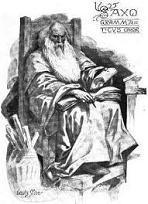
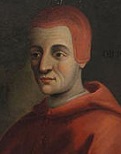


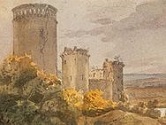
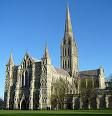
1220 On Mar. 31 the Muslims attack the Crusader camp in Damietta; on Aug. 29 the Crusaders counterattack the Muslim camp; meanwhile after Pelagius of Albano keeps refusing to let John of Brienne rule Damietta, he gets fed up and returns to Acre, and Pelagius requests Frederick II to come with a fresh army. On May 17 English king (since Oct. 28, 1216) Henry III of England (1207-72) is crowned at Westminster Abbey (until Nov. 16, 1272). In June Scottish king Alexander II reaches an agreement with English king Henry III to marry his sister Joanna, while his own sisters Margaret and Isabel are only promised "suitable" but non-royal English husbands by Oct. 1221. On July 7 the relics of St. Thomas Becket are translated in the Cathedral of Canterbury in Kent, England, presided over by archbishop Stephen Langton. On Nov. 22 Pope Honorius III crowns Frederick II as HRE, correcting the oversight of his predecessor Innocent III, which isn't enough to make him go on the crusade; Frederick's son Henry (VII) (1211-42)) is elected king of Germany (until 1235). Leading a punitive expedition against the Khwarezm Empire in E Persia (ends 1223), the Mongol hordes of Genghis Khan (1162-1227) invade Transoxiana and Khorasan; under Genghis' son Juji they defeat 400K Khwarezm troops in the Battle of Jand, killing 160K, and causing Kwarezmshah Ala al-Din Muhammad (Alaeddin Mohammed) II to flee to Samarkand; the main army under Genghis Khan destroys Bukhara, raping thousands of women and massacring 30K men; Samarkand and Balkh surrender, only to suffer massacre and ruin, causing the shah to flee to a small Caspian Sea island, where he dies, and is succeeded by Jalal al-Din Manguberdi (-1231), the last Khwarem shah; 70K Mongols under Genghis' son Tule ravage Khorasan, making captives fight against their fellow soldiers or die; they capture and destroy Merv, known for its magnificent libraries, allowing the pop. to march through the gates with their treasures, killing all 1.3M (1.748M) in 1 hour? After accompanying Peter II of Courtenay from Rome as papal legate and being captured with him then released, Cardinal Giovanni Colonna (1170-1245) becomes regent of the Latin Empire of Constantinople (until Mar. 25, 1221). Angkor loses its dominance over the Cham. The Kingdom of Zimbabwe ("great stone houses") is founded by settlers from the Kingdom of Mapungubwe, with capital at Great Zimbabwe; the Kingdom of Mutapa eclipses it by 1450. Marie de Saint-Clair (1192-1266) succeeds Jean de Gisors as grandmaster of the Priory of Sion (until 1266) :). Czestochowa (Czanstochowa, Czestochow) on the Warta River in S Poland is first mentioned. Nysa (Neisse) is founded in SW Poland on the Nysa River (Glatzer Neisse) 47 mi. SE of Wroclaw in Silesia. About this time after a large group and students and professors walk out of the U. of Bologna in search of more academic freedom, HRE Frederick II founds the U. of Padua in Italy to teach law and theology, followed in 1222 by medicine, and by 1399 it divides into two schools, one for civil and canon law, and the other for medicine, grammar, rhetoric, dialectic, philosophy, and astronomy; in a mere three cents. it becomes home to one of the first botanical gardens in Europe (1545), going on to produce giants incl. Andreas Vesalius and Galileo Galilei; in 1595 its anatomical theater begins performing public dissections. Spanish-born St. Dominic (1170-1221) holds the first gen. chapter of the Dominican Order (Order of St. Dominic) in Bologna, Italy, persuading his followers to adopt by unanimous vote the rule of absolute poverty; he dies next year. The first known Beghards (from the Latin word for begging) lay male brotherhood appears in Louvain; imitating the Beguines (retreats for widowed Crusaders and other women, who take no vows and care for the sick and poor, founded in 1180); they spread through Belgium, Holland, Germany, et al. The first giraffes are publicly displayed in Europe in ?. The Boys' Choir at the Kreuz-Kirche in Dresden is founded. Architecture: The Amiens Cathedral of Notre Dame in Amiens, France (72 mi. N of Paris) is begun (finished 1288), becoming the largest church edifice in France (470 ft. x 213 ft., with a 144 ft. x 147 ft. nave and 40 ft. diam. rose windows). In this decade the choir of Brussels Cathedral of St. Michael and St. Gudula in Belgium is begun. Salisbury Cathedral Church of the Blessed Virgin Mary in Salisbury, England is begun (finished 1258); in 1549 it has the tallest church spire in England (404 ft.) (123m). In this decade Chateau de Coucy in Picardy, France is built by Enguerrand III, Lord of Coucy, becoming known for the largest dungeon in Europe (35m x 55m), with its lords adopting the motto: "Roi ne suis, ne prince ne duc ne comte aussi; Je suis le sire de Coucy ("I am not king, nor prince nor duke nor count; I am the Lord of Coucy"); renovated in the 19th cent. by Eugene Emmanuel Viollet le Duc (1814-79); too bad, in Apr. 1917 the Germany blows it up. Nonfiction: Leonardo Fibonacci (1170-1250), Practica Geometriae; first application of algebra to prove geometrical theorems. Eike of Repgow (1180-1235), Sachsenspiegel (Mirror of the Saxons) (1220-35); an attempt to write down Saxon oral law and tradition. Poetry: About this time the French epic poem Huon de Bordeaux is written, about a French knight who kills Charlemagne's son Charlot (really his grandson Charles l'Enfant, d. 866?), and is pardoned on condition of performing seemingly impossible tasks, which he does with the aid of fairy king Oberon. In this decade the Sonnet (Ital. "little song or sound") poetic form is invented by Italian poet Giacomo da Lentini (Giacumu da Lintini) (Jacopo il Notaro) at the court of HRE (1220-50) Frederick II in Sicily. Births: Japanese Yamato emperor #88 (1242-6) Go-Saga (d. 1272) on Apr. 1; 2nd son of Tsuchimikado (1196-1231); 2nd cousin of Shijo (1231-42). Russian grand prince of Vladimir (1246-63) (St.) Alexander (Aleksander) Nevsky (Nevski) (d. 1263) on May 20 in Pereslavl-Zalessky; son of Yaroslav II (1191-1246) 4th son of Yaroslav II (1191-1246) and Fedosia Igorevich of Ryazan; canonized in 1547; feast days: Aug. 30, Nov. 23. Italian king of Sardinia (1238-72) Enzio (Enzo) (d. 1272); eldest illegitimate son of HRE Frederick II and Adelaide; the last Hohenstaufen heir. Italian sculptor-architect Nicola (Niccola) Pisano (d. 1278) near Lucca, Apulia; father of Giovanni Pisano (1245-1320). Welsh Franciscan theologian John of Wales (John Waleys) (Johannes Guallensis) (d. 1285); educated at Oxford U. Scottish noble ("the Old Competitor") Robert Bruce, 5th Lord of Annandale (d. 1295); son of Robert Bruce, 4th lord of Annandale (1195-1233) and Isobel of Huntington (1199-1251), 2nd daughter of David of Scotland, 8th earl of Huntingdon (1144-1219) and Matilda de Kevilloc; father of Robert Bruce, 6th lord of Annandale and 2nd earl of Carrick (1243-1304); grandfather of Robert I (1274-1329). Flemish Franciscan missionary-explorer William (Gillielmus) (Willem) (Guillaume) of (de) Rubruck (Rubruk) (Ruysbroeck) (Ruysbrock) (Rubriquis) (d. 1293) in Rubrouck, Flanders. Italian poet-scientist Brunetto Latini (d. 1294). Chinese Nestorian monk-traveler-diplomat ("the Reverse Marco Polo") Rabban Bar Sauma (Sawma) (Cauma) ("son of fasting") (d. 1294) in Beijing (Zhongdu) (Khanbaligh); of Turkic Uyghur origin. Deaths: French poet Giraud de Borneil (b. 1150). Danish historian Saxo Grammaticus (b. 1150), leaving Gesta Danorum, a history of Denmark to 1187 in 16 vols.; source of the story of Amleth (Hamlet), later used by Shakespeare; compiled at the suggestion of his boss Lund archbishop Absalon. German Minnesinger Wolfram von Eschenbach (b. 1160); leaves Parzival (Parsifal) (Percivale), the earliest finished Grail romance, about a youth of Angevin blood from Sinadon (Scaudone) in Waleis (Wales?) (Sidonensis in Valais, Switzerland?) setting out to achieve knighthood, reaching the Grail castle Munsalvaesche of his mute uncle Anfortas the Fisher King (a good angler, who is unable to procreate or die), son of Frimutel, son of Titurel, tracing back to Laziliez, Mazadan, and Terdelaschoye (Lazarus, Ahura Mazda, and Terre de la Choix or Chosen Land?), who is custodian of the Holy Grail and the Spear of Christ, slaying his enemy and lifting his curse then succeeding to the kingship; the bearer of the Grail is Repanse de Schoye (Reponse de Choix = Chosen Response); claims that King Arthur descended from an imaginary 5th cent. branch of the French house of Anjou, and that his court of Camelot is located in Nantes in Brittany, W boundary of the old Merovingian kingdom; claims that all the knights who guard the Holy Grail (a stone), the Grail castle, and the Grail Family (tracing back to Joseph of Arimathea) are Knights Templars, based on a visit to Outremer he made to witness them in action; pub. in trans. in 1753 by Johann Jakob Bodmer, and used by Richard Wagner in his 1882 opera "Parsifal"; also leaves the unfinished prequel Der Junge Titurel, about Antfortas' father, who built Grail Castle, complete with a circular chapel; also leaves the unfinished Willehalm, about Merovingian (crypto-Jewish?) prince (St.) Guillaume (William) (Guillem) (the Hook-Nosed) de Gellone (of Aquitaine) (of Orange) (755-814), whom he claims is associated with the Grail Family.
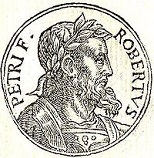

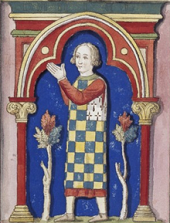

1221 On Mar. 25 after his older brother Marquis Philip of Namur renounces the succession, Robert of Courtenay (-1228), younger son of Peter II of Courtenay and Yolanda of Flanders becomes Robert I, Latin emperor of Constantinople (until 1228), immediately appealing for help from Pope Honorius III and Philip II of France, who send little aid. In May the Jokyu Incident in Japan sees retired emperor Go-Toba (b. 1180) attempt to seize power from the Kamakura shogunate and their Hojo regents, deposing his son, emperor (since Dec. 12, 1210) Juntoku (1197-1242) in favor of Juntoku's 4-y.-o. son Chukyo (1218-34), who becomes Japanese Yamato emperor #85 (until July 29); too bad, he loses, causing Chukyo to be forced to abdicate on July 29 after 2 mo. in favor of his 1st cousin (once removed) (nephew of Go-Toba) Go-Horikawa (1212-34), who on July 29 becomes Japanese Yamato emperor #86 (until Nov. 17, 1232); Juntoku is sent to exile on Sado Island for life. In June after returning from a police action in the NW Highlands, Alexander II of Scotland marries Joanna (1210-38), sister of Henry III, which he counts as a big V because his daddy was only permitted to marry the daughter of an English vicomte (below count or earl and above baron); he then asks the papal legate to Scotland to anoint and crown him like is done to "real" English and French kings, but Pope Honorius III, under English pressure, rejects it, and he keeps trying for years; in the summer the MacRuairidh clan, descendants of Somerled of Argyll revolt, causing Alexander to launch a naval campaign against them. In July after HRE Frederick II doesn't show up and Jerusalem king (1210-25) John of Brienne (1170-1237) returns to Damietta, the don't-you-just-love-Mondays Crusaders attempt to march on Cairo, but are blocked both ways and trapped by a flood of the Nile River, and after their supplies run out they they are ambushed in a night attack by al-Kamil, causing Pelagius to surrender the army and agree to an 8-year truce in the Treaty of 1221; Damietta in N Egypt is lost to the cross-kissers, and they retreat with their crosses dangling between their legs, ending the Forked Over Fifth Crusade (begun 1217); al-Kamil promises to return the True Cross, which it later turns out he doesn't have; English Magna Charta baron Robert Fitzwalter, who participated in the siege of Damietta returns to England, where he makes up with Henry III. On Oct. 21 Alix of Thouars (b. 1201) dies in childbirth, and her son John I (the Red) (1217-86) becomes duke of Brittany (until Oct. 8, 1286), with his father Peter I de Dreux Peter Mauclerc) (1190-1250) as regent (until 1237). Vienna is awarded official city status. After a long siege, the Mongols under Genghis Khan capture Nishapur, killing all except 400 artisans, who are sent to Mongolia, with the heads piled in a giant pyramid; he then captures and destroys Rayy, known for its 3K mosques and pottery kilns, massacring the entire pop.; after gathering a new army of Turks, Kwarezm shah Jalal ad-Din is defeated in the Battle of the Indus River in modern-day Pakistan, and flees to Delhi, after which Genghis punishes Herat for rebelling against their Mongol governor, massacring 60K, ending the Khwarezm-Shah Dynasty (founded 1156); Genghis sends his gens. Chepe and Subotai on a recon mission with 20K horsemen through the whole of Persia, the Caucasus, the Carpathians, and into Russia, where by 1223 they virtually obliterate a Russian army of 80K; Genghis Khan spares N Persia, putting it under Mongol viceroys; after each battle each Mongol soldier is assigned to kill 50 captives with a battle axe and collect the right ears in sacks for counting; "They had trampled on the nations which opposed their passage, penetrated through the gates of Derbent, traversed the Volga and the desert, and accomplished the circuit of the Caspian Sea, by an expedition which had never been attempted, and has never been repeated" - Edward Gibbon, Ch. 64; apocalyptic rumors of Mongolian hordes travel as far as Britain and France. Pandulph ceases to be papal legate to England; Hubert de Burgh, backed by Stephen Langton becomes leader of the king's council, causing Poitevin Frenchman Peter des Roches to step back from his efforts to control affairs. The Bohemian clergy win their war with Ottokar I, and gain almost complete independence. The Bishop of Acre reports to Rome that King David of India (Genghis Khan?) is alleged to be the grandson of Prester John. Hungarian princess (St.) Elizabeth (1207-31) (daughter of Andras II) marries Louis IV, Landgrave of Thuringia (1200-27), and after Franciscan monks teach her about St. Francis of Assisi in 1223 she begins caring so much for the poor and sick that her hubby gets jealous until he catches her carrying a basket of food and forces her to show him its contents, which are miraculously transformed into roses, causing him to beg her for forgiveness? The Third Order of Franciscans (for laymen) is founded - St. Elizabeth coming up? Grand Prince Yuri II of Vladimir founds the town of Nizhni (Nizhny) Novgorod ("new Novgorod") (modern pop. 1.5M) (renamed Gorky or Gorki during the Soviet era) at the confluence of the Volga and Oka Rivers to guard against invasions; it is surrounded by a moat and has a wooden Kremlin. Architecture: On July 20 the Gothic Burgos Cathedral in Spain, ordered by Fernando III and Bishop Don Muaricio is begun (finished 1567). Births: French queen consort (1234-70) Margaret of Provence (d. 1295) in spring in Forcalquier; eldest daughter of Count Ramon Berenguer IV of Provence and Beatrice of Savoy; wife (1234-70) of Louis IX (1214-70). Spanish Castilian king (1252-84) Alfonso (Alphonso) (Alphonse) (Alfons) X (the Wise) (d. 1284) on Nov. 23 in Toledo. Greek emperor of Nicaea (1254-8) Theodore II Ducas Lascaris (Doukas Laskaris) (d. 1258); only son of John II Doukas Vatatzes (1192-1254) and Irene Laskarina (daughter of Theodore I Laskaris and Anna Angelina, daughter of Alexios III Angelos). Italian Franciscan theologian (cardinal bishop of Albano) ("Seraphic Doctor") (St.) Bonaventura (Bonaventure) (Giovanni di Fidanza) (d. 1274) in Bagnoregio (near Viterbo); canonized in 1482; declared doctor of the Church in 1588; feast day: July 14. Deaths: Persian Sufi poet Farid al-Din Attar (b. 1145) in Khurasan - his soul now progresses from this world to the next? Uzbekistani Sufi leader Shaykh Najm al-Din Kubra (b. 1145) in Khorezm; martyred during the Mongol invasion; the Kubrawiyya Sufi order is later named after him by Ahmad Simnani (1261-1336); his mausoleum is located near Kunya Urgench. Spanish Dominican Order founder St. Dominic (b. 1170) in Bologna: "It is not by the display of power and pomp, not by cavalcades of retainers and richly houseled palfreys, nor by gorgeous apparel, that the heretics win proselytes; it is by zealous preaching, by apostolic humility, by austerity, by holiness." French duchess of Brittany (1206-21) Alix of Thouars (b. 1201) on Oct. 21.

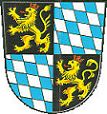
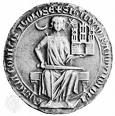

1222 On Apr. 23 on the orders of the Council of Oxford, the Feast of St. George begins to be celebrated as a nat. English festival. In the summer Scottish king Alexander II mounts another naval campaign against the MacRuairidhs; in the fall his agent Bishop Adam of Caithness is murdered by rebels, causing him to lead an army to punish them. Returning from the Crusades, Andras II of Hungary is forced by his lesser nobility (gentry) and his son Bela IV to issue the Golden Bull (Seal), the Magna Charta of Hungary, limiting the king's absolute power of imprisonment and confiscation, with an annual assembly to present grievances; it also exempts the gentry and clergy from taxation, while excluding Jews and foreigners from land and offices. On Aug. 2 Raymond VI, Count of Toulouse (b. 1156) dies, and is succeeded by his son Raymond VII (1197-1249) (until Sept. 27, 1249). In Aug. Theodore I Lascaris dies, and on Dec. 15 his son-in-law John III Ducas (Doukas) Vatatzes (1193-1254) becomes emperor of Nicaea (until Nov. 3, 1254), proving a great general and ruler, bringing his empire peace and prosperity - a better mouth, guaranteed? Prince Yaroslav of Novgorod overruns Estonia and sieges its capital Kolyvan. 16-y.-o. Wittelsbach duke Otto II of Bavaria (1206-53) marries Aganes, granddaughter of Duke Henry the Lion and Conrad of Hohenstaufen, making the Palatinate of the Rhine a Wittelsbach possession (until 1918), and causing the lion to be put in their coat of arms. Patna, India becomes a Nestorian metropolitan see. Stephen Langton issues the Constitutions, the Magna Charta of the English church. Stephen II Nemanjic of Serbia is recrowned by his Greek Orthodox brother St. Sava with a crown from the Greek patriarch of Nicaea in order to take away any taint of Roman Catholicism. The Rebellion of the Sinclairs sees the Sinclair family in Scotland try to rid Caithness of their enemies the Sutherland clan and their puppet bishop in Dornoch, inciting a riot which gets the bishop burned alive and the cathedral burned down, after which the king backs the Sutherlands in burning Wick and Thurso and capturing 80 ringleaders, who are tried in Golspie, four of them being burned alive then fed to the dogs. Deacon ? is burned at the stake for heresy for converting to Judaism to marry a Jewess, becoming the first known burning at the stake in England. Science: Jordanus Nemorarius (Jordanus de Nemore) (Giordano of Nemi) becomes gen. #2 of the Dominican Order, going on to dabble in science, using Hindu numerals and doing algebra with letters, writing Elementa Super Demonstrationem Ponderis, discussing the component of gravity along a trajectory, and expounding Jordanus' Axiom, that a force that can raise weight W to height H can raise weight K*W to height H/K; he also writes De Ratione Ponderis, discussing statical moments (the product of force and a lever arm), and The School of Jordanus, discussing the theory of virtual displacements. Nonfiction: Snorri Sturluson (1178-1241), Prose (Younger) Edd (Norse "great-grandmother"); treatise on Norse mythology and poetry; Heimskringla; a history of the Norwegian royal family from the time of the descent of the Ynglings from the Norse gods until 1177; Harald's Saga; about Harald Hardrada's defeat in England in 1066 - is that like Sleepy or Sneezy? Births: English knight Richard, 5th Earl of Hertford, 6th Earl of Glouchester, 2nd Lord of Glamorgan, 8th Lord of Clare (d. 1262); on Aug. 4 in Clare Castle, Clare, Suffolk; son of Gilbert de Clare, 4th earl of Hertford (1180-1230) and Isabel Marshall (1206-40); father of Gilbert "the Red Earl" de Clare (1243-95). Deaths: French count of Toulouse (1194-1222) Raymond VI (b. 1156) on Aug. 2.


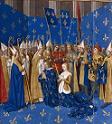

1223 On Jan. 18 Georgian king (since 1213) (son of Tamar) George IV Lasha (b. 1191) dies after repulsing Mongol attacks in 1221-2, and his sister Rusudan (1194-1245) becomes queen of Georgia (until 1245), facing more attacks by Mongols. On Mar. 25 king (since Mar. 26, 1211) Afonso II (b. 1185) dies, and on Mar. 26 his eldest surviving son (by Urraca of Castile) Sancho II (1209-48) becomes king #4 of Portugal (until Dec. 4, 1247), going on to relinquish a huge number of privileges to the Church to gets its independence recognized, creating a state within a state, after which he tries to weaken its power and funnel its revenues to the state, pissing-off Pope Honorius III, who excommunicates him. In Apr. Genghis Khan sends 10 ambassadors to Russian grand prince of Kiev (since 1212) Mystislav III Romanovich the Old (b. ?), who has them summarily executed, pissing-off the Mongols, who under Subitai invade S Russia from the Transcaucasus region, and defeat a coalition of Russians and Cumans at the Battle of the Kalka River in modern-day Donetsk Oblast, Ukraine near the Sea of Azov, capturing Mystislav III; "At the end of the campaign, Subodei and Jebe led their soldiers down to spend a relaxing spring in the Crimea on the Black Sea. They celebrated their victory with a great drunken party that lasted for days. The guest of honor was the defeated Prince Mstislav and his two sons-in-law, but their treatment showed how much the Mongols had changed since the time of Genghis Khan. The Mongols wrapped the three of them in felt rugs, as befitted high-ranking aristocrats, and stuffed them beneath the floorboards of their ger, thereby slowly, but bloodlessly, crushing the men as the Mongols drank and sang through the night on the floor above them. It was important to the Mongols that the Russians understand the severe penalty for killing ambassadors, and it was equally as important for the Mongol leaders to reaffirm to their own men the extent to which they would always be willing to go to avenge the unjust killing of a Mongol." On July 14 French king (since Sept. 18, 1180) Philip II Augustus (b. 1180) dies, leaving a legacy as the #1 Euro monarch of the day, with his well-embellished and well-walled Paris as the undisputed cultural capital of W Europe, and on Aug. 6 his 36-y.-o. son Louis VIII the Lion (Coeur de Lion) (1187-1226) is crowned Capetian king #8 of France in Reims (until Nov. 8, 1226), becoming the first Capetian king not crowned in his daddy's lifetime; too bad, he breaks the mold a 2nd time with a pathetically short reign. On Dec. 25 St. Francis of Assisi makes the first Christmas Creche (Nativity crib scene) with an ox and ass in Greccio, Italy. After a dispute of Philip of Ibelin, Alice of Champagne leaves Cyprus while remaining regent for her son Henry I, going on to unsuccessfully claim the kingdom of Jerusalem against the infant Conrad (son of her niece Isabella II of Jerusalem and HRE Frederick II). The Mongols under Subitai invade S Russia from the Transcaucasus region, and defeat a coalition of Russians and Cumans at the Battle of the Kalka River near the Sea of Azov. Pope Honorius III honoriously declares Henry III of age, but he continues in tutelage for the greater part of his official acts. Valdemar II of Denmark is captured by his vassal the Count of Schwerin, who releases him in 1226 only after he gives up most of his conquests in N Germany - and they still call him the Victorious and the Conqeror? The first mention is made of the ferret in Britain; rabbits were introduced by the Normans in the late 11th cent. Births: Egyptian Mamluk Bahri sultan #1 (1260-77) Al-Zahir al-Malik Baybars (Baibars) (Arab. "panther") (d. 1277) AKA Abu al-Futuh (Abu l-Futuhat) (Arab. "father of conquest") on July 19 in Cumania. Greek Byzantine emperor (1261-82) Michael VIII Palaeologus (Palaiologos) (d. 1281); founder of the Palaeologan Dynasty (ends 1453); son of Andronikos Doukas Komnenos Palaiologos and Theodora Angelina Palaiologina (granddaughter of Alexius III). Welsh prince (last) Llywelyn ap Gruffydd (Ein Llyw Olaf) (Our Last Leader) (d. 1282); son of Gruffydd ap Llywelyn (1200-44) and Senana; nephew of Dafydd ap Llywelyn (1208-46); grandson of Llywelyn the Great (1173-1240). Deaths: Welsh world traveler Giraldus Cambrensis (b. 1147); leaves four books on Ireland and Wales. French king (1180-1223) Philip II Augustus (b. 1180) on July 14. Portuguese king (1211-23) Afonso II (b. 1185) on Mar. 23 in Coimbra. Georgian king (1213-23) George IV Lasha (b. 1191) on Jan. 18.


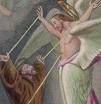

1224 On June 5 HRE Frederick II ("Grand Frederigo") founds the U. of Naples Federico II, becoming the oldest public non-religious univ. on Earth, dedicated to training secular admin. staff; alumni incl. St. Thomas Aquinas. Henry VII proclaims the Public Peace (Treuga Henrici) in Wurzburg. Louis VIII seizes Poitou, Saintonge, and all the lands between the Loire and the Garonne Rivers in an attempt to destroy the Angevin Dynasty's power, but the latter ain't dead yet and fights back. Theodore Dukas Angelus of Epirus captures Thessalonica and ends the Latin kingdom of Thessalonica (founded 1204), then proclaims himself Emperor of the West, going on to conquer Philippopolis and Andrianople; meanwhile John III Vatatzes of Nicaea defeats the Franks at the Battle of Poimanenon, then takes the islands of Samos, Chios, and Lemnos off the Anatolian coast, followed by Rhodes, and sends an army across the straits to capture Adrianople; meanwhile Robert I of Courtenay, Latin emperor of Constantinople is defeated by Theodore Dukas Angelus of Epirus at the Second Battle of Serres in Greece (first in 1196), after which he drives the invading Nicaeans away from Adrianople; when the dust settles Robert's territories are reduced to the city of Constantinople alone. Lucky Ivan? Mongol hordes invade Poland, Hungary, and Russia as far as Novgorod, but upon hearing that the Tanguts have rebelled, Genghis Khan returns E to Karakorum to deal with them. Song Ning Zong (b. 1168) dies without an heir, and Song Li Zong (Lizong) (Zhao Yun) (1205-64), who was not in line for the throne but was shoed-in by chancellor (1208-33) Shi Miyuan (1164-1233) and dowager empress Yang becomes Southern (Nan) Song emperor #5 of China (until Nov. 16, 1205), going on to rule for 40 years while spending his time chasing hos and dying without an heir. Frederick II orders all heretics in Lombardy to be burned at the stake; Count Ugolini, papal legate to Lombardy approves and pub. it. Irish king of Connacht (since 1202) Cathal Crobhdearg Ua Conchobair (Cathal the Red-handed O'Conor) (O'Connor) (b. 1153) dies after writing to Lord of Ireland Henry II requesting his son Aedh (Od) be his successor, and in 1226 the Irish kingdom of Connacht is declared forfeit by the English govt., causing a 9-year war, starting next year with an invasion by Domnall Og O Neill of Tir Eogain, who declares himself king and causes several of his chieftains (Siol Muiredaig) to defect, causing Cathal to appeal to a council of English chiefs in Ireland successfully, who back him in a brutal war that devastates Connacht, with major battles in Turlough, County Mayo and Meelick in County Galway, and the plundering of Coolcarney, which results in fishing baskets full of drowned children; after peace is restored, his chiefs are held for ransom by the English, and when they finaly leave, the sons of Ruaidri O'Connor revolt, resulting in 1225 in the Sack of Ardrahan, in which Niall, son of Farrell O'Teige is KIA; in 1228 Connacht king Aedh is KIA, and his cousin Aedh mac Ruaidri Ó Conchobair (-1233) becomes king of Connacht (until 1233); in 1226 Cathal's chief bodyguard Fearghal Ó Taidg an Teaghlaigh (-1226) is KIA by Donslevy O'Gara in County Sligo; in 1232 a truce is declared, after which "This was a necessary tranquility, for there was not a church or territory in Connaught at that time that had not been plundered and desolated. An oppressive malady raged in the province of Connaught at this time: it was a heavy burning sickness, which left the large towns desolate, without a single survivor"; too bad, the English allied with the French see their chance and invade, conquering Connacht by 1235. The Order of Calatrava in Portugal moves to Aviz (Avis) and becomes the Military Order of Aviz. (St.) Francis of Assisi (1181-1226) gets his lucky stigmata in his hands, putting him on the fast track for sainthood, which is helped by his animal stories, esp. The Wolf of Gubbio; the Franciscan Order reaches England, soon attracting the greatest scholars at Oxford. The Transylvanian Saxons in Hungary are given self-govt. with a written charter. Venetian glassmakers form a craft guild. Nonfiction: Abdallah ur-Rumi (1179-1229), Mu'jam ul-Buldan (1224-8); geographical lit. encyclopedia. Births: French "Life of St. Louis" historian Jean de Joinville (d. 1317) on May 1 in Champagne; takes part in the Seventh Crusade (1248-54).

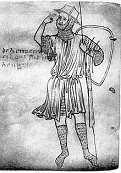
1225 In the fall Georgia is attacked by the Khwarezmians under shah Jelal ad-Din Mingburnu, who is being pursued by the Mongols, who defeat the Georgians in the Battle of Garni and siege Tbilisi (until 1226), causing Queen Rusudan to move the capital to Kutaisi on the Rioni River 137 mi. W of Tbilisi in the W region of Imereti. On Oct. 5 caliph (since Mar. 28, 1180) An-Nasir (b. 1158) dies, and Al-Zahir (Al-Dhahir) (1175-1226) succeeds him as Abbasid caliph (until July 10, 1226). The English regain all of the Frenh lands lost the previous year except Poitou, the Limousin, and Perigord. After being issued in 1215 and reissued in 1217 and 1217, the Magna Charta is reissued for the 3rd time in a definitive form. HRE Frederick II marries Yolande, heiress of the Latin kingdom of Jerusalem, then declares himself king of Jerusalem, forcing John of Brienne, who is traveling on the Continent to relinquish the title, while he soon commands papal troops in an attack upon Frederick II's possessions; 8-y.-o. Henry I is hastily crowned king of Cyprus in Nicosia to avert a seizure of power by Frederick II; John of Brienne's daughter Isabella is crowned queen of Tyre. "Red" Gilbert de Clare, 7th Earl of Hertford and 3rd Earl of Gloucester (1243-95) inherits his father's and his grandmother's estates, making him the most powerful magnate in England. The German Brethren of the Sword capture Tartu, which becomes a bishropric. Otto de la Roche resigns, and his son Guy I de la Roche (1205-63) becomes Latin duke #2 of Athens (until 1234). The Ly Dynasty in Vietnam ends, and the Tran Dynasty (ends 1400) is founded by the last queen of Ly, from the Tran family of pious Buddhists, who institute a classical Chinese Confucian educational system and compulsory military service. The Council of Sens condemns the 870 pantheistic work "De Divisione Naturae" of Johannes Scotus Erigena, and Pope Honorius III orders it burned. When the job of Messiah stays open and another claimant appears in S Arabia, Maimonides writes Letter to the South, pooh-poohing him while keeping belief in a coming Jewish Messiah as one of the 13 principal tenets of the Jewish faith. The first European guilds and fraternities come into existence. About this time cotton is grown in Spain. Science: Italian mathematician Leonardo Fibonacci (1170-1250) pub. two works contributing to the solution of equations of the first and second degree, and competes in a math tournament with John of Palermo supervised by HRE Frederick II. Nonfiction: About this time (1225-35) Villard de Honnecourt flourishes in Picardy, N France, leaving a sketchbook containing 250 drawings, mostly architectural designs of churches he visited, incl. Laon Cathedral and Rheims Cathedral. Chinese customs inspector Zhao Rugua (1170-1228) writes Description of the Barbarous Peoples (Zhufan Zhi) (Chu-fan-chi), describing the Lighthouse of Alexandria, and a compass needle mounted on a dry pivot. Music: The earliest known English round (song in harmony) Sumer Is Icumen In is composed by John of Foresete, a monk of Reading Abbey, with the 2nd line "Lhude sing cuccul" giving it the name "The Cuckoo Song"; he also writes the first vocal composition that can be read and played by modern musicians. Poetry: Guillaume de Lorris (-1235) and Jean de Meung, Roman de la Rose; a romantic tale of courtly wooing in 22K lines of verse, the first 4K written by de Lorris. Births: Italian "Summa Theologica" Dominican scholastic philosopher-theologian (blonde) ("Angelic Doctor") ("Prince of Scholastics") ("the Great Dumb Ox of Sicily") (St.) Thomas Aquinas (Thomas of Aquino) (d. 1274) in Roccasecca (3 mi. from Aquino) (halfway between Rome and Naples, near Monte Cassino); son of Count Landulf of Aquino (nephew of Frederick I Barbarossa); mother is a descendant of the Norman princes of Sicily; brother Rainaldo is a page-falconer at the court of Frederick II; pupil of Albertus Magnus; educated at the Benedictine monastery of Monte Cassino, and the U. of Naples, where he is introduced to Aristotle and Averroes; father of Roman Catholic theology, saving it after Western contact with the disturbing works of Aristotle; canonized in 1323; proclaimed doctor of the Church in 1567. German #1 poet Konrad (Conrad) von Wurzburg (Würzburg) (d. 1287) in Wurzburg; settles in Basel in 1270; writes short Middle High German court epics based on Latin and French sources, marking the transition from the Minnesinger to the Meistersinger period. Georgian Bagrationi king (1259-93) David VI Narin (the Clever) (d. 1293); son of Rusudan (1194-1245) and Muhammad Mughis ud-din Turkan Shah (grandson of Kilij Arslan II) (who converted to Christianity after his marriage). Deaths: Arab Abbasid caliph (1180-1225) Al-Nasir (b. 1158) on Oct. 5.



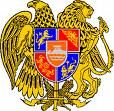
1226 On Jan. 30 Pope Honorius III approves the mendicant Carmelite Order (founded in 1224), and induces French king Louis VIII (b. 1187) to crusade against the remaining Albigenses, and he conquers Avignon in Provence, then most of Languedoc, starting the practice of bestowing huge fiefs as appanages on princes of the blood, which later backfires in Burgundy and elsewhere; he then dies on Nov. 8 of dysentery on his return to Paris, and his able, carefully-educated Capetian son Louis IX (the Saint) (1214-70) (canonized in 1297) (the ideal medieval king?) succeeds him as Capetian king #9 (until Aug. 25, 1270), with his mother Blanche of Castile (1188-1252) as regent, going on to continue his daddy's policy of enlarging the French royal domain and getting brownie points with the Church by kicking any remaining Albigensian butt around the Mediterranean, and introducing the title of admiral into France while winning a rep. for justice which makes him the arbiter of Europe, and his reign the golden age of medieval France; in the meantime his devout mouther, er, mother gets the support of the people, officials, and Church to suppress a number of feudal rebellions (1226-31) while he finished growing up, wearing the saint-making itchy-scratchy goat-hair shirt. On Mar. 9 the Khwarezmians take Tbilisi after killing 100K, and the remaining pop. are ordered to convert to Islam, which they refuse, causing them all to be massacred. Duke Conrad of Masovia (Poland) invites the Palestine-based Teutonic Order (Knights) into Poland to help them fight the pagan Prussians; initially claiming to want to stay only a year or two, they instead conquer most of the Baltic coast within the next two cents., blocking Polish access to the sea. Robert of Courteney, Latin emperor of Constantinople is defeated by Theodore of Epirus and John III of Nicea, causing him to promise to marry Eudoxia, daughter of late Nicaean emperor Theodore I Lascaris, but since his sister Marie de Courtenay was his wife, Patriarch Manual Sarantenos prohibits the marriage, causing him to switch to the Lady of Neuville (-1228) (Eudoxia?), pissing-off a Burgundian gentleman, who organizes a conspiracy of knights in Constantinople to attack the house of the new wife and her mother, cutting off their lips and nostrils and throwing them in the sea, causing Robert to flee to Rome to obtain assistance from Pope Gregory IX, after which he falls sick and dies in 1228 in Morea during the return visit at the court of Geoffrey I of Villehardouin, prince of Achaea. Hetum (Hethum) (Hethoum) (Hetoum) (Het'um) (Hayton) I the Great (1213-70) becomes ruler of Christian Lesser Armenia (Cilicia) (until 1270), founding the Hetoumid Dynasty (ends 1342), going on to fight the pesky Mongols and Muslims. Az-Zahir dies, and his son Al-Mustansir (1176-1242) succeeds him as Abbassid caliph in Baghdad (until 1242). Fujiwara no Yoritsune (Kujo Yoritsune) (1218-56) becomes Kamakura shogun #4 of Japan (until 1244). Ezzelino III da Romano (1194-1259) of Treviso (modern-day Veneto) is elected podesta of Verona, Italy, ruling Verona, Vicenza, and Padua for almost two decades, converting the office into a permanent lordship and becoming a cruel tyant propagandized against heavily by many enemies. Prince Yaroslav of Novgorod invades and devastates Finland, and forcibly baptizes the Karelians; he then fails to talk his people into making war with its neighbor Pskov, pisking him off and causing him to seize the Novgorodian enclave of Volokolamsk (Russ. "portage on the Lama") at the confluence of the Lama and Gorodenka Rivers (80 mi. NW of Moscow). Big mistake? Roman Catholics begin to bow down before the bread at Mass - look what it did to that wolf at Gubbio? Architecture: Toledo Cathedral in Spain is begun (finished 1493). Births: French count of Anjou and Provence, and king of Sicily (1266-85) Charles I of Naples and Sicily (Anjou) (d. 1285) on Mar. 21; youngest son of Louis VIII (1187-1226) and Blanche of Castile (1188-1252); younger brother of Louis IX. Polish king (1227-79) Boleslaus (Boleslav) (Boleslaw) V (the Chaste) (the Bashful) (d. 1279) on June 21 in Stary Korczyn; son of Leszek the White. Dutch count of Flanders (1246-1305) Guy of Dampierre (d. 1305); 2nd son of William of Dampierre (1196-1231) and Margaret II of Flanders (1202-80). Syrian bishop and philosopher-theologian-historian-lexicographer Gregory Bar Hebraeus (d. 1286) in Ebro. Deaths: Italian Roman Catholic friar St. Francis of Assisi (b. 1182) on Oct. 3 in Porziuncola, Assisi; a cent. later the anon. The Little Flowers of St. Francis spreads folk tales and anecdotes about him, along with his sermons, incl. Sermon to the Birds. French king (1223-6) Louis VIII the Lion (b. 1187) on Nov. 8 in Chateau Montpensier (dysentery). Irish musician Aed mac Donn Ó Sochlachain (b. ?); one of the first known Irish musicians, known for chanting and harp-playing.







1227 In Feb. the Georgians recapture Tbilisi, but have to abandon it again, and burn it in the battle. On Mar. 18 Pope (since 1216) Honorius III dies, and Count Ugolino of Segni (nephew of Pope Innocent III) is elected Pope (#177) Gregory IX (1145-1241), continuing his uncle's policy of papal supremacy, and renewing the prohibition against usury, which becomes the law of the Church until 1917; he immediately orders HRE Frederick II to obey his 1215 vow to sail for the Holy Land, which he promises to do on Sept. 8, but reneges three days later, claiming sickness (fever), and on Sept. 20 Gregory IX places him under the ban of the Church (excommunication), and pub. a Letter Contra HRE Frederick II denouncing his vices, heresies, and offences against mankind in an attempt to reel the imperial religious skeptic in and make him follow his daddy Henry VI's footsteps; not phased, Frederick II counters with his own Letter Contra Pope Gregory IX, addressed to all the princes of Europe, becoming the first clear statement that the pope shouldn't be able to tell secular rulers what to do. On July 22 after Valdemar II invades N Germany to get his lost territories back and attacks Lubeck (Lübeck)in Schleswig-Holstein, he is disastrously defeated in the Battle of Bornhoved (Bornhöved), ending Danish domination of the S Baltic Sea, although he keeps Estonia; Lubeck is declared a free imperial city by HRE Frederick II, and goes on to glory as a German outpost in the Baltic against the Danes. On Aug. 18 after conquering the Western Xia (Xia Xia) (Hsi-Hsia) (Tangut) state in C China (founded in 1038), Genghis Khan (b. 1162) dies near Khentii Aimag in Yinchuan, Western Xia after conquering 4.86M sq. mi. from the Pacific Ocean to the Caspian Sea (incl. N China, Mongolia, S Siberia, and C Asia), and is succeeded by his 3rd son Ogedei (Ogodei) (Ogadai) (Ogotai) (Ughetai) (1186-1241). The great council of England formally declares Henry III to be of the age of majority, but he continues to leave the govt. to Hubert de Burgh, who is elevated to earl of Kent; meanwhile Henry III seizes Isleworth in NW London near the Thames River, along with other properties of the St. Valeri family and gives it to his brother Richard, 1st earl of Cornwall, who builds a manor house that is burned down during the Second Barons' War in 1264. Leszek I the White (b. 1186) is assassinated, and Duke Henry the Bearded is wounded in Gasawa while attending a diet of Piast Polish dukes on the orders of Prince Swietopelk II of Gdansk Pomerania, and Leszek I's 6-y.-o. son Boleslav (Boleslaus) (Boleslaw) V (the Chaste) (the Bashful) (1226-79) is too young to succeed, allowing his gay cousin Wladyslaw (Wladislaus) III Spindleshanks (1165-1231) to regain his throne in Cracow after waiting 20 fun-filled years; too bad, he is deposed next year by his nephew Wladyslaw Odonic Plwacz (1190-1239) (father of Przemysl I) (who was behind Leszek I's assassination), who becomes grand duke of Poland (until 1234). The first European Medieval gay knight orgy or what? Austrian married knight Ulrich von Lichtenstein (1200-75) dresses in a white ballgown wearing braided hair tresses as Frau Venus, and challenges all the knights of Europe to joust with him, shattering an avg. of 8 lances a day for 5 weeks and winning 307 jousts, never being unhorsed?; all this to get the permission of his lady love (a highborn married princess) to kiss him? On Sept. 11 St. Elizabeth's hubby Louis IV (b. 1200) dies in Otranto of fever en route to join the Sixth Crusade, causing her to utter the soundbyte: "He is dead, he is dead. It is to me as if the whole world died today"; their boy son Hermann II (1222-41) becomes landgrave of Thuringia, with Ludwig IV's grasping brother Henry Raspe as regent; after joining the third order of St. Francis under her strict confessor Konrad (Conrad) of Marburg (-1233) (later anti-Albigensian inquisitor), Elizabeth begins giving away her estate as alms, causing her brother-in-law Henry Raspe to go nonlinear and drive her and her three children from Thuringia, and she takes refuge with her maternal uncle Bishop of Bamberg (1203-37) Count Egbert (Ekbert) von Andechs-Meranien (1173-1237) in Pottstein, Bavaria (either that or Egbert held her hostage to make her give up her vow of celibacy so she could marry into more bling, and she is released after threatening to cut off her own nose), then moves to Marburg, where she ministers to the sick and dies at age 24 in 1231, getting sainted only four years later. Japanese potter Kato Shirozaemon (Toshiro) returns from a 4-year stay in China to found the Japanese porcelain industry in Seto. Births: Italian pope (1288-92) (first Franciscan) Nicholas (Nicholaus) IV (Girolamo Masci) (d. 1292) on Sept. 30 in Lisciano, Marche. Deaths: Norman duke William of Apulia (b. 1111). Chinese Daoist monk Changchun (b. 1148). Mongol conqueror Genghis Khan (b. 1162) on Aug. 18 near Khentii Aimag; dies in bed after enjoying 500 wives and concubines; his burial party kills anybody seeing the procession, and all slaves and solders attending it are killed; a river is diverted over his grave, which isn't found until ?; his palace is uncovered in 2004. Polish grand duke (1194-1227) Leszek I the White (b. 1186). German landgrave of Thuringia (1217-27) Ludwig IV (b. 1200) on Sept. 11 in Otranto (fever).


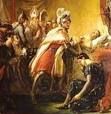

1228 On Mar. 23, 1228 Pope Gregory IX renews the excommunication of double-shuffling wannabe HRE (since Nov. 22, 1220) Frederick II Hohenstaufen (1194-1250) and proclaims a Crusade against his Sicilian lands, then is publicly insulted by a Ghibelline mob, causing him to pick up his holy robes and flee to Perugia, from where he directs an invasion of Apulia (ends 1229); on June 28 Frederick II finally sails for the Holy Land to lead the lay-royal Sixth (6th) Crusade (ends 1229), assisted by wealthy Richard of Cornwall, 1st Earl of Cornwall (1209-72) and Count Thibaud (Theobald) IV (the Troubadour) (the Posthumous) de Champagne (Navarre) (1201-53), but this only causes the pope to ban him a 2nd time; on July 21 he lands at Limassol, engages in a power play with John of Ibelin, the Old Lord of Beirut, sails for Acre, then goes to Jaffa where he holds truce conferences with Egyptian sultan Malik al-Kamil, nephew of Saladin exposing his soft stance on Islam, helped by being fluent in Arabic; ; Stupor Mundi (Wonder of the World) Frederick II speaks six languages fluently, incl. Arabic, making him the first Crusader to speak dangerous Muslim talk, causing rumors that he might be the Antichrist. On Aug. 14 Pope Gregory IX canonizes St. Francis of Assisi - I see, I see? On Sept. 24 Stefan II the First-Crowned dies after being tonsured as monk Simon, and his blind eldest son Stefan Radoslav (1192-1234) becomes king #2 of Serbia (until 1233), relying on his father-in-law Theodore Komenos Doukas (-1230) of Epirus. Loser Robert I of Courteney, Latin emperor of Constantinople since 1218 dies, and is succeeded by his 11-y.-o. brother (by Peter I and Yolande) Baldwin II of Courtenay (1217-73), who becomes the last Latin emperor of Constantinople (until 1261); his youth causes antsy Frankish nobles in Constantinople to propose Bulgarian tsar John Asen II (-1241) as emperor to counter the aggression of Theodore Dukas Angelus of Epirus, but the Roman Catholic clergy nix it by 1230; he spends his reign peddling holy relics looted from Big C throughout Europe - the Devil wears Prada? Henry the Bearded (1163-1238) becomes prince of Cracow, and fights to reunify Poland; meanwhile the Teutonic Knights arrive in Prussia. Another Scottish rising in the N is crushed by Alexander II. The Genghis-less Mongols defeat the Russians, but fail to consolidate their gains. The Khwarezmians defeat the Georgians in the Battle of Bolnisi despite Queen Rusudan's alliance with the neighboring Seljuk rulers of Rum and Khlat, whose forces arrive too late. The Tai Ahom Kingdom in the Brahmaputra Valley in Assam, NE India is founded by a Tai prince from Mong Mao (ends 1826). Gilbert de Clare, earl of Gloucester (husband of William the Marshall's daughter) leads an army against the pesky Welsh, and captures Morgan Gam, then releases him next year. The town of Metlika ("goosefoot") in SE Slovenia is first mentioned. The world's first publicly-funded univ. is founded in Vercelli, Italy in Piedmont, N Italy; closed in 1372. Nonfiction: Leonardo Fibonacci (1170-1250), Liber Abaci; the only ed. that survives to modern times; pub. in English for the first time in 2002. Births: German king (1247-56) and count of Holland and Zeeland (1235-56) William II of Holland (d. 1256) in Feb.; son of Floris IV (1210-34) and Mathilde of Brabant. German Hohenstaufen king (1237-54) and Sicily king (1250-54) and king of Jerusalem (1228-54) Conrad IV (d. 1254) on Apr. 25 in Andria; son of HRE Frederick II (1194-1250) and 14-y.-o. harem bride Yolande II of Brienne (1212-28), who dies in childbirth like her mommy Mary de Montferrat of Jerusalem (1191-1212); half-brother of Manfred (1232-66). Deaths: English archbishop of Canterbury Stephen Langton (b. 1156) on July 9. Flemish Latin emperor of Constantinople (1221-8) Robert I of Courtenay (b. ?) in Morea.
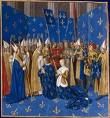


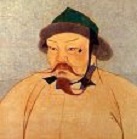

1229 On Feb. 14 after years of feeling cheated out of the throne, Olaf II (the Black) Godredsson (1173-1237) kills his younger brother Ragnald IV, and becomes king of the Isle of Man (until 1237). On Feb. 18 the Crusaders under cool multilingual brain man HRE Frederick II negotiate the Treaty of Jaffa and Tell Ajul with al-Kamil, Ayyubid sultan of Egypt, ending the Sixth Crusade (begun 1228), agreeing to a commercial convention along with the surrender to the Crusaders of part of the Kingdom of Jerusalem, incl. the complete tour package of Jerusalem, Nazareth, Bethlehem, and Lydda, along with a corridor to the sea for Christian tour groups, and a 10-year truce; since Jerusalem is wallless, neither ruler much cares?; Frederick II promises not to build the walls of Jerusalem; the Temple Mount incl. al-Aqsa Mosque and the Dome of the Rock remain in Muslim hands, along with the Crusader Oultrejordain (Transjordan) castles; the Christians retake Jerusalem until 1239, prohibiting Jews from living there; the Muslim and Christian pops. greet the news with riots, with mobs attacking al-Kamil's camp at Tel al-Ajul and having to be driven away by troops; Sheikh Sibt al-Jauzi speaks before sobbing crowds at the Great Mosque in Damascus, calling al-Kamil a traitor, which he lamely responds to by claiming he only gave up "some churches and ruined houses"; on Mar. 18 after no priest will do it, HRE Frederick II crowns himself king of Jerusalem in the Church of the Holy Sepulchre, along with his infant son Conrad IV (b. 1228), for whom he acts as regent, then tours the Temple Mount, speaking with the attendants in Arabic and beating up a Christian priest who dares to enter al-Aqsa Mosque carrying a Bible, ordering the muezzin to be allowed to issue the daily calls to prayer, pissing-off the Templers, who plot to assassinate him; actually the patriarch of Jerusalem, who opposed Frederick II at every turn to please his boss the pope ordered all clergy locked up so they couldn't help in the ceremony; hobbled by his ban he leaves in June early in the morning while the Templers pelt him with manure and entrails, then seizes Cyprus with his Longobard troops, defeats a papal army in Sicily, and makes peace overtures to try to get the ban lifted; meanwhile the pope and the emperor trade epithets, accusing each other being the Antichrist (and they're both right?); former Latin king of Jerusalem (1210-25) John of Brienne returns to Jerusalem, and is chosen by the Latin barons of Constantinople to become regent of boy emperor Baldwin II of Constantinople, then becomes emperor in 1231 until he comes of age in 1237. On Apr. 12 Raymond VII of Toulouse surrenders to 17-y.-o. Louis IX and his regent mother Blanche of Castile, and signs the Treaty of Paris (Meaux), ending the Albigensian Crusade (begun 1209), betrothing his heiress to Louis' brother Alphonse, while Louis IX is betrothed to Margaret of Provence (1221-95), marrying her on May 27, 1234, proceeding to steal Provence from the HRE; Raymond VII cedes over half of his territory to the king, retaining the remainder only during his life and agreeing to dismantle his fortifications in Toulouse et al., causing Occitan political autonomy to be kaput, and Cathars to lose their last political protection, with Raymond required to hunt them down as vassals of the king. On July 14 HRE Frederick II defeats imperial bailiffs outside Nicosia and seizes Cyprus from regent John of Ibelin (1179-1236), old Lord of Beirut, who flees with his family to Palestine and sets up shop in Jaffa, vowing to kick Hohenstaufen butt, launching the War of the Lombards (Imperialists) (Ibelin War) between the reps of HRE Fredrick II, supported by the Knights Hospitaller and Teutonic Knights vs. the native aristocrats led by Ibelins and Montforts, supported by the Knights Templar (ends 1243). On Sept. 10 James I the Conqueror of Aragon conquers Mallorca in the Balearic Islands, and sets out to conquer the rest (finished 1235). On Sept. 13 Ogedei (Ogotai) Khan (1186-1241), 3rd and favorite son of Genghis Khan becomes khan #2 of the Mongol Empire (until Dec. 11, 1241); the Mongols put an end to the sovereignty of the Uyghurs. Henry III summons his English vassals to follow him to Aquitaine to regain the N part, which has been seized by France; however, there aren't enough ships to carry the troops, and Henry blames Hubert de Burgh (who had quarreled with him over his military adventures and subservience to the papacy) for it - he's got maybe 5 years left? After becoming James I's mistress to save Urgell, Countess (since 1208) Aurembiaix (1196-1231) of Urgell in N Spain marries Infante Pedro, who becomes count Peter I of Urgell (1187-1258), exiled brother of Afonso II of Portugal, who helps her regain Urgell under Aragonese lordship in return for the city of Lleida, then helps the Bishop of Tarragona conquer Ibiza from the Moors in 1230; when she dies, James I claims his county, and in 126 he gives over the rule to the House of Cabrera and James I in return for the Balearic islands of Majorca, Ibiza, and Formentera. The Hafsid Dynasty splits from the Almohads under Abu Zakariya Yahya (1203-49), ruling Ifriqiya (Tunisia) until 1534. How do you approach the Word of God? You don't? Progresso, what a soup of holy words shouldn't be? After the first hand-copied partial translations of the Bible by the pesky Albigensians begin appearing, the (non-ecumenical?) Council of Toulouse forbids lay persons from reading the Bible, to be enforced by the Papal Inquisition, run mainly by the Dominicans (is that a Bible in your pants or are you just happy to see me?); "Search the Scriptures, for in them ye think ye have eternal life, and they are they which testify of me" (John 5:39); "Use of the vernacular [would mean] demolition of a language barrier that safeguarded the clergy's exclusive dominion over religious matters" (Massimo Firpo); meanwhile the U. of Toulouse is founded in Toulouse, France, becoming the 2nd oldest univ. in France and one of the oldest Euro univs. to survive to modern times; it is later renamed in honor of 1912 Nobel Chem. Prize winner Paul Sabatier (1854-1941). Students in Paris launch the first major student strike in history over the price of wine in a tavern in the Faubourg Saint-Marcel. King Henry III of England forces the Jews to pay half the value of their property in taxes, collecting £422K in taxes and capital levies in seven years - who chooses which half? Pope Gregory IX exacts a tithe of one-tenth of clerical incomes to pay for his war against the *!?!* emperor Fred II Is Dead. Frenchman Simon de Montfort (1208-65) comes to England to present claims to the earldom of Leicester, which he inherited from his grandmother - what's in your wallet? Geoffrey I of Villehardouin (b. 1169) dies, and his eldest son Geoffrey II of Villehardouin (1195-1246) becomes Latin prince #3 of Achaea (until May 6, 1246), becoming the most powerful vassal of the Latin Empire of Constantinople, helping the Crusader states in Greece regroup around him, going on to rescue Constantinople 3x and receiving the reward of suzerainty over Euoboea by Emperor Baldwin II, becoming known for his benevolent and just rule, keeping his popularity with the O rthodox Greco-Slavic pop. by restricting the activities of Latin priests, even after the pope excommunicates him, knowing that things are so iffy that he will reinstate him, which he does. The town of Stuttgart on the Neckar River 130 mi. SSE of Frankfurt is mentioned. About this time univs. in Italy begin the systematic training of physicians. Inventions: Fustaqiyya', a chicken-pistachio dish is served in Baghdad for the first time. Science: Morrocan Muslim scholar Hasan al-Marraqushi pub. tables of sines, versed sines, arc sines, and arc cotangents for each degree. Births: Saxon Welf duke Henry II (1142-80) and Bavarian duke Henry XII (1156-80) Henry the Lion (d. 1195); son of Henry X the Proud (1108-39). Deaths: French prince #2 of Achaea (1209-29) Geoffrey I of Villehardouin (b. 1169). Arab scholar Abu Abdallah Yaqut al-Hamawi (b. 1179); leaves Mujam al-Buldan, a geographical dictionary and encyclopedia of all Muslim knowledge of science, obtained by going through 10 libraries he found in Merv, one containing 12K vols.; after moving to Khiva then Balkh, the Mongols almost catch him, and he escapes naked clutching his mss. to Mosul, becoming a copyist and completing his opus - did he get to taste the fustaqiyya? French countess of Champagne Blanche of Navarre (b. 1177) on Mar. 23.






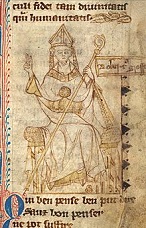
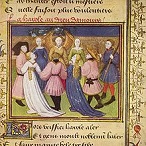
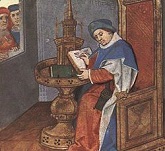
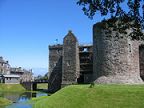

1230 In Feb. a flood of the Tiber River causes Rome to invite exiled Pope Gregory IX back; on July 20 the Peace of San Germano is concluded between HRE (since 1212) Frederick II (1194-1250) and the pope, who gets his papal states back, while Freddy II gets unexcommunicated, and they kiss and make up by Sept.; now the pope is free to crack down on those !*?! heretics as the Sixth Crusade fizzles and he needs some more sheep to slaughter ("not only the reductio ad absurdum of crusades, but of papal excommunications" - H.G. Wells). On Mar. 9 after Theodore Comnenus Ducas of Epirus (d. 1253), who sees Bulgaria as the only obstacle between him and Constantinople invades with 85K men without a declaration of war, Bulgarian tsar (since 1218) Ivan (John) Asen II (-1241) defeats and captures and blinds him and captures or kills his entire army in the Battle of Klokotnitsa (Klokotnica) (in modern-day Haskovo Province, Bulgaria) (luckiest battle in Bulgarian history), then occupies W Thrace, Macedonia, and N Albania all the way to Dyrrachion, styling himself tsar of the Bulgarians and Greeks, and giving Thessalonica Theodore's brother Manuel Comnenus Ducas (Manuel Komnenos Doukas) (1187-1241)) (until 1237); Theodore and his son John spend seven years in captivity (until 1237), while Manuel goes on to lose Thrace, most of Macedonia, and Albania to the Bulgarians, making Thessalonica a vassal; meanwhile Michael II Comnenus Ducas returns from exile and seizes control of Epirus. On July 28 Leopold VI (b. 1176) dies, and his only son Frederick II (the Quarrelsome) (the Warlike) (1211-46) becomes Babenberg duke of Austria and Styria (until June 15, 1246). On Oct. 25 after Henry III tries to regain his father's lost possessions in France, Gilbert de Clare, 5th Earl of Hertford (b. 1180), son of Richard de Clare, 4th Earl of Hertford (1153-1217) is KIA while fighting for Henry in Brittany. On Dec. 15 Bohemian king (since 1198) Ottokar I (b. 1155) dies, and his son (by wife Constantia) Wenceslaus (Wenceslas) (Wenceslav) (Vaclav) I Premyslid (1205-53) becomes king of Bohemia (until 1253), encouraging German immigration to counteract the nobles, giving them large forested tracts to clear and build cities in, with practical autonomy under German Magdeburg law. On Dec. 20 a cleaned chalice at the Church of Sant'Ambrogio in Florence, Italy (built in the 900s on the site where St. Ambrose stayed) is found to contain blood by parish priest Uguccione, causing the church to become a pilgrim destination. Castilian king (since 1217) (St.) Ferdinand III (1199-1252) becomes king of Leon (until 1252), which makes its final reunion with Castile. The Teutonic Knights (capital Warsaw) under grandmaster #4 (1209-39) Hermann von Salza (1179-1239), at the request of Duke Konrad I of Masovia (1187-1240) begin their Prussian Crusade (ends 1283) to force these holdout militant seafaring cattle-herding pagans in the SE corner of the Baltic Sea to accept Christianity. Alexander II of Scotland sends the earl of Buchan at the head of a royal army to finally defeat and eliminate the pesky Mac William Clan in Moray (tracing back to Macbeth and Malcolm III), pacifying it and dashing out the brains of the last member in whom the Moravian claim to the Scottish crown resides (an infant girl) against the market cross shaft at Forfar in Angus on Alexander's orders, causing them to finally accept Scottish royal rule; Alexander then invites the Dominican friars to Scotland to found their first convent in Edinburgh; meanwhile Olaf II of Man, who had been driven to exile in Norway last year by Lord Alan FitzRoland of Galloway (1175-1234) returns in June with an 80-ship 3K-man fleet, and captures Rothesay Castle on the Isle of Bute, owned by the Stewarts, finding the walls so soft they can be hewn with axes, then goes on to recover the Isle of Man by Aug. About this time the Crusaders bring leprosy back with them to Europe. Norman Marcher lord William De Braose (b. 1197) is hanged for having an affair with Prince Llywelyn's wife Joan. Inventions: About this time Robert Grosseteste (1175-1253) of Oxford U. (teacher of Roger Bacon and John Peckham) discovers the writings on optics of Arab Muslim al-Haitham, and describes how the "visual ray" can be broken up by passing it through transparent lenses to enlarge or reduce visual objects; John Peckham goes on to become archbishop of Canterbury, and pub. Perspectiva Communis, describing reflection, refraction, and the structure of the eye. Art: Berlinghiero of Lucca, Madonna and Child; done in the Byzantine style. In this decade the anon. near life-size German Gothic Bamberg Horseman (Bamberger Reiter) stone equestrian statue is sculpted for the new (1237) Bamberg Cathedral in Germany, becoming the symbol of the city of Bamberg, Bavaria, becoming the first of its kind since antiquity. Poetry: About this time French poet Guillaume de Loris (1200-40) composes the 4,058-line romantic courtly love poem Roman de la Rose (The Romance of the Rose), about the attempts of a courtier to woo his beloved in a walled garden (locus amoenus); in 1275 French poet Jean de Meun (Meung) (Jean Clopinel or Chopinel) (1240-1305) composes 17,724 more lines; it becomes the most-read book in Europe through the 15th cent. after Chaucer translates it into English in the late 14th cent. Music: Anon., Carmina Burana (Lat. "Songs of Beuern"); a German collection of Latin monastic songs for Beuern Monastery appears about this time; set to music in 1937 by Carl Orff (1895-1982); lyrics incl. "In Springtime", "In the Tavern", "The Court of Love", and O Fortuna (Fortune, Empress of the World): "O Fortuna/ velut luna/ statu variabilis/ semper crescis/ aut decrescis./ Vita detestabilis/ nunc obdurat/ et tunc curat/ ludo mentis aciem./ Egestatem/ potestatem/ dissolvit ut glaciem,/ sors immanis/ et inanis/ rota tu volubilis/ status malus,/ vana salus/ semper dissolubilis,/ Obumbrata/ et velata/ michi quoque niteris./ Nunc per ludum/ dorsum nudum/ fero tui sceleris./ Sors salutis/ et virtutis/ michi nunc contraria/ est affectus/ et defectus/ semper in angaria./ Hac in hora/ sine mora/ corde pulsum tangite/ quod per sortem/ sternit fortem/ mecum omnes plangite!"; "O Fortune, like the Moon you are changeable, ever waxing and waning. Hateful life first oppresses and then soothes as fancy takes it. Poverty and power, it melts them like ice. Fate, monstrous and empty, you whirling wheel, you are malevolent, well-being is vain and always fades to nothing, shadowed and veiled you plague me too. Now through the game I expose my bare back to your villainy. Fate is against me in health and virtue, driven on and weighted down, always enslaved. So at this hour without delay pluck the vibrating strings. Since Fate strikes down the string man, everyone weep with me." Births: Bohemian king (1253-78) Premysl Ottokar (Otakar) II (the Iron) (the Golden) (d. 1278) in Mestec Kralove; 2nd son of Wenceslaus I (1205-53) and Kunigunde; grandson of Philip of Swabia (1177-1208); father of Wenceslaus II (1271-1305). Italian "The Golden Legend" historian and archbishop of Genoa blessed Jacobus de Varagine (Voragine) (d. 1298) in Varagine (modern-day Varazze), Liguria. Italian "Stabat Mater" Franciscan monk-poet Jacopone da Todi (d. 1306) in Todi (near Perugia), Umbria. German poet Hugo von Trimberg (d. 1313) in Wern(a) (near Schweinfurt). German "Perspectiva" friar-scientist Witelo (Erazmus Ciolek Witelo) (d. 1313) (d. 1281-1313) in Legnica, Lower Silesia. Deaths: Italian architect-sculptor Benedetto Antelami (b. 1150) in Parma. Bohemian king (1198-1230) Ottokar I (b. 1155) on Dec. 15. German Minnesinger Walther von der Vogelweide (b. 1170) in Wurzburg; leaves Palastinalied (Palästinalied), the earliest Minnesinger melody to survive to modern times. Austrian duke (1198-1230) Leopold VI the Glorious (b. 1176) on July 28 in San Germano. English knight Gilbert de Clare, 5th earl of Herford (b. 1180) on Oct. 25 in Penrose, Brittany. German Roman Catholic priest Burchard of Biberach (b. ?); leaves The Ursperger Chronicle, a history of the world from Assyrian king Ninius to the year 1229 C.E.


1231 On Apr. 13 after the big strike of 1229, Pope Gregory IX issues the bull Parens Scientiarum (Mother of Sciences), formally recognizing the autonomy of his alma mater the U. of Paris; "[T]he papal bull..., which stipulated that anyone admitted to be a teacher in Toulouse had the right to teach everywhere without further examinations (ius ubique docendi), in time, transformed this privilege into the single most important defining characteristic of the university and made it the symbol of its institutional autonomy." (Kemal Guruz) Jesus rolls over in his empty tomb? Now that Bible reading has been prohibited (1229), and pesky Bible-thumpers continue to read it and point out that the Church's doctrines contradict it, Pope (since 1227) Gregory IX (1145-1241) institutes the search-and-destroy Holy Office, AKA the Inquisition, in the hands of the Dominicans, for the apprehension, torture (begun 1252?) and trial of heretics, enacting a law for Rome that heretics condemned by an ecclesiastical court are to be delivered to the secular power to receive their "due punishment", i.e., death by fire, or life in a horrible inhumane prison; this wonderful development in Catholic theology goes on to morph into the Spanish Inquisition in 1478, and the Portuguese Inquisition in 1531, burning its first Protestants in Spain in 1543; it is finally abolished (suspended until future notice?) after 666, er, 603 fun years in 1834; one good thing: Gregory IX absolves those who violated the ban by the 1215 Fourth Lateran Council on teaching Aristotle, but renews it "provisionally, until the books of the philosopher had been examined and expurgated", appointing three Parisian masters to the job, which they give up on; another good thing: Gregory IX exempts the Jews from the jurisdiction of the Inquisition, except when they attack Christianity, attempt to Judaize Christians, or revert to Judaism after Christian conversion. Norwegians invade and pillage the Firth of Clyde, and are repulsed before a Scottish-Norwegian war is declared. Wladyslaw III Spindleshanks (b. 1165) dies trying to conquer Greater Poland and regain the throne of Cracow from his nephew Wladyslaw Odonic with the help of Duke Henry the Bearded. Ezzelino III de Romano (1194-1259) becomes lord of Verona. The Mongols invade Korea for the first time (1231, 1232, 1235-9, 1251, 1254, 1255, 1257-9). After Ogotai sends 300K men to capture pesky exiled Khwarezm shah Jalal al-Din, he leads a futile resistance, assembling an army at Diarbekr, which is defeated, and he is KIA, after which the Mongols ravage Azerbaijan, Armenia, Georgia, and N Mesopotamia. About this time the Mali Empire (Manden Kurufaba) in W Africa is founded (ends 1600), becoming known for the wealth of its rulers, spreading its culture along the Niger River area. About this time Manco Capac (Cápac) ("splendid foundation") founds the Kingdom of Cuzco in Peru; his son Sinchi (Cinchi) Roca ("valorous and generous") becomes king #2 of Cuzco, bldg. terraces and importing soil, and winning the Battle of Mauedipi with the surrounding valleys. The Japanese shogun prohibits parents from selling their children into slavery. Henry III confirms the title and estates of Simon de Montfort - his face will be on the bucket? Baby-bashing Scottish king Alexander II founds Pluscarden, (a colony of super-austere Valliscaulian monks) in Moray to thank or appease God for helping him eliminate the Mac William clan, and goes on to become the greatest patron and founder of monasteries since David I. Architecture: The Pietra del Vituperio (It. "Stone of Shame") is erected in Padua, Italy to punish insolvent debtors in lieu of prison by them making sit on it in their underwear and renounce all worldly goods 3x, followed by banishment. Nonfiction: Jacob Anatoli trans. Ibn Rushd's summary of Ptolemy's Almagest from Arabic into Hebrew. Births: Japanese Yamato emperor #87 (1232-42) Shijo (Mitsuhito) (d. 1242) on Mar. 17; eldest son of Go-Horikawa (1212-32). English nobleman (guardian of Scotland) John de Warenne, 6th Earl of Surrey (d. 1304); son of William de Warenne, 5th earl of Surrey and Maud Marshal, daughter of William Marshal, 1st earl of Pembroke; half-brother of Roger Bigod, 4th earl of Norfolk. Chinese astronomer ("the Tycho Brahe of China" - Johann Adam Schall von Bell) Guo Soujing (d. 1316) in Xingtai, Heibei. Deaths: Polish grand duke (1202-6, 1227-8) Wladyslaw III Spindleshanks (b. 1165). French architect Jean d'Orbais (b. 1175) in Reims. Portuguese Franciscan monk St. Anthony of Padua (b. 1195) on June 13 in Padua; canonized next May 30 by Pope Gregory IX, a speed record; proclaimed a doctor of the Church on Jan. 16, 1946 - fast-tracked? Spanish countess of Urgell (1196-1231) Aurembiaix (b. 1196) in Balaguer. Japanese Yamato emperor #83 (1198-1210) Tsuchimikado (b. 1196) on Nov. 6. Hungarian St. Elizabeth of Hungary (b. 1207) on Nov. 17 in Marburg, Germany.

1232 On Apr. 10 Count Rudolph the Old of Hapsburg (Habsburg) dies, and his sons Albert IV the Wise (1188-1239) and Rudolph III the Younger (-1232) divide the family possessions in S Germany, with Rudolph receiving Laufenberg and founding the House of Hapsburg-Laufenburg (ends 1415), and his big brother Albert getting the rest, founding the Hapsburg-Hapsburg line, which goes on to fame and fortune through Albert's son Rudolf I (1218-91), future king of Germany and HRE (1273). Eric IV (b. 1216) becomes co-king of Denmark with his father (until 1241). In May the Battle of Casal Imbert (Az-Zeeb) N of Acre (2nd field battle in the Lombard-Ibelin War) is a V for the Lombards; on June 15 the Battle of Agridi (3rd) is a V for the Ibelins, allowing 15-y.-o. Henry I (the Fat) (le Gros) of Lusignan (1217-53) to assume control of Cyprus (until Jan. 18, 1253). On Oct. 26 after emperor (since 1221) Go-Horikawa (1212-34) resigns, his 1-y.-o. eldest son Shijo (1231-42) (personal name Mitsuhito) becomes Japanese Yamato emperor #87 (until Feb. 10, 1242), with his maternal relatives Kujo Michiie and Saionji Kintsune doing the real ruling after daddy dies in 1234. Dissatisfaction with Italian clergymen causes an English mob to rob and burn barns containing crops belonging to them; Hubert de Burgh's part in these riots causes him to be charged with treason, jailed, dismissed from office, and stripped of title and estates in disgrace; Henry III's tutor Peter des Roches takes over, getting his relatives and foreign followers appointed to English offices, and importing a band of Flemish mercenaries, pissing-off the English barons. James I the Conqueror of Aragon conquers Minorca. The Almohads are finally kicked out of Spain by Muhammad I ibn Nasir (-1273), who founds the Nasrid Dynasty in Granada, Spain (ends 1492). The Mongol Siege of Kaifeng (Kai-fung-fu) (1232-3) sees the Chinese use rockets in warfare for the first time to defend Kaifeng against pesky Mongols; the use of gunpowder begins to spread. A royal charter for the development of coal fields in Newcastle upon Tyne causes coal to rapidly be developed as a source of energy in England. Nonfiction: Robert Grosseteste (1175-1253), Computus; tables for calculating astronomical events and movable dates (Easter etc.). Births: Sicilian Hohenstaufen king (1258-66) Manfred of Sicily (d. 1266) in "Venosa; illegitimate son of HRE Frederick II and Bianca Lanzia (Lancia); may have been legitimate?; half-brother of Conrad IV (1228-54) - legitimate or not, a Hohenstaufen through and through? Deaths: Yemeni Ba'Alawi Muslim Sufi order founder Al-Faqih Muqaddam As-Sayyid Muhammad bin Ali Ba'Alawi al-Husaini (b. ?)

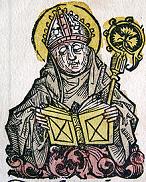
1233 In his bulls of Apr. 13, 20, and 22, in order to combat the Albigenses in France, Pope Gregory IX founds the Monastic Inquisition, and appoints the Dominicans as the official Inquisitors for all dioceses of France; the smoke-choked Burning Times in France begin; James I the Conqueror of Aragon, champion of the Catalan language stinks himself up by inviting the Inquisition into his realm to stop the Albigensian troubadours finding refuge from S France in Aragon and Catalonia from making a vernacular trans. of the Bible - ah, ah, I need some help here? After Henry III declares himself old enough to assume personal rule, the English barons led by Richard Marshal, 3rd Earl of Pembroke (1191-1234) ally with the Welsh in open revolt; meanwhile (St.) Edmund Rich of Abingdon (1175-1240) is appointed archbishop of Canterbury (until Nov. 16, 1240); he is consecrated next Apr. 2. After his father-in-law Theodore Komenos Doukas of Epirus is defeated by the Bulgarians, Stefan Radoslav is overthrown by his younger half-brother Stefan Vladislav I (1198-1265) with help from his father-in-law Ivan Asen II of Bulgaria, and is crowned king of Serbia (until 1242) by his uncle Archbishop St. Sava; he then marries a daughter of Bulgarian Tsar John Asen II, recognizing Bulgarian domination of E Serbia. After he gives privileges to the bishop of Poznan, the Polish nobles rebel against Wladyslaw Odonic, allowing Henry the Bearded to gain part of Bushy, er, Greater Poland. Ferdinand III of Castile and Leon defeats the Moors of Granada under Ibn Hud at the Battle of Jerez. Song emperor (since Sept. 17, 1224) Song Li Zong (1205-64) and the Mongols attack the Manchurians and their Jin Dynasty. The Great Halleluyah penitential movement in Lombardy in N Italy is founded. The 8th cent. Danish Viking seaport city of Kiel on the SE Jutland Peninsula in Schleswig-Holstein across from the Kiel Fjord in N West Germany a few mi. S of the Danish border (modern-day pop. 248K/643K) is refounded as Holstenstadt tom Kyle by Holstein Count Adolf IV, and granted city rights in 1242 by his eldest son John I of Schauenberg; it goes on to be administered by Denmark in 1864, and annexed by Prussia in 1866, becoming part of Germany in 1871 and used as the HQ of their Baltic fleet. Architecture: Piacenza Cathedral (begun 1122) is finished. Deaths: Arab Mosul scholar Ali ibn al-Athir (b. 1160); leaves Al-Kamil fi al-Tarikh (Middle East Chronicle).

1234 Louis IX (b. 1214) declares himself of age and assumes personal rule. The English clergy, headed by the Archbishop of Canterbury threaten Henry III with excommunication unless he dismisses Peter des Roches and his foreign favorites, which he does; Henry III now finally rules England by himself, so that all can now see what a ninny he is without blinders? Count Theobald IV of Champagne (1201-53) becomes king Theobald I of Navarre, the first Frenchman. The Mongols conquer the Jin Dynasty in Manchuria in NE China (founded 1115). The Peace of Middle between Henry III of England and Llywelyn the Great of Wales is only for two years, but gets extended year by year until Lywelyn's death in 1240, ending his military career. Hubert de Burgh is granted a full pardon and restored to his title of earl of Kent along with his estates - I'll be home for Christmas, if only in my dreams? The Second Council of Tarragona in Spain is held to regulate the procedure of the Inquisition (begun 1233) and to ratify the 1229 Council of Toulouse, issuing several canons, incl. #2: "No one may possess the books of the Old and New Testaments, and if anyone possesses them he must turn them over to the local bishop within eight days, so that they may be burned." After Rabbi Solomon ben Abraham of Montpellier in S France gets antsy about all the Roman Catholic attacks on the Albigensian heretics, and doesn't want his congregation to be next, he anathematizes the philosophical works of Jewish brain man Maimonides (1135-1204), excommunicating all Jews who treat the Bible allegorically or even study science or profane lit.; Maimonides' supporters led by David Kimchi (Kimhi) (Qimhi) (1160-1235) (AKA Radak) and Jacob ben Machir ibn Tibbon (1236-1304) (AKA Prophatius) strike back by persuading the Jewish congregations of Beziers, Lunel, and Narbonne in Provence, and Sargossa and Lerida in Spain to excommunicate Solomon and his followers; Solomon counterattacks by denouncing Maimonides to the Dominican Inquisition in Montpellier, causing them to burn all his works there, followed by Paris in 1242, setting a precedent that makes books too hot to handle in Roman Catholic lands; too bad, 40 days later they burn the Talmud in Paris too; knowing that if you can get away with books, why not people, on June 13 Pope Gregory IX pub. the 5-vol. Liber Extra (Decretals of Gregory IX), a collection of 2K decretals which he has sent to the univs. of Bologna and Paris, repeating St. Augustine's belief that "every pagan, Jew, heretic, and schismatic will go to the eternal fire prepared for the Devil and his demons", giving the force of canonical law to the doctrine of perpetual servitude of the Jews until Judgment Day, banning them from direct influence over the political process and the life of Christian states until the 19th cent. rise of liberalism; it contains the oldest surviving detailed Description of a Diabolical (Witches') Sabbath, describing the novice having to kiss an enormous toad, then a cold, pale, thin man, which causes him to forget the Catholic faith, then, after a feast, having to kiss a black cat, then the head devil (or devil's head), and finally participate in an orgy; Pope Boniface VIII adds a 6th book in 1298 (dominica, nica, what?); meanwhile the Jewish war over Maimonides continues, with Maimonides' followers getting Solomon ben Abraham executed for ratting on fellow Jews, and his leading followers' tongues cut out; meanwhile a rabbinical ban on study of science is issued by Rabbi Don Astruc of Lunel (Abba Mari ben Moses ben Joseph) (Yarhi), supported by Rabbi Asher (Asheri) ben Yehiel (Jehiel) (1250-1327) (AKA Rabbenu Asher, Rosh) and Nacmanides (1194-1270) (AKA Ramban), causing his student Rabbi Solomon (Shlomo) ben Abraham ben Aderet (1235-1310) (AKA Rashba) of Barcelona to do ditto in 1305 for teaching any science, or studying it before age 25, except medicine, causing the rabbis of Montpellier to threaten to excommunicate any Jew who stops his son from studying science; the net result is the decline of science study in the Euro Jewish community, and a retreat into mysticism, esp. the Qabala - I got Scrombosis, I'm dead from the neck up? Jewish widow ? is refused her dower on the grounds that her hubby converted to Christianity, voiding their marriage. Architecture: Bishop's Fortress, the first stone fortress is built on Toome (Toomemagi) Hill in Tartu, Estonia. A Cistercian convent is founded in Duissern by a citizen of Duisburg. Deaths: Iraqi Suhrawardiyya Sufi order founder Umar al-Suhrawardi (b. 1144) in Baghdad; the order is carried to India by Baha' al-Din al-Multani. Japanese Yamato emperor #86 (1221-32) Go-Horikawa (b. 1212) on Aug. 31. Japanese Yamato emperor #85 (1221) Chukyo (b. 1218) on June 18. Seljuk ruler (since 1211) Kaikavus (b. ?).
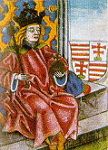


1235 On Sept. 21 king (since May 29, 1205) Andras II (b. 1175) dies, and his son (by 1st wife Gertrude of Meran) Bela IV (1206-70) becomes Arpad king of bankrupt Hungary (until May 3, 1270), attempting to cure the ills caused by his daddy, which causes the pissed-off magnates to set up a rival ruler, Stephen d'Este (the Posthumous) (1236-71), son of Andras II by 3rd wife Beatrice d'Este. After suppressing a revolt led by his son Henry VII and having him imprisoned, super-educated skeptical Italian-born German HRE (since Nov. 22, 1220) Frederick II (1194-1250) ("Stupor Mundi") (Amazement of the World) holds a Diet at Mainz where he promulgates the Laws of the Empire (best issued since Charlemagne?), establishing order in Germany; he goes on to allow surgeons to dissect human bodies at the Salerno school of medicine, and sponsors the trans. of Aristotle into Latin; Dante later calls his Sicilian court the birthplace of Italian poetry. Bulgarian Tsar John Asen II allies with John III, Greek emperor of Nicaea against the Franks, then breaks with Rome, makes his church independent, and gets the Greeks to recognize the patriarch of Tirnovo; the allies then siege Constantinople until it is relieved by a fleet of six ships, 800 archers, and 100 knights led by Geoffrey II of Achaea next year - good try anyway? Batu Khan (-1255), nephew of the Great Khan becomes leader of the 500K-man Mongol army (one-third of the total royal or golden horde) assigned to invade Europe; his chief gen. is Subotai (Subetei) (Subetai) (Subedei) (1176-1240). James I the Conqueror of Aragon conquers Ibiza, completing the conquest of the Balearic Islands (begun 1229). As if they don't have enough problems with the Khwarezmians, Georgia is invaded again by the Mongols, and surrenders without a fight; by 1240 the entire country is under Mongol rule. Alan, ruler of Galloway, who had been used by Alexander II of Scotland to build a kingdom in the Scottish Isles for his bastard son to check the Ui Neill of W Ulster (who had backed his enemies the Mac Williams clan) dies, and Alexander crushes the son then partitions the area between Alan's daughters after marrying them to loyal Anglo-Scottish barons; he then deposes the native heads of the local Cistercian houses in favor of monks from his favorite monastery of Melrose. An unsolved murder causes Jews to be imprisoned in Freiburg im Breisgau in Baden, Germany until Henry VII orders them released; on Apr. 6, 1233 Pope Gregory IX issues the bull Etsi Judaeorum (Even if the Jews), denouncing mob violence against Jews, demanding that Jews in Christian coutnries be treated with the same humanity with which Christians wish to be treated in heathen lands. Bela IV of Hungary founds the town of Kosice (Kassa) (Kaschau) in E Slovakia on the Hernad River 170 mi. NW of Budapest. Guittone d'Arezzo rediscovers the sonnet form of Giacomo da Lentini of Tuscany and founds the Neo-Sicilian School (ends 1294). Births: Tibetan Lamaist Buddhist monk (first Mongol vice-ruler of Tibet) Drogon Cogyai Phagpa (d. 1280) in Ngari, West Tibet; inventor of a script for the Mongolian language. French Aristotelian Averroist philosopher (secular priest) Siger de Brabant (d. 1281); opponent of St. Thomas Aquinas. Chinese painter Qian Xuan (d. 1290); known for his paintings of flowers and insects. Dutch #1 Flemish poet Jacob van Maertant (d. 1295) (1240-1300?) in Franc de Bruges. Italian pope (1294-1303) Boniface VIII (Benedetto Gaetani) (Caetani) (d. 1303) in Anagni, Italy; founder of the U. of Rome. Spanish rabbi (Jewish) Solomon (Shlomo) ben Aderet (d. 1310) (AKA Rashba) in Barcelona; student of Nahmanides and Yonah Gerondi; teache of Yom Tov Asevilli and Bahya ben Asher. Spanish missionary-alchemist Raymond Lully (Lulli) (d. 1315) in Palma, Majorca; pioneer in the European study of Arabic, which he teaches in Miramar from 1275-85. Deaths: Chinese painter Ma Yuan (b. 1155). French Jewish rabbi David Kimchi (b. 1160); leaves Sefer ha Shorashim (Book of Roots), an entymological dictionary of Hebrew, plus commentaries on the Bible, financialy supported by the family of Rabbi Ibn Yahya (1150-1222) in Lisbon, Portugal, that become so popular that they are incl. with the first printed Hebrew Bibles. Hungarian king (1205-35) Andras II (b. 1175) on Oct. 26. English baron Robert Fitzwalter (b. ?).


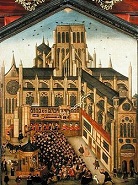
1236 Early in the year Henry III of England marries Eleanor of Provence (1223-91), who brings in her fortune-seeking relatives, their retainers and friends; English public life now has to deal with Savoyards and Provencals as well as Poitouiers, stirring English nat. consciousness. On June 29 (Sts. Peter and Paul Day) St. Paul's Cross (Saint Powles Crosse) in the NE corner of the churchyard of Old St. Paul's Cathedral in London hosts its first gen. assembly of the people (folkmoot) to announce that Henry III wishes London to be well-governed and its liberties guarded; ditto in 1259, with the king and archbishop of Canterbury personally attending while the royal army is holding the city gates. On Sept. 22 the Battle of Saule (Schaulen) is a D for the Livonian Brothers of the Sword by the pagan Samogitians, becoming the first large-scale Christian defeat in the Baltic lands, and inspring the other pagan tribes incl. the Curonians, Semigallians, Selonians, and Oeselians to rebel, ending with 30 years worth of Christian conquests lost; 48-60 knights are KIA, along with master (since 1209) Volkwin (Wolquin) (Folkwin) Schenk; the remants of the order are assimilated into the Teutonic Knights in 1237 under master (since 1230) Herman von Balke (Balke) (-1239). The pissed-off pope sends the Hungarians at the Bulgarians, forcing them to withdraw their expedition against the Latin Empire. King Ferdinand III of Castile sieges and captures Cordoba (Cordova) from the Moors, allowing Granada to reach its zenith as the capital of Muslim Spain; the Christians are so awed by a mosque in Cordoba (built in 1784 by Abd al-Rahman I) that they decide to build a cathedral in the midst of its columns and arches, becoming known as the Cathedral of Our Lady of the Assumption AKA the Mosque-Cathedral of Cordoba. Portugal begins the capture of the Algarve (ends 1249). The Livonian Knights (Sword Brothers), working for the bishop of Riga are defeated and "cut down like women" by the pagan Lithuanians at the Battle of Siauliai. Christian Crusaders invade Jewish settlements in Anjou and Poitou, incl. Bordeaux and Angouleme, and order all Jews to be baptized, trampling 3K who refuse to death under their horses' hooves; Pope Gregory IX condemns the slaughter. Bad to the bone? The Mongols return to Russia and subjugate it over the next four years, sending spies deeper into Europe; Prince Yaroslav of Novgorod takes the advice of Danylo of Halych and moves to Kiev, after which his 4th son (St.) Alexander Nevsky (Nevski) (1220-63) is unexpectedly invited by the people of Novgorod to become their grand prince to defend them from pesky German and Swedish invaders. After tiring of the nomadic life and calling in workers from Persia to China, Mongol khan (1229-41) Ogedei Khan establishes his capital at Karakorum ("black sand") in the Orkhon Valley of C Mongolia (until 1263), building a walled palace and turning it into a busy center of trade by encouraging merchants of all nations to pass through or settle there. HRE Frederick II appoints his tyrannical brother-in-law Ezzelino III da Romano (1194-1259) (podesta of Vicenza since last year) as vicar of Padua (until June 1256), becoming known for his horrible cruelties - shrewish cruelties? Parakramabahu II (-1271) becomes ruler of Ceylon (until 1270), and with help from Pandaya repels an attack by the king of Tambralinga (Ligor) on the Straits of Malacca. HRE Frederick II grants the Jews of Frankfurt special protection, with a royal appointee to run the city govt. An Irish chancery is established separate from the English chancery; it is abolished in 1877. Inventions: The Chinese begin using paper money again; they discontinue it in 1311 C.E. after experiencing printing press inflation. Science: Theodoric of Luca pioneers anesthesia. Births: Persian Muslim Sufi polymath astronomer Qutb (Qotb) al-Din Shirazi (d. 1311) in Kazerun in Oct.; born to a Sufi family; pupil of Nasir al-Din Tusi (d. 1274). Deaths: Indian Christi Order founder Khwaja Moinuddin Chishty (b. 1141). Serbian archbishop St. Sava (b. 1174) on Jan. 14 in Tarnovgrad, Bulgaria (pneumonia); dies after founding a hospice in Jerusalem; buried in St. Forty Martyrs Church, the moved on May 6, 1237 to Mileseva Monastery in S Serbia; in 1595 the Ottomans unearth his remains and burn them on a stake on Vracar Hill in Belgrade; in 1985 the Temple of St. Sava is built on the alleged site, becoming the largest Orthodox temple on Earth. Beirut Christian lord (1204-36) John of Ibelin (b. 1179). English monk Roger of Wendover (b. ?), chonicler of St. Albans Abbey; leaves Flores Historiarum (Flowers of History), an account of English history from Creation to the year 1236, incl. Lady Godiva's tale under the year 1057, and the story of the Wandering Jew. Bavarian minnesinger Neidhardt von Reuenthal.
1237 In July Geoffrey II of Achaea gives the Teutonic Knights a hospital in his capital of Andravida. On Sept. 25 Alexander II of Scotland and Henry III of England sign the Treaty of York, in which Alexander OO renounces his claims to Northumberland and other counties in N England along with all past financial peccadillos in return for £200 worth of land in Cumberland and Northumberland; meanwhile his childless wife Joanna makes a pilgrimage to York to get holy help for her problem with fertility. On Nov. 27 HRE Frederick II tries to subject the Lombard League to autocratic rule and establish himself as the emperor of Rome, winning a military V at the Battle of Cortenuova, causing Pope Gregory IX to ally himself with them, esp. as Frederick II had pub. a treatise protesting against the world empire of the pope. Henry III of England authorizes tithes from English parishes to support the pope's wars against Freddy II, later becoming a sore spot with the followers of John Wycliffe and Henry VIII. The Mongols under Batu Khan sweep over S and C Russia, take Ryazan and Vladimir, then come within 60 mi. of Novgorod, and capture and sack Moscow; grand prince Yuri II of Vladimir barely escapes to Yaroslavl after his wife Agatha and family die in a collapsing church. Blind Theodore Comnenus Ducas and his son John Comnenus Ducas (John Komnenos Doukas) (-1244) are released by the Bulgarians, and return to Thessalonica, inciting a revolt against Theodore's brother Manuel Comnenus Ducas, and John becomes ruler of Thessalonica (until 1239), while Theodore retires to Vodena. Baldwin II comes of age and becomes Latin emperor of Constantinople, and John of Brienne (b. 1170) steps down and dies (before or after?). Having married Princess Blanche of Navarre, daughter of King Theobald I of Navarre the year before, John I "the Red" (1217-86) finally becomes ruling duke of Brittany (until 1286), telling his daddy Peter de Dreux to take a hike. Guelf Della Torre (-1277) (It. "lords of the tower or castle") becomes ruler of Milan, going on to implement the dem. uniform castrato, er, catasto tax; meanwhile his Della Torre family engages in bitter warfare with the rival Visconti (viscounts) family. Olaf II dies, and his son Harald I becomes ruler of the Isle of Man (until ?). The Livonian Knights (German Order of Swordbearers) merge with the Teutonic Knights, but continue to form a separate state. The German Hanseatic League town of Wisby (Visby) on Gothland (Gotland) Island secures trading rights in England, followed by Flanders next year. The town of Colln (Cölln) on former Slav settlements around the Spree River in Germany is founded, becoming the start of modern-day Berlin (modern-day pop. 3.7M/6M). The seaport of Elbing (Elblag) in N Poland 30 mi. ESE of Gdansk is founded. Poetry: Anon., La Mort le Roi Artu (The Death of King Arthur) (4 vols.); basis for Sir Thomas Malory's "Le Morte d'Arthur" (1485). Architecture: York House (Norwich Place) in London, England is begun. Deaths: French Crusader-king John of Brienne (b. 1170). German scientist Jordanus Nemorarius (b. ?). Norse king of the Isle of Man (1229-37) Olaf II in Peel Castle.

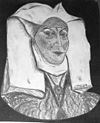

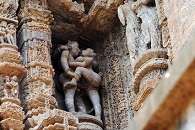
1238 On Mar. 4 Queen Joan of Scotland (b. 1210) dies in Havering-atte-Bower near London, causing relations with the English to go from simmer to the verge of war by 1244 as the struggle for Northumberland started by Alexander II's daddy William I continues; meanwhile Earl John, son of his uncle Earl David dies in 1237, leaving Alexander with no male heir; meanwhile she is buried in the Cistercian nunnery of Tarrant Kaines in Dorset after he fails to have her body brought back to Scotland. On Mar. 4 Yuri II (b. 1189) is KIA in the Battle of the Sit River with the Mongol hordes, who defeat the army of Vladimir-Suzdal; Yuri II's younger brother Yaroslav becomes grand prince Yaroslav II Vsevolodovich (1191-1246) of what's left of Vladimir (until 1246), giving up his throne in what's left of Kiev, and going on to try to restore his ravaged cities. On Mar. 17 Pope Gregory IX writes the encyclical Considerantes Olim, asking HRE Frederick II for support for a Crusade to bolster the threatened kingdom of Latin Romania. In the spring the Mongols under Batu Khan conquer Poland, destroying Lublin and Cracow; they then turn to Hungary, and "the whole country north of the Danube was lost in a day and depopulated in a summer... Of all the cities and fortresses of Hungary three alone survived the Tartar invasion, and the unfortunate Bela [IV] hid his head among the islands of the Adriatic" - Edward Gibbon, Ch. 64; in the winter after the Danube River freezes they siege the Hungarian capital of Esztergom (Strigonium) and massacre the pop.; meanwhile all of Europe trembles with rumors that the Mongol horde is coming; Pope Gregory IX sends a mission of Franciscan and Dominican friars, which is rebuffed; the town of Neustadt in Austria is defended by only 50 knights with 20 crossbows until a German army arrives. On Sept. 28 king (since Sept 12, 1213) James I the Conqueror of Aragon (1208-76) conquers Valencia in Coastal NE Spain from the Moors, and becomes its first Christian king (until July 27, 1276); he builds the first Christian church in Lliria (Llíria) on the site of a mosque, calling it the Church of the Blood, founding Valencian Gothic Architecture - pass the Orange Clean, er, forget it, let's torch all this infidel crap? In Oct. after judge of Gallura (since 1225) Ubaldo II Visconti (Ubaldo of Gallura) dies, Enzo (Enzio) (1218-72), illegitimate son of HRE Frederick II becomes king of half of Sardinia (until 1272), marrying his widow Adelasia of Torres (1207-59) in Oct. Sukhothai, the first free Thai city and the first Thai kingdom is founded. Simon de Montfort marries Eleanor de Montfort (1252-82), widowed youngest sister of Henry III of England; Eleanor is never satisfied with her dowry - no traction control? Al-Kamil dies, and the Ayyub dynasty in Egypt and Syria is without a caliph for two years (until 1240). The pop. of Gothia (Sweden) and Frisia decide not to send their annual ships to the herring fisheries on the English coast for fear of the Tartars, causing the price of herring on the English market to plummet. Architecture: Muhammad ibn al-Ahmar begins the Alhambra in Moorish Granada. Narasimhadeva I (-1264) becomes ruler of the Eastern Ganga Dynasty kingdom based in Puri on the Bay of Bengal, and begins the Black Pagoda (Sun Temple) at the mouth of the Chandrabhaga River in Konark ("Kona" + "Arka" + corner + Sun), Odisha, India (finished in 1264) as a temple to the Sun god Surya in the form of a chariot drawn by seven horses on 12 pairs of cool wheels, containing 60+ porno sculptures. Births: Norwegian king (1263-80) Magnus VI Haakonsson Lagabote (the Law-Mender) (d. 1280) on May 1 in Tonsberg; youngest son of Hakon Hakonsson (1204-63) and Margaret Skuladotter. Thai Lan Na king #1 (1292-1311) Mangrai (Mengrai) (d. 1311) on Oct. 2 in Ngoen Yang (modern-day Chiang Saen). Bulgarian tsar (1246-1257) Michael I/II Asen (d. 1256) (b. 1239?); son of Ivan Asen II and Irene Komnene Doukaina; half-brother of Kaliman I Asen. French count of Champagne-Brie and king of Navarre (1253-70) Theobald II/V (the Young) (d. 1270); eldest son of Theobald I (1201-53) and 3rd wife Margaret of Bourbon; brother of Henry III the Fat (1244-74). Italian physician and alchemist (inventor of sponge anesthesia) Arnold (Arnau) (Arnaldus Villanovanus) of Villanova (d. 1310) in Villanova, Italy/Spain/France. Turkish mystic native language poet Yunus Emre (d. 1320) in Anatolia. Deaths: Polish prince Henry the Bearded (b. 1163). German Jewish mystic scholar Eleazar of Worms (b. 1176) in Worms. Russian grand prince Yuri II (b. 1189) on Mar. 4. Scottish queen consort (1221-38) Joan of England (b. 1210) on Mar. 4 in Havering-atte-Bower (near London), England.
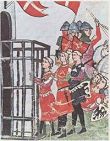

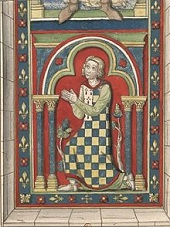
1239 The Tartars (Mongols) lay waste to Serbia, Bosnia, and Bulgaria, then retreat to Russia so that Batu Khan can seriously enjoy the city and palace of Seria; meanwhile Batu's brother Sheibani conquers Siberia with 15K Mongol families, with capital at Tobolsk for the next three cents. On Mar. 12 Pope Gregory IX excommunicates HRE Frederick II for the 4th time, calling him the "self-confessed heretic", the "blasphemous beast of the Apocalypse", etc., and tries to get him deposed; meanwhile Frederick doesn't care, living a life of luxurious licentiousness, gathering Jewish, Christian, and Muslim philosophers to his court, and doing "much to irrigate the Italian mind with Saracenic influences" (H.G. Wells). In May Pope Gregory IX sends his bushy-tailed Inquisitors (fresh from Inquisitor Training School in Hell?) to burn the entire town of Champagne, France, along with all 180 citizens. In May Scottish king Alexander II marries Marie de Coucy (Couci) (1218-85), daughter of a French baron, and works to make a male heir while temporarily designating his cousin Robert de Brus (the Bruce), Lord of Annandale as heir presumptive. At the call of Pope Gregory IX, the Baron's Crusade of 1239 begins (ends 1241), led separately by king (since 1234) Theobald I the Troubadour of Navarre (1201-53) (count of Champagne since 1201) and super-rich earl (since 1225) Richard of Cornwall (1209-72) (2nd son of King John of England), with a side crusade to Constantinople led by Baldwin the Broke of Courtenay (1217-73) (last Latin emperor of Constantinople since 1228), which captures Tzurulum; in Nov. after Duke (1213-21) Peter Mauclerc I of Brittany (1187-1250) leaves on the march from Acre to Ascalon, he and his lt. Raoul de Soissons (1210-70) leave the main force and attack a Muslim cattle drive on the Jordan River en route to Damascus, holing-them up then taking their castle and seizing POWs and booty, pissed-off caravan leader An-Nasir Dawud (1206-61), emir (1229-48) of Kerak attacks Jerusalem, forcing the garrison of the citadel to surrender on Dec. 7, destroying its fortifications, but due to internecine warfare between the Ayyubids withdraws to Kerak in exchange for Crusader help against the Ayyubid sultan of Egypt, allowing the Franks to return and take control of the city incl. the Temple Mount, causing the Christians to hang church bells in Al-Aqsa Mosque and celebrate Mass in the Dome of the Rock, pissing-off the local Muslim pop; meanwhile on Nov. 12 after the main army reaches Jaffa, a group of 400-600 knights breaks ranks and rides off on a night raid, meeting up with an Egyptian army under Rukn al-Din al-Hijawi in Gaza on Nov. 13 and getting soundly defeated before the main force can catch up and turn around to Acre. Deposed Manuel Comnenus Ducas (-1244) returns with help from Nicaea and regains control of Thessalonica, calling himself emperor, pissing-off John III Ducas Vatatzes of Nicaea, who in 1242 invades and forces him to reduce his title to despot and recognize Nicaean suzerainty. After evidence is presented by Karaite Jewish convert to Christianity (Franciscan) Nicholas (Nicolas) Donin, Pope Gregory IX orders the confiscation of all copies of the Talmud, which is generally ignored except in France, causing Jew-hating French Capetian king (1226-70) (St.) Louis IX (1214-70) to call for a public debate first, which is held in 1240. Emperor Baldwin II presents Jesus' alleged Crown of Thorns worn on the cross to Louis IX, who has it stored in Notre Dame Cathedral in Paris; it is briefly removed during the French Rev., and returned in 1806. Births: English 6'7" king (1272-1307) Edward I (Longshanks) (Hammer of the Scots) (d. 1307) on June 17/18 [Gemini] in Westminster Palace, London; son of Henry III (1207-72); husband (1254-90) of Eleanor of Castile (1241-90). Hungarian king (1270-2) Stephen V (d. 1272) in Dec. in Buda; son of Bela IV (1206-70) and Maria Laskarina (daughter of Theodore I Lascaris of Nicaea). Spanish king of Aragon and Valencia (1276-85), count of Barcelona (1276-85), and king of Sicily (1282-5) Peter III (the Great) of Aragon (d. 1285); eldest son of James I of Aragon (1208-76); brother of James II of Majorca (1243-1311). French duke of Brittany and 2nd earl of Richmond (1286-1305) John (Yann) (Jean) II de Dreux (d. 1305); son of John I the Red (1217-86) and Blanche of Navarre; husband (1260-) of Beatrice of England (1242-75) (daughter of Henry III and Eleanor of Provence, and younger sister of Edward I). Thai (Sukhothai) king Ramkhamhaeng the Great (d. 1317); establisher of Theravada Buddhism as Thailand's dominant religion. Deaths: German Teutonic Knights grandmaster #4 (1210-39) Hermann von Salza on Mar. 20 in Salerno, Italy. Japanese Yamato emperor #82 (1183-98) Go-Toba (b. 1180) on Mar. 28. Polish grand duke (1229-34) Wladyslaw Odonic (b. 1190) on June 5.

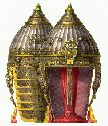
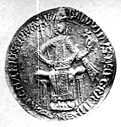

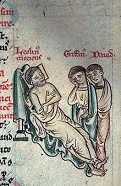


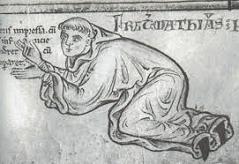
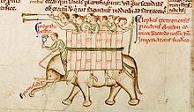
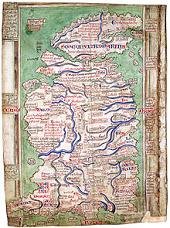
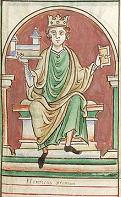

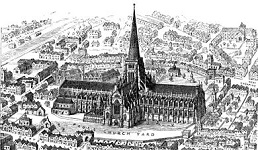
1240 On Apr. 11 Llywelyn the Great (b. 1173) dies after suffering a paralytic stroke in 1237, and by his will his legitimate son (by Princess Joan) Dafydd ap Llywelyn (1212-46) becomes the first to claim the title of prince of Wales (until Feb. 25, 1246), pissing off his older half-brother Gruffydd ap Llywelyn Fawr (11196-44), who vies for the throne, causing Dafydd to hold him in prison (until 1241); meanwhile Henry III accepts his claim to rule Gwynedd, but decides to reclaim his daddy's conquests outside it. On Apr. 15 after coming of age and pawning Christ's alleged Crown of Thorns to a Venetian merchant for 13,134 gold pieces in 1237, Constantinople-born Baldwin of Courtenay returns and becomes Baldwin II (1217-73), the last Latin king of Constantinople (until July 24/25, 1261), spending most of his reign traveling to Italy and France scratching for money. They may all be blonde, but some swing east and some swing west? On July 15 after a Swedish army under Jarl Magnusson (Birger Jarl) (1210-66) lands at the confluence of the Izhora and Neva Rivers at the request of Pope Gregory IX to punish the Eastern Orthodox Russians for helping the Finns avoid conversion to Roman Catholicism, 19-y.-o. grand prince (since 1236) (St.) Alexander Nevsky (Nevski) (1220-63) of Novgorod surprise-attacks and defeats their larger army at the Battle of the Neva River (near modern-day St. Petersburg); Alexander gains the name Nevsky (of the Neva) and Khrabry (valiant); too bad, this makes the boyars jealous and he soon has to leave Novgorod. They may all be swarthy, but some swing north and some swing south? On Dec. 6 after a 2-week siege the Mongols under Golden Horde leader and founder (1227) Batu Khan (1205-55) (grandson of Genghis Khan) capture and raze Kiev, "mother of Russian cities", and slaughter its pop., permitting Muscovite Russia to emerge as dominant while clearing the Mongol path W to Europe; the Kievan Era of Russian history ends - and Russian babies start developing those Mongolian features? On Dec. 26 Siena U. in Siena, Tuscany, Italy is founded. Richard of Cornwall and Simon de Montfort go on a crusade to Jaffa. Al-Malik al-Salih (Al-Malik as-Salih Najm al-Din Ayyub) (1205-49) becomes sultan of the Ayyubid Dynasty in Egypt and Syria (until 1249). The Seljuks of Rum suppress a revolt in C Anatolia led by messianic Dervish prophet Baba Ishak (Babai Ishaq) (-1241), hanging him next year and scattering his followers to the West, where they work to spread his syncretic beliefs. The border between England and Scotland is fixed - och aye? The House of Wittelsbach (founded 1119) acquires the county of Bogen, and along with it the blue-white lozenge flag to add to their Palatinate lions in the Wittelsbach Coat of Arms. Henry III quarrels with Simon de Montfort and his wife Eleanor, causing them to leave for the continent. Polotsk in Belarus becomes a vassal of Lithuania. Roger Bacon returns to England from Paris. The Disputation of Paris in the court of French king St. Louis IX sees Franciscan Karaite Jewish convert Nicholas (Nicolas) Donin, who translated the Talmud and pressed 35 charges against it incl. a passage where Jesus of Nazareth is sent to Hell and boiled in shit for eternity, take on four rabbits, er, rabbis, incl. Yechiel ben Joseph of Paris (-1268), Moses of Coucy, Judah of Melun, and Samuel ben Solomon of Chateau-Thierry, accusing the Talmud of containing blasphemies against Jesus Christ, God, and the Christian religion, and obscenities, and wishing to make them chuck it so they will return to the pure Judaism of the Old Testament and become ripe for Christianity; too bad, Jew-hating Louis IX declares Donin the winner, and after a commission of Christian theologians passes judgment, 24 carriage loads of Jewish mss. incl. 10K-12K Talmuds are publicly burned in Paris in Louis IX's presence on June 17, 1244, with Louis IX uttering the soundbyte that the only way to debate with a Hell-bound Jew is to kill him "with a good thrust in the belly as far as the sword will go" - "once they start burning books it won't be long before they start burning people"? (Henrich Heine) The Carmelites on Mount Carmel (founded 1156) are forced out by the Muslims, settling in Cyprus, Messina, Provence, and England, where they become known as White Friars; in 1245 Pope Innocent IV sanctions a change from hermit to community life as a mendicant order. By this year the intelligentsia of Italy adopt Averroism, the doctrine that Natural Law rules the world without interference by God, that the world is coeternal with God, that there is one immortal soul AKA the active intellect of the cosmos, of which the individual soul is a transitory form, and that heaven and hell are fables invented to cow the people into morality; to fool the Inquisition they profess to believe the Bible and the Christian faith at the same time. Architecture: The Gothic (Old) St. Paul's Cathedral (begun 1087) (the 4th since 604) in London is consecrated; in 1256 an enlargement program begins, and the New Work is consecrated in 1300 but not finished until 1314, making it the 2nd longest church (585 ft.) (178m) in Europe after the Abbey Church of Cluny, with the 3rd highest spire (489 ft.) (149m) after Lincoln Cathedral and St. Mary's Church in Stralsund. Art: Mou Yi (1178-1243), Pounding Cloth; based on the poem "Pounding Cloth" by Xie Huilian (397-433). Nonfiction: Jabir ibn Aflah, Correction of the Almagest (Islah al-Majisti); uses the Giralda Observatory in Seville. Bartholomew of England (1202-72), De Proprietatibus Rerum (On the Properties of Things) (19 vols.) (Magdeburg, Saxonia); a forerunner of the encyclopedia, incl. a dissertation on the brain, recognizing that mental disorders can have a physical or psychological cause, and containing the first mention of Muscat (Lat. "muscus" = "fly", as in so sweet it attracts them) wine; it is trans. into French in 1372, and into English in 1397. Matthew Paris (1200-59), Chronica Majora (1240-53); history of the world from Creation to 1253, based on Roger of Wendover's "Flores Historiarum"; he abridges the years 1067-1253 as Historia Minor (Abbreviatio chronicorum), the years 1070-1253 as Historia Anglorum, and the years 1241-9 as Flores Historiarum; the years 1254-9 are later added. Births: Swedish king (1275-90) Magnus III (d. 1290); father of Birger (1280-1321). Spanish Jewish mystic Qabbalistic scholar-numerologist Abraham ben Samuel Abulafia (d. 1292) in Saragossa; the classic wandering Jew? Italian Florentine painter Giovanni Cimabue (Cenni di Pepo) (d. 1302) (pr. chee-mah-BOO-eh) in Florence. Spanish "Sefer ha-Zohar" Jewish qabbalistic writer rabbi Moses de Leon (Moshe ben Shem-Tov) (d. 1305). French "Roman de la Rose" poet-writer Jean de Meun (Meung) (Jean Clopinel or Chopinel) (d. 1305) in Meung-sur-Loire; educated at the U. of Paris. Italian Palazzo Vecchio architect Arnolfo di Cambio (d. 1310) in Colle Val d'Elsa, Tuscany; asst. of Nicola Pisano. Deaths: Spanish-born Islamic Sufi philosopher Ibn al-'Arabi (b. 1165) in Damascus. Welsh prince Llywelyn the Great (b. 1173) on Apr. 11. English archbishop of Canterbury (1233-40) St. Edmund of Abingdon (b. 1175) on Nov. 16 in Soisy-Bouy, Seine-et-Marne, France; dies at the Augstinian Canons House 50 mi. N of the Cistercian Pontigney Abbey after traveling to Rome in Dec. 1237-Aug. 1238 to argue against the exactions of Henry II, paying one-fifth of his revenue to the pope's agents early in the year, setting out for Rome to argue against an order of 300 new English benefices to be assigned to Romans, getting sick, and doubling back; in 1236 St. Edmund Hall AKA The Hall and Teddy Hall is founded at Oxford U., becoming "the oldest academical society for the education of undergraduates in any university", becoming Oxford U.'s last surviving medieval hall. French poet-scholar Guillaume de Lorris (b. 1200).


1241 In Feb. the Mongols cross the frozen rivers into C Europe then split into two armies, N and S; the 8K-20K-man N one under Kaidu and Baidar invades Poland and sacks Cracow on Mar. 18, then on Apr. 9 defeats a 2K-25K-man German, Polish, and Bohemian army led by Henry the Bearded's son Henry II the Pious (1196-1241), the Polish palatines, and the grandmaster of the Teutonic Order at the Battle of Liegnitz (Legnica) (Wahlstatt) in Legnickie Pole Silesia (SW Poland), after which they fill nine sacks with the right ears of the slain; Henry the Pious is KIA along with most of his knights after the faster Mongol ponies outmaneuver them; the Mongols capture Polish gold miners at the battle and take them back to the Caspian Sea and Siberia; meanwhile the S Mongol army under Batu and Subutai advances through Transylvania, and meets a united European army under Bela IV of Hungary on Apr. 11 at the Battle of the Sajo (Sajó) River (Tisza River) (Mohi) (Muhi) on the Sajo River NE of modern-day Muhi, Hungary, becoming the main battle between the Mongols and the Kingdom of Hungary, with 15K-70K Mongol cavalry defeating 25K-80K Hungarian light cavalry and Knights Templar crossbowmen, with ? Mongols and 10K Hungarians KIA; at first Bela IV drives the Mongols out onto the Plains of Muhi (Mohi) on the Theiss River SW of the Sajo River, but the Mongols win a decisive V, driving Bela to the Adriatic, and occupying the Great Hungarian Plain in modern-day S Transylvania and the Banat and its fabled alfoeld (perfect grazing grounds) for a year, and destroying 15%-25% of its pop.; in Apr. the N and S armies hook up. and finish pacifying all resistance, and the road to France is now open; the Mongols begin pursuing Bela IV - who starts sweating paprika? On Mar. 28 Valdemark II (b. 1170) dies after completing the Code of Jutland (Codex Holmiensis) (the earliest Danish law code), and his son Eric IV Plovpenning (1216-50) becomes king of Denmark (until Aug. 10, 1250), going on to put high taxes on ploughs, causing the peasants of Scania to rebel, gaining him the name "Plovpenning" (plough tax); meanwhile his brothers Abel of Denmark, duke of Schleswig and Christopher I vie for the throne. Which one of you gentlemen will be first into space? On Mar. 31 HRE Frederick II prevents a meeting of bishops in Rome, and on May 3 at the First Battle of Meloria (2nd in 1284) off Livorno he defeats a Genoese fleet with his Stupor Mundi fleet, capturing a number of French, English, and Spanish prelates summoned by Pope Gregory IX, after which he marches his army to Rome and encamps near the city; Louis IX then talks Freddy II into releasing the hostages while sympathizing with his grievances against the pope, and on Aug. 22 Pope (since 1227) Gregory IX conveniently dies, allowing Roman Sen. Matteo Orsino to attempt to force a quick decision from the 10 cardinals in Rome by locking them in the 1K-y.-o. Roman Septizonium Temple until they make a decision; they take so long that Orsini's guards begin going potty through holes in the roof, all the cardinals get sick, and one English cardinal dies in the heat, and is kept in a wooden coffin in the room with them?; after 2 mo. they elect Godfrey of Sabinia, who becomes Pope (#178) Celestine IV (-1241), but he reigns only 16 (17) days, dying on Nov. 10 from the ordeal; since the cardinals refuse to meet again, the Holy See remains vacant for two years (until June 25, 1243) while HRE Frederick II works to fix the election. In the spring after Novgorod is invaded by the Livonian Knights, Alexander Nevsky is invited to return from exile, and gathers an army which drives them out, after which the latter regroup and bring in their heavy guns for a final conflict. In May the first Frankfurt Pogrom (Judenschlacht) (Ger. "Battle of the Jews") over Jewish-Christian marriages and forced baptism of children of mixed marriages kills 180 Jews and a few Christians; 24 Jews avoid death by accepting baptism; the synagogue is plundered and the Torah scrolls destroyed; HRE Frederick II orders an investigation, and in 1246 his son Conrad IV issues a pardon of the citizens of Frankfurt, concluding that the pogrom happened "from carelessness rather than deliberation". On June 24 Bulgarian tsar (since 1218) John Asen II is KIA during the invasion of Batu Khan, and his 7-y.-o. son Kaliman Asen I (1234-46) becomes tsar of Bulgaria (until Sept. 1246) just as the Mongols returning from C Europe decide to use his kingdom as ass-wipe? Europe is saved from the Mongols by the bell? In Dec. the Mongols start to attack Italy, then suddenly pack up and return to Karakorum to participate in the election of a new grand khan after news of the death of Grand Khan (since Sept. 13, 1229) Ogedei (Ughetai) (b. 1186) on Dec. 11 is received; ditto the other Mongols in Hungary and elsewhere. Duke Hugh IV of Burgundy and Richard of Cornwall take Ascalon (Ashkelon) and negotiate a peace with Egypt. Henry III invades Gwynedd and forces Dafydd to give up all his lands outside Gwynedd and surrender his half-brother Gruffydd, whom Henry uses as a poker chip, locking him up in the Tower of London; when Gruffydd's wife Senana pays him 600 marks and hands of her two sons Dafydd Jr. and Rhodri as hostages, Henry reneges and keeps them all as his "guests". Hermann II (b. 1222) dies without reigning (poisoned?), and his brother Henry (Heinrich) Raspe (1204-47) becomes landgrave of Thuringia (until 1247). The Saintonge War (ends 1243) begins in Saintonge in CW France after vassals of Louis IX in Poitou led by Hugh X of Lusignan and Raymond VII of Toulouse and backed by Henry III of England don't acccept the accession of his brother Alphonse of Poitiers as count of Poitou; on July 21-22 the Battle of Taillebourg is a battle for Louis XI and Alphonse of Poitiers, breaking the rebels' backs. Thirteenth-century Virgin Lines without Sir Richard Branson? The German cities of Hamburg and Lubeck form the Hanseatic League (Lat. Hansa = "association") (ends 1669) to protect their Baltic trade routes, with Lubeck (Lübeck), introducing ships equipped with the rudder and bowsprit; members incl. the Viking port of Visby (Wisby) on the island of Gotland (Gothland) (?), Bremen (1249), Riga (1282), Kolberg (Colberg) in Pomerania (1284), Elbing (Elblag) in N Poland (30 mi. ESE of Gdansk) (1358), Amsterdam (1369), Duisburg (1407), and Arnhem on the Rhine River (38 mi. ESE of Utrecht) (1443). Art: The Master of Naumburg begins preparing Gothic sculptures in Meissen, Mainz, and Naumburg (ends 1260). Births: Scottish Canmore king (1249-86) Alexander III (d. 1286) on Sept. 4 in Roxburgh; only son of Alexander II and 2nd wife Mary de Coucy; grandson of William the Lion; husband of Margaret (1240-75). Scottish queen Margaret of England (d. 1275) on Sept. 29 in Windsor Castle; 2nd child of Henry III of England and Eleanor of Provence; wife (1251-) of Alexander III (1240-86); mother of Princess Margaret (1260-83) (wife of Erik II of Norway), Prince Alexander (1263-83), and Prince David (1272-81). Sicilian-German princess Margaret of Sicility (Hohenstaufen) (Germany) (d. 1270) on Dec. 1 in Foggia; faughter of HRE Frederick II and his 3rd wife Isabella of England. Polish king (1279-88) Leszek the Black (d. 1288). English queen consort (1272-90) and countess of Ponthieu (1279-90) Eleanor of Castile (d. 1290) in Castile; daughter of Fernando III (1199-1252) and 2nd wife Countess Jeanne of Ponthieu (1216-79); wife (1254-90) of Edward I (1239-1307) (2nd cousin once removed through Henry II and Eleanor of Aquitaine); bears 16 children. Deaths: Mongol great khan #2 (1229-41) Ogedei (b. 1086) on Dec. 11. Muslim Sufi philosopher Ibn Arabi (b. 1165) on Nov. 10 in Damascus; leaves Wisdom of the Prophets (Fusus al-Hikam), Ringstones of Wisdom (Fursus al-Hikam), The Meccan Openings (Al-Futuhat al-Makkiyya), and The Interpreter of Yearnings (Tarjuman al-Ashwaq). Danish king (1202-41) Valdemar II (b. 1170) on Mar. 28 in Vordingborg. Icelandic poet-historian Snorri Sturluson (b. 1178) on Sept. 23.


1242 On Feb. 10 11-y.-o. emperor (since 1232) Shijo (d. 1231) dies suddenly of an accident, and on Feb. 21 after 11 days of catfighting his 22-y.-o. 2nd cousin Go-Saga (1220-72) becomes Japanese Yamato emperor #88 (until 1246). On Apr. 5 with the pesky Mongols gone and the popeless Roman clergy getting ideas about kicking some heretic Russian Orthodox butt and forcing them to accept the True Faith, the Roman Catholic Church-backed Livonian Knights (Brothers of the Sword) coming from Riga in the SW, led by Magister Hermann (brother of Albert of Buxhoeveden) get a shock at the Battle of Lake Peipus (Battle of the Ice) when Alexander Nevsky's foot soldiers swarm and defeat well-armored knights (a first in Middle Age history, setting the precedent for Russian generals using their troops like cannon fodder against the Germans?), killing only a few before they give up and flee (later inflated into hundreds by Russian chroniclers), checking the E expansion of the hated German Huns and their Roman Catholic priests for the next cent.; portrayed from the Russian side in Sergei Eisenstein's 1938 film Alexander Nevsky. At the Mongol kuraltai it is decided that the grazing grounds of Hungary aren't rich enough, so the Kipchaks (Tartars) under Batu Khan, grandson of Genghis Khan move their herds into the steppes of S Russia on the Lower Volga River, where they form the Khanate of the Golden Horde, with capital at Sarai NW of the Caspian Sea, which acts as suzerain of all Russia for the next two cents., while respecting the Russian Church and leaving the princes in control; a rebellion in Chuvashia is bloodily suppressed by 40K Mongol warriors - nobody doesn't like Sarai? On Dec. 5 Al-Mustansir dies, and Al-Mustasim Billah (1213-58) becomes the last Abbasid caliph of Baghdad (until Feb. 20, 1258) - it musta seemed what? The Mongols invade Anatolia (Turkey) (Asia Minor) (ends 1243). Queen Rusudan of Georgia is forced to accept the sovereignty of the Mongol khan and pay an annual tribute of 50K gold pieces plus support them with the Georgian army. After the Bulgars liberate Theodore Dukas Angelus of Epirus, John III Vatatazes of Nicaea hooks up with him and sieges Thessalonica, but fails due to lack of seapower, although he forces the despot John to give up his title of Emperor of the West and recognize his Nicaean suzerainty over the Latin conquests in Asia Minor. Aquitaine submits to Louis IX. The heir to the earldom of Atholl in Scotland dies under suspicious circumstances, causing the nobles to force Alexander II to take action against his family although they had been high in his favor. John of Ibelin captures Tyre from the Hohenstaufens, and strikes a deal with the king of Jerusalem to become count of Jaffa and Ascalon and lord of Ramla, ending the Ibelin War with pesky HRE Frederick II (begun 1229). For helping him in his struggle with the pope, HRE Frederick II gives Thuringia and the Palatinate of Saxony to Henry III (the Illustrious) of Meissen (1215-88), and betrothes his daughter Margaret of Sicily (b. 1241) to Henry's son Albert III the Degenerate (b. 1240). HRE Frederick II selects Henry Raspe and Wenceslaus I of Bohemia as administrators for his underage son Conrad IV. The Inquisition in Paris burns the works of Jewish brain man Maimonides; 40 days later at the instigation of Jew-hating French king Louis IX, the Paris Inquisition condemns the Jewish Talmud as a vicious attack on the person of Christ, and burns thousands of copies in his presence, with Louis IX uttering the soundbyte that the only way to debate with a Hell-bound Jew is to kill him "with a good thrust in the belly as far as the sword will go"; "Once they start burning books it won't be long before they start burning people." (Henrich Heine) The younger Italian branch of the House of Este (founded in Germany in 951) begins ruling Ferrara, capital of Padua in Italy as vicars of the pope (until 1597). Bela IV of Hungary permits 40K Cuman families driven W by the Mongol invasions to settle in the Theiss (Tisza) region as a bulwark against his rival Stephen d'Este; he also allows the nobles to build castles, which end up being used against him. After the 1st cent. C.E. Roman town of Zagreb (originally Andautonia) in Croatia on the S slope of Mt. Medvednica on the Sava River 230 mi. W of Belgrade (modern-day pop. 802K/1.1M) shelters him from a Tatar atttack, Hungarian King Bela IV bestows it a Golden Bull, making it a free royal city. The Mongol invasion of Poland guts it so bad that large numbers of German settlers are called in, colonizing new areas in Silesia and Posen (Poznan); meanwhile the principalities of Galicia and Volynia in W Russia begin to come under Lithuanian suzerainty, evolving into the Ukrainian and Belorussian peoples. The first English arrive in Drunholm, Ireland and settle with the O'Connors from Munster to help them fight the chieftains of Donegal. The first record of a ship convoy. Deaths: Japanese Yamato emperor #84 (1210-21) Juntoku (b. 1197) on Oct. 7. Japanese Yamato emperor #87 (1232-42) Shijo (b. 1231) on Feb. 10.

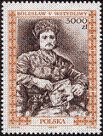
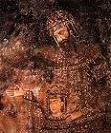

1243 On Apr. 27 the 5-year Treaty of Bordeaux is signed by Henry III of England and Louis IX of France, ending the Saintonge War (begun 1242), preserving the territorial status quo after Louis IX decides not to annex Guyenne, pointing to his desire to go on crusade, becoming the last major English-French conflict until the 1294-1303 Anglo-French War and pissing-off the English barons with Henry III's incompetence in war and tyrannical ways in defiance of the Magna Carta, leading to the Second Barons' War in 1264-7. In May 10K Roman Catholic troops of the seneschal of Carcassone and the archbishop of Narbonne in France surround and siege the impregnable Cathar fortress of Montsegur (Montségur) (W of Rennes-le-Chateau in Languedoc) (until Mar. 16, 1244); since the fabulously wealthy Cathar parfaits (priests) are not permitted to bear arms, the fortress is defended by mercenaries. On June 25 Sinbaldo de' Fieschi, Genoan Count of Lavagna is elected Pope (#179) Innocent IV (-1254); Theodoric Borgognoni of Lucca (1205-98), student of Hugh of Lucca becomes his surgeon, breaking with Galen and his love of pus and cleaning and suturing wounds, soaking bandages with wine to disinfect them, and using opium, hemlock, mandrake, and other anesthetics in surgery, leaving Chirurgia (4 vols.); "For it is not necessary that bloody matter (pus) be generated in wounds - for there can be no error greater than this, and nothing else which impedes nature so much, and prolongs the sickness." On June 26 the Mongols defeat the Seljuk Muslim Sultanate of Rum (founded 1077) at the Battle of Kose Dagh (Kosedag) in NE Anatolia, taking Sivas and Kayseri, then reaching Ancyra (Ankara) and turning them into vassals; John III Vatatzes of Nicaea establishes friendly relations with the Mongols and gains much of their territory in C Anatolia; the sultanate begins to disintegrate, becoming kaput in 1307. The Crusaders led by Richard of Cornwall retake Jerusalem for one year. Boleslaw V the Bashful (Chaste) (1226-79) defeats Conrad of Mazovia and takes the throne of Cracow, which was destroyed in 1241 and is now trying to import German immigrants. Taking advantage of the death of his brother's father-in-law John Asen II, Stefan Uros I (the Great) (1223-77) overthrows his brother Stefan Vladislav I, and becomes king of Serbia (until 1276), allowing his deposed brother to rule Zeta (Zenta) (Montenegro) (around the Zeta River), then marries a daughter of deposed Latin emperor Baldwin II and establishes an alliance with Charles of Anjou, going on to introduce Saxon miners from Hungary to develop the silver mines at Brskovo and Rudnik, with their right to Roman Catholic worship guaranteed, and mints large numbers of Venetian-style coins, increasing trade with the Dalmatian cities of Dubrovnik and Kotor - that's right, just 6.99 for six drumsticks and thighs? The entire Jewish pop. of Klein Belitz, Germany (near Berlin) is burned alive after some are accused of defiling a consecrated host. Mongol chief Batu Khan summons grand prince Yaroslav II of Vladimir to his capital Sarai, and after a lengthy conference Vladimir returns with honors. Births: Spanish king of Majorca (1276-1311) James II (d. 1311) on May 31; 2nd son of James I of Aragon (1208-76); brother of Peter III of Aragon (1239-85). Japanese Yamato emperor #89 (1246-60) Go-Fukakusa (d. 1304) on June 28; 2nd son of Go-Saga (1220-72). English soldier (redhead) ("the Red Earl") Sir Gilbert de Clare, 6th Earl of Hertford, 7th Earl of Gloucester, 3rd Lord of Glamorgan, 9th Lord of Clare (d. 1295) on Sept. 2 in Christchurch, Hampshire; son of Richard de Clare (1222-62) and Maude de Lacy (1222-88); husband (1290-) of Joan of Acre (1272-1307), daughter of Edward I and Leonore of Castile; father of Gilbert de Clare (1291-1314), last of the 1066 Norman Invasion de Clare male line. Deaths: English chief justiciar Hubert de Burgh (b. 1165) on May 12 in Banstead, Surrey.

1244 The French Masada? In Jan. two Cathar parfaits escape the encirclement carrying the fabled Cathar treasure, which is not heard of again (until ?); on Mar. 1 impregnable Montsegur Castle in France on the slopes of the Pyrenees overlooking the Plain of Languedoc is captured after a 10-mo. siege, and the occupants are offered lenient terms incl. departing with their personal property intact if they abjure the Cathar faith, and the 400 defenders request a 2-week truce to consider it, offering hostages as insurance; on Mar. 15 one day after their sacred festival of Bema (which falls on the spring equinox this year) all 215 Cathar parfaits (incl. 20 - 15 mercenaries and six women, who become parfaits at the last minute) refuse to abjure their faith, and are burned in an enormous fire at the Prat des Cramats near the S foot of the castle in a wood-filled stockade, with the rest forced to watch; on Mar. 16 (night) four parfaits concealed by the others escape down the W face of the mountain on ropes, carrying away some other Cathar treasure that was needed for Bema, taking it to the fortified caves of Ornolac in the Ariege, where a band of Cathars is soon killed sans the treasure, which went to Rennes-le-Chateau?; Catharism is driven underground; it later resurfaces as the Waldensians, Hussites, Adamites (Brethren of the Free Spirit), Anabaptists, and Camisards? On Mar. 1 Gruffydd ap Llywelyn Fawr (b. 1200) dies trying to escape from the S side of the White Tower of London, lowering himself by a cloth rope which breaks because he is so fat, causing him to fall 90 ft.; he leaves four sons, Owain, Llywelyn, Dafydd, and Rhodri; meanwhile Dafydd, whose hands are freed enters into an alliance with other Welsh princes to reclaim English possessions in Wales, and scores some Vs. On Mar. 1 the Order of St. Augustine is founded, going on to spread the veneration of the Virgin Mary under the title of Our Lady of Good Counsel (Mater Boni Consilii). On Mar. 26 the Treaty of Almizra between James I the Conqueror of Aragon and his son-in-law Alfonso X of Castile defines their mutual zones of expansion into miserable crumbling Muslim Andalusia, defining the borders of the new Christian Kingdom of Valencia, and reserving all lands S of a line from Biar to Villajoyosa through Busot to Castile. On July 1 Austrian Duke Frederick II the Quarrelsome issues the Charter of the Jews of the Duchy of Austria, granting the Jews freedom from interference and protection from kidnapping of their children. In July Jerusalem is surprise-attacked by Persianized Turkish Sunni Muslim Khwarezmian (Khwarazmian) (Khwarismian) mercenaries (freebooters and unemployed soldiers left over from the 1220 Mongol invasion) in the employ of Egyptian pasha Khwarazmi after he discovered the Christians intriguing against him; the garrison flees to the Tower of David and holds out for nearly six weeks, surrendering on Aug. 23, after which they sack the city, decimate the Christian pop., and drive out the Jews, leaving less than 2K people; Jerusalem remains under Egyptian control until 1517, and under Muslim control until 1917 when British Gen. Allenby captures it. On Oct. 17-18 a major Latin army (allied with local Ayyubid princes) is destroyed by the Egyptians and their allies near Gaza in the Battle of La Forbie; the three Christian military orders have their butts kicked bigtime by the Allah Akbars, and 312 of the 348 Knights Templar are KIA, incl. grandmaster Armand de Perigord (Hermann de Pierre-Grosse) (b. 1178); Louis IX the Saint of France becomes a Knight Templar, gets sick, and swears that if he recovers he will start the Seventh Crusade to stop the Egyptian attacks; he does, so guess what, he does the saintly thing and takes up the Cross; meanwhile the reaction among Christians is to revert to Millennium Fever, taking to the soapbox to whip the masses up to go on YAC (yet another crusade) - maybe Jeezy just doesn't care about the *!?*! place, no matter how much the tourist companies are hurting? On Dec. 5 Margaret of Constantinople (1202-80) inherits Flanders and Hainaut, and designates her eldest son by her 2nd husband William III of Dampierre (1224-51), William of Flanders (-1251) as her heir, launching the War of the Succession of Flanders and Hainault (ends 1246) between him and her other son (half-brother) John I of Avesnes (1218-57). Pope Innocent IV flees Italy for Lyons for the next six years. German Hohenstaufen HRE (1212-50) Frederick II (1194-1250) caps the interest rates that Jewish moneylenders can charge to 173.5%; in England the standard rate is 2 pence per pound per week (43-1/3%), and 15-25% in Italy. John, son of Theodore Dukas Angelus dies, and Demetrius Angelus becomes despot of Thessaly (until 1246). Alexander II of Scotland makes an offer to buy the Hebrides from Hakon IV of Norway, who rejects it, causing Alexander II to begin plotting to bring down the MacDougall clan of Lorn, who are vassals of both kings and whom he suspects of also being in cahoots with Henry III of England. The Seljuk sultanate of Rum (Roum) (founded 1075) becomes a Mongol protectorate (vassal state) after reaching its zenith in the period from 1200, causing it to fragment into a host of Muslim Byzantine-hating Turkoman principalities fed by Muslims fleeing the Mongols. After being expelled from SE of Morocco by the Hilali tribe, the Zenata Berber Marinid (Beni Marin) Dynasty in Morocco is founded (by Abu Yahya ibn Abd al-Haqq (-1258) (ends 1465), taking Fez in 1248 and making it their capital; the Marinid Emblem is two squares rotated at 45 deg. angles. Fujiwara Kujo Yoritsugu (1239-56), son of 4th shogun Yoritsune becomes Kamakura shogun of Japan #5 (until 1252). The French Roman Catholic Diocese of Grasse is formed from the old 4th cent. French diocese of Antibes (until 1801) - ass is grasse jokes here? Thomas Aquinas (b. 1225) joins the Dominican Order before graduating from the U. of Naples, causing his parents to have two of his brothers kidnap and lock him up in the family castle of Roccasecca for almost two years in a vain attempt to make him resign, finally releasing him in 1245 after putting a pretty young woman in his chamber and he uses a flaming brand from the hearth to chase her out then burns the sign of the cross into the door, allowing him to go to Paris to serve his novitiate - intellectual scholars employ techniques unknown to the Yahoos in the real world? The first Dunmow Flitch competition is held in England, where a flitch or side of bacon is awarded to married couples who satisfy a judge and jury of six maidens and six bachelors that "in twelvemonth and a day" they have "not wished themselves unmarried again". A water tax is imposed in Dublin, Ireland by gov. Maurice Fitzgerald. In Paris two dozen cartloads of the Jewish Talmud are publicly burned. Births: French king of Navarre, and count of Campagne and Brie (1270-4) Henry I the Fat (d. 1274); AKA Count Henry III of Champagne and Brie; youngest son of Theobald I of Navarre (1201-52) and Margaret of Bourbon; husband (1269-) of Blanche of Artois (1248-1302) (niece of Louis IX); father of Theobald (-1273) and Jeanne I of Navarre (1271-1305). French last Knights Templar grandmaster (1297-1314) Jacques de Molay (d. 1314) in Burgundy; enters the Order of Templars in 1265. German Strasbourg Cathedral architect Erwin von Steinbach (d. 1318) in Steinbach (near Baden-Baden).
1245 On Jan. 11 after he fails to advance the war against the Muslims in S Spain et al., Pope Innocent IV pronounces addlepated Sancho II of Portugal rex inutilis (an incompetent king), and Afonso III takes over as regent. On Apr. 16 (Easter Sun.) fat Italian Franciscan monk John of Pian de Carpini (Giovanni da Piano Carpini) (1185-1252) and friar Stephen of Bohemia (who is is left behind at Kaniv near Kiev, and replaced by interpreter Wroclaw Franciscan monk Benedykt Polak) are sent by Pope Innocent IV on a 15-mo. journey from Lyon across the Nepere, Don, and Volga Rivers (first Westerner to bring the names to the West) to the camp of Batu Khan, after which on Apr. 8, 1246 (Easter Sun.) they take off on a 3K mi., 106-day journey across the Ural, Aral, and Jaxartes Rivers to the Mongol imperial court in Sira Orda (Yellow Pavilion) near Karakorum, almost starving because they don't eat meat and the nomads eat nothing else, settling for millet and melted snow, witnessing the election of Ogedei's eldest son Guyuk on Aug. 24, who refuses their invitation to become Christian and demands that all the rulers of Europe incl. the pope swear allegiance to him as the Scourge of God, giving them a letter for the pope; on June 10, 1247 they reach Kiev, crossing the Rhine River at Cologne before reaching the pope at Lyon; John is promoted to archbishop of Serbia, writing Ystoria Mongalorum, an account of his journey that becomes the first Euro history of the Mongols and a classic of geography. On June 24 the dispute between Pope Innocent IV and HRE Frederick II reaches a head when the pope calls the First Ecumenical Council of Lyons (Lyon); on July 17 the emperor is deposed, and the pope proclaims that no Hohenstaufen will ever again be emperor, Holy Roman or otherwise, causing Henry Raspe to switch sides to the pope; the Church takeover of the state that started with Constantine I the Great is now complete, with the bride of the church-state marriage becoming the head of the house and making and unmaking monarchs at her pleasure? After Pope Innocent IV excommunicates HRE Frederick II, the men of Schwyz burn the new Hapsburg Castle of New Habsburg (Neuhabsburg), which had been set up by the Habsburg family (from the Aar valley) to awe them (its ruins remain to modern times?); the peasant farmers of the Uri, Schwyz, and Unterwalden valleys around Lake Lucerene begin to form an independent Swiss Confederation. Alexander Nevsky defeats the Lithuanians, and now that there's a sword at their necks they begin to see the Christian light and take that *!*?! bath? A Muslim revolt begins in Valencia (ends 1258). Georgian queen (since 1223) Rusudan (b. 1194) dies, and her son David VI Narin (Junior) (the Clever) (1225-93) becomes king of Georgia (until 1259); too bad, mommy had sent him to the Mongol court to get official recognition as heir apparent, and when she dies the nobles believe he's dead, so they proclaim his cousin David VII Ulu (Senior) (1215-70) (whom she kept as a prisoner at the court of her son-in-law sultan Kaykhrusaw II) as king, and when D6 returns they rule jointly until 1259, when D6 tries to revolt from the Mongol yoke and ends up fleeing to Kutaisi, setting up his own Kingdom of Imereti in W Georgia, while D7 rules E Georgia from Tbilisi. Maurice Fitzgerald, lord chief justice of Ireland builds Sligo (Gael. "Sligeach" = abounding in shells) Castle on the coast in Connacht, NW Ireland, which grows into the city of Sligo (modern-day pop. 20K), becoming the only Norman-founded Irish town under almost continuous control in the Medieval period. Budweis in S Bavaria is founded by Ottokar II, launching its famous breweries. In 1245-85 French trouvere Rutebeuf (Rustebuef) ("rude boeuf" = coarse ox, "rude oeuvre" = rustic piece of work) flourishes in Paris. Architecture: Lavish but perpetually financially-strapped Henry III orders Westminster Abbey rebuilt in the French Gothic style; the choir and cloisters are begun (ends 1270); at the same time the great council begins making protests to Pope Innocent IV over his taxation of English clergy for his temporal ambitions, causing the king to vacillate in support and finally whimp-out at angering him? Nonfiction: The Laxdaela Saga is written in Icelandic, probably by a woman. Births: English prince Edmund Crouchback, 1st Earl of Lancaster (d. 1296) on Jan. 16 in London; 2nd son of Henry III and Eleanor of Provence; younger brother of Edward I. French Capetian king (1270-85) Philip III (the Bold) (d. 1285) on Apr. 30 in Poissy; son of Louis IX (1214-70) and Margaret of Provence (1221-95); nephew of Charles I of Naples; father (through 1st wife Isabella of Aragon) of Philip IV (1268-1314), Charles of Valois (1270-1325), Louis of Evreux (1276-1319) and Blanche of Austria (1278-1305); father (through his 2nd wife Mary of Brabant) of Marguerite (Margaret) (1282-1317), wife of Edward I of England. Savoy count (1253-63) Boniface (d. 1263) in Chambery. French "Jeu de Robin et Marion" poet-trouvere-musician Adam de la Halle, Le Bossu d'Arras (the Hunchback of Arras) (d. 1288) in Arras?; founder of French secular theater. French trouvere Rutebeuf (Rustebuef) (d. 1285) in Champagne. English archishop of Canterbury (1294-1313) Robert Winchelsey (Winchelsea) (d. 1313); educated at Oxford U., and U. of Paris. Nestorian Christian patriarch (1281-1317) Mar Yaballaha III (Marcos) (Markos) (d. 1317) near Beijing; of Uyghur descent. Italian sculptor Giovanni Pisano (d. 1320) (1250-1315?) in Pisa; son of Nicola Pisano (1220-78). Deaths: Italian cardinal Giovanni Colonna (b. 1170) on Jan. 28. Indian poet Jayadeva (b. 1170). English philosopher-theologian Alexander of Hales (b. 1175). Georgian queen (1223-45) Rusudan (b. 1194). Welsh prince Dafydd ap Llywelyn (b. 1208) on Feb. 25.


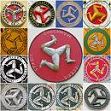
1246 On Feb. 25 after Henry III invades Gwynedd and builds a castle in Deganwy, Dafydd ap Llywelyn (b. 1208) dies in the midst of fighting without an heir, and his half-brother Gruffudd's sons Llywelyn the Last ap Gruffydd (1223-82) and Owain Goch the Red ap Gruffydd (-1282) split Wales W of the Conwy River, while Henry III hangs onto the rest, continuing the war (until 1247). On May 6 prince (since 1229) Geoffrey II of Villehardouin (b. 1195) dies, and William of Villehardouin becomes William II (-1278), prince #4 (last) of Achaea (until May 1, 1278). On May 22 after Pope Innocent IV sends a legate to Germany to bring about his election, Henry Raspe is elected anti-king in opposition to Conrad IV (until 1247), becoming known as "the pope's king" (Pfaffenkonig). On June 15 after Austrian duke (since 1230) Frederick II the Quarrelsome (b. 1201), last of the Baabaablacksheep Babenbergs takes advantage of the Mongol invasion to enlarge the vacant dukedom of Styria by seizing the W comitatiof Moson, Sopron, and Vasvar from Hungary, Bela IV of Hungary arrives and kicks his quarrelsome butt at the Battle of the Leitha River (between Ebenfurth and Neufeld?), and he dies childless, ending the House of Babenberg along with Austrian claims to the W counties of Hungary. In Aug. Henry Raspe (b. 1204) defeats Conrad IV in the Battle of Nidda in S Hesse, then dies in the winter in Wartburg Castle near Eisenach in Thuringia. On Sept. 30 grand prince (since 1238) Yaroslav II (b. 1191) dies 1 week after being summoned to Karakorum by Guyuk Khan and getting poisoned by his wife, and his big hero son Alexander Nevsky (1220-63) becomes grand prince of Vladimir (until 1263). John III Vatatzes of Nicaea goes on a 2nd expedition (1242) to the Balkans, and conquers N Macedonia, then finally takes Thessalonica and deposes despot Demetrius Angelus of Thessaly. Sancho II of Portugal is overthrown by his brother Afonso III. Louis IX of France intervenes to settle their succession dispute, and grants Hainaut to John and Flanders to William; too bad, Margaret refused to hand Hainaut over to John, and their feud continues underground. Kaliman I dies, and John Asen II's pre-teen son Michael Asen I/II (1238-56) becomes tsar of Bulgaria (until 1256). Geoffroy II (b. 1195) dies, and his brother William (Guillaume) II of Villehardouin (-1278) becomes the last Latin prince of well-governed Achaea, going on to conquer the rest of the Peloponnese (Morea) and build the Fortress of Mistras (Mystras) (Myzithras) near ancient Sparta. Louis IX intervenes in the War of the Flemish Succession, granting Flanders to Margaret II of Flanders' son William III of Dampiere, and Hainault to John I of Avenes (1218-47), her illegitimate eldest son, but his mother refuses to hand it over. The barons of England, incl. Richard de Clare, 6th earl of Hertford send a letter to Pope Innocent IV complaining of the exactions of the Roman Curia. Emperor (since 1242) Go-Saga resigns, and his 4-y.-o. son Go-Fukakusa (1243-1304) becomes Japanese Yamato emperor #89 (until 1259). The Council of Beziers forbids employment of Jewish physicians by Christians. The Spanish island of Mallorca is occupied by the Arabs - we are so bad? The Khwarazmi soldiers holding Jerusalem are defeated and scattered by Ayyubid forces. Arles, former capital of the kingdom of Burgundy (Arles) is incorporated in the county of Provence, which splits off and passes to the house of Anjou (until 1481). The Three Armored Legs of Man with Golden Spurs triskelion symbol on a red background begins appearing on charter seals of the Isle of Man, which is equidistant from Scotland, England, Wales, and Ireland, becoming the official flag of the Isle of Man in 1931 - that 3rd leg couldn't be what I think it is? Architecture: The Dominican Church of Santa Maria Novella (St. Mary the New) in Florence is begun (finished 1360). Births: Italian Augustinian monk ("Patron of Holy Souls") (vegetarian) (St.) Nicholas of Tolentino (d. 1305) (b. 1248?) in Pontano, Ancona; feast day: Sept. 10; inventor of St. Nicholas Bread. Italian Roman Catholic Franciscan missionary (in China) John of Montecorvino (d. 1328) in Montecorvino; first Roman Catholic missionary to China. Deaths: Spanish queen of Castile and Toledo (1217) Berengaria of Castile (b. 1179) on Nov. 8 in Las Huelgas (near Burgos). English queen consort Isabella of Angouleme (b. 1187) on May 31 in Fontrevault. Russian grand prince Yaroslav II (b. 1191) on Sept. 30. French queen of Cyprus (1210-8) Alice of Champagne (b. 1193). French prince #2 of Achaea (1229-46) Geoffrey II of Villehardouin (b. 1229) in May. Welsh prince Dafydd ap Llywelyn (b. 1212) on Feb. 25 in Abergwyngregyn. Austrian duke (1230-46) Frederick II the Quarrelsome (b. 1211) on June 15 (KIA in the Battle of the Leitha River).
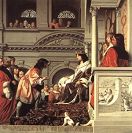

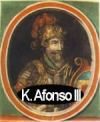

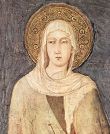

1247 On Feb. 16 Henry Raspe (b. 1204) dies, and the papal party elects Count William II of Holland (1228-56) as HRE in competition with Frederick II (until 1256); Henry III the Illustrious of Meissen begins a war (until 1263) over Thuringia with his cousin Sophie of Thuringia (1224-75), daughter of Raspe's brother Ludwig IV (1200-27) and Elizabeth of Hungary (1207-31), and 2nd wife of Duke Henry II of Brabant (1207-48), who wants it for her son Henry. In Apr. Llywelyn and Owain meet Henry III at Woodstock and sign a peace after giving up much territory in Gwynedd. On Dec. 4 king (since Mar. 26, 1223) Sancho II the Pious (b. 1209) dies, and on Jan. 4, 1248 after renouncing his rights to the county of Bologne, his brother Afonso III (the Boulonnais) (1210-79) becomes king #5 of Portugal (until Feb. 16, 1279), becoming the first to use the title of king of Portugal and the Algarve in 1249. The Bohemian nobility rises against King Wenceslas I after being pissed-off by his favoritism of Germans (until 1250). The Egyptians under sultan Ayub capture Ascalon and Tiberias from the Knights Hospitaller, leaving Jaffa as the main Crusader base on the coast. The Muslim rebels in Valencia retreat into the the territory controlled by the mudejar (tamed) lord Azraq (who holds eight castles in the Alcala Valley), and continue a successful guerrilla war. The Mongols conquer Korea. Lesser Armenian (Cilicia) Frankish Christian king (since 1226) Hetum (Hethum) I (1213-70) submits his kingdom to the Mongols, becoming a vassal state, uniting against their common enemy the Mamluks. Carcassonne in S France is joined to the French crown. Henry V the Blond (the Great) (1216-81) becomes count of Luxembourg (until 1281). Duchess Sophia (d. 1263), niece of Henry Raspe of Thuringia establishes Hesse in SW Germany as a separate landgraviate. The half-brothers of Henry III visit England, proving very unpopular. Pope Innocent IV issues an epistle repudiating the legend of ritual murders of Christian children by Jews, and calling for Jewish persecution to end, with the soundbyte "Jews, though living under Christian princes, are in worse plight than were their ancestors under the Pharaohs"; too bad, he is widely ignored. Architecture: Bethlehem Royal Hospital in Bishopsgate outside the wall of London is founded as the priory of the new Order of St. Mary of Bethlem by Goffredo de Prefetti of Italy, bishop-elect of Bethlehem to collect alms for the Crusades; it begins to be called a hospital in 1330, and by 1377 (1403?) after the English govt. secularizes it, it begins admitting the insane; by the 14th cent. it becomes known as Bedlam; in 1547 it is acquired by the City of London, operating until 1948; it is now part of the British NHS Foundation Trust. Nonfiction: St. Clare of Assisi (1194-1253) begins work on her autobio. Testament. Qin Jiushao, Shushu Jiuzhang; contains the phrase "in all old books we find empty places", referring to the zero. Births: Persian Ilkhanid chief minister and physician (Jewish convert to Islam) Rashid al-Din Tabib (Fadhlullah Hamadani) (d. 1318) in Hamadan - good for his health? Dutch count of Hainaut (1280-1304), Holland (1299-1304), and Zeeland John II of Avesnes (d. 1304); eldest son of John I of Avesnes (1218-57) and Adelaide of Holland. Deaths: German landgrave of Thuringia (1241-7) Henry Raspe (b. 1204) on Feb. 16 in Wartburg Castle, Eisenach, Thuringia. English Lord Locksley AKA Robin Hood on Dec. 24 (?).

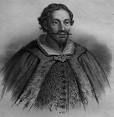
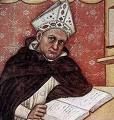

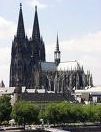


1248
The Seventh (7th) Crusade
(ends 1254) is led by Louis IX of France, with the aim of freeing Palestine via the capture of Egypt; after putting his mother Blanche of Castile back in charge of France as regent (until 1252),
he winters in Cyprus to make preparations to invade Egypt.
On Feb. 18 the Lombards defeat HRE Frederick II at the Battle of Parma.
After a 16-mo. siege King (1217-52) (St.) Ferdinand III of Castile (1199-1252)
captures Seville from the Moors, leaving only Granada left in their hands, where the Nasrid Dynasty (founded 1238) rules until 1492;
the Moors use cannon, becoming the first use of gunpowder in Europe?
The Genoese take Rhodes.
Birger Magnusson (1210-66)
becomes jarl (earl) (PM) (2nd in command to the king) of Sweden (until 1266), going on to put his son Valdemar on the throne in 1250, found Stockholm in 1255, abolish serfdom,
and establish the rule of law in a country preoccupied with taming Nature, while far-off Iceland becomes the Scandinavian lit. center.
A Christian Nestorian metropolitan is appointed in Khanbalik (Peking).
A papal bull by Pope Innocent IV excoriates Ghibelline leader Ezzelino III da Romano (1194-1259)
for maiming and torturing hundreds (thousands?) of innocent people, his favorite activity being to cut out their giblets, er, genitals and try to fill a pit with them.
Architecture:
On Apr. 26 the Gothic style La Sainte-Chappele
in Palais de la Cite, Paris (begun 1239) is consecrated to house Louis IX's Passion relics incl. Christ's Crown of Thorns, becoming the residence of the French kings until the 14th cent.,
becoming known for its stained glass collection.
The Hague (Dutch "count's hedge") ('s Gravenhage) in the Netherlands is built.
The relics of the Three Magi of the Jesus story are brought to Cologne, causing the Gothic Cologne Cathedral
(with two broad towers and lacy stonework) to be built to house them (finished 1880), becoming the largest Gothic church in N Europe; Thomas Aquinas follows his Paris teacher, scholastic philosopher
Albertus Magnus (1193-1280) to Cologne; after his fellow Dominican novices call Aquinas a "dumb ox" for being pudgy and taciturn,
Magnus replies "This ox will one day fill the world with his bellowing."
Granada might be all the Muslims have left in Spain, but that doesn't stop them from beginning construction
of the beautiful 2,500 ft. x 675 ft. Alhambra (finished 1354) on a hill, surrounded by a 1-mi. circumference red brick wall with 13 square brick towers,
containing the Court of the Lions and the
Hall of the Two Sisters.
Nonfiction:
Brunetto Latini (1220-94), Tresor; discusses the "Mariniere" compasses used on Norman ships, a wooden tub
with a cork, magnetized needle and goose quill covered with a birdskin with a fleur-de-lis design, which becomes a std. feature for compass north points.
Births:
French duke of Burgundy (1271-1306) Robert II
(d. 1306); 3rd son of Hugh IV (1213-71) and Yolande of Dreux (1212-48) (daughter of Count Robert III Gasteble of Dreux and
Aenor of Saint-Valery); father of Hugh V (1282-1315), Blanche of Savoy (1288-1348), Queen Marguerite (1290-1315) (wife of Louis X),
Queen Jeanne (1290-1348) (wife of Philip VI), Eudes IV (1295-1350), Louis of Thessalonica (1297-1316), Mary of Bar (1298-1336).
Deaths:
Spanish poet Gonzalo de Berceo (b. 1180); leaves 13K religious verses.
Arab scientist Ibn Baitar (b. 1190); leaves Compendium on Botany and Pharmacology,
listing 1.4K plants, foods, and drugs, incl. 300 new ones, becoming the std. botanical authority in Europe until the 16th cent.
Portuguese king #4 (1223-47) Sancho II the Pious (b. 1209) on Jan. 4 in Toledo, Spain (exile).
1249 - The Tiny Robe Walk Like An Egyptian Mamluk Year? Egypt gets its second Cleopatra, Scotland gets its last independent king for a long time, and the Ho Ho Hohenstaufen king is
canned like a sardine?



1249 Walk like an Egyptian, way-oh-way-oh? Early in the year William II of Achaea captures the fortress of Monemvasia (Malvasia) in the Peloponnesus with the help of his Euboean vassals, then hooks up his 400 knights and 28 ships with Louis IX of France and his poorly organized Seventh Crusaders in Cyprus; in early June they land in Egypt, capture Damietta on June 4-6 (without a blow?), then wait for the Nile to subside before heading for Cairo; on Nov. 23 Sultan (since 1240) As-Salih Ayub (Al-Malik as-Salih Najm al-Din Ayyub) (1205-49), last Ayyubid ruler of Egypt dies in battle in Mansourah fighting the Crusaders, and his widow (a former Turkish Mamluk slave) Shajar (Shagrat) al-Durr (-1257) ("Tree of Pearls") conceals his death to rule in his name starting next year, becoming the first female ruler of Egypt since Cleopatra next May 2 (until Apr. 28, 1257); to save face, the Muslim leaders of Cairo make her marry former slave Aybak (-1257) and pretend that he's the ruler; the Kipchak Turkic Mamluks (Mamelukes) (Arab. "possessed", "owned") (white slave Turks and Mongols who earned the right to own weapons and are used as guards by the kaput Ayyubid sultans) go on to rule Egypt until 1517. On May 26 the Battle of Fossalta, between Guelph Bologna and Ghibelline Modena and Cremona sees Sardinian king Enzio (Enzo) (1220-72), illegitimate son of Hohenstaufen HRE Frederick II captured, after which he is kept POW in Enzio Palace (named after him later) for life; after the murder of Conradin 1268, he becomes the last heir of the Hohenstaufens, causing attempts to rescue him to get more desperate, but, ho ho ho, all in vain, although he does use the time to write some good poems? In summer Scottish king (since Dec. 4, 1214) Alexander II (b. 1198) leads a naval expedition to the Inner Hebrides and anchors off Kerrera Island in Oban Bay in July, preparing to attack the pesky MacDougall clan; too bad, on July 6 the wannabe Scottish Alexander the Great dies suddenly in his tent on Kerrera (which his enemies claim is due to the intervention of St. Columba), and (male primogeniture no longer a problem?) on July 13 his 8-y.-o. son (by 2nd wife Mary de Coucy) Alexander III (1241-86) is crowned Canmore king of Scotland at Scone (until Mar. 19, 1286); a list of possibly real possibly legendary kings of Scotland is recited at the inaguration, which is used by future claimants to the throne; a catfight immediately begins between Alan Durward (Doorward) (Ailean Dorsair), Count of Atholl (-1275), justiciar of Scotia (husband of Alexander III's bastard sister Margaret) and Walter Comyn, Lord of Badenoch, Earl of Monteith (-1258) (son of former justiciar of Scotia William Comyn), the latter preventing the king from being knighted before coronation by the former because that would give him a claim to be regent; a delegation sent to Rome to secure the rights of coronation and unction is rebuffed. On Aug. 15 the First Battle of Athenry (Ath na Riogh) (2nd in 1316) sees an army of Gaels from Connacht attack the new (1241) Norman urban walled settlement of Athenry in hostile territory, only to be repelled by the Normans under Connacht sheriff Jordan de Exeter (d'Exeter). On Sept. 27 count (since 1222) Raymond VII dies, and is succeeded by Alfonso (Alphonse) III (1220-71), who becomes the last count of Poitou and Toulouse (until Aug. 21, 1271). Pope Innocent IV preaches a Crusade against Crusade-ditching HRE Frederick II, who holds onto power, disses the papacy openly, and pub. a famous Letter by Frederick II Contra the Catholic Clergy, circulated throughout Europe, denouncing the pride and irreligion of the clergy, and ascribing all the corruptions of the times to their greed; he even proposes to his fellow princes that they confiscate church property for the church's own good, making him one of the few emperors that modern secularists would like to claim, "the first of the moderns" (H.G. Wells) - I want to know more? The Muslims are driven out of Malta. Portuguese king Afonso II drives the Moors out of Portugal after conquering the Algarve (al-Garb) ("the west") (S tip) from the Moors, who held it since 712. The Muslim rebels in Valencia crush a major Christian offensive under King James, and almost capture him. Abu Zakariya dies, and Muhammad I al-Mustansir (1228-77) succeeds him as ruler #2 of the Hafsid Dynasty in Ifriqiya (Tunisia), becoming the first to claim the title of caliph. Wenceslas II grants to Lord Ulrich of Hradec (German Neuhaus), Bohemia the right to take eight Jewish families within his city walls - wrong year? Heinrich I of Liechtenstein obtains Nikolsburg (modern-day Mikulov) in S Moravia. Even the thirteenth century had its missile gap? Roger Bacon argues for a scientific curriculum at Oxford U., causing Univ. College to be founded by a bequest of 310 marks in the will of archdeacon William of Durham (-1249) (who dies in Rouen, Normandy), becoming the earliest college at Oxford established by private benefaction; it starts out with four fellows who are only allowed to study theology, and doesn't accept undergrads until the 16th cent. - everything from ice to steam to Japanese massage? Births: Japanese Yamato emperor #90 (1259-74) Kameyama (Tsunehito) (d. 1305) on July 9; 7th son of Go-Saga (1220-72). Savoy count (1285-1323) Amadeus V (the Great) (d. 1323) on Sept. 4 in Le Bourget-du-Lac; son of Thomas II and Beatrice Fieschi; younger brother of Thomas III of Piedmont (-1282); paternal nephew of Count Philip I; husband (1272-) of Sybille of Bage. Italian nurse (St.) Alda (Aldobrandesca) (d. 1309) in Siena; feast day: Apr. 26. Scottish "Toom Tabard" (Empty Cloak) king (1292-6) John de Balliol (Baliol) (John I Baliol) (d. 1313) in Barnard Castle, Durham County, England; 3rd son of John, 5th baron de Balliol (-1269) (founder of Balliol College, Oxford) and his wife Devorguilla (Devorgilla) (-1290), daughter of Lord Alan of Galloway and Margaret, eldest daughter of earl David of Huntington, younger brother of William I of Scotland; starts out training to be a cleric until his older brothers die, leaving him his father's vast estates, incl. over 30 knights' fiefs in England by 1278, then his mother's lordship of Galloway in SW Scotland (centered on Buittle Castle and Sweetheart Abbey) in 1290; brother of Eleanor, wife of John Comyn of Badenoch; husband (1283) of Isabel de Warenne; father of Edward Balliol (1284-1364) and Henry Balliol (-1332). Chinese "Jade Mirror of the Four Unknowns" Yuan Dynasty mathematician Chu Shih-Chieh (Zhu Shijie) (Hanqinq) (Songting) (d. 1314) near Beijing. Dutch count of Nevers (1273–1322) and count of Flanders (1305–1322) ("the Lion of Flanders") Robert III of Flanders (Bethune) (d. 1322); eldest son of Guy of Dampierre (1226-1305) and Mathilda of Bethune (-1263); son-in-law of Charles I of Sicily (1265–1268). Deaths: French count of toulouse (1222-49) Raymond VII of Saint-Gailles (b. 1197) on Sept. 27. Scottish king (1214-49) Alexander II (b. 1198) on July 6 in Kerrera Island, Inner Hebrides; buried at Melrose. Kurdish Ayyubid ruler of Egypt (1240-9) As-Salih Ayyub (b. 1205) on Nov. 22.












1250 Video killed the radio star? Millennium Fever is raging in the Franciscan Order among the followers of super-popular Joachim of Fiore (Joachim of Flora) (Gioacchino da Fiore) (1135-1202), who predicted this year to be the dawn of the Age of the Holy Spirit; when it doesn't happen, they reset it to the year 1260 and keep asking for donations? About this time the Medieval Climate Optimum (begun 950) along with the optimal climate conditions in Europe since 1000 end, and the Little Ice Age (begins 1350?) (ends 1850) begins as Atlantic ice pack begins growing, bringing poor harvests, famine, and disease, and changing the sociopolitical landscape with a pop. reduction, uprooted vagabond farmers, and a blind rage against the rich and Jews; Europe begins to be rapidly deforested, leading to a shortage of wood for heating and cooking by 1500, along with a decline of wild game and a food shortage; luckily, in the 16th cent. potatoes and corn (maize) are brought in from the New World, and soft coal begins to be used as fuel. On Feb. 2 Eric XI the Lame (b. 1216) dies, and his son-in-law (son of Birger Jarl Magnusson and Ingeborg Eriksdotter) Valdemar I Birgersson (1239-1302) becomes king of Sweden (until 1275), founding the Folkung (Bjelbo) Dynasty (ends 1365); Swedish PM (since 1248) Birger Jarl, who was campaigning in Finland soon returns and regains his grip until his death in 1266. Black Egyptian Muslims kick white Christian butt in the days of hand-to-hand? In Feb. a Coptic Christian helps the Seventh Crusaders led by French king (1226-70) Louis IX find a ford across the Nile River, and on Feb. 8-11 they defeat the Egyptians under Al-Zahir al-Malik Baybars (Baibars) (Arab. "panther") (1223-77) at the Battle of Al Mansura (Mansurah) on the Nile River (30 mi. SW of Damietta) (founded about 1200), but on Apr. 6 they are totally defeated by Egyptian forces under new caliph (since Nov. 22, 1249) Al-Muazzam Turanshah (-1250) (older brother of Saladin) at the Battle of Fariskur; the Crusaders are routed, most of their 15K-man army is KIA, and Louis IX is captured and held for ransom (until 1252). In June the remains of Queen St. Margaret of Scotland (d. 1093), wife of Malcolm III are translated to Dunfermline and housed in a splendid shrine to mark her canonization by Pope Innocent V, and she becomes the first Scottish saint (until ?). On Aug. 9 Eric IV (b. 1216) is assassinated by his brother Abel of Denmark (1218-52), duke of Schleswig (since 1252), who on Nov. 1 becomes king of Denmark (until 1252), swearing along with 24 nobles that he didnt' do it, causing the saying "Abel by name, Cain by deeds". On Dec. 13 HRE (since Nov. 22 1220) Frederick II (b. 1194) dies in Castel Fiorentino, Sicily, leaving his legitimate son Conrad IV (1228-54) the throne of Germany (1237-54), Jerusalem (1228-54) and Sicily (as Conrad I) (1250-4); he makes his other crypto-legitimate son (did she or didn't she marry him first?) (he claims he is, and both have the same love of poetry and science?) Manfred of Sicily (1232-66) prince of Taranto and Conrad's rep in Italy; Pope Innocent IV continues his struggle against the Hohenstaufen succession, stirring up revolts in numerous cities, all of which Manfred is able to subdue except pesky Naples; meanwhile late Frederick II becomes "Gran Frederigo", the hero of S Italy, leaving the 589-page De Arte Venandi Cum Avibus (The Art of Hunting with Birds), describing bird anatomy, analyzing their flight and migrations, along with experiments with artificial incubation in his well-stocked menagerie, illustrating it with hundreds of accurate drawings; he also writes some of the first Italian Verse (which is born at his court?), and Latin translations of Aristotle, which are taken up by univ. students, launching a mini-Renaissance in Italy, even if he was German? The noble revolt in Bohemia (begun 1247) ends after Wenceslaus I invades to restore order. About this time the MacDonald Clan begins ruling the Hebrides (until 1700). About this time the O'Neill clan in N Ireland begins a major rebellion against the stankin' English, which spreads to Munster, burning English colonists' homes and ransacking their lands until it fizzles by 1261, leaving most of Ireland except the N, midlands, and parts of the W coast ruled by Anglo-French lords. Norway enacts the death penalty for homosexuals, ditto Castile - it's norway or the highway? A commercial-industrial boom begins in N and C Italian cities. In this half-cent. Longbows become dominant in English warfare (until 1450); range can reach up to 300 yards, and at 100 yards or less they are sure killers. Hats come into fashion in Europe. Goose quills are first used for writing in Europe. The Early Gothic Period (begun 1175) ends, and the High Gothic Period in architecture begins in Chartres, France (ends 1500). By this year the Franciscans have established 50 houses in England, and the Dominicans are not far behind; friars dominate European intellectual thought for the rest of the cent. Italian brain man (St.) Thomas Aquinas (1225-74) is ordained a priest, teaching at the U. of Paris starting in 1252. Four nat. colleges are established at Paris U. German HRE (1220-50) Frederick II confers brewing pivileges on the citizens of Regensburg (Ratisbon) in SE Germany; too bad, after a poor barley harvest in 1433 the authorities permit imported beers from as far away as Hamburg and Dortmund; in 1447 they appoint city physician Konrad Megenwart as their first official beer inspector; in 1453 they forbid "seeds, spice, or rushes" in beer, along with thin beers made from the final runnings of the mash. Architecture: Notre Dame Cathedral in Paris, France (begun in 1163) is finished. St. Thomas Church in Leipzig is begun (finished c. 1500). The Jaina Temple on Mount Abu is built. The Johannes Church in Thorn (Torun) in NW India is built. Synagogues are built in Toledo and Worms. Inventions: The Portatio (Portative Organ), a small portable organ is developed. Roger Bacon (1214-94) of England invents the convex Magnifying Glass (hand lens). Science: In this half-cent. French Franciscan friar Bernard of Verdun writes Treatise on the Whole of Astronomy (Tractatus Super Totam Astrologiam), defending Ptolemy's theory of epicycles and eccentrics against al-Bitruji's system of homocentric spheres. About this year Jewish physician (in Jerusalem) Benevenutus Grassus Hierosolimitanus (-1290) pub. Practica Oculorum, which becomes a hit in the Muslim and Christian worlds, becoming the first work on opthalmology printed with the printing press in 1474. German Dominican friar Albertus Magnus (1193-1280) of Cologne (teacher of Thomas Aquinas) discovers the element Arsenic (As) (Gr. "yellow orpiment") (#33). About this time Persian Muslim mathematician Nasir ud-Din al-Tusi (1201-74) of Tus, Khorasan pub. the first treatise treating trigonometry as its own subject rather than a part of astronomy; it takes the Euros two cents. until Regiomontanus (1436-76) to equal it. Nonfiction: Anon., Black Book of Carmarthen; written in Wales, becoming the oldest Welsh ms. to survive to modern times. Vincent of Beauvais (1190-1264), Speculum Maius (Majus) Naturale, Historiale, Doctrinale; encyclopedia of medieval stupidity by a French Dominican friar, quoting 450 Greek, Latin, and Arabic writers, becoming the #1 encyclopedia of the Middle Ages; the 40-vol. original is divided into "Speculum Naturale", "Speculum Doctrinale", and "Speculum Historiale", with "Speculum Morale" added around 1310; "I do not know even a single science." Henry de Bracton (-1268), De Legibus et Consuetudinibus Angliae (5 vols.) (1250-6); first systematic digest of English law. Jordanus Rufus, De Medicina Equorum (Of Horse Medicine); veterinary manual. Music: About this time the Gregorian chant Dies Irae (Lat. "Day of Wrath") is written by Thomas of Celano (1200-55) (a disciple of St. Francis of Assisi), and is sung in the Requiem Mass. Plays: The Easter Play of Muri is first performed, becoming the beginning of German drama. Poetry: Anon., Aucassin et Nicolette; a verse-prose "cantefable" love story set in Beaucaire in S France is written about this time. Anon., The Poem of Fernan Gonzalez (1250-71); exploits of the plucky first count of Castile (930-70). Dederic van Assenede, Floris and Blanchefleur; Muslim King Fenix of Al-Andalus ambushes Christian pilgrims on the Way of St. James, kills a French knight, and takes his widowed daughter to Naples, making her a lady-in-waiting to his wife, after which they give birth on Palm Sunday to Floris ("belonging to the flower") (to Fenix's wife) and Blanchefleur ("white flower") (to lady-in-waiting), who grow up and fall in love, which is prohibited by Fenix, who sells Blanchefleur to merchants from Cairo and lies to Floris that she died, but when he almost commits suicide daddy comes clean, and he heads for Cairo, where he wins her by playing chess, after which they come back and convert their kingdom to Christianity, woo woo. Poetry: Wernher der Gartenaere, Meier Helmbrecht; a 1,934-line satirical poem; the first German peasant romance, about a farmer's son who decides he's noble and dresses the part, then forms a 10-man gang and terrorizes the countryside, returning home to talk his sister Gotelind into marrying one of his gang, but at the wedding feast the law catches up with them, hanging his gang and mutilating and blinding him, after which he is hanged by the peasants after his daddy won't accept the Prodigal Son. Yukinaga Shinanozenji, Heiki (epic). Births: Greek emperor of Nicaea (1258-61) John IV Doukas Laskaris (Ducas Lascaris) (d. 1305) on Dec. 25; son of Theodore II Doukas Laskaris and Elena of Bulgaria. Russian grand duke of Vladimir-Suzdal (1276-81, 1283-93) Dmitry Alexandrovich of Pereslavl (d. 1294); 2nd son of Alexander Nevsky (1220-63). Muslim mathematician-astronomer Shams al-Din Muhammad ibn Ashraf al-Husayni al-Samarqandi (d. 1310) in Samarkand. Italian physician-philosopher-astrologer Pietro d'Abano (Peter of Abano) (Petrus de Apono or Aponensis) (d. 1315) *b. 1257)?) in Abano Terme. German minstrel-poet (Mastersinger) Heinrich Frauenlob von Meissen (d. 1318) (b. 1260?) in Meisen. Italian condottiero Uguccione della Faggiuola (d. 1319) in Casteldelci. Deaths: Italian mathematician Leonardo Fibonacci (b. 1170). French duke of Brittany (1213-21) Peter I (b. 1187) on May 26. German HRE (1220-50) Frederick II (b. 1194) on Dec. 13 in Castel Fiorentino, Puglia, Italy; for the next cent. rumors persist that he is still alive, living in a cave in Mt. Kyffhauser (Kyffhäuser) in Thuringia awaiting the summons of the German people to return and restore peace in the empire. Danish king (1241-50) Eric IV (b. 1216) on Aug. 9 (assassinated).
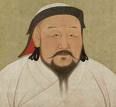


1251 On June 6 Margaret II's son William III of Dampierre (b. 1223) is assassinated at a tournament in Trazegnies by a group of knights financed by his half-brother John I of Avesnes (1218-57), causing his younger brother Guy of Dampierre (1226-1305) to take up his cause. On Dec. 25 Henry III knights Alexander III of Scotland, and on Dec. 26 he marries Henry III's daughter Margaret of England (1240-75) (sister of Edward I Longshanks); Alexander does homage for his English lands but not for Scotland itself; meanwhile Henry III suddenly demands the resignation of all of Alexander's royal officials present at the wedding, esp. Alan Durward, who was trying to get his bastard wife legitimized in Rome, which would make her and her daughters royal heirs, causing rumors that he was planning to kill the king and seize the throne; Walter Comyn and his Comyn (Cumming) Clan take over the govt. admin. for the next four decades, with his sons Alexander Comyn, 2nd Earl of Buchan (1217-89) and John II "Black" Comyn, Lord of Badenoch (-1302) (brother-in-law of John Balliol) running it at the end. Wenceslaus I's son Ottokar II, margrave of Moravia and husband of Frederick II the Quarrelsome's sister is elected duke of Austria by the Austrian estates after the death of the last Babenberg duke. Alexander Nevsky signs a peace treaty with Norway, then invades Finland and routs the pesky Swedes. Thousands of shepherds (pastoreaux) lead the popular Pastoureaux (Shepherds) Insurrection (Crusade) in N France allegedly to rescue Louis IX, intending to usher in the Parousia by slaughtering "heretics", i.e., Jews, Muslims, intellectuals, and the rich. Kublai (Khubilai) Khan (1214-94) becomes Mongol gov. of China; Hulagu (Hulegu) (Halagu) Khan (1217-65) begins conquering Persia (until 1265); Mongke (Möngke) (Mangu) Khan (1209-59), son of Genghis Khan's son Tului and a Nestorian woman (elder brother of Kublai Khan and Hulagu Khan) is elected Great Khan by the Mongolian diet (until 1259), going on to hold a series of court debates between Buddhists and Daoists (Taoists), with Confucians sitting in, and the Daoists losing - hosted by Alex Trebek? The Hanse of Utrecht is formed. Births: French Knights Templar leader Geoffroi de Charnay (d. 1314); deputy of Jacques de Molay (1244-1314).



1252 On Apr. 30 St. Louis IX of France is released after paying a princely ransom of 500K pounds tournois (50K gold bezants - the entire annual revenue of France), moving his army to Jaffa to regroup, throwing a chess set overboard on his trip from Egypt, making John of Ibelin, count of Jaffa into a big man who corresponds with Henry III of England, and Pope Innocent IV; meanwhile Louis IX goes on a pilgrimage to Jerusalem (ends 1254) - it's nice to be a rich saint? Intellectually-cracked 13th cent. Europe gets one Bourbon, one Scotch, and one beer? On May 30 king (since Aug. 31, 1217) St. Ferdinand III (b. 1199) dies, and on June 1 his erudite son Alfonso X (the Wise) (El Sabio) (1221-84) becomes king of Castile and Leon (until Apr. 4, 1284), taking a clue about cautious multiculturalism from late great Frederick II of Germany and beginning a cultural awakening in intolerant backward Europe known as the Castilian Thirteenth (13th) Cent. Renaissance, creating the Spanish Nat. Library in Madrid, one of Europe's first state libraries, along with the Alfonsine School of Translators in Toledo, manned by Christians, Jews, and Muslims, incl. Hermannus Alemannus (Herman the German), who trans. a large mass of Arabic works mss. on astronomy, astrology, and history, selected by the king into Latin and Spanish, bringing the most important Greek, Indian, Persian, and Syrian works to the scholarly Euro community, and causing Toledo to become a European intellectual hub which fuels the Renaissance; Alfonso X the Wise supervises the ambitious Spanish pub. known as the General Estoria, which incl. the Alfonsine Astronomical Tables and the Alfonsine Bible (Biblia Alfonsina) as a vehicle for polishing and enriching the Spanish language, causing it to be established as a serious language and intellectual vehicle, rocketing it ahead of Italian, German, and English and making them play catch-up, causing Latin to turn a whiter shade of pale? On June 29 Abel of Denmark (b. 1218) dies, and his brother Christopher I (1219-59) is elected king of Denmark (until 1259), spending most of his reign fighting rivals. In Aug. English king Henry III crosses over the English Channel to Gascony with his army and dismisses gov. Simon de Montfort, then getting pissed-off when Richard de Clare, 6th earl of Hertford refuses to accompany him and goes to Ireland instead. Alexander Nevsky submits to Tartar (Mongol) rule, and is appointed grand prince of Vladimir by Sartaq Khan, working to stop insurrections as he plays the Tartars off against the Roman Catholics; the Mongols were really pagan Russian tribes, and Nevsky was working to unite the Christian part of Russia under himself by painting them as the Boogey Man to the stupid Roman Catholics? Stefan Uros I of Serbia wars with Dubrovnik (until 1253), causing the latter to call on their allies the Bulgarians. A Jewish synagogue is built in Hagenau in Alsace. The Roman Inquisition is authorized by Pope Guilty-Until-Proved-Innocent IV to use instruments of judicial torture to prove their cases, as is common in civil courts - you're talking out of your mind? The 1252 Assize of Arms proclaimed by King Henry III to help enforce the 1181 Assize of Arms establishes the system of Watch and Ward, requring the appointment of watchmen and constables, becoming the earliest English police force; all Englishmen with an income of £25/year to own a longbow; churches are required to maintain butts for target practice. Gold currencies (florins, etc.) are introduced in Italian trading towns Florence and Genoa, and keep their weight and purity for a very long time; florins minted in Florence have the lily (city symbol) one side, and St. John the Baptist (city patron saint) on the other. German Hanseatic merchants establish common rights at the Flemish harbor of Bruges, allowing them their own ordinances and officials, causing Bruges and Lubeck to become the twin pillars of the Hanseatic League. Architecture: The Church of St. Francis of Assisi in Assisi, Italy is finished, with a monastery and hospital run by the Order of the Knights of the Cross with the Red Star. Japanese sculptors Ono Goroemon and Tanji Hisatomo cast the 120-ton 40-ft.-high bronze Kamakura Daibutsu statue of the Buddha of the Western Paradise (with elongated ear lobes and wisdom bump on the forehead) near Yokohama; it survives the 1495 Kamakura tsunami quite serenely? The Univ. Church of St. Mary the Virgin becomes the first bldg. adopted by Oxford U., becoming its admin. center. Novels: John of Wales (1220-85), The Innocent Morality; the first printed book on chess; "The world resembles a chess-board which is chequered white and black, the colours showing the two conditions of life and death, or praise and blame. The chessmen are men of the world who have a common birth, occupy different stations and hold different titles in this life, who contend together, and finally have a common fate which levels all ranks. The King often lies under the other pieces in the bag." Births: German Hohenstaufen duke of Swabia and king of Sicily (1254-8, 1268) Conradin (the Younger) (the Boy) (d. 1268) on Mar. 25 in Wolfstein, Bavaria; the last Hohenstaufen; son of HRE Conrad IV and Elizabeth of Bavaria (1227-73) (son of Duke Otto II of Bavaria). French (Belgian) duke of Brabant (1267-94), and Lothier and Limburg (1288-94) John I "the Victorious" (d. 1294). French diplomat and archbishop of Narbonne (1287-1311) and Rouen (1311-18) Gilles I Aycelin (Aicelin) de Montaigu (Montaigut) (d. 1318). Deaths: Italian diplomat-explorer Giovanni da Pian del Carpine (b. 1185) on Aug. 1 in Antivari, Dalmatia. Spanish king of Castile and Toledo (1217-52) and king of Leon and Galicia (1230-52) St. Ferdinand III (b. 1199) on May 30 in Seville; canonized in 1617; buried in Seville Cathedral clothed in the habit of the Third Order of St. Francis, and his body remains uncorrupt as miracle after miracle happens to those who hang out with the most he's got? Danish king (1250-2) Abel of Denmark (b. 1218) on June 29. Spanish queen Blanche of Castile (b. ?). Mongol Christian Sorkaktani (b. ?); mother of Mangu, Hulagu, and Kublai Khan.
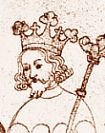


1253 On May 7 Louis IX of France sends Flemish Franciscan missionary William (Gillielmus) (Willem) (Guillaume) of (de) Rubruck (Rubruk) (Ruysbroeck) (Ruysbrock) (Rubriquis) (1220-93) to the court of the Great Khan in C Asia, returning in 1255 with an invitation to submit France to the Mongol power, later reporting his amazing experiences, incl. the source of the Don and Volga Rivers, the location of Lake Balkhash, the cult of the Dalai Lama, the presence of Islam in C Asia, how the Caspian Sea doesn't flow into the Arctic Ocean, Nestorian Christian settlements in China, and the difference between Mongols and Tatars; in May 1254 he engages in a formal debate at the Mongol court with Buddists and Muslims. On July 4 after John I of Avesnes gets his brother-in-law Count William II of Holland to seize Hainaut and the parts of Flanders within the bounds of the empire as overlord, he defeats the armies of Margaret II and Guy of Dampierre at the Battle of West Capelle (Walcheren); Guy of Dampierre is imprisoned, and ransomed in 1256, causing Margaret to agree to sell her rights to Hainaut to Charles of Anjou if he reconquers it from John; too bad, Charles is defeated by Louis IX, and on Nov. 22, 1257 Guy relinquishes Hainaut, only to see John die on Christmas Eve in Valenciennes. On Sept. 23 Bohemian king (since 1230) Wenceslas I Premyslid (b. 1205) dies, and his son Ottokar (Ottocar) (Ottakar) II (the Great) (the Iron and Golden King) (1230-78) becomes king of Bohemia, going on to bring Bohemia to its height of power and wealth, fueled by silver mines, and expanding briefly from Silesia to the Adriatic Sea until the Germans et al. stop him. In Oct. Pope Innocent IV returns to Rome; Russian prince Daniel of Galicia (Volynia_ (1201-64) sells out the Russian Church to him to secure aid for a crusade against the Tartars, but it fizzles. The Mamluks and the Ayyubids sign an agreement granting the Mamluks sovereignty over the kingships W of the Jordan River, and the Ayyubids those E of the Jordan River. Edmund Crouchback, 1st Earl of Lancaster (1245-96), brother of Edward I of England is invested with the kingdom of Sicily and Apulia by Pope Innocent IV, and created earl of Chester by his daddy Henry III; too bad, Conrad IV of Germany is the de facto king f Sicily, and the earldom is soon transferred to his older brother Edward I. The Mongols under Kublai Khan conquer the Thai state of Nan-Chao (Nanzhao) (in modern-day Yunnan and S Szechwan), causing an exodus of Thai (Shan) peoples into Thailand over the next cent. After hearing of a rebellion in Iran led by the Assassins, Hulagu Khan leads an army through Samarkand and Balkh, sieging the Assassin stronghold of Alamut (ends 1256). Henry III of England orders worship in a Jewish synagogue to be held quietly so that Christians like him don't have to hear it?; Jews are forbidden to employ Christian nurses or maids; no Jew may prevent another from converting to Christianity. Theobald IV dies, and Theobald II/V (the Young) (1239-70) becomes count of Champagne and Brie, and king of Navarre (until Dec. 4, 1270). Franciscan friar (St.) Bonaventura (Bonaventure) (Giovanni di Fidanza) (1221-74) becomes a prof. of theology at the U. of Paris, and in 1257 he is elected minister gen. of the Franciscan Order, introducing reforms into the constitutions, and settling the big dispute between the Spirituales and Relaxisti - don't ask if you're underage? HRE Conrad IV founds the town of Aquila degli Abruzzi (L'Aquila) (It. "the Eagle") in C Italy in the Atorno Valley 54 mi. NE of Rome; it becomes an espiscopal see in 1257. Linen is first manufactured in England. In 1253-7 the Sorbonne in Paris is founded by court chaplain (to Louis IX) and Roman Catholic theologian Robert de Sorbon (1201-74) as the Community of Needy Theological Students (La Communaute des Pauvres Maitres Etudiant en Theologie), a residence hall for needy theological students; by the end of the cent. it is called La Sorbonne, becoming part of the U. of Paris, which in 1970 is split into 13 autonomous univs. Architecture: The House of Rosenberg builds the castle of Cesky Krumlov in S Bohemia, dominating it until 1611. Births: Burmese Hanthawaddy king #1 (1287-1307) Wareru (d. 1307) on Mar. 20 in Thaton. Serbian Nemanjic king (1282-1321) Stefan Uros II Milutin (d. 1321); youngest son of Stefan Uros I (-1277). Iranian Safavid Sufi order founder Shaykh Safi al-Din (d. 1334) in Ardabil. Deaths: French king of Cyprus (1218-53) Hugh I (b. 1218) on Jan. 18 in Nicosia. French king (of Navarre) Thibaut IV (b. 1201). Bohemian king (1230-53) Wenceslaus I Premyslid (b. 1205) on Sept. 23. Bavarian duke Otto II (b. 1206) on Nov. 29 in Landshut.



1254 The last Hohenstaufen on the throne of Sicily goes out kicking? On May 21 after being excommunicated, Conrad IV (b. 1228) dies of malaria in Lavello, and his brother Manfred continues the HoHo Hohenhstaufen fight with the PaPa Papacy, seizing the regency of Sicily for Conrad IV's infant son (his nephew) Conradin (1252-68) (until 1258), while Pope Innocent IV confers the crown of Sicily on Edmund Plantagenet, 2nd son of Henry III of England, in return for assuming a papal debt of £90K for this war; after he agrees, papal forces invade Sicily, and Manfred restores the Kingdom of the Two Sicilies to the papacy, while the pope attempts to help Henry III pay his debt obligation by a tax imposed on the English clergy, pissing them off; too bad, on Dec. 7 Pope (since 1243) Innocent IV dies (before or after numerologists discover that his Latin name equals 666 and proclaim him the Antichrist?), and on Dec. 12 Raynold (Rinaldi), Count of Segni is elected Pope (#180) Alexander IV (-1261); the Sicilian thang now being in limbo, the Great Interregnum begins (ends 1273), with non-Germans Richard of Cornwall and Alfonso X of Castile claiming the imperial crown, while the German princes solidify their political independence. On Aug. 8 after leaving Palestine for France, leaving John of Ibelin in charge of Jerusalem, Louis IX of France hears a court case about a chess player who stabbed his opponent to death, causing him to restrict chess to laymen; meanwhile John of Ibein makes peace with Damascus, freeing his forces to attack Ascalon. On Nov. 1 after Henry III worries about a Castilian invasion of Gascony, he marries his 15-y.-o. son Edward I (1239-1307) to 13-y.-o. Eleanor of Castile (1241-90), half-sister of Alfonso X of Castile; Edward I receives lands worth 15K marks/year, incl. land in England (earldom of Chester), Wales, and Ireland, becoming lord of Ireland, going on to use the country to provision his campaigns against the Welsh, French, and Scots; his son Edward II continues the practice. On Nov. 3 after conquering S Thrace and Macedonia from Bulgaria, allowing Michael II of Epirus to help himself to W Macedonia, then defeating him and forcing him to recognize Nicaean suzerainty, Nicaean emperor (since 1221) John III Ducas Vatatzes (b. 1193) dies in Nymphaeum, and his only son Theodore II Ducas Lascaris (Theodore II Doukas Laskaris) (1221-58) succeeds him as Greek emperor #2 of Nicaea (until Aug. 18, 1258). King Louis IX returns to France from the Holy Land, ending the Seventh Crusade (begun 1248), and expels the Jews from France, ending the Tosaphists Period; most go E to Germany or farther; The Bulgarians under Tsar Michael Asen I invade Serbia in support of Dubrovnik, forcing Stefan Uros I to make separate peace agreements; Michael Asen I attempts to reconquer the lost territories in the Balkans from Nicaea, but is badly defeated by Theodore II Lascaris at the Battle of Adrianople (Adrianopolis) on the Tundzha River 130 mi. NW of Constantinople. Bela IV of Hungary regains suzerainty over Bosnia, and establishes it over N Serbia and the principality of Hum (Zahumlje) (Herzegovina). English king Henry III asks the Scots for military aid in Aquitaine, and only Alan Durward responds, going to Burgos in Castile with future Prince Edward and restoring himself in the king's favor while turning him against the Comyns. Henry III summons two knights from each county to join the barons and prelates in the Great Council. Great Khan Mongke tells Flemish Franciscan monk William of Rubruck (1220-1293), envoy of Louis IX of France that religions are like the fingers of one hand - like Lady Five Fingers? Alfonso X the Wise of Castile charters the U. of Salamanca (founded 1217). Hetum I the Great of Lesser Armenia (Cilicia) travels to the court of Buddhist Mongol ruler Mangu Khan in Karakorum to renew their alliance against the Muslims, and presents him with sumptuous presents, then after failing to convert him to Christianity he strikes a deal to work together to take Jerusalem from them. Pope Innocent IV finally excommunicates cruel tyrant Hellzelino, er, Ezzelino III da Romano four years after the death of his protector HRE Frederick II, and launches a crusade against him. The term "Holy Roman Empire" is first used for the Empire of the West or Roman Empire started by Charlemagne in 800 (Holy Empire since 1157). Births: French king of Naples-Sicily and Albania (1285-1309),and Jerusalem, prince of Salerno and Achaea, and count of Anjou, Provence, and Forcalquier Charles II (the Lame) (d. 1309); son of Charles I of Anjou (1226-85) and 1st wife Beatrice of Provence (1231-67); husband of Maria Arpad of Hungary (1257-1323) (daughter of Stephen V); father of Charles I Martel of Anjou (1271-95), Marguerite of Anjou and Maine (1273-1299) (wife of Charles of Valois, son of Philip III), St. Louis of Toulouse (1274-97), Robert the Wise of Anjou (1277-1343), Philip I of Taranto (1278-1331), Raymond Berengar (1279-1307), Blanche of Anjou (1280-1310) (wife of James II of Aragon), Eleanor of Anjou (1289-1341) (wife of Frederick III of Sicily), Peter Tempesta (1291-1315), and John of Gravina (1294-1336); grandfather of Charles I of Hungary (1288-1342) - his 3rd leg wasn't lame? Chinese painter Zhao Mengfu (Chao Meng-fu) (d. 1322). Italian "Book of the Marvels of the World" remarkably polished traveler-trader Marco Polo (the Younger) (d. 1324) on Sept. 15 in Venice; son of Niccolo Polo (1230-94), brother of Marco Polo the Elder and Maffeo Polo (1230-1309), sons of Andrea Polo. Deaths: Greek emperor of Nicaea (1221-54) John III Ducas Vatatzes (b. 1193) on Nov. 3 in Nymphaeum. German king (1237-54) Conrad IV (b. 1228) on May 21 in Lavello (malaria).


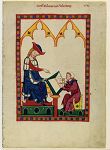
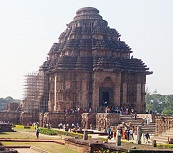
1255 On Mar. 25 Pope Alexander IV excommunicates Manfred, and on Aug. 20 Manfred rebels and defeats papal forces at the Battle of Foggia. In June the Battle of Bryn Derwin sees Llywelyn the Last (Llewelyn ap Gruffudd) (1223-82) defeat his brothers Owain Goch ap Gruffydd and Dafydd ap Gruffudd, becoming the sole ruler of Wales (W of the Conwy River), and the last independent prince of Wales before the stankin' English takeover in 1282, going on to recover much lost Welsh territory in 1257-60 and bring a period of stability until the mid-1270s. In Aug. Alan Durward, backed by the earl of Dunbar stages a coup in Scotland, seizing Edinburgh Castle and causing Alexander III to form a new govt. with the Comyns kicked out, set to expire on the king's 21st birthday in 1262 (ends 1257); meanwhile Henry III sends Richard de Clare, 6th earl of Hertford to Edinburgh to find out what's happening with his son-in-law Alexander III, and to try to bring him back; after pretending to be knights of Robert de Roos, they get into Edinburgh Castle, sneak in their party, and find the queen, who tells them she is being kept apart from the king, and they force Roos to go get the king; meanwhile the Scottish magnates discover the English in the castle, but won't siege it while kingy and queeny are inside, and de Clare is given save passage with the king, and they arrive in Newminster, Northumberland by Sept. 24. Henry III of England accepts Sicily for his son Edmund - now all he has to do is hold it? Ottokar II of Bohemia successfully campaigns against the heathen Prussians in support of the Teutonic Knights. Carintana dalle Carceri of Venice, 2nd wife of William II of Achaea dies, causing the War of the Terciers of Euboea between Venice and Achaea over her inheritance of a fief in Euboea (end 1258). Ewen MacDougall, 3rd Lord of Dunollie and of Lorn (-1266) in Scotland is restored to his lands in the Hebrides, pissing-off the Norwegians, who claim to own them. Brian mac Neill Ruaidh Ua Neill (-1260), king of Tir Eoghain raids the lands of English colonists across the Bann River into Ulaid, destroying towns and castles; in 1256 Connacht king Aodh O'Connor conquers the neighboring kingdom of Breifne with Brian's help; in 1257 Tadhg O'Brien, king of Thomond defeats the colonists and plunders their lands; in 1258 Brian, Aod, and Tadhg form an alliance, meeting near a ruined Geraldine castle in Belleek, County Fermnagh on the Erne River, where Brian is confirmed as high king of Ireland, and Aodh as overlord of Breifna; too bad, Tadhg dies in 1259. English Christian boy Little St. Hugh (b. 1246) is allegedly ritually murdered by the Jews in Lincoln, England, after which the rabbi who allegedly presided over the ceremony is dragged by the tail of a horse through the streets and hanged, and another (the same?) Jew named Copin is executed after allegedly confessing that the Jews do it once a year; despite the intervention of Dominican monks, 18 more are hanged, and 90 are imprisoned in London for further investigation; Henry III transfers his "rights to mastery of the Jews" to his brother Richard for 5K marks. Lisbon becomes the new capital of Portugal. Erfurt, Germany is granted municipal rights. Architecture: The Bargello (Ger. "burg" = castle) (Palazzo del Popolo) (originally the Palazzo del Podesta) next to the Volognana Tower in Florence, Italy is begun to house the podesta (pres. of the city council), becoming the oldest public bldg. in Florence, serving as a model for the Palazzo Vecchio (1299); in 1574 the Medici turn it into a prison and HQ of the police chief, with executions abolished in 1786 by Grand Duke Peter Leopold; in 1856 it becomes a nat. museum, housing Gothic and Renaissance sculptures from the 14th-17th cents., incl. masterpieces by Michelangelo, Donatello, Vincenzo Gemito, Jacopo Sansovino, Benvenuto Cellini, Gianlorenzo Bernini, Antonio del Pollaiolo et al. About this year the Konark (Sansk. "kona" + "ark" = corner + the Sun) Sun Temple at the mouth of the Chandrabhaga River in Orissa, India (21 mi. from Puri) is built by King Narasimhadeva I of the Eastern Ganga Dynasty, shaped like a giant chariot complete with 12 pairs of stone wheels and dedicated to the Sun God Surya; Euro sailors call it the Black Pagoda. Sports: On May 8 the provincial council of Beziers, France forbids the playing of the pesky game of chess. Poetry: Ulrich von Lichtenstein (1200-78), Frauendienst (Service of His Lady); about two jousting tours he made, one dressed as Frau Venus and the other as King Arthur - the original Johnny Cash and June Carter? Konrad von Wurzburg (1225-87), Herzmaere; Der Schwanritter; adopted by Richard Wagner for the libretto of his opera "Lohengrin". Births: French poet Guido Cavalcanti (d. 1300); friend of Dante Alighieri. French Dominican monk and scholastic theologian John (the Blind) (Quidort) (Surdus) (Monoculus) of Paris (Jean de Paris) (d. 1306) in Paris. Austrian Hapsburg HRE (1298-1308) Albert (Albrecht) I of Hapsburg (d. 1308) in July in Rheinfelden; eldest son of HRE Rudolf I of Hapsburg (1218-91) and 1st wife Gertrude of Hohenburg (1225-81). Italian painter Duccio di Buoninsegna (d. 1319) in Siena, Tuscany; founder of the Sienese School of Painting (which absorbs Byzantine art), and #2 Italian artist of late medieval Italy after Giotto. French political writer Pierre Dubois (d. 1322) in Normandy; educated at the U. of Paris. Deaths: Italian "Dies Irae" Franciscan friar-poet Thomas of Celano (b. 1200). Malian emperor #1 Sundiata Keita (b. 1217); drowns while crossing the Sankarini River.

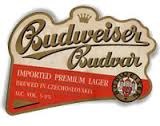
1256 On Jan. 28 William of Holland (b. 1228) dies, and Pope Alexander IV supports Richard of Cornwall for king of Germany against Alfonso X of Castile; too bad, the English people grow bitter over the costs? In May Narathihapate (1238-87) becomes king of Pagan (Bagan) in N Burma (until 1287), going on to get his butt kicked by the Mongols. In June Pope Innocent IV gets Ezzelino III da Romano kicked out of Padua, pissing him off and causing him to slaughter 11K Paduans on the Plain of Verona (Campi di Verona). In Dec./Jan. Kaliman (Koloman) Asen II (-1257) murders his first cousin Michael Asen I (b. 1239) during a hunting party near Tarnovo and usurps the throne with the support of the boyars, being crowned Bulgarian tsar, marrying Michael's widow, but her pissed-off daddy Rostislav Mihailovich (1225-62) advances on him from Belgrade and chases him out of Tarnovo, after which he is murdered next year; Rostislav returns home with his daughter and tries to claim the throne for himself, but Michael's brother-in-law Mitso (Micho) Asen (-1278) takes the throne (until 1257), and is then deposed and expelled. In Nov. after Henry III gives his son Prince Edward Longshanks the area in Wales between the Dee and Conway Rivers known as Y Berfeddwlad (Perfeddwlad), and he visits it during the summer, only pissing them off worse, Llywelyn the Last invades and recovers all of it except the English castles of Dyserth and Deganwy, then by 1258 takes over all of Wales, styling himself prince of Wales in 1257, which gives Longshanks ideas as a nice title for his son? The Swedes attempt to block the Russians from the Baltic Sea. Pissed-off at losing Ascalon, the Mamluks siege Jaffa, but John of Ibelin returns from Ascalon and defeats them, giving up control of Jerusalem to his cousin John of Arsuf (Ibelin) (1211-58). The Venetian-Genoese (Hundred Years) War between the maritime repubs. of Venice and Genoa begins when the Venetians are evicted from Tyre, and try to move into Acre onto land owned by the Monastery of St. Sabas, which Genoa claims, starting the War of St. Sabas (Saba) (ends 1270) in Acre, with John of Ibelin, count of Jaffa, and the Knights Templar supporting the Venetians, and Philip of Monfort, John of Arsuf, and the Knights Hospitaler supporting the Genoese, who win early Vs until the repub. of Pisa signs a 10-year military alliance with Venice. After a 3-year siege, Hulagu Khan's Mongol troops destroy the Assassins' fortress stronghold of Alamut (built 1090) and massacre them; the sect disperses but retains a presence until modern times; Hulagu accuses last Abbasid caliph (since Dec. 5, 1242) Al-Mustasim Billah (1213-58) (a learned calligrapher) of sheltering the rebels, and demands his submission along with the demilitarization of Baghdad, which is refused. Fighting flares up between the Valencia rebels and the Aragonese. Parakramabahu II repels another attack (first 1236) by Tambralinga on the Straits of Malacca, again with Pandya help. The Wendish towns of Lubeck, Stralsund, Wismar, Rostock, and Greifswald hold their first Hanseatic League meeting; Luneburg later joins; the 1226 Code of Lubeck is agreed to by most of them, making them independent of royalty. Thomas Aquinas receives his doctorate in theology, and is appointed prof. of philosophy at the U. of Paris. Kublai Khan builds the city of Xanadu (Shangdu) (Chin. "Upper Capital") (original name Kaiping until 1264) in modern-day Inner Mongolia 220 mi. N of Peking, reaching 100K pop.; in 2002 a restoration effort begins; Marco Polo visits about 1275. The town of Ceske Budejovice in S Bohemia at the conjunction of the Vltava and Maise Rivers is founded by Bohemian Przemyslid king (1253-78) Ottokar II "the Iron and Golden King" (1233-78), who grants it brewing rights, causing the founding of the Svitavy Brewery (closed in 2002), after which the town gains fame for its great Budweiser beer, produced by Budweiser Budvar Brewery (founded in 1785). Science: Arab Muslim physician Khalifah ibn-abi'l-Mahasin of Aleppo performs a cataract operation on a 1-eyed man, leaving a comprehensive ocular manual. Nonfiction: Thomas Aquinas (1225-74), Commentaries on the Sentences of Peter Lombard. Births: Spanish military hero (born a Muslim?) Alonzo Perez de Guzman (El Bueno) of Aragon (d. 1309) in Lim (Morocco?); founder of the Medina Sidonia family. French House of Bourbon founder Count (1268-1317) Roger of Claremont (d. 1317); son of Louis IX (1214-70) and Margaret of Provence (1221-95). Deaths: Japanese shogun #4 (1226-44) Kujo Yoritsune (b. 1218) on Sept. 1. German king (1247-56) William II of Holland (b. 1228) on Jan. 28. Bulgarian tsar (1246-56) Michael I/II Asen (b. 1239) in Dec./Jan. near Tarnovo (murdered).
1257 A volcanic eruption in Mt. Samalas on Lombok Island near Bali, Indonesia destroys the capital city of Pamatan and shoots 2.4 cu. mi. of rocks and ash, incl. the most sulfur into the atmosphere in 7K years. Pogroms almost wipe out Jewish communities in Cambridge, Canterbury, Lincoln, London, Northampton, Winchester, and Worcester in England. In May the Battle of Cadfan (Gael. "battle place") sees the Welsh under Llywelyn ap Gruffydd of Gwynedd defeat the stankin' English under Prince Edward Longshanks. In Oct. the Comyns stage a coup in Scotland and kidnap Alexander III during the night in Kinross; by now the king is old enough to stand up to them and won't form a new govt. The Mongols attempt to surround the Chinese from the S by invading N Vietnam, but are expelled by next year. Richard of Cornwall is elected king of the Romans and crowned at Aix-la-Chappele; he is soon unelected. Julian of Grenier, lord of Sidon donates the Cave of Tyron to the Teutonic Knights, who also buy a large land complex called Souf (Schuf) near Sidon. After he tries to take over, Mamluk ruler Shagarat ad-Durr has her hubby Aybak murdered in his bath, and next year former Turkish slave Al-Malik Baibars(-1223-77) becomes Mamluk ruler #2 (until 1177), going on to murder Sultan Qutuz in 1260 and become the first Mamluk sultan, kicking Crusader butt, building up the military, and organizing the govt. to prevent incompetence, which holds until 1517. Science-loving Roger Bacon becomes a Franciscan, which gets him into trouble for the rest of his life? The Muslims use some form of incendiary weapon in the Battle of Niebla. Chinese silk becomes available in Europe. Premysl Otakar II founds Prague's Lesser Town (Mala Strana) on the left bank of the Vlatava River, and invites colonists from N Germany. Poetry: Ulrich von Lichtenstein (1200-78), Frauenbuch; laments the decay of chivalric courtship. Sadi (1184-1291), The Fruit (Rose) Garden (Gulistan); Persian boys should eat fruit from the garden of life? Births: English Norman chronicler and Dominican friar Nicholas Trivet (Trevet) (Nicolas Trivetus) (d. 1334) in Somerset. Deaths: Dutch count of Hainaut (1246-57) John I of Avensnes (b. 1218) on Dec. 4 in Valenciennes. Bulgarian tsar Michael Asen (b. 1240).


1258 In Jan.-May a large volcanic eruption occurs in Mexico or Ecuador, shooting 190-270 megatonnes into the air (8x larger than Krakatoa in 1883), causing a severe winter and famine in England, W Germany, France, and N Italy, pestilence in London, France, Austria, Iraq, Syria, and SE Turkey, lunar eclipses in England, a dry fog in France, a harsh spring in N Iceland et al. On Feb. 13 after stupid last Abbasid caliph Al-Mustasim (a damn fine calligrapher) fails to raise an army to defend it (thinking that women throwing stones can fight them off?), and accepts an offer of surrender with clemency from Hulagu Khan after a 1-mo. siege, Baghdad, the Paris of the Orient is captured by the Mongol hordes of Genghis (Chinggis) ("universal river") Khan (1162-1227) (birth name Temujin = "iron worker") under the leadership of his grandson "Go West, Young Man" Hulagu Khan (1217-65); of course he reneges, and 800K-1M are slaughtered over 40 days, the Tigris River running black with the ink from hundreds of thousands of ruined books; on Feb. 20 after being forced to reveal the hiding place of his royal treasure, Al-Mustasim is rolled in a rug and trampled with horses so that no Mongol could be accused of shedding royal blood (either that, or he is imprisoned with his royal treasure and starved to death to mock him for not spending it on defense, with the khan telling him "Eat of your treasure as much as you want, you are so fond of it"), becoming the last Abbassid caliph of Baghdad; the Abbasid Dynasty (founded in 750) comes to an end along with Islam's Golden Age; the destruction of the irrigation system turns the paradise alley into a barren arid plain; the citadel of Arbil on the Great Zab River is captured; the town of Tehran (Pers. "warm place") (modern pop. 8M) in Persia is settled by refugees from the Mongol invasion; Hulagu Khan goes on to take Iraq, followed by Anatolia. In Apr. a Scottish parliament summoned by Alexander III meets in Stirling to form a new govt., and by Sept. unity is restored with the Comyns dominant. On May 11 the 1258 Treaty of Corbeil settles the claims between Louis IX of France and James I of Aragon to France's advantage, relinquishing all French claims to Barcelona and Roussillon in return for part of Provence and Languedoc, with both sides giving up the idea of cross-Pyrenees kingdoms; Louis IX's son Philip is betrothed to Isabella of Aragon. In June after English king Henry III asks the Great Council for help in paying off his debt for the Sicilian war, his pissed-off barons, led by Simon (V) of Montfort, 6th Earl of Leicester (1208-65) step in, drafting a program of reforms Provisions of Oxford; after marching to the king's hall and forcing him to agree, a new baronial council of 15 takes the place of the Great Council, and they are placed under a new committee of 12 barons, becoming the First English Rev., and Montfort the "Father of the English Parliament"; Henry III swears to them, but weasels out by 1261, and the council only lasts 15 mo.; the Parliament (House of Commons) (the first one becoming known as the Oxford or Mad Parliament) is established, with Peter de Montfort as first parlour (speaker), and Simon de Montfort running both it and the country, ending absolute monarchy; it convenes for 18 mo. until Simon de Montfort's death at the 1264 Battle of Evesham. In June after an unusually mild winter in 1249 where flowers sprout in Jan. before turning cold in Apr.-May, the summer in England is unusually wet and cool, leading to crop failures and famine in winter, killing 20K in London, with people driven to eating tree bark. On Aug. 18 Theodore II Lascaris (b. 1221) dies, and his 7-y.-o. son John IV Ducas Lascaris (John IV Doukas Laskarus) (1250-1305) becomes emperor #3 of Nicaea (until Dec. 25, 1261), with Michael Palaeologus as regent. On Sept. 27 Pope Alexander IV issues the bull Quod super nonnullis, giving authorities the right to enslave and confiscate the land of non-Christian peoples who refuse to submit to baptism, requiring cases of alleged witchcraft to be investigated by local authorities not Church inquisitors unless they "clearly savored of manifest heresy". The Venetians under adm. Lorenzo Tiepolo break through the harbor chain in Acre and defeat the Genoese navy, capturing the disputed St. Saba monastery, then after the 800 Genoese soldiers and crossbowmen hold their quarter of the town, Tiepolo begins a blockade, after which in Aug. John of Arsuf, hoping to aid Genoa signs a treaty with the city of Ancona granting commercial rights in Acre, but it backfires when John of Ibelin and John II of Beirut turn them to Venice's side, leaving only Philip of Monfort on the Genoese side, but after his 380 men are defeated, on Oct. 16 a peace treaty is signed by the Templars, Hospitallers, and Teutonic Knights, and the tired Genoese leave their acre in Acre for Tyre, continuing the fight. Manfred (illegitimate son of Frederick II) causes a rumor that Conrad IV's son Conradin is dead, allowing himself to be crowned king of Sicily in Palermo, after which Pope Alexander IV excommunicates him and offers the crown to Charles I of Anjou. King James takes al-Azraq's main citadel and suppresses the Valencian rebellion. William II of Achaea defeats the duke of Athens, ending the War of the Terciers of Euboea (begun 1255) with a V. Gallowglasses ("foreign soldier") (mercenaries) come to Ulster from Scotland to work for Irish chieftains. Henry III issues a royal proclamation in English this year, rather than the usual French. Bologna, Italy joins the club and passes the death penalty for homosexuals, burning at the stake, or perpetual banishment, their choice? - no more hot dog jokes? The town of Wolverhampton, England begins holding a Wednesday market and annual fair. Births: Spanish king of Castile and Leon (1284-95) Sancho IV the Brave (d. 1295) on May 12 in Valladolid; 2nd son of Alfonso X (1221-84) and Yolanda (Violant) of Aragon (1236-1301) (daughter of James I of Aragon); elder brother of Ferdinand de la Cerda (1253-75). Italian anatomist Mondino de Luizzi (d. 1326) in Bologna. Turkish Seljuk bey (1280-) and Ottoman sultan #1 (1299-1326) Osman (Osmanli) (Othman) I Gazi ben Ertugrul (Kara) (the Black) (El-Bazi) (d. 1326) in Sogut, Anatolia; son of Ertugrul (-1280), leader of the Turkic Kayi tribe, who fled from the Mongols W from C Asia to W Anatolia, and Halime; father of Orhan I (1284-1359). Deaths: Portugese count of Urgell (1229-31) Peter I (b. 1187) on June 2 in the Balearic Islands; dies without an heir, causing his Balearic possessions to revert to the crown of Aragon, becoming the kingdom of Majorca. Byzantine emperor Theodore II Lascaris (b. 1221) on Aug. 18 in Magnesia (epilepsy).
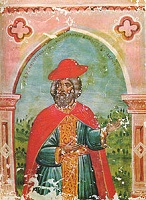



1259 On May 29 Christopher I (b. 1219) dies (poisoned?) after being excommunicated and taking Communion, becoming known as "Christ's sacrifice", and his son Eric V Klipping (Clipped Penny) (1249-86) becomes king of Denmark (until 1286), with his mother Margaret Sambiria (Sambirsdatter) (Spraenghest) (1230-82) as regent as regent during his minority. Michael VIII Palaeologus (Palaiologos) (1223-82) becomes co-emperor of Nicaea (until Dec. 11, 1282), and defends the empire against a coalition of Michael II of Epirus, Manfred of Sicily, and William II of Achaea (after he marries Anna Komnene Doukaina, daughter of Michael II of Epirus), while working for the big enchilada of getting Constantinople back into Greek Orthodox hands; in Sept. William II attacks the Nicaeans at the Battle of Pelagonia, but is defeated after his Epirote army deserts, and after hiding under a haystack he is captured and held in captivity in Nicaea until 1262. On Oct. 7 mean excommunicated Vicenza podesta (since 1236) Ezzelino III da Romano (b. 1194) dies after being wounded by an arrow in the Battle of Cassano d'Adda, then being captured near Bergamo; Padua begins a period of peace and prosperity; the great council of Verona elects Mastino I della Scala (-1277) as their new podesta, founding the Scaliger Lords of Verona - where's Romeo and Juliet? On Dec. 4 the Treaty of Paris between France and England yields Perigord and the Limousin in S France to Henry III of England, despite protests from both provinces, in return for renunciation of English claims to Normandy, Maine, Touraine, and Anjou; Guienne becomes distinct from Aquitaine; Navarre is cut off from the sea; despite the peaceful intentions of Louis IX, public opinion goes against him, weakening his position in S France. Mamluk ruler (since 1249) Shagarat ad-Durr is battered to death with wooden shoes by her murdered hubby's women slaves. 15-y.-o. (since 1246) Go-Fukakusa (b. 1243) abdicates at the insistence of his retired Go-Saga, and his 10-y.-o. brother Kameyama (1249-1305) (7th son of Go-Saga) becomes Japanese Yamato emperor #90 (until 1274). The Provisions of Westminster are enacted by the Great Council, remedying various govt. abuses in England, but the new baronial govt. soon starts to groan under selfish barons, despite good barons such as Simon de Montfort. Prince Llywelyn establishes peace between England and Wales. The Novgorod Uprising by the boyars is crushed by Alexander Nevsky. The Lower Saxon town of Hameln (of Pied Piper fame) (a member of the Hanseatic League) is sold to the bishop of Minden, but the townsfolk go nonlinear and place themselves under the protection of the duchy of Brunswick after a violent battle. Kublai Khan sieges the city of Wuhan, but news of the death of Great Khan Mongke forces him to withdraw to Karakorum. Ganapati dies, and his daughter Lady Ganapati (-1288) becomes ruler of Kakati in E India, going on to meet Marco Polo. Pope Alexander IV summons U. of Paris brain man Thomas Aquinas to Rome (until 1268), where he wows everybody with his erudition. Births: Turkish sultan (founder of the Ottoman Empire) Osman (Othman) (Ottoman) (Ataman) I Gazi ben Ertugrul (d. 1326) in Sogut, Anatolia. Italian painter (in Rome) Pietro Cavallini (d. 1330). Byzantine emperor (1282-1328) Andronicus (Andronikos) II Palaeologus (Palaiologos) (d. 1332) on Mar. 25 in Constantinople; son of Michael VIII (1223-82) and Theodora Doukaina Vatatzina. Deaths: Italian condottiero Ezzelino III da Romano (b. 1194) on Oct. 7 near Bergamo; Dante consigns him to the Seventh Circle of Hell, First Ring (Violent Against Neighbors). English chronicler-monk Matthew Paris (b. 1200). Mongol Great Khan (1251-9) Mongke (b. 1208). Danish king (1252-9) Christopher I (b. 1219) on May 29.

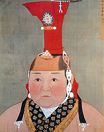


1260 The original Ahnuld in End of Days? Millennium Fever is at a peak this year, stirred by Joachim of Fiore's predictions that this is the year when Antichrist comes; meanwhile ex-Dominican monk Brother Arnold causes hysteria by claiming that the Church is corrupt and the Antichrist is the pope, and that Christ will soon judge him and the clergy; meanwhile the first Flagellant movements begin in S Germany and N Italy - whip it, whip it good? Speaking of parts west? On Mar. 1 after the Mongol forces of Hulagu Khan combine with the Franks under Bohemond VI of Antioch and the Cilician Armenians under Hetoum I and capture Aleppo, they hook up with Hulagu's Christian Turkish gen. Kitbuqa (-1260) and capture Damascus, celebrating Xmas Mass in the Grand Mosque of the Umayyads (formerly the Cathedral of St. John the Baptist), profaning numerous mosques and sacking Jerusalem; An-Nasir Yusuf is KIA by Hulagu, and the Ayyubid Dynasty (founded 1171) becomes kaput, continuing in name only, with the Muslim power center in Cairo not Baghdad or Damascus; meanwhile the death of Great Khan Mongke causes Hulagu to leave for Karakorum to help decide who will succeed him, and he leaves only 10K horsemen in Syria under Kitbuqa to occupy it, who raids as far S as Ascalon and Jerusalem, and stations a garrison of 1K in Gaza and another in Naplouse. On May 5 Kublai Khan (1215-94), grandson of Genghis Khan succeeds his brother Mongke (Mangu) as Great Khan of the Mongol Empire in N China and parts W, founding the (Great) Yuan Dynasty of China (ends 1368), after first moving the capital to the new city of Shangdu (Xanadu) while squabbling over secession; the Yuan dynastic name is officially adopted in 1271. On May 14 the Battle of Druim Dearg (Down) near Downpatrick, modern-day County Down, Ulster, North Ireland sees recently self-declared high king of Ireland (since 1258) Brian mac Neill Ruaidh Ua Neill (b. ?) KIA along with several Ui Cathain chiefs incl. Aedh Ua Conchobhair by a mercenary army of Irish Gaelic soldiers working for the Normans, ending the O'Neill revolt. On Sept. 3 after the Mamluks take advantage of the absence of Hulagu to move on them, the Mongols offer an alliance with the Franks, but Pope Alexander IV forbids it, and Count Julian Grenier of Sidon (-1275) (son of Balian I and Margaret of Brienne) causes the death of a grandson of Kitbuqa, causing him to sack Sidon, pissing-off the Christians so bad that they allow them to pass through Crusader territory, 10K-20K Egyptian Mamluks defeat and wipe out 10K Mongols in the Battle of Ain (Ayn) Jalut (Arab. "Spring of Goliath") (Heb. "Spring of Herod) in the Palestinian desert in the Jezreel Valley near Ein Harod (near Nazareth), becoming the first Mongol D that isn't avenged, forever defining the SW limit of Mongol expansion as the Tigris River; Kitbuqa is executed; Syria suffers severely from the Mongol invasion, worsened by subsequent invasions in 1281 and 1299; the Egyptians use portable hand cannon (midfa) using gunpowder cartridges charged with 2-3-15 (sulfur-carbon-saltpeter) gunpowder; on the way back to Cairo Al-Zahir al-Malik Baybars (Baibars) (Arab. "panther") (1223-77) AKA Abu al-Futuh (Abu l-Futuhat) (Arab. "father of conquest") murders Sultan Qutuz, and becomes Bahriyya sultan #1 of the Mamluk Empire (until July 1, 1277); the Kipchak Turkish Mamluks (Mamelukes) (Arab. "possessed", "owned") seize control of the Egyptian sultanate, ruling Egypt until 1517, and continuing as vassals of the Ottoman Empire until 1811, becoming known for kicking the Franks out of Palestine, and kicking the last Crusader's butt out of Asia; the Bahriyya (Bahri) Sultanate of the Mamluk Empire (ends 1382) is founded, becoming the leading Muslim state, integrating and ruling the Syrian provinces in 1271-1516 while recruiting Mamluk soldier-slaves from the Caucasus, which causes ethnic tensions between Turks and Circassians (known for their beautiful babes); Cairo becomes the richest city W of the Indus River until 1300, with public works erected by exploited peasants; the usual form of succession is assassination; Christian participation in the 1258 Mongol invasion of Baghdad et al. cause the Muslims to begin a persecution, ushering in a "devastating reversal of Christian hopes... [and] the... decisive collapse of Christianity in the Middle East and much of Africa" (Colin Chapman); by the middle of this decade Western Christians wake up and begin accepting Mongol feelers about a Franco-Mongol Alliance against the greater threat of the Muslims, the Mongols promising them Jerusalem in return for cooperation; too bad, despite several pro-Christian Buddhist Mongol khans sending embassies, it never happens, perhaps because the Christians demand their conversion first, giving Islam time to slam-dunk and convert them. On Sept. 4 the Battle of Montaperti (bloodiest battle in medieval Italy) near Siena sees 20K pro-HRE Ghibellines of Siena, aided by German mercenary heavy cavalry sent by Manfred I of Sicily defeat 33K pro-papal Guelphs of Florence and Tuscan allies after Florentine traitor Bocca degli Abati hacks off the hand of the Florentine standard bearer, causing the Florentines to flee, losing 15K KIA; the German soldiers call on St. George during the battle, and later build the Church of San Giorgio in Pantaneto; Dante later condemns Abati to the 9th Circle of Hell, even though his own mother's name is Bella degli Abati? Ottokar II defeats Bela IV of Hungary and takes the province of Styria. Alexander III takes personal control of the Scottish govt., while bad weather, food shortages and famine plague his kingdom; he travels to England with his pregnant wife Margaret to demand payment of her dowry, now nine years late, and gets his father-in-law Henry III to make promises to pay; he then returns to Scotland, leaving his wife behind to have the child, Margaret Dunkeld (1261-83) next Feb. The two grandsons of Bernhard of Ascania divide the diluted duchy of Saxony (since 1181) into Saxe-Wittenberg, which incl. the city of Wittenberg beyond the duchy's original boundaries, which later receives the electoral privilege. Turkoman leader Karaman ibn Musa founds the principality of Karaman in the foothills of the Taurus Mts. in SC Anatolia, rivaling the Ottomans until they annex it in 1468. Bergen-op-Zoom at the confluence of the Zoom and E Scheldt Rivers in N Brabant is founded, becoming a commercial rival of Antwerp until the 16th cent., when a new delta system in the Scheldt cuts it off. Torgau in E Germany is chartered about this time. Niccolo Polo and his brother Maffeo Polo travel to the court of Kublai Khan in Bukhara (until 1263). Between this year and 1347 80 banking firms open in Florence, enriching Euro vocabularies with banking terms incl. banco, credito, debito, cassa (money box) (cash), conto/disconto, conto corrente, netto, bilanza (balance), and banca rotta (bankruptcy). The College of Valladolid in Spain is founded, and raised to univ. rank in 1346. The first Mastersinger School is founded in Mainz, Germany. About this time Bolognese poet Guido Guinizelli (1235-76) founds the Dolce Stil Nuovo (Ital. "Sweet New Style") school of Italian love poetry, led by Guido Cavalcanti (1255-1300), Lapo Gianni (-1329), Cino da Pistoia (1270-1337), and Brunetto Latini (1220-94); in 1283 18-y.-o. Dante Alighieri joins and becomes a leader of the Florentine Circle. About this year the Borzoi (Russian Wolfhound) breed of sight hound is created in Russia from a cross between a Saluki and native Russian breed, or by crossing an Arabian greyhound with a Russian collie; they become a favorite of the Russian tsars. Sports: Henry III of England forbids the clergy from playing chess. Architecture: Chartres Cathedral (begun 1134) in France is consecrated on Oct. 17. Nicola Pisano designs the pulpit of the Pisa Cathedral Baptistery. Burgos Cathedral (begun 1221) is consecrated. Inventions: The cannon (gun) is invented by Konsantin Anklitzen. Science: In this decade English scientist Roger Bacon (1214-94) uses a camera obscura to observe solar eclipses. Art: Cimabue (1240-1302), Madonna (Trinita, Florence). Nonfiction: In this decade the Second Pskovian Chronicle is written, containing the soundbyte about their hero Alexander Nevsky: "He was taller than the others, his voice was like a trumpet, and his face was like that of Joseph, whom the Pharaoh placed second after him. His power was like Sampson and his wisdom like Solomon. Prince Alexander defeats but is never defeated." Poetry: Konrad von Wurzburg (1225-87), Engelhard (epic). Births: French chamberlain-minister (to Philip IV) (1304-14) Enguerrand de Marigny (d. 1315) in Lyons-la-Foret, Normandy. French surgeon and anatomist Henri de Mondeville (d. 1320). German mystic theologian and Dominican monk Meister Johannes Eckhart (d. 1327); combines Aristotelianism, Neoplatonism, Islam, and Judaism into his own brew of Christianity. Polish king (1320-33) Wladyslaw (Ladislaus) I Lokietek (the Short) (the Elbow-High) (d. 1333); father of Casimir III the Great (1310-70). Italian antipope (1328-30) (Franciscan) Nicholas V (Pietro Rainalducci) (d. 1333) in Corvaro (near Rieti), Lazi. English poet-chronicler (Gilbertine monk) Robert Mannyng (de Brunne) (d. 1340) (1275-1338?) in Brunne (Bourne), Lincolnshire. Italian Roman Catholic Servite priest (St.) Peregrine Laziosi (Pellegrino Latiosi) (d. 1345) in Forli; feast day: May 2. Deaths: French trouvere Richard de Fournival (b. 1201); leaves Bestiaire d'Amour (Bestiary of Love), Commens d'Amoure, Poissance d'Amore, Amistie de Vraie Amour, and The Vetula (verse romance which mentions chess).



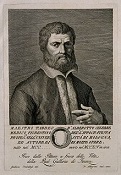
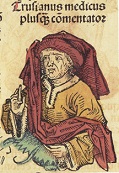
1261 On May 25 Pope (since 1254) Alexander IV dies, and on Aug. 29 Jacques Pantaleon, patriarch of Jerusalem (since 1255) (born in Troyes, France) is elected Pope (#181) Urban IV (-1264), bitterly opposing King Manfred of the Two Sicilies and favoring Count Charles of Anjou and Provence; after getting over the shock of losing Constantinople, he restores order in the papal states and works to create alliances with rulers of cities and states and weaken German influence. On June 13 fugitive Abbasbid prince Al-Mustansir (Abu al-Qasim Ahmad) is crowned as Mamluk caliph in Cairo, and the sharif of Mecca transfers his allegiance to Cairo, making the Mamluks the guardians of the holy cities of the Hijaz, confirming their #1 status in the Muslim world; on Nov. 28 he is killed by the Mongols in an anbush near Hit in modern-day Iraq, and next Nov. 21 he is succeeded as Abbasid caliph #2 of Cairo by his distant Abbasid relative Al-Hakim I (1247-1302) (until Jan. 19, 1302), who had already been proclaimed caliph in Aleppo after escaping Baghdad in 1258 to Damascus and was almost proclaimed after befriending Arab tribal chief Isa ibn al-Muhanna. Build muscle, slim fat, lose weight? On July 25 after making an alliance with the Bulgarians and concluding the 1261 Treaty of Nymphaeum (Nymphaion) with Genoa on Mar. 13, promising them the privileges enjoyed by the Venetians, and catching the Venetian fleet away and crossing the Bosphorus Strait with a Greek army under Gen. Alexius Comnenus Strategopoulos, Nicaean emperor (since 1259) Michael VIII Palaeologus (Palaiologos) (1223-82) surprise-attacks Constantinople, entering the city through a secret passage and recapturing it without much difficulty from the hated Latins, ending the Latin Empire (founded 1204), and restoring the Byzantine Empire in a downsized version under Nicaean leadership after its 57-year exile; Baldwin II wakes up, flees after forgetting to take his scepter and crown with him, and boards a Venetian galley, which heads to Negropont, Athens, Apulia, and France, retaining his title of Latin emperor of Constantinople while sponging off Charles of Anjou, who takes over Sicily in 1267, diverting him from recapturing Big C; the Palaeologan (Palaiologos) Dynasty, the last Byzantine dynasty is founded (ends 1453), finally officially adopting the old Roman double-headed eagle as the official armorial (ending up turning the Byzantine Empire into a subject for paleographists and paleontologists?); after being left behind in Nicaea and blinded on Dec. 25 (his 11th birthday) to make him ineligible for the throne, John IV Ducas Lascaris (b. 1250) is exiled and imprisoned in a fortress in Bithynia, after which Michael VIII marries off his sisters to two Italians and a Bulgarian noble so their descendants can't threaten the imperial succession; despite an attempt to keep the blinding secret, the news comes out, causing Patriarch Arsenios to excommunicate him until the appointment of Patriarch Joseph I in 1268; former emperor Baldwin II escapes to Italy and transfers his claims on the throne of the Latin Empire of Romania (East) (Constantinople) to Charles of Anjou (1226-85) (youngest son of French king Louis VIII); the duchy of Athens continues for the next two cents., controlled in turn by French, Spanish, and Italian rulers, becoming one of the most brilliant feudal courts of Europe in the 14th cent. Henry III persuades Pope Urban IV to release him from his promise to support the Provisions of Oxford, and to declare the enactments of the barons since 1258 null and void; the English govt. is split into two camps, and civil war brews. Greenland voluntarily comes under Norwegian rule. Alexander III of Scotland sends a delegation to Haakon IV in Bergen to seek a solution as to who controls the Hebrides, but he refuses to negotiate and war looms. Turkoman leader Mentesh Bey founds the principality of Menteshe in W Anatolia (ancient Caria) after conquering Byzantine ports and lands, with capital at Milas (Mylasa) in SW Anatolia; it is absorbed by the Ottomans in 1390. Florence, Italy-born Taddeo Alderotti (Thaddeus Florentinus) (1206-95) begins teaching medicine at Bologna U., becoming the first to organize a medical lecture at a univ. and helping the renaissance of learned medicine in Europe; he also invents fractional distillation; Dante disses him for pursuing learning for wordly instead of spiritual reasons like St. Dominic; his student Turisanus de Turisanus (Pietro Torrigiano de'Torrigani (-1320) teaches medicine in Paris in 1305-19, becoming the first medieval Euro physician to propose his own theory about human blood and its role. About this year Roger Owen (-1280) is appointed as the first King's Serjeant-at-law at the Irish Bar. Nonfiction: Anon., The Slavonic Josephus; an alleged original version of Josephus that describes Jesus as a human political revolutionary, a "king who did not reign", who had "a line in the middle of his head in the manner of the Nazireans"; it was in the time of Constantine I the Great that Josephus got doctored to turn Jesus into the Messiah? Births: English bishop of Exeter (1308-26) Walter (de) Stapledon (d. 1326) on Feb. 1 in Annery, Devonshire. Norwegian queen consort (1281-3) Margaret Dunkeld, Maid of Scotland (d. 1283) on Feb. 28 in Windsor Castle, Berkshire, England; daughter of Alexander III and Margaret of Scotland; wife of Eric II; mother of Margaret the Maid of Norway (1283-90). French duke of Brittany (1305-12) Arthur II (d. 1312) on July 25; eldest son of John II (1239-1305) and Beatrice (daughter of Henry III of England and Eleanor of Provence). Portuguese king #6 (1279-1325) Dinis (Denis) I (the Farmer) (the Poet) (d. 1325) on Oct. 9; eldest son of Afonso III (1212-79) and Beatrice of Castile; grandson of Alfonso X the Wise of Castile; husband (1281-) of St. Elizabeth of Aragon; father of Afonso IV (1291-1357). Persian Sufi cleric cleric Ahmad (Ala ud-Daula) Simnani (d. 1336) in Semnan; student of Abud al-Rahman Asfariyeni; teacher of Ashraf Jahangir Semnani and Mir Sayyid Ali Hamadani; founder of the Kubrawiya (Kubrawi) Sufi Order in Khurasan and Transoxiania, which attempts to unite Sunnis and Shiites and win Mongol converts.
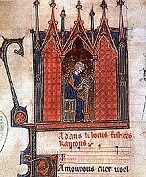
1262 On Mar. 8 the citizens of the free imperial city of Strasbourg win a battle against their bishop at the Battle of Oberhausbergen, winning their freedom from episcopal authority; meanwhile the Jews in nearby Hagenau get Richard IV to specially confirm their privileges in a new city charter, which reads: "We desire and ordain that the Jews of Hagenau, serfs of our imperial chamber, according to our letters patent, be subject only to our chamber and our orders. No one may subject them to uncustomary service, or transgess our law without incurring our disfavor". On July 14 Richard de Clare, 5th earl of Hertford (b. 1222) dies in Waltham, Canterbury after clearing the Welsh rulers from the W valleys of Glamorgan as far as the Rhondda River, allowing Llywelyn Ap Gruffydd to move up the Usk River Valley, capture the Brecon lands of Humphrey de Bohun, guardian of de Clare's young heir all the way to the N edge of Glamorgan, and start a push giving him mastery of most of modern-day Wales except the S coastal plain. Iceland loses a 50-year civil war along with its independence to Norway when the latter's King Haakon IV the Old intervenes; Norway also annexes Greenland (until 1397). The Christians siege Niebla, Spain, and the Moors use cannon again (first time 1248). Hulagu Khan returns and masses his armies to attack the Mamluks to avenge the 1260 D at Ain Jalut, but is drawn into a civil war with Batu Khan's brother Berke (Birkai) Khan (-1266), leader of the combined Blue and White Hordes, a Muslim convert who wants to avenge Hulagu's sack of Baghdad and allies with the Mamluks, becoming the first Mongol civil war, ending their unity; his gen. Nogai ("dog") Khan (Isa Nogai) (-1299) (great-great-grandson of Genghis Khan) begins raiding Hulagu's territories; meanwhile Hulagu sends an embassy to "all kings and princes overseas" led by his secy. Rychaldus (Richardus) to strike a Franco-Mongol Alliance against the Mamluks, but King Manfred of Sicily, who is allied with the Mamluks against Pope Urban IV intercepts and returns him; on Apr. 10 Hulagu sends a letter to French king Louis IX via John the Hungarian offering an alliance, promising them Jerusalem in return for sending a fleet to Egypt, but it either doesn't arrive or isn't answered, although John does reach Pope Urban IV, who next year sends the letter Exultavit cor Nostrum to Hulagu, telling him that Latin Jerusalem patriarch William II of Agen will investigate his desire to be baptised as a Christian via a papal rep. Alexander Nevsky convinces the Tartars to reduce tributes and eliminate conscription. Aching William II de Villehardouin of Achaea is released from captivity by the Byzantine emperor after handing over his key fortresses of Monemvasia and Mistra, leaving him with little power. Prince Dmitri of Novgorod sieges, captures, and destroys Tartu, Estonia, but fail to capture the Bishop's Fortress, allowing the inhabitants to build a 2km stone wall around it that becomes a refuge for German merchants and artisans. Norwegian King Haakon IV sends a gift-bearing envoy to the Muslim sultan of Tunis, who reciprocates. Siena, Italy passes a death penalty for homosexuals. Sports: The Russian word "shakmatny" (mate of the shah) (checkmate) for chess is coined. Music: Adam de la Halle (1237-88), Le Jeu de la Jeuillee; the first French operetta. Births: English adviser (bi?) Hugh le Despenser the Elder, Earl of Winchester, 1st Earl of Winchester (d. 1326) on Mar. 1; son of Hugh le Despenser II (1223-65); father of Hugh le Despenser the Younger (1286-1326); created earl in 1322. Hungarian king (1272-90) Ladislaus (Ladislas) (Laszlo) IV the Cuman (d. 1290) on Aug. 5; son of Stephen V (1239-72) and Elizabeth of the Cumans. Deaths: English knight Richard de Clare, 5th earl of Hertford (b. 1222) on July 14 in Waltham, Canterbury (poisoned by Piers of Savoy?).

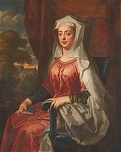
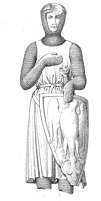
1263 Civil war brews in England as the barons' party arms itself against the king's party, which is aided by Pope Urban IV. The last Norse invasion of Scotland? On July 11 the 120-ship Norwegian leidang (lething) fleet sails W to attack Scotland over control of the Hebrides, and enters the Firth of Clyde in Sept. after doing a little plundering along the way; part of the fleet is then sent to Loch Lomond to plunder Lennox and Menteith, while the main body anchors off Little Cumbrae Island and Largs; too bad, on Sept. 30 a storm wrecks four Norwegian ships, and when Haakon IV himself lands with a small force to salvage the wrecks on Oct. 2, Alexander III's testy Scots arrive, led by Alexander Stewart of Bute and Cowal, 4th High Steward of Scotland (1214-83) fight the Battle of Largs around the mouth of the Gogo Water, forcing the Norsemen back into their ships with small losses, retreating to Orkney on Oct. 29, where they over-winter, after which a delegation of Irish kings invites Haakon to help them rid Ireland of the stankin' English settlers as their new high king, which he declines; on Dec. 16 Haakon IV (b. 1204) dies at the bishop's palace in Kirkwall, and his son Magnus VI (the Law-Mender) (Lagabote) (1238-80) becomes king of Norway (until May 9, 1280), while the Scots push their advantage to force him to give up the Hebrides, and within three years all Viking lands are returned to Alexander, although many Viking families continue to live there, mixing with Scottish clan families moving in. On July 20-24, the Disputation of Barcelona sees Spanish king (1213-76) James I of Aragon host a debate about whether Jesus Christ was the Messiah, featuring Dominican friar (Sephardic Jewish convert) Pablo Christiani (nee Saul) and Spanish Kabbalist Rabbi Nachmanides (Nahmanides) (1194-1270) (Rabbi Moses ben Nachman) (Ramban), who insists that Torah passages claimed by Christians to predict the coming of a Messiah only speak of "Israel/Jacob my servant", meaning the Jewish people as a whole, and never predicted any kind of divine being, with the soundbyte: "I it seems most strange that... the Creator of Heaven and Earth resorted to the womb of a certain Jewish lady, grew there for nine months and was born as an infant, and afterwards grew up and was betrayed into the hands of his enemies who sentenced him to death and executed him, and that afterwards... he came to life and returned to his original place. The mind of a Jew, or any other person, simply cannot tolerate these assertions. If you have listened all your life to the priests who have filled your brain and the marrow of your bones with this doctrine, and it has settled into you because of that accustomed habit, then if you were hearing these ideas for the first time, now, as a grown adult, you would never have accepted them"; Ramban wins the debate and is awarded 300 gold coins by the king, who attends the Sinagoga Major and addresses the Jewish congregants, pissing-off the Christian pop., causing Ramban to go into exile in Palestine; Friar Christiani goes on to campaign against Judaism and beg the king and later Pope Clement IV to ban the Talmud, and get French king Louis IX to enforce the canonical edict requiring Jews to wear special badges. On Nov. 14 grand prince (since 1236) Alexander Nevsky (b. 1220) dies in the town of Gorodets on the Volga River on his way back home from the Golden Horde, and his son Dmitri Alexandrovich (1250-94) becomes grand prince of Vladimir and Novgorod (until 1293) - kissing Mongol foot like his daddy did? Hulagu attempts to invade N of the Caucasus, and suffers a severe defeat. The Battle of Makryplagi (Makry Plagi) is a decisive V for the Latin Principality of Achaea over the Byzantine Empire. The Teutonic Knights are relieved of their vow of poverty by Pope Urban IV - so they will have another reason to kick Orthodox Russian butt and get even for Nevsky? Guy I dies, and his Greek-speaking Herodotus-quoting son John I de la Roche (d. 1280) becomes the last Latin lord of Athens (until 1280). Count (since 1245) Boniface (b. 1245) dies without heirs, and his uncle Peter II "the Little Charlemagne" (1203-68) becomes count of Savoy (until May 15, 1268). Thuringia and Hesse no longer such a big Meissen? Henry III the Illustrious of Meissen finally ends his war with Sophie of Thuringia (begun 1247), and cedes Hesse to her son Henry (Heinrich) I the Child (1244-1308), who becomes the the first male landgrave of Hesse (until Dec. 21, 1308); the landgraviate of Thuringia (sans Hesse) is inherited by the House of Wettin. The great number of appeals to Rome by victims, er, defendants of the Inquisition cause inquisitors gen. to be appointed in Provence, soon followed by territories throughout C-S Europe - the answer is always no? The Polos travel with a Tatar embassy to Kublai Khan's Mongol court in Shangtu (Xanadu). Balliol College at Oxford U. is founded with guidance from the bishop of Durham by Devorguila (Devorguilla) of Galloway (1210-90) and her husband (since 1223) John I de Balliol (Baliol), 5th Baron de Balliol (-1268), parents of future Scottish king John I Balliol; alumni are known for possessing "the tranquil consciousness of an effortless superority", and incl. economist Adam Smith, PM Harold McMillan, and PM Edward Heath. Births: Islamic Sunni fundamentalist scholar (godfather of Wahhabism) Taqi (Taqiyy) ad-Din Ahmad ibn Taymiyyah (d. 1328) on Jan. 22 in Harran, Turkey. Deaths: Savoy count (1253-63) Boniface (b. 1245). Norwegian king (1217-63) Haakon IV (b. 1204) on Dec. 16 in Kirkwall, Orkney. Russian grand prince (1246-63) St. Alexander Nevsky (b. 1220) on Nov. 14 in Gorodets.






1264 The Second Barons' War begins (ends 1267); Henry III and his son Prince Edward fight Henry III's French-born brother-in-law Simon de Montfort, 6th Earl of Leicester, 1st Earl of Chester (1208-65) ("Father of the English Parliament") (son of a famous Albigensian Crusader), resulting in the first elected English Parliament; Rochester Castle, held by royal constable Sir Roger de Leybourne (1215-71) is sieged by Montfort and Gilbert "the Red" de Clare, 7th Earl of Gloucester, 6th Earl of Hertford (1243-95), who raise the siege after a week when Henry III arrives; in Apr. a massacre of Jews in Canterbury, England is led by "Red" Gilbert de Clare. In spring Scottish ambassadors to Magnus VI are rebuffed, causing a Scottish fleet from Galloway to invade the Isle of Man in the summer, and its king Magnus Olafsson (-1265) to submit personally to Alexander III of Scotland. On May 20 Conrad IV dies, and Pope Innocent IV accepts his 12-y.-o. son ("beautiful as Absalom, and speaks good Latin") Conradin (1252-68) as king of Sicily, after he had offered it to Richard of Cornwall, brother of Henry III of England, then Charles of Anjou, then Edmund, son of Henry II of England, who all turn it down for fear of Conrad IV and Manfred; Manfred doesn't like the choice of Conradin and defeats the pope's troops in the Battle of Foggia on Dec. 2. On June 18 the earliest known Irish parliament is held at Kilkea Castle near Castledermont, County Kildare, attended only by prelates and magnates. On Oct. 2 Pope (since 1261) Urban IV dies after instituting the Feast of Corpus Christi; the Mass and the Office are composed by St. Thomas Aquinas. On Oct. 9 after the Muslim pop. surrenders in 1261 after a mo.-long siege, then rebels, Castile captures Jerez (Xerez) de la Frontera, which after the 1492 conquest of Granada becomes one of the most prosperous cities in Andalusia, trading with the ports of Cadiz and Seville, going on to export Sherry fortified wine, which was first produced after the Moors conquered the area in 711 and introduced distillation. On Nov. 16 emperor (since Sept. 17, 1224) Song Li Zong (b. 1205) dies, and on Nov. 16 his nephew Song Du Zong (Zhao Qi) (nee Zhao Mengqi) (1240-74) becomes Nan Song emperor #6 of China (until 1274), going on to face Mongol incursions while indulging in wine and women and leaving affairs to his incompetent minister Jia Sidao (Shixian) (1213-75); each morning all the babes he's bedded have to come pay their respects, and their number soon mounts to 30? Kublai Khan relocates his Mongol capital to Chungto (modern-day Beijing), renaming it Khanbalik (Cambaluc) ("city of the great khan") (until 1368) - did he a stately pleasure dome decree? Emperor Michael VIII Palaelogus sends 50 ships to attack the Venetians in Acre, pissing them off and causing them to attack their Genoese rivals in Tyre, only to give up when reinforcements arrive. Merton College at Oxford U. is founded by Walter de Merton (1205-77), bishop of Rochester and former chancellor to Henry III and Edward I, becoming the first modern college with its self-governing org., with instruction within its walls, going on to become a center for scientific studies, esp. mechanics, nurturing Roger Bacon, Thomas of Bradwardine, Robert Grossteste, Richard Swineshead, et al., and serving as a model for future colleges at Oxford and Cambridge - yah, baby? Architecture: The grave of St. Dominic (b. 1221) proving very popular with pilgrims, Nicola (Niccola) Pisano (1220-78) is commissioned by the Dominicans to design the Arca (Shrine) of St. Dominic in Bologna, Italy; as work progresses and the pilgrims keep a-comin' and pilin' on the bologna, it is systematically improved and adorned until 1768. Nonfiction: Thomas Aquinas (1225-74), Summa Contra Gentiles (1258-64); written at the urging of Dominican gen. Raymond of Penafort; attempts to reason Muslims out of their infidelity between 5x-daily prayers and holy murders, admitting that Christianity cannot be proved by reason but requires faith in the Hebrew and Greek Christian scriptures, but pointing out that it conquered Rome and Europe mainly by persuasion incl. belief in Jesus' miracles, while Islam did it by violence and the preaching of pleasure, with the soundbyte that Muhammad "seduced the people by promises of carnal pleasure to which the concupiscence of the flesh goads us. His teaching also contained precepts that were in conformity with his promises, and he gave free rein to carnal pleasure", adding: "In all this, as is not unexpected, he was obeyed by carnal men... As for proofs of the truth of his doctrine, he brought forward only such as could be grasped by the natural ability of anyone with a very modest wisdom. Indeed, the truths that he taught he mingled with many fables and with doctrines of the greatest falsity"; convinced of the intellectual weakness of Islam's contentions, Aquinas argued: "No wise men, men trained in things divine and human, believed in him from the beginning", and his followers "were brutal men and desert wanderers, utterly ignorant of all divine teaching, through whose numbers Muhammad forced others to become his followers by the violence of his arms"; "Mohammad said that he was sent in the power of his arms, which are signs not lacking even to robbers and tyrants"; he concludes that Muhammad's Islam is merely another Christian heresy, which "perverts almost all the testimonies of the Old and New Testaments by making them into fabrications of his own, as can be seen by anyone who examines his law", and it was "a shrewd decision on his part to forbid his followers to read the Old and New Testaments, lest these books convict him of falsity"; "It is thus clear that those who place any faith in his words believe foolishly." Roger Bacon (1214-94), De Computo Naturali; astronomical work. Births: Scottish prince and heir apparent Alexander (d. 1284) on Jan. 21 in Jedburgh; son of Alexander III and Margaret of England; brother of Margaret Dunkeld (1261-83) and David (1272-81). Deaths: French Dominican scholar Vincent of Beauvais (b. 1190). Chinese Song emperor #14 (1224-64) Li Zong (b. 1205) on Nov. 16 in Lin'an, Zhejiang.
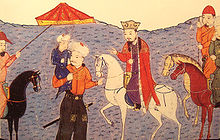




1265 On Feb. 5 Guido (Guy) le Gros (Guy the Fat) (Guy Foulques or Gui Foucois), son of French knight Foulquois is elected Pope (#182) Clement IV (1190-1268) (until Nov. 29, 1268); the must-kiss Fisherman's (Piscatory) Ring, cast in gold with the Pope's Latin name in raised letters around a bas-relief of St. Peter in a boat (Mark 1:17) is first mentioned in a letter by Clement IV to his nephew Peter Grossi; worn on the pope's 4th finger of the right hand, it is used as a signet to seal official papal documents (red wax for private correspondence, a bulla of melted lead for public documents, causing the use of the term "bull") until 1842; it is crushed upon the pope's death by the camerlengo (chamberlain). On Feb. 8 Mongol ruler (since 1256) Hulagu (b. 1217) dies on Shahi Island on Lake Urmia after conquering Persia, and is buried on Kaboudi Island in Lake Urmia, his funeral featuring human sacrifice; his son Abaqa (Abagha) ("paternal uncle") Khan (1234-82) succeeds as Ilkhanate ruler #2 (until 1282) and establishes the initially Buddhist Mongolian Ilkhanid (Il-Khanid) Dynasty in Persia, Iraq, and much of Anatolia (ends 1336), ruling as ilkhan (viceroy) #2 (until 1282), with capital initially at Maragha (Maragheh) (Maraghe) in Azerbaijan, later moved to Tabriz; much of his reign is consumed in civil wars with other Mongols of the N khanate and an invasion of Syria; the Persian Islamic bureaucracy is used to extort taxes from the pop.; the Mongol "holocaust" permanently turns agricultural land to pastoral use, and settles large numbers of Turks in NW Iran (Azerbaijan); the Jews worm their way into the admin. until the anti-Jewish riots of 1291. On May 14 a bunch of pissed-off barons (angry at the rejection of the Provisions of Oxford), led by Simon de Montfort, 6th earl of Leicester (Henry III's brother-in-law) surprises the king's army (assisted by Sir William Sinclair under orders of Alexander III of Scotland), and wins the Battle of Lewes in Sussex, captures Henry III and Prince Edward, and assumes control of the govt., summoning two knights from each shire, and two burgesses (reps.) from each county, city, and borough to a central assembly, becoming the first time that the English middle class has a say in govt., and the birth of the modern British Parliament (c. 1240 the Great Council of the knights of the shire was called parliament, but non-knights were not allowed); on May 15 the Mise (Pact) of Lewes, a return to the reforms of 1258 is agreed on, with a baronial council of nine taking the place of the former council of 15; on June 22 Welsh prince Llywelyn the Last signs the pip-pip Treaty of Pipton with Simon de Montfort, recognizing Welsh independence in return for a 30K-mark payment; too bad, the barons don't like being ruled by a transplanted Frenchie, and the earl of Gloucester flops, helps Prince Edward escape, and together they gather a vastly superior force and defeat ever-sham Simon de Montfort and his barons on Aug. 4 at the Battle of Evesham in Worcestershire; Simon is KIA, Henry III is released and resumes his reign, but Prince Edward is really in control; the baronial govt. and its acts are thrown out, and Edward's attempt to take vengeance prolongs the resistance for two years. Bela IV of Hungary and Ottokar II of Bohemia begin a series of wars (until 1270). Louis IX permits his younger brother Charles of Anjou to accept the crown of Sicily, dragging France into Italian problems, starting with newly-minted Charles I of Anjou (Naples) (1226-85) coming with a large army to Rome, where he is crowned next Jan. 5 as Charles I of Naples and Sicily or the Two Sicilies (Charles of Anjou and Provence); Manfred shakes in his boots. Magnus Olafsson of Man dies, and Alexander III annexes his kingdom, then sends his Scottish fleet around the Hebrides getting rid of Norwegian sympathizers. Italian #1 Roman Catholic theologian Thomas Aquinas ranks sodomy second to murder in sinfulness - you're killing his little angels in your Hell? Architecture: Nicola Pisano designs the pulpit of the Siena Cathedral (finished 1268). Inventions: Franco of Cologne and Pierre de la Croix develop Musica Mensurata (measured music), the musical form of the motet. Nonfiction: Thomas Aquinas (1225-74), Summa Theologica (Summa Totius Theologiae Tripartita) (3 parts) ("On God", "On Man's Moral Life", "On Christ") (1265-73) ("Credo ut intelligam"); synthesizes the works of Aristotle and his followers Averroes, Avicenna et al. with those of Church Fathers St. Augustine et al., and absorbs the teachings of Jewish thinkers Moses Maimonides, Avicebron et al.; contains the pure ambrosia of Roman Catholic Systematic Theology, which ends up capturing the Church's heart to modern times; "Sciences are distinguished by the different methods they use. For the astronomer and the physicist both may prove the same conclusion, that the earth, for instance, is round. The astronomer proves it by means of mathematics, but the physicist proves it by the nature of matter"; discusses the concept of a just price; too bad, the 3rd part is left unfinished?; "If therefore angels are not composed of matter and form, as was said above, it follows that it would be impossible to have two angels of the same species... The motion of an angel can be continuous or discontinuous as it wishes... And thus an angel can be at one instant in one place, and at another instant in another place, not existing at any intermediate time." Nonfiction: Kirakos Gandzaketsi (1200-71), The Journey of King Hetoum of Little Armenia to Mongolia and Back (May 19, 1241-1265); a history of Armenia from the 4th to 12th cent. C.E., becoming a primary source for the Mongol invasions and the first recorded word list of the Mongolian language; becomes a hit and is trans. into many languages - so what about you, Goldilocks, what do you fantasize about? Births: Japanese Yamato emperor #92 (1287-98) Fushimi (Hirohito) (d. 1317) on May 10; 2nd of Go-Fukakusa (1243-1304). Italian Roman Catholic Thomist Beatrice-worshiping "Divine Comedy" poet ("Father of the Italian Language") Dante (Durante) Alighieri (d. 1321) on May 14 in Florence; one of the "three fountains" along with Petrarch and Boccaccio; father Alighiero is a White Guelph, and mother is Bella degli Abati, who dies when he is 7-y.-o., after which he marries Lapa di Chiarissimo Cialuffi, who bears Dante's brother Francesco and sister Tana (Gaetana). Spanish king of Aragon and count of Barcelona (1285-91) Alfonso III (the Liberal) (the Free) (d. 1291); son of Peter III of Aragon (1239-85) and Constantia of Sicily (1249-1302) (daughter of Manfred of Sicily); great-grandson of Amadeus IV of Savoy. Hungarian king Andras III (d. 1301). Deaths: English wannabe Simon de Montfort, 6th earl of Leicester (b. 1208) on Aug. 4 in Evesham (KIA). Mongol ruler (1251-65) Hulagu Khan (b. 1217) on Feb. 8.

1266 On Jan. 6 Charles I of Anjou (1227-85), younger brother of Louis IX of France is crowned king of the Two Sicilies (Naples and Sicily) at St. Peter's in Rome; on Feb. 26 he defeats and kills King Manfred (b. 1232) at the Battle of Benevento in Campania; Naples opens its gates, he seizes Sicily, and the Angevin Dynasty is founded in Sicily, ending control by the Hohenstaufens (begun 1194); Charles I moves the capital from Palermo to Naples, residing at the Castel_Nuovo; too bad, the godfathers of Sicily don't like them, and plot to oust them from the island (1284). The Treaty of Perth cedes the Isle of Man and the Hebrides from Norway to Scotland for 4K marks and an annual tribute of 100 marks; only Orkney and the Shetland Islands remain Norwegian; Scottish power now extends to the Irish Sea; the new acquisitions are given to infant heir Prince Alexander (1264-84) as an appanage. Hamburg, Germany secures an imperial charter. Niccolo Polo and Maffeo Polo travel to Constantinople. Guillaume de Gisors (1219-1307) succeeds Marie de Saint-Clair as grandmaster of the Priory of Sion (until 1307) :). Inventions: The Bakers Marking Law requires English bakers to begin marking loaves of bread to identify the source of bad bread, becoming the first use of trademarks. Births: Italian Dante's babe and beau ideal Beatrice "Bice" di Folco Portinari (1266-90) in Florence; daughter of Folco di Ricovero Portinari; Dante meets her in 1274 at age 9 and falls in love with her for life, but never gets past the batter's box, and after she marries banker Simone dei Bardi in 1277 at age 24, and he marries in 1285, he immortalizes her in his "Vita Nuova", and in his "Divine Comedy" as the guide to the Beatific Vision in Paradise - I stick with it cause I like it? Deaths: Swedish statesman Birger Jarl (b. 1210) on Oct. 21. Crusader count John of Ibelin (Jaffa) (b. 1215) in Dec. in Jaffa; leaves the Livre des Assises, the longest legal treatise from the here-and-gone Kingdom of Jerusalem. Sicilian king (1258-66) Manfred of Sicily (b. 1232) on Feb. 26 (KIA).
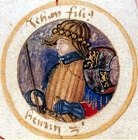

1267 On May 24-27 William II of Villehardouin, prince of Achaea and his former Latin lord Baldwin II of Constantinople acknowledge Charles I of Naples (Sicily) (Anjou) as lord of Achaea in the Treaty (Treaties) of Viterbo, transferring most of the rights of the defunct Latin Empire of Constantinople to him. On Nov. 19 the Statute of Marlborough makes permanent the reforms embodied in the Provisions of Westminster, which is all that remains of the baronial reforms; it survives to modern times as the oldest piece of British statute law not completely repealed; the English Civil War (begun 1257) ends. After making an alliance with Baybars last year, who reneges on a promise of some troops, the Genoese attack Acre, capture the Tower of Flies and blockade the harbor for 12 days before being kicked out by the Venetians. Charles I of Anjou is appointed vicar-gen. of Tuscany, and podest (magistrate) of Florence. Prince Llewelyn the Last signs the Treaty of Montgomery with Henry III of England, winning formal recognition of his enlarged principality of North Wales (all of Wales outside the marches) in return for homage and a tribute of 25K marks, payable 3K a year. John I "the Victorious" (1252-94) becomes duke of Brabant (until May 3, 1294), becoming one of the top feudal princes of his day, fathering many illegitimate children. The Polos travel to Kublai Khan's capital of Kaifeng; Kublai Khan moves his winter capital to Yanjing, where he begins building Khanbalig (Cambuluc) (Peking/Beijing). The Muslim revolt in Andalusia ends. Portugal fixes its border with Castile. Exiled Spanish Kabbalist Rabbi Nachmanides (Nahmanides) (1194-1270) (Rabbi Moses ben Nachman) (Ramban) makes aliyah to Jerusalem and reports that after persecution by the Khwarezmian Tatars there are only two Jewish families left living there, with the soundbyte: "Many are its forsaken places, and great is the desecration. The more sacred the place, the greater the devastation it has suffered. Jerusalem is the most desolate place of all. ... There are ten men who meet on the Sabbaths they hold services at their home. ... Even in its destruction, it is an exceedingly good land"; he immediately founds the Ramban Synagogue in a deserted house in the Jewish Quarter on Mount Zion, which becomes a center of Jewish life, attracting immigrants; ' he goes on to declare it to be obligatory for Jews to make aliyah to Jerusalem, and that peaceful coexistence with Christians and Muslims has its limits, with the soundbyte: "For we were enjoined to destroy those nations if they make war upon us. But if they wish to make peace, we shall make peace with them and let them stay upon certain conditions. But we shall not leve the land in their hands or those of any other nation at any time whatsoever." The Council of Vienna forces Jews to wear the pileum cornutum (a cone-shaped headdress) in addition to a special badge, and forbids Jewish physicians to treat Christians, which doesn't stop Christian popes (Boniface VIII), kings (James I of Aragon, Ferdinand II and Isabella I), monasteries, nunneries et al. from employing them. The Assize of Bread and Ale in England is the first law in England regulating the production and sale of food; to avoid being punished for selling a short-weight loaf, bakers add a 13th loaf to a dozen, becoming known as a baker's dozen; the law is amended in 1822 and 1836 before being repealed in 1863; the Worshipful Co. of Bakers in London enforces the regulations, while brewers are saddled with taxes by the govt., which closely regulates the industry. Goldsmith and tailor guilds fight each other in fierce street battles in London, England. Nonfiction: Roger Bacon (1214-94), Opus Majus (Great Work); an encyclopedic work on experimental science, math, optics, and philosophy, coining the word "almanac" (Arab. "al manakh" = the weather), giving a recipe for gunpowder (41.2% saltpeter, 29.4% charcoal, 29.4% sulfur) (Pt. VI), predicting powered flight, proposing that one day be dropped from the Julian Calendar every 125 years, and containing the soundbyte (Pt. IV): "The sea between the end of Spain on the west and the beginning of India on the east is navigable in a very few days if the wind is favorable", later inspiring Columbus; it concludes with a warning that science cannot save mankind, but that "The science of morality is the mistress of every department of philosophy"; he didn't invent gunpowder, just repeated a formula he got from others - whether they're ground in, smeared on, or powdered, it doesn't matter, that's the power of Gunbarrel Clean? Poetry: Konrad von Wurzburg (1225-87), Der Welt Lohn; Heinrich von Kempten. Births: Japanese Yamato emperor #91 (1274-87) Go-Uda (d. 1324) on Dec. 17; 2nd son of Kameyama (1249-1305). Florentine painter-sculptor-architect ("father of European painting") ("first of the Italian masters") Giotto di Bondone (d. 1337) in Vespignano 14 mi. from Florence; studies under Cimabue; designer of the campanile of the Florence Duomo; breaks away from the stiff medieval style and shows facial emotions on people?; Michelangelo uses him as the foundation of his work? Spanish king of Sicily (1285-96), king of Aragon and Valencia and count of Barcelona (1291-1327), and king of Sardinia and Corsica (1297-1327) James II (the Just) (d. 1327) on Aug. 10 in Valencia; 2nd son of Peter III of Aragon (1239-85) and Constance of Sicily (1249-1302).


1268 With pesky John of Ibelin (d. 1266) out of the way, Sultan Baybars of Egypt captures and destroys the ancient city of Jaffa, then in May conquers Lesser Armenian-held Antioch and compels the pop. to embrace Islam, causing the Patriarchs of Antioch to permanently leave the city and take up residence eventually (1366) in Damascus; after learning that Count Bohemond VI left Antioch before he arrived, Baybars writes a letter to him, with the>soundbyte: "You would have seen your knights prostrate beneath the horses' hooves, your houses stormed by pillagers and ransacked by looters, your wealth weighed by the quintal, your women sold four at a time and bought for a dinar of your own money! You would have seen the crosses in your churches smashed, the pages of the false Testaments scattered, the Patriarchs' tombs overturned. You would have seen your Muslim enemy trampling on the place where you celebrate the Mass, cutting the throats of monks, priests and deacons upon the altars, bringing sudden death to the Patriarchs and slavery to the royal princes. You would have seen fire running through your palaces, your dead burned in this world before going down to the fires of the next, your palace lying unrecognizable, the Church of St. Paul and that of the Cathedral of St. Peter pulled down and destroyed; then you would have said, 'Would that I were dust, and that no letter had ever brought me such tidings!'" On Aug. 23 after 16-y.-o. Conradin (b. 1252) tries to reclaim Sicily, Charles I of Anjou, aided by 400 Achaean knights under his new vassal William II defeats him and his polyglot Italian, Spanish, Roman, Arab, and German army at the Battle of Tagliacozzo in L'Aquila Province, Italy, then captures and executes him in Naples on Oct. 29, ending German Hohenstaufen rule of Sicily (begun 1194); Conradin plays a last game of chess before being permanently mated?; the Anjevin Dynasty secures the papacy against the imperial threat in both N and S Italy until 1343. On Nov. 29 Pope (since 1264) Clement IV dies after reorganizing the Sorbonne in Paris as a theological school, and the papal throne remains vacant for three years (until 1271) as the cardinals of the Conclave of Viterbo diddle around until the townspeople lock them up in the palace where they are staying and put them on a diet of bread and water. Another war between Serbia and Dubrovnik ends in a treaty, with Dubrovnik required to pay an annual tribute for the next cent., freeing Stefan Uros I of Serbia to invade Hungarian territory S of the Danube River in Macva (N of Seria), during which Stefan is captured and forced to pay ransom and marry his son Stefan Dragutin to Catherine (Katalin), daughter of future Steven V of Hungary. After being forced to resign his position as archbishop of Lyons (since 1245), and marrying Countess Palatine Adelaide of Burgundy last June 12, Philip I (1207-85) becomes count of Savoy (until Aug. 16, 1285); in 1272 he acquires the County of Bresse, while fighting a coalition composed of King Rudolph I, Charles of Anjoy, the Counts of Geneva, and the French dauphin. Thomas Aquinas returns to Paris, and immediately gets involved in the controversy caused by philosopher Siger de Brabant (1235-81), a popularizer of Muslim philosopher Averroes at the U. of Paris from 1266-76, whose commentaries on Aristotle upset followers of St. Augustine, who taught that the search for truth shouldn't be based on sense experience, and instead begin to believe that empirical knowledge rules - are you for real? The quaint seaport of Calvi in NW Corsica is founded by the Genoese. In 1286 French king Louis IX enacts enacts beer purity laws, mandating that only "good malt and hops" be used in beer brewing; by the 1300s hops are also used in the Netherlands. Architecture: After occuping the N of Glamorgan, English knight Sir Gilbert "the Red Earl" de Clare, 6th Earl of Hertford, 7th Earl of Gloucester, 3rd Lord of Glamorgan, 9th Lord of Clare (1243-95) begins Caerphilly Castle (Castell Caerffili) in Senghenydd in S Wales (largest in Britain after Windsor Castle)to hold off Welsh prince Llywelyn the Last, bottling him up to the N; after being burnt by Llywelyn in 1270 it is finished in 1290, introducing concentric castle defenses to Britain, along with large gatehouses. Births: French Capetian Babylonian Captivity king (1285-1314) ("the Pest of France" - Dante) Philip IV (Le Bel) (the Fair) (the Handsome) (d. 1314) in Apr.-June in Fontainebleau; son of Philip III (1245-85) and 1st wife Isabella of Aragon (1247-71); husband of Jeanne (Joan) I of Navarre (1273-1305); father of French brother-kings Louis X (1314-16), Philip V (1316-22), and Charles IV (1322-8), and the "She-Wolf of England" Isabelle (1295-1358), who marries Edward II and produces the line of English kings of Edward III, (John of Gaunt), Henry IV, Henry V, and Henry VI. Norwegian king (1280-99) Eric (Erik) II Magnusson (the Priest-Hater) (d. 1299); son of Magnus VI (1238-80) and Ingebord Ericsdatter (daughter of Eric IV of Denmark), descendant of Olav II. Monaco Grimaldi prince #1 (1297-1301) Rainier I, Lord of Cagnes (d. 1314); father of Charles I (-1357). Deaths: Savoy count (1203-68) Peter II (b. 1203) on May 15 in Chateau de Chillon (Pierre-Chatel?). German Hohenstaufen king of Sicily (1254-8, 1268) Conradin (b. 1252) on Oct. 29 in Naples (executed). English lord John de Balliol, 5th Baron de Balliol (b. ?) on Oct. 25; leaves an endowment for Balliol College at Oxford. English ecclesiastic-jurist Henry de Bracton (b. ?); chancellor of Exeter Cathedral since 1264.



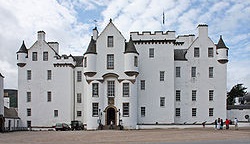
1269 In Feb. the Mongols build a fortress E of the Han River to block the water supply, then siege the walled cities of Xiangyang and Fancheng in Hubei Province, the last two strongholds of the Nan Song (until 1273); both sides use explosives in the fighting (first time in history?). Hethrourn I the Great dies, and Levon (Leon) III (1236-89), son of Hetum I becomes ruler of Lesser Armenia (until 12389). Ottokar II takes advantage of the interregnum in the German Empire to acquire Istria, Carinthia and Carniola from Hungary. The Almohad Dynasty in Africa ends. The Polos return from the court of Kublai Khan with a letter from him to the pope; meanwhile after Kublai Khan commissions Tibetan monk Tibetan monk Drogon Chogyal Phagpa (1235-80) to develop a new writing system for Mongol (Yuan) China, he develops the 'Phags pa script, which becomes the empire's official writing system, replacing Chinese characters and the Old Uyghur alphabet; too bad, it isn't widely accepted and falls into disuse after the collapse of the Yuan Empire to the Ming Dynasty in 1368; Phagpa is rewarded with the title of imperial preceptor next year. Toll roads are introduced in England. Louis IX of France orders Jews to wear a purple badge. Louis IX founds the Order of the Ship and the Double Crescent (Sea Shell) for nobles who accompanied him on his ill-fated Seventh Crusade. John de Baliol, head of Barnard Castle in Scotland dies, and his widow Lady Devorguila begins carrying his embalmed heart in a small ivory casket, calling it her "sweet heart and silent companion", and instructing that it be placed on her breast in her coffin, becoming the origin of the term "sweetheart"? Architecture: The rebuilding of Westminster Abbey (in the new Gothic style) is begun by Henry III. Blair Castle near Blair Atholl in Perthsire, N Scotland between Edinburgh and Inverness is begun by John I Comyn, Lord of Badenoch (-1275), and taken over by David I Strathbogie, Earl of Atholl (-1270) while he is away on Crusade, becoming the ancestral home of Clan Murray and their chiefs, the dukes of Atholl; Queen Victoria later grants the dukes the exclusive privilege of maintaining a private army. Inventions: Petrus Peregrinus (Pierre Pelerin) de Maricourt (Peter the Pilgrim) pub. Epistola de Magnete, the first scientific treatise, describing his experiments with magnets, naming the north and south poles, formulating the law that poles of opposite polarity attract while poles of like polarity repel, describing experiments in magnetizing objects, along with his invention of the 360 degree compass, and a project to build a perpetual motion machine with self-regenerating magnets. Deaths: Italian #1 Lombard troubadour Sordello (Sordell) da Goito (Goit) (b. ?) near Goito, Mantua; mentioned in Dante's "Divine Comedy".

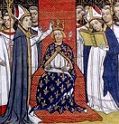




1270 By this time the German monarchs have been totally eliminated as a factor in Euro politics by the Capetian French monarchs, who have the wealthiest state in Europe, a stronghold in Sicily, a French party in the college of cardinals, and an adoring papacy. On May 3 Bela IV (b. 1206) dies (along with rival Stephen d'Este?), and his son (by wife Salome) Stephen V (1239-72) becomes a weak king of Hungary (until 1272); meanwhile Stephen has son Andrew III (d. 1301) by wife Tomasina Morosini, who waits in the wings (until 1290)? Margaret II of Flanders confiscates the property of English merchants, causing a devastating trade war with England, which supplies most of the wool for Flemish weavers. After Albertus Magnus successfully preaches a crusade in Austria, and at the insistence of Charles of Anjou, whom he made king of Sicily in 1265 and who has big Mediterranean ambitions, French king (since 1226) (St.) Louis IX (b. 1214) leads the Eighth Crusade (his 2nd), makes an ill-advised expedition to Tunis, and dies on Aug. 25 in Damietta of dysentery along with his son John Tristan; his army returns to France with his body, which is buried in Saint-Denis; he is succeeded by his pious but uneducated and bold (rash in judgment) son Philip III (the Bold) (the Strong) (1245-85) as Capetian king #10 (until 1285); Charles of Anjou takes over the Crusade, which fizzles; being uneducated but pious, Philip III ends up being dominated at various times by his mother Margaret of Provence (1221-95), his favorite valet Pierre de la Broce (Brosse) (-1278), his wife Mary of Brabant (1250-1321), and his uncle Charles I of Naples. On Aug. 10 Yekuno (Yikunno) Amlak (Tasfa Iyasus) (1270-85) deposes the last Zagwe king and becomes king of Ethiopia (until June 18, 1285), founding the modern Christian Solomonic Dynasty, claiming descent from King Solomon and the Queen of Sheba, and continuing the old Kingdom of Axum; he petitions the Egyptian sultan for a metropolitan for the Ethiopian Orthodox Church, but is snubbed, causing him to invite priests from Syria. Mamluk Sultan Baybars destroys the ancient city of Ashkelon (Ascalon) on the Mediterranean coast of Palestine; in the 16th cent. the Ottomans establish the Arab village of aj-Majdal a few km. inland. On Dec. 4 Theobald V (b. 1238) dies without an heir in Sicily while returning from the Eighth Crusade, and his younger brother Henry the Fat (1244-74) becomes count Henry III of Champagne and Brie, and king Henry I of Navarre (until 1274). Hetoum I the no-longer-great, rocked by his losses to the Mamluks abdicates and enters a monastery, and his son Levon (Leon) (Leo) II (1236-89) becomes king of Christian Lesser Armenia (Cilicia) (until 1289), continuing to keep the pesky Muslim Mamluk invaders out for his dear savior Christ. The War of St. Sabas (begun 1256) finally ends after 20K are killed on both sides, fatally weakening the Crusader states; even then, the Venetians don't give the Genoese their quarter of Acre back until 1288. The city of Rotterdam in S Holland on the Rhine-Meuse-Scheldt River Delta on the North Sea (modern-day pop. 635K/1.1M) is founded after a dam is built on the Rotte River; in 1340 it is granted city rights by the count of Holland; it goes on to become the 2nd largest city in the Netherlands after Amsterdam, home of Erasmus U. (1913). By this year there are univs. throughout Europe, incl. Cambridge, Oxford, Paris, Orleans, Toulouse, Palencia, Salamanca, Seville, Montpelier, Vicenza, Padua, Reggio, Bologna, Rome, Naples, Arezzo, and Salerno; later more univs. are founded in Coimbra, Lisbon, Valladolid, Huesca, Cerida, Cahors, Perpignan, Avignon, Grenoble, Angers, Vercelli, Pisa, Florence, Ferrara, Treviso, Perugia, Heidelberg, Cologne, Erfurt, Prague, Vienna, and Ofen. About this time Roger Bacon of England writes the soundbyte: "The philosophy of Averroes today obtains the unanimous suffrage of wise men." After turning against it for being authored by a pagan Greek, and transmitted to the West via Muslim Spain, Paris bishop Etienne Tempier (Stephanus of Orleans) (-1279) condemns Aristotelianism this year, and again in 1277, ending educational freedom in Paris; the part he most objected to was the idea that man shouldn't be content with authority alone as a means of acquiring certainty, but should believe nothing that isn't known in itself or can't be explained by known principles; ironically, Dominican big brain St. Thomas Aquinas brings Aristotle back as the official doctrine of the Roman Catholic Church. A law is passed in Paris outlawing people from throwing "waters" or "ordures" from upper story windows or face a fine - I am an island? Architecture: The Gothic Altneu (Old New) Synagogue in Prague is built. The Damascus Hospital is built, also housing mental patients. Kosice is named a royal free town by Stephen V, and the Gothic St. Elisabeth Cathedral is begun (finished 1468). The choir and cloisters of Westminster Abbey (begun 1245) are finished. Hever Castle 30 mi. S of London near Edenbridge, Kent is built, later becoming the childhood home of Anne Boleyn, and acquired in 1903 by William Waldorf Astor (1848-1919), who pumps it up and creates Tudor Village. Nonfiction: Thomas Aquinas (1225-74), On the Unity of the Intellect Against the Averroists; turns the tide against Siger de Brabant and the Averroists, causing the Church to back him and condemn them. Marcus Graecus (Mark the Greek), Liber Ignium ad Comburendos Hostes (Book of Fires for Burning Enemies); describes Greek fire and phosphorescence, and gives a recipe for gunpowder as 1 lb. of live sulfur, 2 lbs. of charcoal from a lime or willow tree, and 6 lbs. of saltpeter. Raymundus Martini, Pugeo Fidei; Spanish monk first uses the word "Jehovah". Peter of St. Omer, Liber de Colorius Faciendis; contains recipes for painting pigments, incl. the use of linseed oil for oil painting. Witelo (1230-1313), Perspectiva; work on optics based on Alhazen, containing speculations on psychology, nearly discovering the subconscious. Births: French Capetian king of Aragon (1284-1325), count of Valois (1284-1325), and count of Anjou and Maine (1290-1325) (founder of the House of Valois) Charles of Valois (d. 1325) on Mar. 12; 3rd son of Philip III (1245-85) and Isabella of Aragon (1247-71); brother of Philip IV the Fair (1268-1314); father of Philip VI (1293-1350); uncle of Louis X, Philip V, and Charles IV. Scottish conservative Franciscan scholastic philosopher-theologian ("Doctor Subtilis") (Lat. "cunning linguist, er, teacher") John (Johannes) Duns Scotus (d. 1308) (b. 1265/6?) in Duns, Berwick County, Scotland; teaches in Paris, Cologne, and Oxford, gaining a rep for his dialectic skill in defending the doctrine of the Immaculate Conception, causing the Roman Catholic Church to adopt it; his followers are called Dunsmen, Dunses or Duncemen, and as they come to resist the revival of classicism and progressive forms of learning, esp. Renaissance humanism, and "rage in every pulpit" in an obstructionist fashion, the term "dunce" is coined - the original Mel Gibson, or his daddy? Scottish noble John III "Black" Comyn, Lord of Badenoch (d. 1306). Norwegian king (1299-1319) Haakon V Magnusson (d. 1319); son of Magnus VI the Lawmender (1238-80) and Ingeborg of Denmark (1244-87). Greek scholar-statesman Theodore Metochites (d. 1332) in Constantinople. Italian poet-jurist Cino da Pistoia (Guittoncino dei Sinibaldi) (d. 1337) in Pistoia; educated at the U. of Bologna; friend of Giovanni d'Andrea, Dante Alighieri (1265-1321), and Petrarch; dedicates his 200-odd lyric poems to his babe Selvaggia. Italin Franciscan theologian Michael of Cesena (Michele Fuschi) (d. 1342) in Cesena. French rector (U. of Paris) and political theorist Marsilius (Marsiglio) of Padua (d. 1342); champion of the Conciliar Movement for popular sovereignty in Europe. Italian canon law jurist Giovanni d'Andrea (Johannes Andreae) (d. 1348) in Mugello (near Florence); friend of Cino da Pistoia. Deaths: Spanish rabbi-physician Nachamanides (b. 1194) in Palestine. German poet-minnesinger Tannhauser (b. 1205). Hungarian-Croatian king (1235-70) Bela IV (b. 1206) on May 3. French king (1226-70) St. Louis IX (b. 1214) on Aug. 25 in Tunis (Damietta, Egypt?) (dysentery); last word: "Jerusalem"; canonized by Pope Boniface VIII in 1297; his holy mojo causes future French kings to line up in the Louie, Louie line. French count of Champagne (1253-70) Theobald V (b. 1238) on Dec. 4 in Trapani, Sicily. Sicilian-German princess Margaret of Sicily (b. 1241) on Aug. 8 in Frankfurt-am-Main.





1271 I'm just the muscle you muscleheads need? On Apr. 8 the impregnable Crusader stronghold Krak des Chevaliers (Crag of the Knights) in the Syrian desert 25 mi. W of Homs, guarding the road from Damascus to Tripoli and Jerusalem, "the most wholly admirable castle in the world" (Lawrence of Arabia), which had withstood 12 Saracen attempts finally falls after Mamluk Sultan Al-Zahir Baybars, leading an Egyptian army tricks the skeleton crew of monkish defenders by sending a carrier pigeon with a forged letter purportedly from the Grandmaster of the Hospitalers in Tripoli ordering them to surrender; Baybars gives the garrison free conduct to Tripoli amid his loud laughs; after hearing of this, Prince Edward I Longshanks (1239-1307) leads the (last) Ninth Crusade (ends 1272), taking his wife Eleanor of Castile along and winning Vs at Acre and Haifa, then trying to figure out how to take back their impregnable fortress without the carrier pigeon trick - the idea of a security backdoor is born too late? On Aug. 21 Count Alphonse of Toulouse and Poitiers (Poitou) (b. 1220), uncle of Philip III the Bold dies, bringing Languedoc under royal sway, and establishing the royal power in S France, incl. Carcassone and Aigues Mortes, giving access to the Mediterranean; new walls are ordered to be built. On Sept. 1 Teobaldo Visconti, archbishop of Liege is elected Pope (#183) Gregory X (1210-76); he is later beatified (no sainted popes since Gregory VII two cents. earlier). Kublai Khan officially proclaims the Great Yuan (Mongol) Dynasty (ends 1368); meanwhile the Polos begin their 2nd trip from Europe to Asia (ends 1275), accompanied by Niccolo Polo's 17-y.-o. son Marco Polo (the Younger) (1254-1324), stopping in Jerusalem to get oil from the lamp of the Holy Sepulchre as requested by Kublai Khan, sailing to the SE Turkish port of Ayas, then traveling E by caravan across the entire width of Asia through E Turkey (noting that Mt. Ararat is too hard to climb), Georgia and Azerbaijan (noting "a fountain from which oil springs in great abundance", which is good for burning but no good in a salad), Armenia (with 30 lb.-fat-tailed sheep), Persia (noting the cool soft Kerman "shals"), Badakhshan (seeing salt mined and rubies dug), then via camel along the S Silk Road through the Taklamakan Desert and Great Sand Sea (Gobi Desert) (noting sandstorms and mirages), visiting Balkh, the Pamir Plateau, Kashgar, Khotan, Lop Nor, Tangut, and Kanchow, homeland of the Mongols, finally reaching Chandu (Shangtu) (Xanadu), becoming the first Westerners in a generation to cross the Wakhan Corridor to China; during his visit to Baku, Azerbaijan on the shores of the Caspian Sea, he sees oil being collected from seeps, writing the soundbyte: "On the confines toward Georgine there is a fountain from which oil springs in great abundance, in as much as a hundred shiploads might be taken from it at one time. This oil is not good to use with food, but 'tis good to burn, and is also used to anoine camels that have the mange. People come from vast distances to fetch it, for in all the countries round there is no other oil." End of the Rus Rurik Dynasty (begun 862). Burma rejects Mongol demands for tribute. The Sorbonne adds the College de Calvi (Little Sorbonne) to give preliminary prep. in the humanities and philosophy. Inventions: Robert of England first correctly states the theory of the Pendulum Clock; a big one is built in a tower in Westminster in 1288, spreading to the Continent. Nonfiction: Roger Bacon (1214-94), Compendium Studii Philosophiae; unfinished ms. dissing nominalism in favor of realism; "A universal is nothing but the similarity of several individuals"; "One individual has more reality than all universals put together"; too bad, he also goes after the clergy, papacy, univs., and philosophers of his day, listing "36 great and radical defects", even going after Thomas Aquinas for pontificating on the angels, causing a conspiracy to silence him? Births: French queen (1285-1305) Jeanne (Joan) (Johanna) I of Navarre (d. 1305) on Jan. 14 in Bar-sur-Seine; daughter of Henri I the Fat of Navarre (1244-74) and Blanche of Artois (1248-1302); wife (1284-1305) of Philip IV (1268-1314); mother of Louis X (1289-1316), Philip V (1292-1322), Charles IV (1294-1328), and Isabelle of France (1295-1358). Bohemian king (1278-1305) and Polish king (1300-5) Wenceslaus (Wenceslas) II Premyslid (d. 1305) on Sept. 27; only son of Premysl Ottokar II (1230-78) and 2nd wife Kunigunda; father of Wenceslaus III (1289-1306). Deaths: Armenian historian Kirakos Gandzaketsi (b. 1200) in New Getik. Persian mystic Muslim humanist Haji Bektash Wali (b. 1200) in Anatolia. French duke of Burgundy (1218-71) Hugh IV (b. 1213) on Oct. 27.



1272 In June sultan (since Oct. 1260) Baibars of the Bahri Dynasty is so worried by the arrival of Edward I Longshanks at Acre that he makes an assassination attempt on him, getting him wounded in the arm with a poisoned dagger, which becomes so inflamed that his surgeon has to cut away the diseased flesh, causing his babe Queen Eleanor to be led from his bed "weeping and wailing; after concluding a 10-year truce with the Muslims, they leave Palestine in Sept., and reach Sicily in Dec., learning of Henry III's death. On July 19 Gouda in SW Holland (NE of Rotterdam) receives a charter, and begins making clay pipes. On Aug. 6 Stephen V (b. 1239) dies suddenly while trying to raise an army to rescue his kidnapped son (by wife Elizabeth of Kumania) Ladislas (Ladislav) (László) (Laszlo) IV (the Cuman) (1262-90), who becomes Arpad king of Hungary, who doesn't accede to the throne, then tries unsuccessfully to curb the power of the feudal aristocrats, his poor education not helping. On Oct. 27 Hugh IV (b. 1213) dies, and his 3rd son (with 1st wife Yolande de Dreux) Robert II (1248-1306) becomes duke of Burgundy (until 1306). Time won't let me wait that long? On Nov. 16 king (since Oct. 19, 1216) Henry III (b. 1207) dies after a 56-year reign, and his tall (6'2") (6'7"?), handsome (with a drooping left eyelid like his daddy), quick-tempered 33-y.-o. son (makes a dashing figure on his horse?) Edward I (Longshanks) (1239-1307) becomes king of England (the 29th English monarch) (until July 7, 1307) (everybody called him Longshanks, but never to his face?), the English Justinian, the first truly English king, an able ruler and great legislator surrounded by able ministers and lawyers and frequently consulting the knights and townsmen; his motto is "pactum serva" (keep troth); returning from the Crusades, he spends a year in Gascony (Basque-ony, old land of the car-door-ear Basques in SW France on the Bay of Biscay), and is not crowned until 1274; the permanent loss of Jerusalem ends the fantasy of it being the capital of Christendom, further solidifying European unity that was helped in 1453 by the loss of Constantinople. Sardinian king (since 1238) Enzo (b. 1218), illegitimate son of HRE Frederick II dies in Bologna (a prisoner since 1249), and along with him the Hohenstaufen line. Robert, 6th son of Louis IX of France marries Beatrix, descendant of Aimar (Adhemar), 9th cent. founder of the Bourbon family in France, based in Bourbon castle in the ancient Roman town of Aquae Borvonis; this marriage is used by their descendant Henry of Navarre in the 16th cent. to claim the French throne, after another line through them ends with Charles de Montpensier, duc de Bourbon. Thomas Aquinas leaves Paris for Naples to organize a new Dominican school. Scottish knight Robert Bruce, 6th Lord of Annandale (1243-1304) marries Marjorie Carrick, heiress of Earl Neil of Carrick, becoming the 2nd earl of Carrick and going on to have 11 children, incl. King Robert I the Bruce (b. 1274); too bad, he doesn't have royal consent to marry, causing her to temporarily lose her castle and estates until she pays a fine. Sultan Baibars allows the Franciscans to settle in the Cenacle (Upper Room) on Mount Zion in Jerusalem; in 1309 they are allowed to settle in the Holy Sepulchre in Jerusalem, and Bethlehem; in 1333 king Robert d'Angio of Naples and his wife Sancia di Maiorca buy the Cenacle from the Egyptian sultan and donate it to the Franciscans. Pope Gregory X repeats Pope Innocent IV's 1247 denunciation of the legend of ritual murder of Christian children by Jews, requiring from now on that the testimony of a Christian against a Jew be backed up by another Jew; Jews are protected from persecution in the Papal States. The Fishmongers' Co. is founded in London, England, complete with the Leyhalmode, a court of law to settle disputes over the seafood trade (until 1399). Inventions: A silk-reeling machine is invented by ?. Nonfiction: The earliest known document in Yiddish is a blessing in the Worms Mahzor, a Hebrew prayer book. Anon., History of Vietnam (30 vols.) (1272-1697); first comprehensive history of Vietnam; pub. in Vietnam. Births: Spanish king of Sicily (1296-1337) Frederick III (d. 1337) on Dec. 13 in Barcelona; 3rd son of Peter III of Aragon (1239-85) and Constantia of Sicily (1249-1302) (daughter of Manfred of Sicily); brother of Alfonso III of Aragon (1265-91) and James II of Aragon (1267-1327). Scottish "fireballs from his eyes and great bolts of lightning from his arse" fighting hero Sir William Wallace (d. 1305) in Jan. in Elerslie (Elderslie) in Paisley Parish, Renfrewshire (10 mi. SW of Glasgow); 2nd son (of 3) of Sir Malcolm Wallace (-1291), vassal of James Stewart, high steward of Scotland; learns Latin and French from his uncle Argile; husband of Marian Braidfoot (-1297). French count of Nevers Louis I (d. 1322); son of Count Robert II of Flanders and Countess Yolande. Deaths: English scholar Bartholomew of England (b. 1202) in Saxonia. English king (1216-72) Henry III (b. 1207) on Nov. 16 in Westminster, London. Italian St. Zita (b. 1212) on Apr. 27 in Lucca; canonized in 1696. French duke of Burgundy (1218-72) Hugh IV (b. 1213) on Oct. 27. Sardinian king (1238-72) Enzo of Sardinia (b. 1218) in Bologna; dies in prison. Japanese Yamato emperor #88 (1242-6) Go-Saga (b. 1220) on Mar. 17. Hungarian king (1270-2) Stephen V (b. 1239) on Aug. 6 in Cespel Island. English duke Richard of Cornwall, king of the Romans. Muslim Granadan ruler Muhammad I (b. ?).



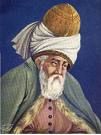
1273 On Jan. 29 Robert Wishart (-1316), of Norman-French descent, a relation of William Wishart, bishop of St. Andrews becomes bishop of Glasgow, Scotland. On Oct. 29 despite up-and-coming Ottokar II (1230-78) of Bohemia seeking the German crown, Count Rudolf of Hapsburg is elected German king Rudolf (Rudolph) I (1218-91) (until 1291), and crowned at Aix-la-Chapelle, officially ending the Hohenstaufen Dynasty (begun 1138), and founding the Hapsburg (Habsburg) (Ger. "Hawk's Castle") Dynasty, which rules Germany and the HRE until 1806, extending its boundaries until the Protestant German states break away in 1648; in Oct. the Great Interregnum (begun 1254) ends as he is crowned HRE Rudolf I by Pope Gregory X in Lausanne, becoming a papal V over the formerly Hohenstaufen German-owned Holy Roman Empire, marginalizing its political and religious power in Europe and making the imperial title little more than honorary, albeit with cool pageantry; nonplussed, Ottokar II refuses to recognize him and contests his election, while Charles of Anjou unsuccessfully vies for the imperial crown; too bad, the Hapsburgs only control S Germany, leaving the rest of Germany to the zillion other petty princes, keeping Germany from uniting under a kick-ass fuhrer, er, emperor until 1870; meanwhile somewhere along the line the males married into the Polish Piast family, Masovian branch, giving them a hereditary deformity called Prognathism (Habsburg Jaw) that gave them hog jaws and lips - like Jay Leno? Edward I summons reps. of both counties and towns to meet with the great council (and again in 1275). The walled cities of Xiangyang and Fancheng in Hubei Province in China are taken by the Mongols after 4.5 years (1269). Thomas Aquinas stops work on "Summa Theologica" and never finishes it; the basis of all Roman Catholic theological teaching is incomplete? Architecture: Regensburg Cathedral begins reconstruction (finished 1534). Births: Spanish king Frederick III of Aragon (d. 1337); son of Peter III of Aragon (1239-85). Ethiopian Orthodox Church leader Ewostatewos (Eustatius) (d. 1352) on July 15 (21 Hamle) in Tsira', E Tigray. Deaths: Sufi Mevlevi Order (Order of the Dancing or Whirling Dervishes) founder Jalal al-Din (Jalaluddin) Rumi (b. 1207) on Dec. 17 in Konya; leaves Mathnawi (Mathnavi) (6 vols.); his son Sultan Baha al-Din Muhammad-i Walad founds the Mevlevi (Mawlawiyya) Order AKA the Whirling (Dancing) Dervishes (Pers. "beggars"); Rumi's ecumenical mystical poetry stays popular to modern times.
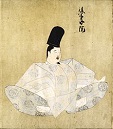



1274 On Feb. 2 a plot by his brother Dafydd to kill Welsh prince Llywelyn the Last is foiled by a snowstorm, after which Dafydd flees to England into the arms of Longshanks. On Mar. 6 emperor (since Jan. 9, 1260) Kameyama (b. 1249) abdicates, and on Mar. 6 his cousin Go-Uda (1266-1324) becomes Japanese Yamato emperor #91 (until 1287); on Nov. 19 the Mongols under Kublai Khan attempt an invasion of Japan, but are repulsed by the samurais; too bad, Hakozaki Shrine in Fukuoka is burned to the ground, and later rebuilt with a sign reading "Surrender of the enemy nation" (Tekikoku kofuku)- try to imagine that scene? In May after Byzantine emperor Michael VIII Palaeologus allies with the papacy against Charles I of Naples and Sicily, the Second Ecumenical Council of Lyons (first 1245) convenes, and the Greek Byzantines recognize the authority of the Roman Catholic pope in return for the council authorizing funds for another Crusade, which is never carried out, causing Michael VIII to be villified after his death, and the attempted reunion of the Roman and Greek churches to fall flat; on July 4 an embassy led by Mongol clerk-translator Rychaldus (Richardus) arrives to deliver a report on behalf of Mongol Christian gen. Abaqa seeking an alliance to drive the Mamluks out of Syria; meanwhile to quiet Byzantine critics and prevent another conclave of Viterbo, Pope Malcolm, er, Gregory X decrees that the cardinals have to be locked up until they elect a pope, founding the Papal Conclave (Lat. "with key"). On July 15 while the Council of Lyons holds its 2nd session, Bonaventura (b. 1221) dies after being made cardinal of Albano. On July 22 "kindly-faced" (Dante) Henry I the Fat of Navarre (b. 1244) dies (from suffocating in his own fat?) without an heir (his only son Theobald fell from a battlement at Estrella Castle in Castle last year), ending the male line of the house of Champagne; his 3-y.-o. Salic-challenged daughter Joanna of Champagne (1271-1305) rules Champagne alone (until 1305), with her mother Blanche of Artois as regent, having to fight off all kinds of threats to the throne of Champagne, and ultimately being driven into the arms of Philip III. On Aug. 19 Edward I is crowned king of England in Westminster Abbey. The Marinids under Abu Yaqub Yusuf siege the oasis of Sijilmasa SE of Fez in W Maghreb (founded 757), using gunfire-powered cannon as siege engines. The Diet of Regensburg deprives Ottokar II of his dominions, after which his enemy HRE Rudolf I places him under the ban of the empire next year. (Comtat) Venaissin (kon-tahv-eh-neh-SAH) in SE France (bounded by Dauphine on the N, Provence on the E and S, and Languedoc on the W) comes under papal rule (until 1791). Duisburg, Germany establishes a town council with two mayors. 9-y-o. Dante Alighieri (b. 1265) meeets fellow Florentine, 8-y.-o. Beatrice Portinari (1266-90), and falls in love at first sight, spending the rest of his life obsessed with her although he never gets past greeting her in the street, and remaining unable to turn his genetic mate-hunting radar off even after she dies in her prime in 1290, turning her into the #1 Dolce Stil Nuovo babe, the object of pure courtly love, his reason for living, his eternal guardian angel, all despite marrying a real crapping farting foul-mouthed aging breed mare and having a big brood of rugrats - why do fools fall in love? Births: French Catholic bishop (St.) Louis of Toulouse (d. 1297) in Feb. in Brignoles, Provence; 2nd son of Charles II the Lame of Anjou (1254-1309) and Maria Arpad of Hungary (1257-1323); brother of Robert the Wise of Anjou (1277-1343); feast day: Aug. 19. Burmese Hanthawaddy king #2 (1307-11) Hkun Law (d. 1311) on Mar. 16 in Donwun; brother of Wareru (1253-1307). English prince of Wales #1 and king (1307-27) Edward II (d. 1327) on Apr. 25 in Caernarfon Castle, Gwynedd; 4th son of Edward I of England (1239-1307) and 1st wife Eleanor of Castile (1241-90). Scottish king (1306-29) Robert I the Bruce (de Brus) (OF "brushwood thicket"), 7th Lord of Annandale and 2nd Earl of Carrick (d. 1329) on July 11 in Turnberry Castle, Ayrshire; son of Robert Bruce, 6th Lord of Annandale and 2nd Earl of Carrick (1243-1304), keeper of Carlisle Castle and Countess Marjorie of Carrick (-1292) (with both Norman and royal Scots blood in his veins, the latter via his mother, who is from an old Scottish Celtic family); grandson of "Old Competitor" Robert Bruce, 5th Lord of Annandale (1220-95), crusading companion of the English royals, who conspires to put him on the throne ahead of John Balliol; brother of Neil Bruce (1276-), Edward Bruce (1279-), Thomas Bruce (1284-) and Alexander Bruce (1285-); receives training in the chivalric and courtly arts in the English royal household, becoming a pro with the battle axe, and learns Latin, English, and Gaelic. Deaths: French Sorbonne founder Robert de Sorbon (b. 1201) on Aug. 15 in Paris. Persian Shiite theologian-astronomer Nasir ad-Din Tusi (b. 1201) on June 26 in Baghdad. Italian Catholic theologian St. Bonaventura (b. 1221) on July 15 in Lyons, France. Italian Roman Catholic #1 theologian St. Thomas Aquinas (b. 1225) on Mar. 7 in Fossanova; dies in the Cistercian monastery while en route to the Council of Lyons; his tomb is built in Toulouse; leaves the hymn Pange Lingua (composed for the Feast of Corpus Christi), and the unfinished Summa Theologica (Theological Compendium) (finished by his editor Reginald of Piperno?), an attempt to use the Aristotelian science and logic of the Averroists to justify the conclusions of St. Augustine and the Neoplatonists, while denying Averroes' double-truth theory that there is one truth in science and another in faith; incl. the Five Arguments for the Existence of God (Quinque Viae), the Prime Mover, who is perfect, omniscient, omnipotent, and free; after his work sinks in, it turns the Roman Catholic Church decisively Aristotelian, widening the split with the Eastern Orthodox Church, which remains Platonist and sinks into mysticism. French king of Navarre (1270-4) Henry I (b. 1244) on July 22.
1275 What was that about the lights of Broadway? Backward West meets Dazzling East and likes it? In May Marco Polo (1254-1324) and his party arrive at Kublai Khan's summer capital of Chandu (Shangtu) (Xanadu) N of the Great Wall in Cathay (China), where they stay until 1292, noting that he keeps 10K milk-white horses within the walls of his summer residence; in the fall they accompany Kublai Khan to his winter capital at Peking, where they view his "stately pleasure dome" of violet, green, and vermilion on gilded walls carved with figures of dragons and Buddhas, which has a huge hall capable of entertaining 6K at dinner; the royal dude has 1M retainers, and his New Year's parade features 5K elephants each carrying two coffers of treasure; Marco pleases Kublai's ear with his own stories, and is given free run of Cathay for 17 years, observing spectacles (eyeglasses) in gen. use. In Sept. after Muhammad II of Granada asks for help from Moroccan sultan Abu Yusuf Yaqub ibn Abd Al-Haqq, the first of four Muslim Marinid invasions from Africa to Spain over 10 years sees troops from the Nasrid Emirate of Granada defeat the Christians of the Kingdom of Castile at the Battle of Ecija. A Scottish force from Galloway is sent to take on Manx king Gofraid Magnusson (bastard son of the previous king Magnus Olafsson, who had seized power), and they bloodily subdue him. Yielding to public outcry over Jewish practices, but not wanting to expel them just yet, Edward I of England issues the Statute of the Jewry, forbidding usury and instituting an experiment in getting Jews to take up new trades such as agriculture and crafts, giving them 15 years to read just before calling it a failure and expelling them in 1290; since 1218 Jews are required to wear a special badge. Edward I begins enacting the Statutes of Merchants, a series of new laws for merchants (ends 1285). Edward I enacts the death penalty for homosexuals - his own son is exempt? The city of Amsterdam is chartered. Architecture: The Hapsburg Hofburg Palace in Vienna is built, later becoming home to the Spanish Riding School. A Nestorian Church is built in Dadu (Beijing), China by the patriarch of Baghdad, who creates an archibishopric too. Kanezawa (Hojo) Sanetoki (1224-76) founds a library in Kanazawa (Yokohama), Japan, attempting to collect every existing book in Japanese and Chinese; it survives to modern times. Science: About this time Jewish physician Abu Al-Mina Al-Kuhin al-Attar pub. a pharmacopia that becomes a hit in the Muslim World until modern times. William of Salicet (Guglielmo da Saliceto) (1210-77) of the U. of Bologna writes Chirurgia, breaking with Galen by claiming that pus formation is unhealthy, and promoting the use of a surgical knife (scalpel) over cauterization, lecturing on the importance of regular bathing for infants and hygiene for pregnant women. The earliest known Portolan Chart, the Carta Pisana is produced, becoming the first modern scientific map. Nonfiction: William of Saliceto (1210-77), Chirurgia; founds the science of human dissection, promoting the use of a surgical knife over cauterization, and contradicting Galen by claiming that pus formation is bad. The earliest surviving copy of the Book of Taliesin (Llyfr Taliesin) (6th cent. Welsh poet) dates to this time. Poetry: Konrad von Wurzburg (1220-87), Die Goldene Schmiede (The Golden Smithy); Marian hymn. Births: French count of Brienne (1296-1311) Walter (Gautier) V (d. 1311) in Brienne-le-Chateau, Aube, Champagne. German king (1308-13) and HRE (1312-3) Henry VII of Luxembourg (d. 1313); father of Frederick the Handsome (1289-1330) and John of Luxembourg (1296-1346). Greek Byzantine physician Johannes (Joannes) Zacharias Actuarius (d. 1328). Lithuanian pagan grand duke (1316-41) Gediminas (Gedymin) (d. 1341). Italian duke Robert of Anjou (d. 1343); son of Charles II, king of Naples. Deaths: Scottish queen Margaret (b. 1240) on Feb. 26 in Cupar, Fife; dies after a long visit to England.


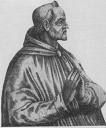
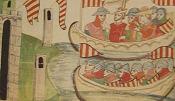



1276 On Jan. 10 Pope (since 1271) Gregory X (b. 1210) dies, and on Jan. 21 Pierre of Tarentaise is elected Pope (#184) Innocent V (1225-76) (first Dominican pope); he dies on June 22, and on July 11 Ottobono Fieschi is elected Pope (#185) Adrian (Hadrian) V (-1276); he dies within 5 weeks on Aug. 18, and on Sept. 8 Pedro Julinao is elected Pope (#186) John XXI (1210-77), and crowned on Sept. 20, becoming the first Portuguese pope (until ?), and the first physician pope (until ?), having given medical advice to Gregory X (1271-6), Innocent V (1276), and Adrian V (1276), none of whom lived long and prospered from his prescriptions of lettuce leaves for toothache, lettuce seed to reduce sex drive, and pig dung to stop nosebleeds; there is no Pope John XX because of cardinal deacon John son of Robert, who opposed Boniface VII after the death of John XIV. On July 27 after falling ill in Alzira and resigning with the intention of retiring to the Monastery of Poblet, king (since Sept. 12, 1213) James I the Conqueror of Aragon (b. 1208) dies in Alzira, Valencia, and his eldest son Peter III (1239-85) becomes king of Aragon and Valencia and count of Barcelona (until Nov. 11, 1285), while his 2nd son James II the Just (1267-1327) signs the Treaty of Perpignan (capital of Roussillon), becoming king of Majorca, Ibiza, and Formentera, count of Roussillon and Cerdanya, and lord of Montpellier as a vassal of Aragon (until 1311), which doesn't set well with him since he has the larger domain, causing him to get in a constant battle with his big brother and end up allying with the king of France against him; meanwhile the Muslims, seeing their chance begin a revolt in Valencia (ends 1280); the Kingdom of Labia, er, Majorca is founded (until 1349). On Oct. 7 after travelling to Rome, Charles I of Anjou takes an oath of fealty for Sicily, promising that it will never unite with Tuscany, Lombardy or the Roman Empire. After the Hungarians and some of the Bohemian nobility back HRE Rudolf I, Ottokar II surrenders, and Rudolf outlaws him, takes all his dominions except Bohemia and Moravia, and forces him to recognize his suzerainty over them; Rudolf I begins attempting to assert Hapsburg feudal rights in Switzerland, causing them to band together to resist him. After his father threatens to pass him over for a younger brother Stefan Milutin, Stefan Dragutin (-1316) rebels with Hungarian help, and becomes king of Serbia (until 1282), while daddy abdicates and retires to the Monastery of Sopocani, dying next May 1. After crossing the Yangtze River, the Mongols capture the Nan Song city of Lin An (modern-day Hangzhou), and empress dowager Xie surrenders on the condition that her son Song Gongdi be allowed to live after being demoted to a duke, after which he is ordered in 1289 by Kublai Khan to go to Tibet to become a monk, becoming a great scholar; too bad, he writes a poem expressing his longing to become emperor, causing him to be executed in 1323; meanwhile his older brother Song Duanzong (1268-78) (along with his infant brother Bing) escapes to Fujian on Lantau Island (modern-day Kowloon City) in S China, setting up the govt. in Fuzhou, becoming Southern (Nan) Song emperor #8 of China on June 14 (until May 8, 1278). The Mamluks invade Nubia, and spend the next cent. trying to incorporate it as a Malmuk province with puppet rulers, only to see their control wither by the end of the 14th cent. The Hapsburgs gain possession of scenic Styria (Steiermark) in SC Austria, and make it into a duchy. Aurich in Lower Saxony is first mentioned, whose rulers are always getting into power struggles with chieftains of East Frisia. The town of Gliwice ("gliw" = loam or wetland) in Upper Silesia in WC Poland (modern-day pop. 179K/2.7M) is first mentioned; in the mid-18th cent. it is taken along with most of Silesia by Prussia, and incorporated into the German Empre in 1871; in 1796 the first coke-fired blast furnace in Europe is build there. Births: English Luttrell Psalter knight Sir Geoffrey Luttrell II (d. 1345); great-great-grandson of Sir Geoffrey de Luteret. Deaths: Spanish king of Aragon (1213-76) James I the Conqueror (b. 1208) on July 27 in Valencia; leaves Libre dels Fets (an autobio. blowing his own conquering horn) and Libre de la Saviesa (Book of Wisdom).


1277 On May 20 Pope (since 1276) John XXI dies six days after a private apt. he uses for studies collapses on him, causing relief in some parts of the Vatican where he is thought to be the Antichrist, and on Nov. 25 Giovanni Gaetano (an Orsini) is elected Pope (#187) Nicholas III (1216-80). Della Torre dies, and rival Archbishop Otto Visconti becomes ruler of Milan, founding the 170-year Visconti Dynasty of Milan (ends 1447). On July 1 sultan (since Oct. 24, 1260 Baibars (b. 1223) dies, and his son Al-Said Barrakah (Muhammed Barakah Qan) (1260-80) becomes Mamluk sultan #2 (until 1279). After Welsh Prince Llywelyn the Last fails to renew his homage and in 1275 marries his enemy Simon de Montfort's daughter Eleanor de Montfort (1252-82) by proxy (causing him to hire pirates to capture her ship), Edward I Longshanks takes a large army to Wales, starves the prince into submission in Snowdon, and forces him to sign the Treaty of Aberconwy, which reduces his principality to North Wales, and makes him pay homage again; the parts of Wales seized by Edward are introduced to English law, organized into shires; at least Edward allows Llywelyn to have his babe back, and they are officially married in Worcester Cathedral, becoming known as Lord and Lady Snowdon. Ljubljana (Lyublyana) (Laibach) in Slovenia comes under Hapsburg rule. The Kilwa Sultanate off modern-day Tanzani passes into the hands of the Arab Abu Maheb family (until 1505). After Dominican head John of Vercelli and Franciscan head Jerome of Ascoli agree to order their friars to refrain from criticizing each other, Friar Roger Bacon is imprisoned for teaching "suspected novelties" (heresy?) (until 1292). St. Margaret of Cortona (1247-97) begins hearing a voice calling her "poverella". Ramkhamhaeng the Great (1239-1317) becomes king #3 of the Phra Ruang Dynasty of Succotash, er, Sukhothai (until 1317), which extends from Vientiane W to Pegu, going on to create the Thai alphabet and establish Theravada Buddhism as the state religion. The bishop of Paris prohibits the teaching or reading of Aristotle at the U. of Paris, which proves hard to enforce; meanwhile Oxford U. continues to study his works. Architecture: The 1/2-mi.-long Passetto di Borgo elevated covered passageway is built between the Vatican and the fortified Castel Sant'Angelo on the banks of the Tiber River in Rome to serve as a papal escape route; it comes in handy to save the life of Pope Clement VII during the sack of Rome in 1527 by HRE Charles V. Erwin von Steinbach (1244-1318) begins major French Gothic improvements to Notre Dame de Strasbourg Cathedral in France (until 1318); in 1647-1874 it is the world's tallest bldg. Poetry: Konrad von Wurzburg (1225-87), Partonopier und Meliur (verse romance). Births: Byzantine emperor (1294-1320) Michael IX Palaeologus (Palaiologos) (d. 1320) on Mar. 27; eldest son of Andronicus II Palaeologus (1259-1332) and Anna of Hungary. English uncrowned king Thomas, 2nd Earl of of Lancaster (d. 1322) (b. 1278?); eldest son of Edmund Crouchback, 1st earl of Lancaster (1245-96) (brother of Edward I) and Blanche of Artois; nephew of Edward II. French king of Naples and Jerusalem (1309-43) ("the peacemaker of Italy") Robert (the Wise) of Anjou (d. 1343); eldest son of Charles II the Lame (1254-1309) and Maria Arpad of Hungary (1257-1323) (daughter of Stephen V of Hungary); brother of St. Louis of Toulouse (1274-97). Deaths: Italian surgeon William of Salicet (b. 1210). Egyptian Mamluk sultan #1 Baibars (b. 1223) on July 1 in Damascus.




1278 In Jan. after purchasing it, Sicilian king (1266-85) Charles I of Naples (Anjou) (1227-85) is crowned king of Jerusalem, and acknowledged by the barons in Acre. Mamluk sultan Al-Said Barakah sends 20K troops under emirs Qalawun and Baysari to raid Cicilian Armenia and Rum, with a secret plan to arrest the emirs on their return, but Emir Kuvenduk tips them off, and they instead force Barakah to abdicate; his 7-y.-o. brother Solamish (Sulamish) (1272-91) becomes Mamluk sultan #3 (until ?), with Qalawun as regent and de facto sultan. As Mongol forces are about to break through, Chinese emperor Song Duangzong and his minister Lu Xiufu (-1279) flee to Guangdong province, staying in Hong Kong (Chin. "fragrant harbor"); later the Song Wong Toi (Chin. "Terrace of the Song Kings") is erected in Kowloon City in commemoration; too bad, in Mar. Song Duangzong (b. 1268) falls off a boat while fleeting the Mongols and nearly drowns, dying on May 10, and his younger brother Song Zhao Bing (1271-9) becomes emperor #9 (last) of the Nan (Southern) Song Dynasty in China (until 1279). On May 1 prince (since 1246) William II of Villehardouin (b. ?) dies, and Charles I of Naples succeeds him as king of Achaea, ending the Villehardouin Dynasty and beginning the Anjevin Dynasty, making it a province of Naples and turning the duchy of Athens into the most powerful independent state in Greece; William leaves the Manuscrit du Roi, showing what a noble poet he was? On Aug. 5 Alfonso X of Castile begins the Siege of Algeciras, which is under Moroccan control; he abandons it next Aug. On Aug. 26 after listening to his overambitious wife Kunigunda (the Bohemian Lady Macbeth?) and taking up arms against HRE Rudolf I of Hapsburg, who allies with Ladislav IV of Hungary, Ottokar II (b. 1230) is defeated and KIA at the Battle of Durnkrut (Dürnkrut) (Marchfeld) on the Marchfeld (Moravsko Pole) in NE (Lower) Austria, involving 80K men (largest knight battle in the Middle Ages); the Hapsburgs under HRE Rudolf I gain control of Austria (until 1918), and choose Vienna as their capital; Ottokar II is succeeded by his 7-y.-o. son Wenceslaus II (1271-1305) as Premyslid king of Bohemia under the regency of margrave Otto IV of Brandenburg (1238-1308), appointed by HRE Rudolf I; after Otto IV tries to stay in charge by imprisoning the boy, his mother's secret husband Zavis of Falkenstein (1245-90) rules for him until he has him executed in 1290 and assumes personal rule. In Aug. the Statute of Gloucester is passed in England, becoming the first recorded in a Statute Roll, encouraging loyal subjects to petition King Edward I against his own barons and ministers, modifying novel disseisin (Lat. "recent dispossession") (action for recovery of land seized illegally), reviving the system of gen. eyres (royal justices riding circuit), and increasing the number of pleas of quo warranto (Lat. "by what warrant?") that they can hear; too bad, the statute limits actions on writs of trespass in the royal courts to property damage above 40 shillings, maims, beatings, and wounds, causing the writs to begin alleging "vi et armis" (force and arms). On Sept. 29 Peter III of Aragon captures the Muslim stronghold of Montesa in Valencia, and expels the Muslims from his realm. Alexander III of Scotland does homage to the English king for his English lands, "reserving" his Scottish fealty - was he thrown out of school? Margaret II abdicates as countess of Flanders in favor of her son Count Guy of Dampierre (1226-1305). The original Genovia of the Princess Diaries? The tiny principality of Andorra on the Spanish-French border is established by a treaty between the Spanish bishop of Urgell and the French count of Foix (whose descendants inherit France in 1589 and issue an edict in 1607); it becomes the last remaining feudal dual principality in Europe in modern times, shared by the bishop of Urgell and the pres. of France, with Catalan as the official language; starting in ? Sept. 8 becomes the annual celebration of Our Lady of Meritxell. Guillaume, the last Latin prince of Achaea dies. Pope Nicholas III, at the request of Abaga, Khan of the Tartars sends five Franciscan missionaries to preach in Persia and China. In London 278 Jews caught clipping coins are hanged, while Christians found guilty of the same offense are merely fined. From this year to 1340 the account books of Genoa are lost; when they resume, they're using double-entry bookkeeping. Architecture: The Pisa Cathedral Baptistery (begun 1153) is finished. Inventions: The glass mirror is invented in Venice; no metallized backing until the 16th cent. Deaths: Indian religious leader Madhva (b. 1199). Austrian knight and chivalry poet Ulrich von Lichtenstein (b. 1200); buried in Seckau. Italian sculptor Nicola Pisano (b. 1220) in Pisa; buried in the Campo Santo in Pisa, the most beautiful cemetery in Italy, designed by his son Giovanni Pisano. Bohemian king (1253-78) Ottokar II (b. 1230) on Aug. 26 (KIA in the Battle of Durnkrut). German chronicler-historian Martin of Troppau. Achaean Latin prince (last) William II de Villehardouin (b. ?) on May 1.



1279 On Feb. 6 king (since Jan. 4, 1248) Afonso III (b. 1210) dies, and his son Denis (Dinis) I (the Farmer King) (the Poet King) (1261-1325) becomes king #6 of Portugal (until Jan. 7, 1325), going on to order the planting of a large pine forest near Leiria for conservation and for shipbuilding, and become known for his poetry. On Mar. 19 the Yuan Dynasty of Kublai Khan finishes off the Southern (Nan) Song Dynasty in China (founded 1127) at the Battle of Yamen, where emperor Song Zhao Bin is either KIA or escapes with the fleet of adm. Zhang Shijie across the sea, and founds the Luzon (Lu Song) (Lesser Song) Empire; Lu Xiufu jumps off the cliffs of Mt. Yashan; Kublai Khan sends an emissary to the Vietnamese emperor in Thang-Long (Hanoi) demanding surrender, and when he refuses he begins a war (ends 1288). On Dec. 7 (Old Style) Boleslaus V the Chaste (b. 1221) dies leaving no heirs, and Leszek the Black (1241-88) becomes ruler of Cracow (until 1288). Edward I of England cedes Normandy to Philip III of France. After getting pissed-off at clerics for refusing to approve taxes in their provincial assemblies, Edward I passes the first of two Statutes of Mortmain (2nd in 1290), forbidding the granting of lands to ecclesiastical bodies without royal consent, becoming the first step taken by the English to free themselves from papal taxation and submission to "foreign" ecclesiastical officials, reducing the power of the Church to withdraw land from taxation and control by the civil govt. Former Turkish slave Al-Mansur Sayf-al-Din Qalaun (Qalawun as-Salihi) (1222-90) deposes the son of al-Baybars, and becomes Bahriyya sultan #7 of the Mamluk Empire (until Nov. 10, 1290), building a great hospital in Cairo with an endowment of 1M dirhems. Hungary enacts the decree of the 1215 Fourth Lateran Council requiring Jews and Muslims to wear special markings on their clothing. Florentine artist Giovanni Cimabue encounters 12-y.-o. shepherd Giotto di Bondone sketching a sheep on a rock in a meadow, and takes him as his apprentice - the original Playboy? In 1279 Pope Nicholas III approved the proposition of the Spirituals (Fraticelli) (Little Brethren) (Zealots) of the Order of St. Francis that Christ and his apostles had owned no property, justifying their living in small hermitages; in 1323 Pope John XXII reversed this infallible decision and handed them over to the Inquisition. Architecture: Kublai Khan builds an observatory on the city wall of Khanbalig (Beijing), with bronze astronomical instruments cast by Guo Shoujing (1231-1316). Nonfiction: Abraham Abulafia (1240-92), The Book of the Righteous (Sefer ha-Yashar); prophetic book written in Patras, Greece. Births: English queen (1299-1307) ("the Pearl of France") Marguerite of France (d. 1318) in Paris; daughter of Philip III (1245-85) and Maria of Brabant (1254-1321); 2nd wife (1299-) of Edward I (1239-1307); mother of Thomas of Brotherton, 1st Earl of Norfolk (1300-38), Edmund of Woodstock, 1st Earl of Kent (1301-30), and Eleanor of England (1306-11). Deaths: Portuguese king (1248-79) Afonso III (b. 1210) on Feb. 16 in alcobaca. Polish king (1227-79) Boleslaus V the Chaste (b. 1226) on Dec. 7 (Old Style).



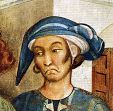


1280 The Wolf Minimum of minimum solar activity begins (ends 1350). On May 9 Magnus IV the Law-Mender (b. 1238) dies, and his teenie son Eric II Magnusson (the Priest-Hater) (1268-99) becomes king of Norway (until July 15, 1299), which is in decline, causing him to seek treaties with Scotland. On June 23 the Battle (Disaster) of Moclin in Granada is a V for Sultan Muhammad II over Infante Sancho of Castile and Order of Santiago grandmaster Gonzalo Ruiz Giron, who lose 2.8K KIA. On Aug. 22 Pope (since 1277) Nicholas III (b. 1216) dies in Suriano during the night of a stroke right after ordering wandering Spanish-born Jewish mystic Abraham Abulafia (1240-92) (founder of the School of Prophetic Kabbala) burned alive for trying to convert him to Judaism, saving him and allowing him to flee to Rome then Sicily and continue his mystic writing, until the local Jewish congregation gets him kicked out, after which he settles in Comino (near Malta). King (since July 27, 1276) Peter III the Great of Aragon (1239-85), husband of Constance of the Hohenstaufens (daughter of Manfred) captures most of the Aragonese nobility in a castle where they are plotting against him; no fool, Peter bases his army around a prof. core of Spanish, English, French, Italian and Hungarian mercenaries. The Asen Dynasty in Bulgaria ends as the Serbs, Greeks, and Mongols split the country up. John I becomes the last Latin lord of Athens. Edward I of England establishes a commission to examine Welsh law as a prelude to invading Wales. The Muslims use some form of incendiary weapon at the Battle of Cordoba (Cordova); the Muslim revolt in Valencia (begun 1276) ends. Osman I (1259-1324), founder of the Ottoman Dynasty is elected chieftain by his tribesmen in NW Anatolia around Dorylaeum (Eskishehir), and begins the systematic takeover of Anatolia. About this year the Ismaelians (Assassins) of Syria (40K Assassins who founded 10 castles in the hills above Tortosa (Tartus) are destroyed by the Mamluks. The first Jewish Ghetto to segregate Jews is created in Muslim Morocco, spreading to Europe; the word comes from the Venetian word for iron foundry after Jews are forced to live near one in 1516. The petty state of Toungoo in Burma is founded by Shan tribes fleeing from the Mongols, followed by Pegu (Bago) (Hanthawaddy) in S Burma. In this decade Tartu in Estonia joins the Hanseatic League. In this decade Maoris begin settling "the land of the long white cloud" (as viewed from Australia) New Zealand, making the 10-14-ft.-tall wingless moa bird (Dinorthiformes) extinct by the mid-15th cent. Starting in this decade Italian painting is all about the dueling Sienese School of Painting (known for Byzantine influence) and the naturalistic Florentine School of Painting, located in towns 60 mi. apart (Siena is S of Florence), and continuing through the 14th cent.; the Sienese School, founded by Duccio de Buoninsegna (1255-1319) and his pupil Simone Martini (1284-1344) copies the Byzantine school, churning out flat linear religious sentimental pseudo-iconic, usually brightly-colored and precisely detailed paintings; the Florentine School, founded by Giotto di Bondone (1267-1337) is the home of the rebels, inaugurating the Renaissance style with spatial perspective, naturalistic representation, and dramatic action; by the 16th cent. the Sienese School is kaput, and the Florentine School knocks your fillings loose? Inventions: Hans Speyer invents the Belt-Driven Spinning Wheel (from China?), causing a revolt among Flemish textile workers - throw them shoes? Science: In this decade Salvino d'Amarto (-1317) of Italy invents Eyeglasses (Spectacles). Art: Cimabue (1240-1302), Maesta (Maestà) (1280-5). Poetry: Rutebeuf (1248-85), Ouvres; collection of lyrical and satirical poems. Births: Persian Ilkhanid khan #8 (1304-16) (Muslim) Oljeitu (Uljeitu) (Uljaytu) (Olcayto) ("blessed") (d. 1316) AKA Muhammad Khodabandeh (Pers. "Man of God"); son of Arghun, brother of Mahmud Ghazan (5th successor of Genghis Khan); great-grandson of Hulagu. Swedish king (1290-1318) Birger Magnusson (d. 1321); son of Magnus III (1240-90) and Hedewig of Holstein. Mali king #10 (1312-37) (Sunni Muslim) Musa Keita I (d. 1337); son of Abu Bakr III, who abdicated because he was convinced that he could find the edge of the Atlantic Ocean. English Scholastic Nominalist philosopher (Franciscan friar) ("Doctor Invincibilis") ("Venerabilis Inceptor") William of Ockham (Occam) (d. 1347) in Ockham, Surrey; of Ockham's Razor fame; trains at Oxford and teaches in Paris, becoming the rival of Duns Scotus. Italian Florentine painter Bernardo Daddi (d. 1348); apprentice of Giotto. Italian Sienese school painter Pietro Lorenzetti (Laurati) (da Siena) (d. 1348); brother of Ambrogio Lorenzetti (1300-48); adopts the naturalistic style of Giotto - and betrays the faith? Italian physician-inventor Guida da Vigevano (d. 1349) in Vigevano, Lombardy; educated at the U. of Bologna; physician of Joan I of Navarre. English "Polychronicon" chronicler and Benedictine monk Ranulf Higdon (Higden) (d. 1364) in W England. Deaths: German philosopher-scientist Albertus Magnus (b. 1193) on Nov. 15 in Cologne: "Natural science does not consist in ratifying what others have said, but in seeking the causes of phenomena"; "Albertus Magnus arrogantly boasted of his speculation before the deity and suddenly became stupid." (Soren Kierkegaard) Dutch countess Margaret II of Flanders (b. 1202) on Feb. 10 in Ghent. Tibetan monk Drogon Chogyal Phagpa (b. 1235) on Dec. 15 in Lhakhang Palace, Sakya, Tibet; rumors that he was poisoned by former (fired) ponchen Kunga Zangpo causes an army of Mongols and Amdo Tibetans to invade next year and execute him. Norwegian king (1263-80) Magnus VI (b. 1238) on May 9 in Bergen.

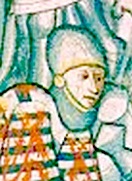
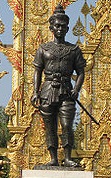
1281 On Feb. 9 future Scottish king (1292-6) John Balliol (1249-1314) marries Isabella de Warenne (1253-91), daughter of John de Warenne (John Plantagenet), 6th Earl of Surrey (1231-1304); they go on to have sons Edward Balliol (1284-1364) (future king of Scotland) and Henry Balliol (-1332). On Feb. 22 after Charles I of Anjou rigs the election, eel-loving cardinal (since 1261) Simon de Brie (Brion) (in Touraine between the Seine and Marne Valleys) is elected Pope (#188) Martin IV (1210-85), ending the anti-French era of papal policy (until 1282); he backs Charles of Anjou's ambitious dreams of Byzantine conquest and a Mediterranean revival of the Latin Empire run by the French (him), excommunicating Byzantine emperor Michael Palaeologus; Charles of Anjou invades Epirus, causing Michael to counter by financing a revolt in Sicily, forming the mercenary Catalan Co. of the East. In Sept. in Bergen Cathedral 13-y.-o. Eric II Magnusson of Norway marries 20-y.-o. Margaret Dunkeld (1261-83), daughter of Alexander III of Scotland, who promises to pay a dowry of 14K marks, smoothing relations between the two kingdoms for awhile and also smoothing relations between Norway and England. On Dec. 24 Henry the Blond (b. 1216) dies, and on Dec. 24 his son Henry VI (1240-88) becomes count of Luxembourg (until June 5, 1288). The Mongols invade Syria again (first time 1260). After returning to Japan and finding no suitable landing beaches because of defensive walls, a kamikaze (Jap. "divine wind") (typhoon) destroys Kublai Khan's fleet of 4.5K vessels and 150K men from Korea and the lower Yangtze Delta (largest naval invasion until D-Day in 1944) at Hakozaki Bay in Fukuoka, thwarting his invasion of Japan as in 1274, and causing the Japanese to later use the word kamikaze for their suicide bombers. Thai king Mangrai (Mengrai) (1238-1311) conquers the kingdom of Haripunjaya at Lamphun, going on in 1292 to found the Buddhist kingdom of Lan Na (Lannathai), centered at Chiengmai (Chiang Mai) in N Thailand, which fights off Mongols from the N for the next two decades. 20 years after setting out from Yuan China on a pilgrimage to Jerusalem, only to get holed-up in Baghdad instead, where they are welcomed by Nestorian patriarch Denha I, Turkish Chinese monk Rabban Bar Sauma (Sawma) (1220-94) and his student Rabban Markos return to Maragheh after Markos is elected Yaballaha III, patriarch of the Nestorian Church, and in 1278 he sends his former teacher to Rome to negotiate an entente between the Nestorian and Roman Catholic churches and form a strategic Franco-Mongol alliance against the Muslim Mamluk sultanate in Cairo, arriving after the death of Pope Honorius IV and negotiating with the cardinals instead, proceeding to Genoa then Paris, where he spends 1 mo. with Philip IV the Fair, then to Gascony, where he meets Edward I of England in Bordeaux, who is enthusiastic but begs off due to conflicts with the Scots and Welsh; he then returns to Rome, where new Pope Nicholas IV gives him communion on Palm Sun., 1288 before returning to Baghdad; Bar Sauma writes an account of his travels giving the viewpoint of the East on the West, beating Marco Polo. Births: Italian Ghibelline condottiero Castruccio Castracani degli Antelminelli (d. 1328) in Lucca. Ottoman sultan #2 (1326-59) Orhan (Orkhan) I (d. 1359) in Sogut; son of Osman I (1258-1326) and Malhun Hatun; father of Suleyman Pasha (1316-57) and Murad I (1326-89). Deaths: French Averroist philosopher Siger de Brabant (b. 1235) in Orvieto; murdered by a half-mad assassin after being condemned by the Inquisition in Oct. 1277 and spending his last years as a prisoner of the Roman Curia.
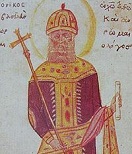


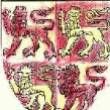
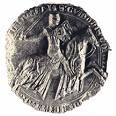
1282 On Mar. 30 (Easter Mon.) at the hour of Vespers near a church outside Palermo the War of the Sicilian Vespers (ends 1302) breaks out when 2K men, women and children, incl. nearly all the French in Sicily are massacred, causing the Sicilians to expel all the French and offer their throne to Peter III of Aragon, who is connected by marriage to the house of Hohenstaufen, and Aragon assumes rule of the kingdom of the Two Sicilies (until 1285); Philip III the Bold of France then leads a crusade against him as champion of Pope Martin IV, and a cent.-long war begins over Sicily between the Angevin kings of Naples and the Aragonese kings of Sicily (until 1442), with Sicilian independence secured at the cost of ruining the economy; meanwhile the old anti-French papal policy is resumed. In Apr. (Palm Sun.) after lesser Welsh princes get fed up with Edward I's royal officers and start a revolt, Prince Llywelyn the Last (b. 1223), the last prince of Wales leads his disgruntled Welsh against English strongholds; too bad, on June 19 his wife Eleanor dies in Garth Celyn during childbirth of daughter (only child) Gwenllian ferch Llywelyn (d. 1337), and Longshanks invades Wales, captures the breadbasket region of Anglesey, and offers Llywelyn a large estate in England if he will sell his people out, to which he replies that his ancestors had protected his people "since the days of Kamber son of Brutus" and so stuff it; he then leads a force S to mid-Wales, and on Dec. 11 is KIA at the Battle of Builth Wells in Powys after being tricked into separating from his main army, and his head severed, sent to London, and put up on a pike crowned with ivy, fulfilling the Welsh prophesy that Big Lion would ride crowned through the streets of London; on Dec. 11 his brother Dafydd ap Gruffydd (1238-83) succeeds him as prince of Wales (until Oct. 3, 1283), watching Welsh morale crumble as Longshanks goes in for the kyll. On Nov. 14 18-y.-o. Scottish Prince (heir apparent) Alexander (1264-84) (maternal nephew of Edward I of England) marries Margaret of Flanders (-1331), daughter of Count Guy de Dampierre of Flanders (1226-1304) in Roxburgh, recognizing Scotland's commercial future in Europe, with Berwick-upon-Tweed at the mouth of the Tweed River on the Scottish border emerging as a big North Sea port; too bad, the prince dies a little over a year later on Jan. 28, 1284, and Scotland begins a big tumble into the shanks, er, hands of Edward I Longshanks. On Dec. 11 emperor (since 1259) Michael VIII Palaeologus (b. 1223) dies, and his eldest surviving son Andronicus II Palaeologus (Andronikos II Palaiologos) (1259-1332) becomes Byzantine emperor (until 1328), immediately renouncing the church union established at the Second Council of Lyons in 1274. Rudolf I invests his sons Albert and Rudolf with Austria, Styria, and Carniola. Stefan Dragutin breaks his leg while hunting, and resigns unexpectedly in favor of his brother Stefan Uros II Milutin Nemanjic (1253-1321), who becomes king of Serbia (until 1321); Dragutin later decides to keep some parts in the N, founding the kingdom of Srem (Syrmia) (ends 1316), from the Danube to the Sava Rivers, with capital at Debrc (between Belgrade and Sabac), later becoming the first Serbian ruler to rule from Belgrade. The Danish nobility force King Eric V to sign a Danish Magna Carta, which establishes a Danish parliament and makes the king subordinate to it. A Mongolian army sent in ships from S China seizes the capital of the Hindu kingdom of Champa (Tsiompa) in coastal Vietnam (until 1283). Abaqa, viceroy (since 1265) of the Ilkhanid Dynasty in the Middle East dies, and Ahmed Tekuder (-1284), who was baptized a Nestorian Christian under the name Nicholas and converted to Islam becomes Ilkhanid sultan #1 (until 1284), zealously propagating Islam among his nobles, causing his Buddhist nephew Arghun to ask Kublai Khan to intervene. Canterbury archbishop John Pectin closes all London synagogues, and prohibits Jewish physicians from practicing on Christians. The Sung Academy in China closes. Florence takes the lead in European commerce and finance; Italy becomes the first country to use watermarks in making paper. German Hanseatic League traders in London dominated by Cologne form a corp. with their own Hanseatic Steelyard and guildhall; other German yards are later opened in York, Bristol, Yarmouth, Lynn, and Boston, the last two under the control of Lubeck and Hamburg; meanwhile the Wendish towns take over control of the Hanseatic League from Gothland. Science: The oldest Muslim reference to using a magnetic compass for navigation. Births: German duke of Upper Bavaria (1294-1301), German king (1314-47), king of the Romans (1314-47), king of Italy (1327-47), margrave of Brandenburg (-1323), HRE (1328-47), duke of Lower Bavaria (1340-7), countof Hainaut, Holland, Zeeland, and Friesland (1345-7), and count Palatine of the Rhine (-1329) Louis (Ludwig) IV (the Bavarian) (d. 1347) on Apr. 1; son of Duke Louis II the Severe of Bavaria (1229-94) and Matilda (Mechthild) (daughter of Rudolph I). French duke of Lorraine (1312-29) Frederick IV (the Fighter) (d. 1329) on Apr. 15 in Gondreville; son of Theobald II (1263-1312) and Isabella of Rumigny; husband of Elisabeth, daughter of Albert I of Germany; brother-in-law of Frederick III the Handsome. Spanish poet-writer Don Juan Manuel (d. 1348) on May 5 in Escalona; son of Manuel of Castile and Beatrice of Savoy; nephew of Alfonso X the Wise of Castile. French Pope (1352-62) Innocent VI (Etienne Aubert) (d. 1362) (b. 1295?) in Beyssac; created cardinal in 1342. Deaths: Welsh prince Llywelyn the Last (b. 1223) on Dec. 11. Byzantine emperor (1259-82) Michael VIII Palaeologus (b. 1223) on Dec. 11.



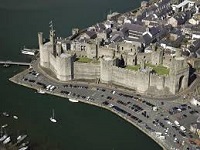

1283 On Apr. 9 Queen (since 1281) Margaret of Norway (b. 1261) dies after giving birth to daughter Margaret (d. 1290), later known as the Maid of Norway; meanwhile her whimpy 15-y.-o. daddy Eric II lets Bergen bishop (1278-1304) O.P. Narve and other magnates run his kingdom and control her education. In June Daffydd ap Gruffydd (b. 1238) is captured on Bera Mt. near Garth Celyn, and taken to Shrewsbury, England, where a special session of Parliament condemns him to be hanged, drawn and quartered on Oct. 3, making him the last free Welsh ruler; the House of Gwynnedd becomes extinct. 17-y.-o. Wenceslaus II (1271-1305) reaches the age of majority and becomes king of Bohemia, but is still being kept down by Zavis of Falkenstein. Ermengarde (Ermengard) (Irmgard) of Limburg (b. ?) dies sans heirs, launching the War of the Limburg Sucession (ends 1289) afer her hubby Reginald I of Guelders and her father Duke Waleran IV of Limburg's nephew Adolf VIII of Berg claim it, and the latter sells his claims to the powerful Duke John I of Brabant, starting out with a series of indecisive battles. he Teutonic Order of Knights compels the subjection of pesky Prussia, which becomes the last European nation to accept Christianity (with a sword); the Teutonic Knights are dissolved in 1525. The navy of Aragon raids the Kerkennah Islands in Tunisia; meanwhile the baronic Aragonese Uniones revolt and force Alfonso III to grant them a bill of rights known as the Privilegium Generale. A false Emperor Frederick II appears in Germany. The Mongols withdraw from Champa, but plan more attacks. A Jewish pogrom in Mainz, Germany kills 10 and results in the pillage of homes despite the efforts of Archbishop Werner to stop it. France joins the club and passes the death penalty for homosexuals - use the hot dog right or we'll roast it for you? The Turkoman principality of Germiyan is founded in W Anatolia, with capital at Kutahya (until 1389). 18-y.-o. Dante Alighieri joins the Dolce Stil Nuovo (Ital. "Sweet New Style") school of Italian love poetry, and becomes a leader of the Florentine Circle. Architecture: New (Old) St. Paul's Cathedral in London is begun (finished 1314), becoming the largest church in Europe; a ripoff of Notre Dame Cathedral in Paris? Caernarvon (Caernarfon) Castle on the Menai Straits in N Wales (near the ancient Roman fort of Segontium) is begun by Edward I (finished 1323), who invests his son Edward II as the first prince of Wales there; Edward III is invested there in 1911, and Prince Edward, er, Charles in 1969. Construction of cool Harlech Castle in Wales by the English begins (ends 1290). Inventions: King Ramkhamhaeng creates the Thai Alphabet. Plays: Adam de la Halle (1245-88), Le Jeu de Robin et Marion; first French secular play with music. Births: Scottish uncrowned queen ("Lady of Scotland") Margaret of Scots, Maid of Norway (d. 1290) in Apr. in Tonsberg (S of Oslo); daughter of Eric II of Norway and Margaret Dunkeld (1261-83), daughter of Alexander III of Scotland and Margaret, daughter of Henry III of England. Burmese Hanthawaddy king #3 (1311-23) Saw O (d. 1323). Spanish "The Book of Good Love" poet (archpriest of Hita) ("the Chaucer of Moorish Spain") Juan Ruiz (d. 1350) in Alcala de Henares (Alcala la Real), Andalusia. Deaths: Norwegian queen consort (1281-3) Margaret, Maid of Scotland (b. 1261) on Apr. 9 in Tonsberg, Vestfold;



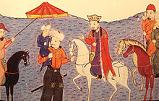
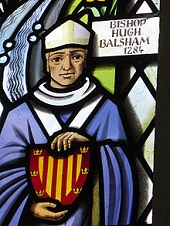
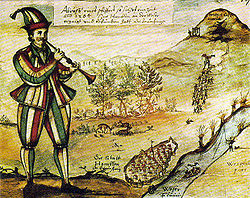
1284 Pope Innocent III predicted in 1213 that the Second Coming of Christ will happen this year because it is 666 years after the formal foundation of Islam (618), and Muhammad was obviously the Antichrist. In Jan. Prince Alexander (b. 1264), last male heir of widower (since 1275) Alexander III of Scotland dies, leaving only his 9-mo.-old granddaughter Margaret of Norway (b. 1283) as a legitimate heir, which causes him to send a delegation to France to seek a wife next Feb., beginning a long chain of troubles for Scotland as Edward I of England, the Hammer of the Scots decides that this is his cue to finish the pesky Scots off, after he disposes of the Welsh? A little ethnic cleansing a day keeps the Celts away? On Mar. 3 the Statute of Wales (Rhuddlan) sets up a new English govt. regime in Wales "as a member of the same body", with English common law replacing the 10th cent. Laws of Hywel; English settlers are invited in but no attempt is made to assimilate the Welsh; the marcher lords remain separate, and the English border barons go on to stink themselves up with tyranny, leading to the Owen Glendower Revolt of 1400. On Apr. 4 king (since 1252) Alfonso X the Wise (b. 1221) dies in Seville, and his son Sancho IV (the Brave) (1258-95) becomes king of Castile and Leon (until Apr. 25, 1295), ignoring the wishes of his daddy, who wanted the heirs of his dead elder brother Ferdinand de la Cerda (Hair Sprouting from His Chest) (1253-75) to rule, and a power struggle ensues, with Sancho IV bravely winning after executing 4K. On Apr. 25 Edward II (d. 1327), son of Edward I is born in Wales, and Alexander III hints to Edward I that he might later marry his granddaughter Margaret of Norway - I'm so hot for him and he's so cold? On Aug. 6 (Sun.) the 93-galley fleet of the Repub. of Genoa under adm. Oberto Doria (-1295) defeats the 72-galley fleet of rival city-state Pisa under adm. Alberto Morosini at the naval Second Battle of Meloria (1st in 1241) in the Tyrrhenian Sea off Bologna; Genoa enters a golden age, while Pisa begins to lean into permanent decline. On Aug. 16 after his bold daddy Philip III the Bold pushes him into it in an attempt to annex the yummy old Biscayan kingdom of Navarre to France, 16-y.-o. Philip IV the Fair ("the Pest of France" - Dante) marries 11-y.-o. princess Jeanne (Joan) I of Navarre (1273-1305), countess of Champagne (whose mother Blanche of Artois had sought Philip III's protection for her), obtaining Navarre, Champagne, and Brie for the French crown (until 1328) - sounds like a picnic? On Aug. 10 after obtaining limited help from the Mamluks, and being defeated by the larger army of pro-Christian devout Buddhist Arghun Khan (1258-91), Tekuder is executed on Aug. 10, and Arghun becomes Mongol Ilkhanid khan #4 of Persia (until Mar, 7, 1291), going on to send ambassadors next year to Pope Honorius IV offering a Franco-Mongol Alliance against the Muslims in the Holy Land, which is not answered even though it contains the soundbyte: "As the land of the Muslims, that is, Syria and Egypt, is placed between us and you, we will encircle and strangle ("estrengebimus") it. We will send our messengers to ask you to send an army to Egypt, so that us on one side, and you on the other, we can, with good warriors, take it over. Let us know through secure messengers when you would like this to happen. We will chase the Saracens, with the help of the Lord, the Pope, and the Great Khan"; more missions in 1287, 1287 and 1289 are also snubbed. On Aug. 29 (St. John's Day) the Pied Piper of Hamelin allegedly leads 130 children out of town to a cave on Koppen (Koppelberg) Hill/Mt. after he isn't pied, er, paid for luring the town's rats into the Weser River, extorting several times the original price in gold; the story is put on a stained glass window in the Church of Hamelin around 1300; pied means dressed in variegated-colored duds - I'll get rid of your rats for a thousand guilders to buy sequins for my pied piper duds? Pope Martin IV excommunicates and deposes Peter III of Aragon, and makes his teenie nephew Charles of Valois (1270-1325) (4th son of Philip III and Isabella of Aragon) king of Aragon and Sicily, starting the Aragonese Crusade, a struggle to end Aragon's control of Sicily (ends 1291). Charles I of Anjou convinces his nephew Philip III of France to march down to Italy to help him, but his forces get trapped at Genoa and he returns home. The Mongols invade Vietnam, capture Thang-Long (Hanoi) and win some early Vs, but the resourceful Vietnamese counterattack, trap the Mongols in the jungle heat, cut off their supply lines, and rout them. Gianciotto Malatesta of Rimini, married since 1275 to Francesca da Rimini (daughter of the prince of Ravenna) kills her and her brother for adultery. Jonkoping (Jönköping) becomes the first Swedish city to be granted a charter, from magnanimous Magnus I. The king of Ceylon sends a relic of the Buddha to Kublai Khan. Architecture: Egyptian Bahri Mamluk sultan #7 (1279-90) Al-Mansur Qalawun (1222-90) founds the Maristan al-Mansuri, the greatest hospital of the Middle Ages, which provides free medical and mental treatment, and provides dischargees with money so they don't have to return to work immediately. Peterhouse College is founded at Cambridge U. by Hugo (Hugh) de Balsham (-1286), bishop of Ely, and chartered by Edward I, becoming its oldest college. Ruthin School in Denbighshire, North Wales is founded by Reginald de Grey, becoming one of the oldest British public schools to survive to modern times; it goes co-ed in 1990. Inventions: Sequins are first coined in Venice. Births: English king (1307-27) (gay/bi?) Edward II (d. 1327) on Apr. 25 in Caernarfon Castle, Wales; son of Edward I (1239-1307) and Eleanor of Castile (1241-90); father of Edward III (1312-77). Dutch count of Holland (1296-9) John I (d. 1299); son of Count Floris V; father of John II of Avenes (1247-1304). English gay bud (of Edward II) Piers Gaveston, 1st Earl of Cornwall (d. 1312). Italian Sienese School painter Simone Martini (di Martino) (d. 1344); pupil of Duccio de Buoninsegna - named after the pope? Scottish king (1332-56) Edward de Baliol (d. 1364); son of John I Balliol (1249-1313). Deaths: Turkish humorist writer Nasrettin Hoca (b. 1208), leaving The Hungry Coat and other stories. Scottish prince Alexander (b. 1264) in Jan.



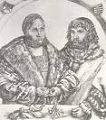


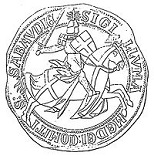
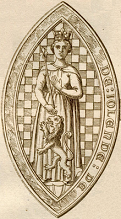
1285 By this year longtime pagan Prussia is completely subjugated and ruled by the Teutonic Knights as a papal fief. On Jan. 6 Charles I of Anjou (b. 1226) dies while his son Charles II (the Lame) of Anjou (1254-1309) is being held captive by the Sicilians; the latter concedes the Two Sicilies to Peter III to secure his release, but Peter III (b. 1239) dies on Nov. 11, and is succeeded in Aragon by his eldest son Alfonso III (the Liberal) (the Frank) (1265-91), and in the Two Sicilies by his 2nd son James II (1267-1327); a treaty is negotiated whereby James II renounces his claim to Sicily in favor of the pope, and Charles II gets the mainland portions, but the Sicilian parliament revolts and crowns Peter III's 3rd son Frederick III (1272-) in a long war; Peter's youngest son and namesake Peter IV of Aragon (1275-1296) is left out of the inheritance. On Jan. 24 Wenceslaus II of Bohemia marries Judith of Hapsburg, daughter of HRE Rudolf I. On Mar. 28 Pope (since 1280) Martin IV (b. 1210) dies after gorging himself on eels (later stigmatized by Dante), and on Apr. 2 Giacomo Savelli is elected Pope (#189) Honorius IV (-1287). In May the Cross of Neith (Y Groes Naid), a fragment of the True Cross once prized by the Gwynedd rulers of Wales is paraded through London in a procession led by the king, queen, archbishop of Canterbury, and 14 bishops, followed by the magnates of the realm - Wales has been absorbed by Edward Borg? On June 18 Yekuno Amlak dies, and Yagbe'u Seyon (Yagbea-Sion) (-1294) becomes Solomonic emperor of Ethiopia (until 1294), continuing his father's attempts to convince the Muslim Egyptians to appoint a metropolitan for the Ethiopian Orthodox Church, in vain. On Sept. 4 the naval Battle of Les Formigues (Las Hormigas) 50 mi. NE of Barcelona is a D for James II of Majorica, after which his nephew Alfonso III of Aragon annexes the Balearic Islands (until 1295). On Oct. 1 after his paternal uncle count (since 1268) Philip I of Savoy (b. 1207) dies without heir, and his elder brother Thomas III of Piedmont was killed in an accident in 1282, and Philip I's will appoints his niece Eleanor of Provence and her son Edward I of England as adjucators of his estate, who award Amadeus V (the Great) (1249-1323) the county of Savoy (until 1323), and his younger brother Louis I the barony of Vaud, Amadeus V is declared protector of Geneva by the bishop of Geneva, pissing-off Count Amadeus II of Geneva, who considered it his hereditary title, starting a war that ends in 1287 when Amadeus V captures Ile Castle in the Rhone River near Geneva after a 14-week siege; in 1295 Amadeus VI acquires the fortress of Chambery (Chambéry) in the Auvergne-Rhone-Alpes region of E France, making is his seat, and has it decorated by Giotto's student Georges de Aquila. The original I'm too sexy for my shirt takes over the French quatre-walk? On Oct. 5 French king (since Aug. 25, 1270) Philip III (b. 1245) dies in Perpignan after getting sick on his return home, claiming on his deathbed that his conquests were in the name of his family and not against the Church; his handsome recently-married teenie son Philip IV (Quatre) (the Fair) (the Handsome) (Le Bel) (1268-1314) (known for his long blonde hair) becomes Capetian king #11 of France (until 1314), ruling as a "constitutional king", letting himself be bound by law and precedent while trying to extend royal authority as far as possible, which means destroying the feudal system, while he cultivates an aloof image, causing people to call him a "useless owl"; "He is neither man nor beast, he is a statue" (Bishop Bernard Saisset of Pamiers). On Oct. 15 Alexander III of Scotland (b. 1241) marries his much younger 2nd wife Yolande de Dreux (1263-1330), sister of Count Jean of Dreux at Jedburgh, with a ghostly apparition allegedly appearing at the wedding as a bad omen - what else can go wrong? The Mongols attack Champa and Annam. The Statute of Merchants is passed in England. A blood libel in Munich, Germany results in the death of 68 Jews; 180 more are burned alive in a synagogue. London develops problems with smog - burning too many Jews? The town of Ryezhitsa (Rezekne) (Rositten) in Latvia (55 mi. NE of Daugavpils) is founded by the Teutonic Knights. After his life love Beatrice Portinari marries banker Simone dei Bardi in 1277, Dante Alighieri marries Gemma Donati; when Babe B dies in 1290, he's messed up for life? Inventions: The first mechanical clock is installed in St. Paul's Cathedral in London; it uses a verge-and-foliot (shaft with a weighted crossbar) escapement, which has an error of several hours per day and is temperature sensitive. The first spectacles for farsightedness are developed by Dominican friar Alessandro della Spina. Nonfiction: Abraham Abulafia (1240-92), The Light of the Intellect; "It is well known that the letters (of the Hebrew alphabet) have no vibration of their own, and therefore the Blessed God set into nature, in accordance with the Intellect, powers into the whole mouth in order to bring the letters into pronunciation, according to the form of their existence as found in books." Births: Chinese Yuan emperor (1311-20) Ren Zong (Ayurbarwada Buyantu Khan) (d. 1320) on Apr. 9. Spanish king of Castile (1295-1312) Ferdinand IV (the Summoned) (El Emplazado) (d. 1312) on Dec. 6 in Seville; son of Sancho IV the Brave (1257-95) and Maria de Molina (1265-1321). French countess (of Evreux) Marguerite d'Artois (d. 1311); eldest child of Philip of Artois and Blanche of Brittany; wife of Louis d'Evreux, son of Philip III and 2nd wife Maria of Brabant; mother of Marie (1303-35), Charles (1305-36), Philip III of Navarre (1306-43), Margaret (1307-50), and Joan (1310-70), wife of Charles IV. French Franciscan Order minister gen.(1329-49) Geraldus (Gerardus) Odonis (Guiral Ot) (d. 1349) in Camboulit, Lot. Deaths: Savoy count (1268-85) Philip I (b. 1207) on Aug. 16 in Roussillon, Isere; dies without heirs. Welsh theologian John of Wales (b. 1220). French king of Sicily (1266-85) Charles I of Anjou (b. 1226) on Jan. 6 in Foggia. Spanish king of Aragon and Valencia (1276-85) and king of Sicily (1282-5) Peter III of Aragon (b. 1239) on Nov. 2 in Vilafranca del Penedes; Dante's "Divine Comedy" portrays rivals Charles I of Anjou and Peter III "singing in accord" outside the gates of Purgatory. French king (1270-85) Philip III (b. 1245) on Oct. 5 in Perpignan. Ethiopian emperor (since 1270) Yekuno Amlak on June 19. French trouvere Rutebeuf (b. 1245).



1286 On Apr. 11 Pope Honorius IV excommunicates King James II of Sicily. On Mar. 19 shortly after telling his parliament to recognize the "illustrious girl Margaret... as our lady and right heir of our said lord king of Scotland", Alexander III (b. 1241) holds a long wine-soaked council with his nobles, decides to see his pregnant wife Yolande at Kinghorn Manor in Fife, takes a ferry across the Forth, then insists on riding his horse alone the last 8 mi. from Inverkeithing; too bad, his horse throws him on the beach, breaking his neck at Pettycur 1 mi. from his destination, and he is found the next morning on the shore; after his wife Yolande miscarries in the summer, and tries to cover it up by wearing pillows until she is found out, Scotland's worst nightmare comes true as Alexander III's 3-y.-o. granddaughter Margaret of Scots, the Maid of Norway (1283-90) is left as the only legitimate heir of the Canmore Dynasty; for the first time six guardians (two earls, two barons, two bishops) are chosen to govern the "community of the realm", acknowledging Margaret as future queen, which causes her to become the most eligible babe of the Wild West; the later near loss of independence causes Scottish nationalists Robert the Bruce et al. to pump Alexander III up as the ideal king of Scotland's Golden Age of Milk and Honey (don't say Camelot), and somebody to compose the poem Lament for Alisaunder, when he was actually just a so-so king, visiting nunneries in secret to dip his wick and leaving a large unpaid bill for Bordeaux claret, and was just lucky to preside over an expanding economy? - the original JFK? On Oct. 8 John I the Red (b. 1217) dies, and his son John II (1239-1305) (husband of Edward I of England's sister Beatrice) becomes duke of Brittany and 2nd earl of Richmond (until 1305). On Nov. 22 Eric V (b. 1249) dies, and his 12-y.-o. son Eric VI Menved Eriksson (1274-1319) becomes king of Denmark (until 1319), doing a bang-up job before the German Hanseatic League gets strong enough to take over. Edward I of England does homage to Philip IV of France for Guienne. A Jewish pogrom in Oberwesel, Germany starts after some Jews are accused of draining the blood of a Christian, resulting in 40 killed; this causes the Jews to give up and begin emigrating from the Rhineland in Germany (incl. Mainz, Worms, and Speyer) to Palestine to live under the Muslims, while a minority head for Poland and Lithuania, which welcomes them. The unpopular Gabelle (Arab. "qabala" = he received) commodity tax is first levied in France by Philip IV, going on to become restricted to salt in the mid-14th cent., with a mininum weekly purchase required by every person over eight years old, after which six "pays" (provinces) each develop their own price (highest for salt coming from the Atlantic, half that for salt coming from the Mediterranean), aggravating the situation and causing a black market to flourish. Nonfiction: Moses of Leon (1240-1305), Sefer (Seper) ha-Zohar (Book of Splendor); bestseller covering all the elements of the Qabbala; claims it was written by 2nd cent. rabbi Simon ben Yohai; too bad, he has him refer to an eclipse in Rome in 1264, and his wife admits that he is doing it for money. Raymond Lully (1235-1315), Libre de Maravelles. Births: Spanish king of Castile (1295-1312) and Leon (1301-12) Ferdinand IV "the Summoned" (d. 1312) on Dec. 6 in Seville; son of Sancho IV. English high commissioner and favorite of Edward II (bi?) Hugh le Despenser the Younger (d. 1326); son of Hugh le Despenser the Elder (1261-1326) - hugh both are indispensible? Scottish military leader Sir James "Black" Douglas (Gaelic "dubh glas" = dark water) (d. 1330) in Douglas, Lanarkshire; son of Sir William the Hardy of Douglas (-1298); educated in Paris; knighted in 1314. Italian Franciscan missionary Odoric (Odorico) Mattiuzzi (Mattiussi) of Pordenone (d. 1331) in Villanova (near Pordenone), Friuli. Dutch count of Holland and Zeeland (1304-37) ("the Father-in-Law of Europe") William I the Good, Count of Hainault (Hainaut) (William III of Avesnes) (d. 1337); son of John II of Avesnes (1247-1304); wife of Jeanne of Valois (sister of Philip VI of France); father of Count William II of Hainault (1307-45), Countess Margaret II of Hainault (1311-56) (wife of HRE Louis IV), Philippa of Hainault (1311-69) (wife of Edward III of England), Joanna of Hainault (1315-74) (wife of Duke William V of Julich), and Isabelle of Hainault (1323-61) (wife of Robert of Namur). French duke of Brittany (1312-41) John (Yann) (Jean) III (the Good) (d. 1341) on Mar. 8 in Chateau de Champtoceaux; son of Arthur II (1262-1312) and 1st wife Mary of Limoges. Deaths: French duke of Brittany (1237-86) John I the Red (b. 1217) on Oct. 8. Syrian bishop and brain man Gregory Bar Hebraeus (b. 1226) on July 30 in Maraga, Persia; leaves Cream of Science (Aristotelian philosophy), Book of the Pupils of the Eyes (logic and dialectics), Storehouse of Secrets (Bible commentary), and Chronicon Ecclesiasticum (history of the West Syriac church, the patriarchs of Antioch, the Eastern Church, the Nestorian patriarchs, and the Jacobite Maphrians). Scottish king (1249-86) Alexander III (b. 1241) on Mar. 19 in Fife. Endlish bishop Hugh (Hugo) de Balsham (b. ?) on June 26 in Dodington Manor, Isle of Ely.
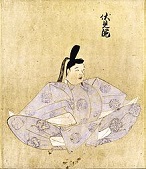
1287 On Feb. 2 Rudolf of Hapsburg is finally crowned HRE in Rome, and proclaims a Public Peace at the Diet of Wurzburg. On Feb. 27 Charles of Salerno signs a contract renouncing his claims in Sicily in favor of James II of Aragon; the pope repudiates it, and on June 24 (midsummer) (St. John's Day) the Battle of the Counts (Sorrento Bay) near Naples between Charles II of Naples and James II of Aragon sees a fleet of 40-45 Aragonese and Sicilian galleys commanded by Roger of Lauria defeat a fleet of 70 Angevin galleys commanded by Reyald III Quarrel of Avelia and Narjot de Toucy, with 12K Angevins KIA, 40 galleys captured, and 5K taken POW. In Feb. the South England Flood of 1287 destroys Winchelsea and Broomhill, and diverts the Rother River away from New Romney, ending its role as a port, allowing Rye to take its place; New Winchelsea is built on higher ground; on Dec. 14 after a huge storm and storm tide in the North Sea and English Channel, St. Lucia's Flood kills 50K-80K in the Netherlands and N Germany, becoming one of the largest floods in recorded history, with a freshwater lake connected to the North Sea by the Vlie River becoming the Zuiderzee (Southern Sea), reshaping the coastline and giving sea access to Amsterdam; on Dec. 14 the storm and tide kills thousands in England; the port of Dunwich in Suffolk, England is devastated; the monastery of Spalding, England is destroyed. On Apr. 3 Pope (since 1285) Honorius IV dies, and it takes almost a year to elect a replacement. On Apr. 4 as the Mongols invade Burma, the Theravada Buddhist Hanthawaddy Pegu Kingdom in Lower Burma (ends 1552) is founded by King Wareru (1253-1307), with capital at Martaban (Mottama). On June 8 Rhys ap Maredudd revolts in Wales (until 1288). On July 17 a mob in Oberwesel, Germany kills 40 Jews after a ritual murder accusation. On Nov. 27 emperor (since Mar. 6 1274) Go-Uda (b. 1267) abdicates, and his 1st cousin Fushimi (1265-1317), 2nd son of Go-Fukakusa becomes Japanese Yamato emperor #92 (until Aug. 30, 1298). The Mongols led by Khan Talabuga and Nogai Khan invade a-one-and-a-two-and-a-3-a (3rd time) Poland, ravaging Lublin, Mazovia, Sandomierz, and Sieradz; Leszek the Black flees to Hungary; the Mongols are defeated and fail to take Cracow (Krakow). The Polos accompany Kublai Khan on an expedition to destroy his uncle Nayan; Kublai has 260K cavalry and 100K infantry, while Nayan has 400K horsemen; the Mongols invade Champa and Vietnam (until 1288), and Burma (Pagan), where Narathihapate has just died, winning the Battle of Pagan in Dec., ending the Pagan Empire, which disintegrates into smaller kingdoms; Lanna King Mangrai and Sukhothai King Khamhaeng agree to a peace in Thailand. Egyptian Mamluk sultan Al-Mansur Qalawun captures the port city of Latakia in Syria; meanwhile Mongol ilkhan Arghun sends Beijing, China-born Nestorian monk-traveler-diplomat Rabban Bar Sauma (Sawma) (Cauma) ("son of fasting") (1220-94) (of Turkic Uyghur origin) from Baghdad to the leaders of Europe with a large retinue and 30 riding animals to negotiate an alliance against the Mamluk sultanate, witnessing the naval Battle of Sorrento Bay, then visiting Rome and receiving communion from new pope Nicholas IV on Palm Sun. 1288 before returning to Baghdad in 1288 without success, then writing his memoirs, which give an alternative view of Kublai Khan compared to Marco Polo, along with a Chinese view of Europe, causing him to become known as "the Reverse Marco Polo". Edward I of England orders the expulsion of the Jews from he duchy of Gascony, and confiscates their property. Siena, Italy exacts its first forced loan on taxpayers. Architecture: The Altar of St. James in Pistoia Cathedral in Italy is begun, taking almost 200 years, eventually containing a ton of silver. Uppsala Cathedral in SE Sweden is begun (finished in 1435). Science: Spanish missionary-alchemist Raymond Lully (1235-1315) discovers nitric acid. Births: English coulda-been king (1329-30) Marcher lord Roger Mortimer, 1st Earl of March (d. 1330) on Apr. 25 (Feast of St. Mark) in Wigmore Castle, Herefordshire; eldest son of Edmund Mortimer, 2nd baron Mortimer (1251-1304) and Margaret de Fiennes; consort of Queen Isabelle of England; grandfather of Roger Mortimer, 2nd earl of March (1328-60); same birthday as Edward II. Deaths: German poet Konrad von Wurzburg (b. 1225) on Aug. 31; leaves Trojanerkrieg (The Trojan War) (unfinished).



1288 On Feb. 22 Girolamo Masci is elected Pope (#190) Nicholas IV (1227-92) (first Franciscan) - nick four francisco popo? On June 5 the Archbishop of Cologne's army is defeated by Duke John I of Brabant at the Battle of Worringen, N of Cologne, giving Brabant possession of the duchy of Limburg, and ending the War of the Limburg Sucession (begun 1283); Count Adolf V von Berg grants Dusseldorf the right to call itself a city. Edward I of England mediates a treaty confirming James II of Aragon as king of Sicily, but Pope Nicholas IV annuls it. Leszek the Black (b. 1241) dies, and the throne of Cracow is up for grabs for years; Silesian duke of Wroclaw (since 1266) Henryk IV Probus (Lat. "righteous") (1258-90) (of the Silesian branch of the Piast Dynasty) seizes power first, becoming high duke of Poland (until June 23, 1290). Philip IV begins a battle with the bishop of Poitiers and the cathedral chapter of Chartres (ends 1290), winning an acknowledgement of the principles of royal temporal jurisdiction throughout his realm, and that clerical privileges are guaranteed by the king not the pope. After complaints over taxes, Philip IV of France tightens his control over Flanders. The Code of Croatian Customary Law is written in Novi Vinodolski. The Mongols invade Turkey and Asia Minor. The Vietnamese turn into guerrilla fighters, cut off the Mongol supply lines, and kick their butts out of the country. Lady Ganapati of Kakati in E India dies. The Slave Dynasty of Delhi (founded 1206) ends, and in 1290 is succeeded by the Muslim Khilji (Khalji) Dynasty (ends 1320), starting with Jalal-ud-din Khalji (Firuz) (1226-96) (until July 19, 1296), becoming the 2nd dynasty to rule the Delhi Sultanate of India, going on to make conquests in S India while fending off the Mongols and converting some of them to Islam. Under Philip IV the first mass-burning of Jews on the stake takes place in France. Ethiopian emperor (since 1285) Yagbe'u Seyon sends a bishop on pilgrimage to Jerusalem, and on his return he is captured by the sultan of Adal in Somalid (or Aden in Arabia), who tries to convert him to Islam and then circumcises him when he fails, pissing-off the emperor, who marches on Aden, kicks his butt, and captures his capital of Zeila; the story was related by Marco Polo. The first beer brewer in Frankfurt am Main, Germany is mentioned in city ordinances. Architecture: The pointed Gothic Muncipal Palace in Siena, Italy is begun (finished 1309). Inventions: Chinese soldiers use Heilongjiang bronze hand-held cannon to fight the Mongols in Manchuria; the Chinese have 3K cast bronze and iron cannon mounted on the Great Wall of China; the oldest cannon to survive to modern times dates to this year, and has a muzzle bore diam. of 1 in.; the 2nd oldest is from 1332 (4 in.). Nonfiction: Abraham Abulafia (1240-92), The Book of the Sign (Sefer ha-Ot). Fra Salimbene, Chronicle; Franciscan monk tells all that goes on behind the scenes, mostly boring. Births: Japanese Yamato emperor #93 (1298-1301) Go-Fushimi (Fushimi II) (Tanehito) (d. 1336) on Apr. 5; son of Fushimi (1265-1317) - Go Fish? Japanese Yamato emperor #96 (1318-39) Godaigo (Daigo II) (d. 1339). Russian grand duke of Moscow (1328-40) Ivan I Danilovich (Kalita) (Moneybags) (d. 1340); son of Danil Alexandrovich (1261-1303); father of Simeon Ivanovich Gyordi (1316-53). Hungarian king (1301-42) Charles I Robert (Carobert) (d. 1342) in Naples, Italy; grandson of Charles II of Naples (1254-1309) and Maria of Hungary (1257-1323). French philosopher-mathematician-astronomer-physician (Jewish) Levi ben Gerson (Gersonides) (Magister Leo Hebraeus) (d. 1344) (AKA RLBG) in Bagnois-sur-Ceze. Deaths: Arab Muslim physician Ibn al-Nafis (b. 1213) on Dec. 17. Polish king (1279-88) Leszek the Black (b. 1241). French poet Adam de la Halle (b. 1245).




1289 In Mar. after German-descent Italian Ghibelline "Cannibal Count" and naval cmdr. Ugolino della Gherardesca (1220-89) of Pisa is arrested for treason, he starves to death with his enemy Archbishop Ruggieri in the (leaning?) Muda Tower in Pisa after being entrapped in ice up to the neck in the same hold, causing Ugolini to gnaw on Ruggieri's skull; Dante relates the episode in his "Inferno", assigning them both to the ice of the 2nd ring (Antenora) of the lowest circle - the original Hannibal the Cannibal? On May 29 Pope Nicholas IV crowns Charles II of Anjou as king of Sicily and Naples (the Two Sicilies). On June 11 the Battle of Campaldino is a V for 12K pro-papal Guelphs over 11K pro-HRE Ghibbelines from Arezzo, securing Florence for the Guelphs; Dante Alighieri fights for the Guelphs. On July 18 the pope's constitution grants the cardinals one-half of the revenues of the Apostolic See plus a share in the financial admin. In Nov. after Edward I secured papal approval in May the Treaty of Salisbury (Birgham) betrothes Edward II of England to Margaret the Maid of Norway. King (since 1269) Leon III (b. 1236) dies of arsenic poisoning, and his Frankish Christian son Hetum (Hethum) II the One-Eyed (1266-1307) becomes king of Mongol-controlled Lesser Armenia (Cilicia) (until 1293, then 1295-6, and 1299-1303), writing a Chronicle of Armenia. Pope Nicholas IV sends Franciscan missionary Giovanni da Montecorvino (1247-1328) to China; after staying in Madras from 1291-2, he arrives in Khanbalik (Peking) in 1293. Pope Nicholas IV issues a bull combining several schools dating back 100+ years into the U. of Montpellier in Montpellier, France on the Lez River 31 mi. SW of Nimes, with the school of medicine starting out on the wrong foot by claiming that the Black Death is caused by a miasma entering open body pores, arguing against bathing; in 1529 it expels student Nostradamus for having worked as an apothecary; alumni later incl. Rabelais and Paul Joseph Barthez; in 1593 it founds the Jardin des Plantes de Montpellier, becoming the first botanical garden in France. Inventions: Letters containing block printing are sent from Persia to the king of France, going on to be developed in Ravenna. Births: Hungarian king (1301-5) and Bohemian king (1305-6) Wenceslaus (Wenceslas) III Premyslid (d. 1306) on Oct. 6 in Prague; son of Wenceslaus II (1271-1305) and Judith of Hapsburg (daughter of Rudolf I of Germany); brother of Elisabeth I of Bohemia (1292-1330), wife of John the Blind of Luxembourg (1296-1346); last Premyslid ruler of Bohemia. French Capetian king (1314-6) Louis X (le Hutin) (the Quarreler) (the Stubborn) (d. 1316) in Oct.; son of Philip IV (1268-1314) and Jeanne I of Navarre (1271-1305); founder of the French House of Navarre through 1st wife Margaret of Burgundy, their son Jeanne, Queen of Navarre, her hubby Philip of Evreux, and their son Charles of Navarre. Austrian/German Hapsburg duke (1308-30) Frederick I/III (the Handsome) (the Fair) (d. 1330); son of Albert I (1255-1308) and Elisabeth of Tirol (1262-1312) in Vienna; brother of Otto IV the Merry (1301-39) and Albert II (1298-1358). King of Hungary-Croatia (1308-) Charles I (Charles Robert) (d. 1342); eldest son of Charles II of Naples (1254-1309) and Maria Arpad of Hungary (1257-1323). Italian Renaissance painter Vitale (Vidolini) da Bologna (d. 1369) (b. 1309?).

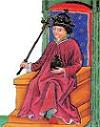


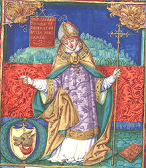
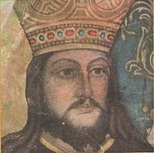


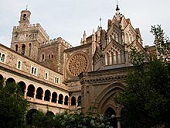
1290 The Joachites, followers of Joachime of Fiore (1135-1202) proclaim that this year will see Armageddon, since it didn't happen in 1260 like he originally predicted; they later reschedule it for 1335 - because nobody has to live with frizz? On Feb. 1 Mamluk sultan #10 (since 1287) Kaikobad is murdered by a Khilji (Khalji), and Jalauddin (Jalal ud din Firuz Khilji) (-1296) becomes sultan #1 of the Muslim Turkic Khilji (Khalji) Dynasty in N India (ends 1320), ruling from Kilughari near Deli, becoming the 2nd dynasty to rule the Delhi Sultanate, going on to raid into S India and defend against repeated Mongol invasions while becoming known for faithlessess and ferocity. On July 10 Ladislas IV the Cuman (b. 1262) is murdered in his camp by the Cumans for deserting them, and his Venetian-born distant relative (son of Stephen d'Este and Tomasina Morosini, and grandson of Andrew II via 3rd wife Beatrice d'Este) Andras (Andrew) III (the Venetian) (1265-1301) is elected as the last native Arpad king of Hungary by the barons (until Jan. 14, 1301), and moves in from Italy and marries Polish princess Fenenna of Kujavia to go native (their only child dies in infancy); this being too off-the-wall for him, HRE Rudolf I appoints his son Albert (Albrecht) I of Hapsburg (Habsburg) (1255-1308) on Aug. 31, but Pope Nicholas IV confers the throne upon Charles Martel of Anjou (1271-95), eldest son of Charles II of Naples and Maria of Hungary, and a battle royal ensues, with Martel only able to gain control of parts of Croatia before croaking in 1295, but leaving able son Charles I Robert (b. 1288), who finishes the job in 1310. Who's that lady, beautiful lady, lovely lady, really fine lady, look but don't touch? Big mistake in Scotland? On July 18 the Treaty of Birgham (Salisbury) in Berwickshire between Edward I of England, Eric II of Norway, and the Six Scottish Guardians formalizes the betrothal of 6-y.-o. Edward II (b. 1284) to 7-y.-o. Queen Margaret of Scots (b. 1283), the Maid of Norway, with the happy couple to hold Scotland as a "separate and divided" kingdom; Edward I sends a lavish fleet (captained, according to the folk song, by Sir Patrick Spens, who is sent "To Noroway, to Noroway") to fetch the bride from Norway, but she leaves Bergen in Aug. in a Norwegian vessel under the care of Bishop Navre of Bergen bound for Norwegian soil on Orkney, where an embassy of Scottish knights sent by William Fraser, bishop of St. Andrews is to meet and escort her to Scone for her inauguration; too bad, on Sept. 26 the first rumors reach Scotland that she has died of illness (smallpox? too much rotten walrus meat?) before or after reaching Orkney, and is taken back to Bergen, ending the Canmore Dynasty and leaving no obvious heir, bringing out the worst in Scottish clannishness, starting with Robert Bruce, 5th Lord of Annandale arriving at the site of Queen Margaret's planned coronation with an army after hearing that his friends the earl of Mar and earl of Atholl are raising their forces; the descendants of David of Scotland, 8th Earl of Huntington (1144-1219), paternal grandson of David I of Scotland, and brother of William I the Lion (father of Alexander II, who started the spent line of Alexander III) lead the pack of 13 claimants, who incl. Edward I himself (whose claim is based on his descent from Edith, wife of Henry I of England and daughter of Malcolm III of Scotland), John de Balliol (1249-1313), son of John Balliol, 5th baron de Balliol of Barnard Castle and Devorguilla of Galloway (daughter of David's daughter Margaret), Robert Bruce, 5th Lord of Annandale (1215-95) (grandfather of future King Robert I the Bruce), and John Hastings, 2nd Baron Hastings (1287-1325); too bad, since there are three women between them and Earl David, and you know what they think about that, civil war looms, with the Bruces, who are lords of Annandale and earls of Carrick in camp #1, and the Balliols, who are lords of Durham and Galloway, backed by the Bruce's local rivals the Comyns and other lords of Galloway in camp #2; smelling napalm (victory) in the morning, and already considering himself king, er, overlord of Scotland, Edward I holds a parliament in Kings Clipstone in Nottinghamshire and summons the Scottish magnates to meet him at Norham Castle in NW Nottinghamshire, claiming the right (of Norman blueblood superiority?) to mediate and decide the controversy, with an implied threat of English invasion; despite opposition by the Scottish people, each candidate acknowledges Edward I as overlord by next May, letting him appoint a commission to examine their claims, meanwhile taking over the govt. of Scotland himself - so Longshanks can tell his puppet commissioners to choose the biggest whimp, who will become his puppet king and march into Scotland leading an English army to take it without firing an arrow, with the sell-out Normanized Scottish nobles applauding it, while the "inferior" Celtic common Scots are scheduled for extermination, forcing the real patriots to flee to the highlands to fight for their free-ee-ee-dom? Or was Balliol really the best claimant, and Scotland's time was just up? Like all wars, the Jews started this one too, right Mel (insert music and mugshot here?) On Nov. 28 as they travel from Clipstone toward Lincoln, Eleanor of Castile (b. 1241), beloved queen consort (since 1254) of English king (1272-1307) Edward I "Longshanks" (1239-1307) dies in the village of Harby in Nottinghamshire (10 mi. from Lincoln), and he is so grief-stricken that he has an "Eleanor Cross" ("of immense height") called chere reine (Fr. "dear queen") erected at each site (Lincoln, Grantham, Stamford, Geddington, Northampton, Stony Stratford, Woburn, Dunstable, St. Albans, Waltham, Westcheap) where her body is set down during the journey back to Westminster Abbey in London, the last one, Eleanor Charing Cross in the hamlet of Charing, Westminster, London later being used as the geographical center of London; needing to blow off steam, on July 18 Edward I issues the Edict of Expulsion, ordering the 16K remaining pesky Jews (who since 1218 had to wear a marking badge) expelled from England by Nov. 1 (9th of Av), abandoning their real estate and loans, and it's bye-bye for over 350 years until Oliver Cromwell lets them return in 1655 (expelled rather than burned, so not to contribute to the recent smog problem?); allowed to take only what they can carry, they pay mucho dinero for their passage and are thrown overboard by ship captains, who keep everything, then turn around to pick up the next boatload?; those who reach France are ordered to leave by Lent of 1291; Italian goldsmiths from Lombardy take over the moneylending business in England, and are granted some land in London which later becomes known as Lombard Street, the main banking center. In Nov. John Balliol, claiming to be "heir to the kingdom of Scotland" grants lands in Cumberland held by dead king Alexander III to Bishop Anthony Beck of Durham, Edward I's emissary to Scotland - in order to impress him? On Dec. 18 king (since 1275) Magnus III (b. 1240) dies, and his son Birger Magnusson (1280-1321) (who was hailed as king at age 4 by his father) becomes king of Sweden (until Apr. 1318), being crowned in Soderkoping after marrying Princess Martha of Denmark, daughter of Eric V. Charles of Valois is defeated and renounces his claim to Sicily in return for Anjou. Wenceslaus II (b. 1271) has his mother's secret hubby Zavis of Falkenstein (b. 1245) beheaded, and begins his personal rule in Bohemia. Henry IV Probus is killed, and his son Przemysl (Premislas) II (1257-96) is crowned king of Poland (until Feb. 8, 1296) by Gniezno archbishop Jakub Swinka (-1314) of Gniezno. The Court of King's (Queen's) Bench is established in Dublin, Ireland, becoming one of the Four Courts. About this time the principality of Wallachia (Walachia) between the Danube River and the Transylvanian Alps is founded by a group of Orthodox Slavonic Walachians (Vlachs) from Roman Catholic Hungary, led by maybe-real-maybe-not Radu ("joy") Negru (Rudolph the Black) (1269-) under the suzerainty of Hungary (until 1330). An episcopal see is founded in Orvieto (Urbs Vetus) in C Italy, with Pope Nicholas IV laying the cornerstone of the Gothic Cathedral of Orvieto on Nov. 13. King Rudolph of Hapsburg gives the city of Duisburg to the duke of Cleves. Italian goldsmiths from Lombardy take over the moneylending business in England, and are granted some land in London which later becomes known as Lombard Street, the main banking center. By this decade the Border Reivers begin raiding and cattle rustling along the lawless English-Scottish border; they aren't stopped until the end of the 16th cent., by Sir Robert Cary, 1st Earl of Monmouth (1560-1639), who crows about it in his autobio. Edward I of England has King Arthur's Round Table painted in Winchester Cathedral, using his own face for Arthur, and reburies the bones of Arthur and Guinevere in a marble tomb in Glastonbury in wild wild Somersetshire in SW England. Lisbon U. is founded in Coimbra, becoming Portugal's only univ. for 620 years. Architecture: Late in this decade in response to a 1287 attack by Earl Alv Erlingsson of Sarpsborg (-1290), Haakon V begins Akershus Fortress in Oslo, Norway, becoming the royal residence, and in modern times the office of the Norwegian PM. In this decade the Royal Monastery of Santa Maria de Guadalupe in Spain is founded after shepherd Gil Cordero discovers a statue of the Virgin Mary that had been hidden from the Moorish invaders of 714, becoming the #1 Spanish monastery for the next four cents. after Alfonso XI declares it a royal monastery for helping him win the 1340 Battle of Rio Salado. In this decade Robert I the Bruce of Scotland builds the Gothic arch Auld Brig o' Balgownie across the Don River in Aberdeen (N Scotland), which survives to modern times; Lord Byron mentions the deep salmon pool below it in "Don Juan". Harlech Castle in Wales (begun 1283) is completed. Nonfiction: Late in this cent. the Triads of Britain (Welsh Triads) begin to be written, preserving Celtic history, incl. King Arthur, Caractacus, and Caswallon. Plays: In this decade the English miracle play The Harrowing of Hell is written in the East Midland dialect, about the trimphant descent of Christ into Hell after his Crucifixion, where he brings salvation to all righteous people who died since Creation; 1 Peter 4:6 says "Good tidings were proclaimed to the dead." Poetry: Late in this cent. the Rondeaux form of poetry originates in France, becoming one of the three formes fixes of French verse along with the Ballade and the Virelai, going on to be used until the 15th cent.; a virelai with only one stanza is called a Bergerette. Dante Alighieri (1265-1321), La Vita Nuova (The New Life); the first sonnet describes his strange dream of Beatrice Portinari; "My lady lay asleep wrapped in a veil./ He woke her then and trembling and obedient/ She ate that burning heart out of his hand." Births: Flemish statesman Jacob van Artevelde (the Brewer of Ghent) (the Wise Man) (d. 1345) in Ghent. Italian philosopher-monk (first opponent of Hesychasm) Barlaam of Seminara (Calabria) (Bernardo Massari) (d. 1348) in Calabria (Seminara, Italy); emigrates to Constantinople in the 1320s; teaches Greek to Petrarch; converts from Greek Orthodoxy to Roman Catholicism. Italian Sienese school painter Ambrogio Lorenzetti (di Lorenzo) (Ambruogio Laurati) (d. 1348); brother of Pietro Lorenzetti (1280-1348). Italian sculptor-architect Andrea Pisano (da Pontedera) (d. 1348) in Pontedera; pupil of Mino di Giovanni; father of Nino Pisano (1315-68). French philosopher-mathematician Jean (Johannes) de Murs (Muris) (d. 1351) in Normandy; relative of Charles V's secy. Julian des Murs. Indian sultan of Delhi (1325-51) Muhammad bin Tughluq (Mohammad Tughlak) (d. 1351). Deaths: Scottish noble Devorguilla of Galloway (b. 1210) on Jan. 28. Chinese painter Qian Xuan (b. 1235). Swedish king (1275-90) Magnus III (b. 1240) on Dec. 18. English queen Eleanor of Castile (b. 1241) on Nov. 28 in Harby, Nottinghamshire. Hungarian king (1272-90) Ladislaus IV the Cuman (b. 1262) on July 10 in Korosszeg (assassinated by the Cumans). Dante's beau Beatrice Portinari (b. 1266). Scottish queen Margaret of Scots, the Maid of Norway (b. 1283) in Sept. English baroness Devorguilla on Jan. 28. Egyptian Mamluk sultan al-Mansur Kalavun.
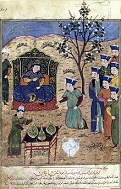



1291 On Feb. 19 the Treaty of Tarascon (halfway between Avignon and Arles) between Pope Nicholas IV, Philip IV of France, Charles II of Naples, and Alfonso III of Aragon ends the Aragonese Crusade (begun 1284) as well as Aragon's domination of Sicily;Alfonso III agrees to go to Rome in person to have his excommunication lifted, pay a tribute of 30 oz. of gold to the Church, carry out a Crusade to the Holy Land, and remove all Aragonese and Catalan knights from Sicily; he also promises that his brother James II will not hold his kingdom against the wishes of the papacy. On Mar. 5 after Arghun Khan grows ill and anti-Jewish riots begin in the Ilkhanid Mongol state in Persia and Iraq (where Jews had figured in the Mongol admin. from the start), Jewish grand vizier (physician) Sa'ad al-Dawla (b. 1240) (Arab. "felicity of the empire") is murdered along with his Jewish associates, and Jews are purged from the Mongol admin.; on Mar. 7 paralyzed pro-Christian Buddhist khan #4 (since 1284) Arghun Khan (b. 1258) is murdered by Mongol cmdr. Ta'achar, and by his nomination his brother Gaykhatu ("amazing/surprising") (-1295) becomes Mongol Ilkhanid khan #5 of Persia (until 1295), becoming known for his dissolute lifestyle incl. wine, women, and sodomy with boys; meanwhile after Arghun loses his favorite wife Bolgana (-1286), and asks his granduncle Chinese emperor Kublai Khan to send him one of her relatives as his new bride, Marco Polo, after 17 years in the service of Kublai Khan and after visiting Indochina, Burma, and Tibet, and serving three years as gov. of Yangchow province returns with his family to Italy, setting out next year from the port of Zayton in boats specially fitted out at the emperor's orders (arrives 1295), visiting Java, Sumatra, Singapore, Ceylon, and the Persian Gulf, accompanying 17-y.-o. princess Kokotchin (Kokochin) (Celestial/Blue Dame) to Persia before returning to Venice via Trebizond (by land) and Constantinople; too bad, the journey to Persia takes two years and Arghun dies, so she marries Arghun's son Ghazan instead. On Apr. 4-May 18 the last Crusader (Frankish) state of Acre (Saint-Jean d'Acre) (Akka) in Syria is sieged and captured by the Mamluks, followed in May by Tyre; the Christian Crusades (begun 1095) end miserably with the expulsion of the Crusaders from the Middle East (Palestine), and the Mamluks in control of all of Egypt and Syria; Pope Nicholas IV calls upon all Christian princes to pray for all the needless deaths, er, take up arms against the Muslims one more time, and for synods to discuss the advisability of uniting the Knights Templar and the Knights of St. John, whose catfights he partly blames for the loss of the Ptolemais; in Aug. he sends a letter to Persian Mongol khan Arghun informing him of plans of Edward I of England to lead another Crusade to recapture the Holy Land, stating that it could only be successful with the help of the "powerful arm" of the Mongols, and asking Arghun to receive Christian baptism and march against the Mamluks; after Arghun dies in Mar. 1291, followed by Nicholas IV in Mar. 1292, Edward I sends Geoffrey de Langley to Persian Mongol khan Gaikhatu, leaving from Genoa and arriving in Tabriz, then returning to Genoa; "Had the Mongol alliance been achieved and honestly implemented by the West, the existence of Outremer would almost certainly have been prolonged; the Mameluks would have been crippled if not destroyed; and the Ilkhanate of Persia would have survived as a power friendly to the Christians and the West" (Sir Steven Runciman, A History of the Crusades, p. 402); meanwhile the Knights of St. John are transferred to conveniently-located Cyprus; too bad, the Templars end up back in Europe with no coverstory and too much land and wealth, causing a ton of pissed-off royals who owe them money to get ideas? - they got sixteen years left? In May Edward I meets with the Scottish barons in Norham to get them to acknowledge him as overlord of Scotland; the Bruces do so first, the Balliols last; the Great Cause, an 18-mo. legal hearing to decide the kingship of Scotland begins (ends 1292); on June 11 as Lord Paramount of Scotland, Edward I orders all Scottish castles to be placed under the control of his army, which he uses to force them to surrender and accept his supremacy until he, er, his commission picks a successor to the Scottish throne (he never said they'd leave?); in Nov.-Dec. Sir Malcolm Wallace (b. 1249) and his son Malcolm Jr. are killed by an English knight named Sir Fenwick at Loudon Hill for refusing to swear allegiance, and in Dec. the pissed-off eldest remaining son, tall (6'7"? 6'5"? 6'4"?), handsome, studly, educated 19-y.-o. poetry-quoting dornick-thrower and hurly-burly maker William Wallace (1272-1305) kills Selby, son of the constable (sheriff) of Dundee (a seaport in E Scotland on the Firth of Tay) and goes into hiding - what about the story of the wet dream Scottish lass? In May Genoese explorer-merchants Ugolino Vivaldi (de Vivaldo) and Vandino (Vadino) (Guido) Vivaldi set out from Genoa in two galleys to sail around Africa to India, accompanied by two Franciscan missionaries; too bad, after reching Cape Nun off the S coast of Morocco they are never heard from again, becoming one of the first voyages from the Mediterranean to the Atlantic since the ancient Roman Empire in the 5th cent. C.E. On June 18 27-y.-o. Alfonso III the Liberal of Aragon (b. 1265) dies childless, and his brother James II the Just resigns as king of Sicily to become king of Aragon (until 1327), giving Sicily to his younger brother Frederick III as regent. On July 15 HRE (since 1273) Rudolf I (b. 1218) dies in Speyr; the electors reject his only surviving son Albert (Albrecht) I (1255-1308) as king of Germany in favor of Count Adolf of Nassau-Weilburg (1255-98), who becomes king of Germany (until 1298), while Albrecht I becomes duke of Austria; meanwhile, taking advantage of the confusion, and vowing never to be ruled by any blinking Hapsburg, the Swiss forest cantons of Uri, Schwyz, and Unterwalden form the League of the Three Forest Cantons (Everlasting League) for mutual defense, going on to get the cantons of Zurich, Glarus, Bern, Lucerne, and Zug to join in the 14th cent., followed by Fribourg and Solothurn in the 15th cent., after which the Hapsburgs give up trying to claim it in 1474. Duke Przemysl II of Poland cedes the duchy of Cracow (Krakow) to Wenceslaus II of Bohemia, forgetting about its previous overlordship of Poland. The Franciscan-led Inquisition is imposed on Bosnia, which goes after the pesky Manicheaean dualist Patarenes (Bogomils). The Great Council of Venice orders the removal of glassmaking furnaces from the city to small Murano Island in the Lagoon of Venice; during the 13th-14th cents. Murano is the only glassmaking center in Europe capable of producing blown glass works of art. The Crusader/Ayyubid Period in archaeology ends, and the Mamluk/Late Arab Period begins (ends 1516). Durham College at Oxford U. is founded by Benedictine monks from Durham Abbey; it is closed by Henry VIII in Mar. 1545. Architecture: Edward I of England erects a Gothic Eleanor Cross at Charing Cross (from Fr. "chere reine" = dear queen) in Westminster, London on the NW bank of the Thames River between the Strand and St. Martin's Lane 1.25 mi. from St. Paul's as a token that the bier of his wife Eleanor of Castile had been laid down there on its journey from Grantham, Lincolnshire to Westminster Abbey; the Roundheads demolish it in 1647; a copy is erected in 1865. The Gothic York Minster Nave in England is built, with wood used to span the space as a safeguard. Nonfiction: Abraham Abulafia (1240-92), Words of Beauty (Imre Shefer). Births: Italian Ghibbeline condottiero Cangrande (It. "big dog") (Can Francesco) della Scala (d. 1329) on Mar. 9 in Verona; brother of Alboino della Scalla (-1311); leading patron of Dante Alighieri; named after his uncle Mastino ("mastiff"); uses a dog motif in his insignia; knighted by his father in 1304. English soldier Gilbert de Clare (d. 1314) on May 10 in Winchombe (near Tewkesbury), Gloucester; son of Sir Gilbert "the Red Earl" of Clare (1243-95) and Joan of Acre (daughter of Edward I). French Ars Nova composer-poet Philippe de Vitry (d. 1361) on Oct. 31 in Vitry-en-Artois (near Arras). Savoy count (1329-43) Aymon (the Peaceful) (d. 1343) on Dec. 15 in Chambery; son of Amadeus V; brother of Edward; father of Amadeus VI (1334-83). Portuguese king #7 (1325-57) Afonso (Alfonso) IV (d. 1357); son of Dinis I (1261-1325); father of Pedro I (1320-67). English gen. Ralph de Neville, 2nd Baron Neville de Raby (d. 1367); son of RalphNeville, 1st baron Neville de Raby and Euphemia de Clavering (1262-1331); father of John de Neville, 3rd Baron Neville (-1388). Deaths: Persian poet Saadi (b. 1210); leaves The Gulistan. German Hapsburg HRE #1 (1237-91) Rudolf I (b. 1218) on July 15 in Speyer. Spanish king of Aragon (1285-91) Alfonso III the Liberal (b. 1265) on June 18; Dante's "Divine Comedy" portrays him as seated outside the gates of Purgatory with other Euro monarchs causing political chaos.



1292 On Apr. 4 Pope (since 1288) Nicholas IV dies, and it takes over two years to elect his successor. Begin the beguine, but where's the colleen? On Apr. 23 William Wallace kills some English soldiers at Irvine Water and goes into hiding in Leglen Wood. On Nov. 7 Robert de Brus, 5th Lord of Annandale (1215-95) concedes loss of the Great Cause, and resigns Annandale to his son Robert de Brus, 6th Lord of Annandale (1243-1304), father of future Scottish king (1306-29) Robert I the Bruce (1274-1329). On Nov. 17 John de Balliol (an Anglo-Saxon magnate having little Scottish blood) is selected by Edward I's commissioners; on Nov. 20 in return for Edward surrendering the govt. of Scotland to him, he swears an oath of fealty to him as his lord paramount, and the Great Seal of Scotland is broken up and sent to Westminster; on Nov. 30 (St. Andrew's Day) he is crowned king John I Balliol (1249-1313) of Scotland (until July 10, 1296) at Scone Abbey near Perth (in E Perthshire), becoming the last king to be crowned on the Stone of Scone (pr. SKOON); as an omen the ceremony is overseen by Edward's officials instead of the usual Scottish earls and churchmen; Robert the Bruce the 7th refuses to do homage to him; on Dec. 26 John is recrowned personally by Edward I in Newcastle, renewing his homage to his overlord and releasing him from any past promises about Scottish autonomy, further degrading Scotland to a province of England, while Edward, as overlord, begins hearing appeals from Scottish courts despite everything King John can do - while the common Scots soil their kilts? German king Adolf er, Count of Nassau is crowned at Aix-la-Chappele. Castile captures Tarifa (S tip of Spain) from the Marinids. Viraballala III (-1342) becomes ruler of the Hoysala Dynasty, which controls most of S India. Eric II of Norway marries Isabel Bruce (1272-1358), sister of future Robert I of Scotland, who travels to Norway for the wedding. The Christian Nestorian movement in China resurges. Architecture: The Church of St. Nicholas-on-the-Lipna near Peryn, Russia is built, becoming the first Novgorodian structure to be built after the liberation of Russia from the Mongols-Tartars. Nonfiction: Roger Bacon (1214-94), Compendium Studii Theologiae; his last work, pub. after being freed from prison. Births: Syrian Sunni scholar-scientist-jurist ("Scholar of the Heart") Ibn Qayyim al-Jawziyya (d. 1350) in Damascus. French philosopher and Roman Catholic priest Jean Buridan (d. 1363) in Bethune; educated at the U. of Paris; invents impetus as an alternative to angels as an explanation of why things move, contributes to the history of medieval science, and is falsely attributed with the story of Buridan's Ass, which starves because it cannot find a good reason to prefer one bale of hay to another equally desirable one, or to water. Byzantine emperor (1347-54) John VI (V) Cantacuzene (Cantacuzenos) (d. 1383) (AKA Josaph Christodoulos) in Constantinople. Deaths: Italian pope (1288-92) Nicholas IV (b. 1227) on Apr. 4 in Rome. Spanish Jewish mystic Abraham Abulafia (b. 1240) in Comino Island (near Malta); leaves 26 works.


1293 In Dec. An-Nasir Muhammad (Abu al-Ma'ali) (Ibn Qalawun) (Al-Malik an-Nasir Nasir adDin Muhammad ibn Qalawun) (1285-1341) becomes Bahriyya Mamluk sultan #9 of Egypt (until Dec. 1294, then 1299-1309 and 1309-41). To stop their banditry, looting, kidnapping and torture in the Baltic Sea, the Third Swedish Crusade sees Christian king (1290-1318) Birger Magnusson of Sweden conquer the pagan Finns in W Karelia, and force them to accept Christianity, ruling the area for the next four cents; Swedish marshal Torkel (Torgils) (Tyrgils) Knutsson (-1306) founds the city of Vyborg along with Vyborg Castle - good job holding out this long for Santa? Georgian king (1245-93) David VI Narin (b. 1225) dies, and his elder son Konstantini I (-1327) becomes king of Imereti (W Georgia) (until 1327). 55-y.-o. widowed Edward I of England, having heard of the charms of Blanche, daughter of the late Philip III of France petitions her half-brother Philip IV the Fair for her hand in marriage, and accepts his conditions of a truce and the loss of the province of Gascony for her; too bad, after sending his brother Edmund Crouchbach, 1st Earl of Lancaster (1245-96) (crouchback meaning he went on the 9th Crusade with his bro' Longshanks in 1271 and is entitled to wear a cross on his back?) to fetch her, he returns with news that she has been betrothed instead to Rudolph I of Bohemia (eldest son of Albert I of Germany), and that Philip IV had bait-and-switched to her 13-y.-o. sister Marguerite of France (b. 1279), pissing Edward off; meanwhile, after a long rivalry, a fleet of English and Gascon merchant ships defeats a Norman fleet, and in recompense, Edward agrees to a temporary surrender of part of Gascony, but Philip IV, long coveting Aquitaine treacherously seizes all of it, causing Edward to declare war, starting the Anglo-French Gascony War next year (ends 1298, and again in 1300-1303). English King Edward I humiliates Scottish King John Balliol by compelling him to appear in English courts as a defendant in cases brought by his own subjects. Hetum II the One-Eyed abdicates, and his brother Theodore (Toros) III (1271-98) becomes king of Lesser Armenia (until 1294). Kertanagara dies, and on Nov. 10 his son Raden Vijaya (Wijaya) (-1309) founds the Madjapahit Empire of E Java (ends 1527), and repels an invasion sent by Kublai Khan of China. The town council of Nuremberg (Nürnberg), Germany issues an ordinance mandating that only barley be used to brew beer; they are followed by Erfurt in 1351, and Weisensee in 1434. Art: Pietro Cavallini (1250-1330), The Last Judgment; his masterpiece? Births: French Capetian (last) king (1322-8) Charles IV (the Fair) (d. 1328); brother of French kings Louis X and Philip V. French Valois king #1 (1328-50) Philip VI (the Fortunate) (d. 1350); son of Charles of Valois (1270-1325); nephew of Philip IV; grandson of Philip III; father of John II (1319-64) and Philip of Valois, duke of Orleans (1336-75). Deaths: Flemish scholastic philosopher Henry of Ghent (b. 1217) in Tournai (Paris), France. Flemish Franciscan monk-writer William of Rubruck (b. 1220); leaves The Journey of William of Rubruck to the Eastern Parts of the World, 1253-5. Georgian king (1245-93) David VI Narin (b. 1225) in Kutaisi. Mongol Nestorian traveler-diplomat Rabban Bar Sauma (b. 1230).



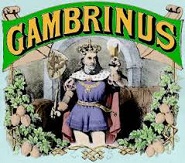

1294 On Feb. 18 Chinese Mongol emperor #1 (since Dec. 18, 1271) Kublai Khan (b. 1214) dies after killing 18M Chinese, and on May 10 he is succeeded by his grandson Temur Oljeitu (1265-1307) as Yuan emperor #2 of China (until Feb. 10, 1307). On July 5 after sending the cardinals assembled in Perugia since Apr. 1292 a letter warning them of divine vengeance if they don't quickly elect a new pope, causing Latino Malabranca, dean of the College of Cardinals to elect him, Benedictine hermit Pietro Di Murrone (da Morrone) is dragged from the wilderness by a deputation of cardinals accompanied by the kings of Naples and Hungary, and on Aug. 29 is elected Pope (#191) (St.) Celestine V (1215-96) in Aquila, becoming the last non-conclave pope, and the last Celestine until ?; after a series of simple-minded screwups he does the unprecedented and abdicates on Dec. 13 (after 5 mo. 8 days) after ordering the shutting of cardinals in a conclave to elect future popes, and declaring the right of a pope to abdicate; 11 days later (Dec. 24) Benedetto Gaetani (Caetani) is elected Pope (#192) Boniface VIII (1235-1303), promptly annulling his predecessor's work, then imprisoning and finally murdering him on May 19, 1296 by starvation and disease in Fumone Castle near Ferentino in Campagna; an alleged gay atheist with numerous lovers, Boneface the Eight's papacy marks the beginning of the decline of the Church's medieval power and glory in the face of the rising European kingdoms after he gets into a death struggle with Philip IV the Fair of France over who's boss, and gets too big for his holy britches? How many days of nonstop horror that will leave your head spinning? In the fall Madog ap Llywelyn (-1313), a distant relation of Llywelyn ap Gruffudd becomes the last native prince of Wales, beginning a revolt in what's left of N and W Wales after the stankin' English impose a one-fifteenth tax on all moveables, and it spreads to S Wales; Morlais Castle is captured, and half of the town of Caerphilly is burnt, but super-fortress Caerphilly Castle holds out; Harlech Castle is sieged, and defended by just 37 men; Conwy Castle is sieged with Edward I Longshanks leading the defense until his navy relieves him next year. Is this the beginning or is this the end, when will I see you again? Philip IV announces a war levy on the clergy, and when they balk he begins a violent anti-papal pamphlet campaign, debasing the currency to finance the war; meanwhile in the summer Edward I demands that King John I Balliol supply Scottish soldiers for his war on France; although he is ready to do it, the nobles balk, and set up a council of 12 magnates (ecclesiastics and nobles) to rule in his place but in his name, and it declares estates held by Englishmen in Scotland forfeited; the Welsh see their chance, unite and revolt, causing Edward to waste a year on them, while depleting his French expedition of troops. Count Guy of Flanders arranges a marriage between his daughter Philippa and Prince Edward of Wales, causing Philip IV to imprison Guy and two of his sons until he calls off the marriage, imprisoning Philippa in Paris until her death in 1306. Hetum II the One-Eyed regains the throne of Lesser Armenia (until 1294). The Hanseatic cities recognize Lubeck as their leading member. Ethiopian emperor (since 1285) Yagbe'u Seyon dies, and decides that his sons will rule in turn for one year each (until 1299). After squandering his predecessors' fortune, Persian khan Gaykhatu deals with a massive rinderpest epidemic by printing paper fiat money, which becomes a total failure and causes economic chaos, causing him to be deposed and executed next year. Charles of Anjou visits Florence, and Dante is among his escorts. England establishes four circuits for assizes, reorganizing them in 1328 into six circuits. The first known accusation in Spain of a ritual crime by Jews is made in Zaragoza. Yew wood first begins to be imported for bowstaves after the local supplies are depleted. Architecture: The red brick Bad Doberan Minster in Munich, Germany is built. Births: French duke of Burgundy (1306-15) Hugh V (d. 1315); eldest son of Robert II (1248-1306) and Agnes of France (1260-1327); brother of Eudes IV (1295-1350); maternal grandson of Louis IX and Marguerite Berenger. French Capetian king (1316-22) (founder of the French House of Burgundy) Philip V (the Tall) (d. 1322); son of Philip IV and Jeanne of Navarre; brother of Louis X; uncle of John I; founds the French House of Burgundy through his wife Jeanne of Burgundy, their daughter Jeanne and her hubby Eudes IV of Burgundy, and their son Philip of Burgundy; founds the French House of Flanders through his wife Jeanne of Burgundy, their daughter Margaret, her hubby Louis II of Flanders, and their son Louis III of Flanders. Italian marquess of Ferrara (1317-52) Obizzo III d'Este, Marquis of Ferrara (d. 1352) on July 14; son of Aldobrandoni III d'Este (-1326) and Alda Rangoni; father of Niccolo II d'Este (1338-88) and Alberto V d'Este (1347-93). Deaths: English scientist-friar Roger Bacon (b. 1214) in Oxford; buried in Grey Friars' Church: "Mathematics is the gate and key of the sciences... Neglect of mathematics works injury to all knowledge, since he who is ignorant of it cannot know the other sciences of the things of this world"; "If in other sciences we should arrive at certainty without doubt and truth without error, it behooves us to place the foundations of knowledge in mathematics"; "Reasoning draws a conclusion, but does not make the conclusion certain, unless the mind discovers it by the path of experience... Argument is conclusive... but... it does not remove doubt , so that the mind may never rest in the sure knowledge of the truth , unless it finds it by the method of experiment." Mongol emperor (1260-94) Kublai Khan (b. 1215) on Feb. 18. Baghdad musician Safi al-Din al-Urmawi (b. 1216); leaves Al-Adwar, a treatise on musical theory. Italian poet Brunetto Latini (b. 1220). Chinese-born Nestorian monk Rabban Bar Sauma (b. 1220) in Baghdad; leaves The History of the Life and Travels of Rabban Bar Sauma. Russian grand prince Dmitry Alexandrovich (b. 1250). Belgian duke of Brabant (1267-94) John I the Victorious (b. 1252) on May 3; dies after being made an honorary member of the brewers' guild in Brussels, possibly spawning the legendary hero Gambrinus (Jan Primus) (named after Gambrivium AKA Hamburg?), alleged inventor of and patron saint of beer; either him or Duke John I the Fearless of Burgundy (1371-1419). Ethiopian emperor (1285-94) Yagbe'u Seyon (b. ?).





1295 On Mar. 5 the Welsh Revolt (begun 1294) is crushed at the Battle of Maes Moydog after they do a Sir William Wallace and use the schiltron, only to be showered with arrows; Madog, who had declared himself prince of Wales is captured in early Aug. by John de Havering, and taken to London, but supposedly not executed; Edward imposes humiliating laws on the Welsh kicking the Celtic dogs down William-the-Conqueror-style. On Apr. 1 Robert Bruce the 5th (b. 1215) (original claimant of 1290) dies, and on Apr. 3 his son Robert Bruce the 6th, 2nd earl of Carrick resigns his earldom to his 18-y.-o. son Robert Bruce the 7th (future Robert I), and goes on an extended tour of the Holy Land. On Apr. 25 king (since Apr. 4, 1284) Sancho IV the Brave (b. 1258) dies in Toledo, and his son Ferdinand IV (the Summoned) (Emplazado) (1285-1312) becomes king of Castile and Leon (until Sept. 7, 1312), going on to face violent attacks by his nobles and hide behind his regent mother Maria de Molina (1265-1321) as well as the citizens of Avila, who give him refuge behind their walls; even then, he proves a weak ruler, ungrateful even to his momma. On June 20 Pope Boniface VIII ratifies the Treaty of Anagni, confirming the 1291 Treaty of Tarascon; James II of Aragon agrees to surrender Sicily to Charles II, and grants him Sardinia and Corsica in compensation; Aragon returns the Balearic Islands to James II of Majorca. On Sept. 8 Russian hunters from Rylsk discover the sacred Root Icon of Kursk near the Tartar-ruined city of Kursk. In Dec. Cambro-Norman judge Sir John Wogan (de Wogan), Lord of Picton (-1321) becomes Norman justiciar of Ireland based in Dublin (until 1313), immediately arranging a short truce in the Burke-Geraldine feud, suppressing the Knights Templars based in Kilmainham in Feb. 1308 under orders of Edward II, and holding three Parliaments in Kilkenny (1297, 1307, 1310); in 1307 it decrees that Irish cannot join Anglo-Irish religious houses; in 1310 the first elected representatives of cities and boroughs are summoned, as well as lay and spiritual peers and elected knights of the shire representing the counties and Liberties; no Irish are allowed until 1541. At the urging of the Committee of Twelve, King John Balliol ignores a summons to attend Edward I, and instead the Scots and the French sign the Auld Alliance, one of the world's first mutual defense treaties, which lasts almost three cents., with France agreeing to invade England if England invades Scotland; France excludes English ships from its ports - Scotland becomes the Cuba of the 14th-16th cents.? Przemyslav II (d. 1296) is crowned king of Poland in Gniezno with the pope's consent, becoming the first coronation in almost 200 years; he establishes the crowned white eagle as the royal emblem. Edward I subdues the Welsh, and their incorporation into England is complete - you're next, Scotland? Strapped for funds, and knowing better after what they did to his grandfather King John than to try taxation without representation, Edward I summons the Model Parliament, with the soundbyte: "What touches all should be approved by all, and... common dangers should be met by measures agreed upon in common"; it becomes the first to incl. reps. from outside the clergy and aristocracy, consisting of the Great Council, plus two burgesses "from every city, borough, and leading town"; the knights of the shire deliberate with the barons, while the burgesses and clergy act by themselves in meetings to grant money, although the clerics sit apart and usually refuse to vote for taxes except in their provincial assemblies, pissing-off Edward I; the principle is established that only Parliament can abrogate its own statutes. Edward I's 24th Statute of 1295 forbids the "degenerate English in Ireland" from imitating the native Irish "by allowing their hair to grow in coolins" (curls). Edward I directs his courts to hear no case in which a cleric is plaintiff, and to try every case in which one is a defendant. Byzantine Emperor Andronicus II shares his reign with his son Michael IX. Marco Polo, that Christian, he's a wuss? Gaykhatu is strangled by a bowstring to make it bloodless, and his Muslim cousin Baydu (Baidu) (-1295) becomes Mongol Ilkhanid khan #6 of Persia, becoming sympathetic to Christianity and permitting churches, but is assassinated near Tabriz on Oct. 4 by Hulagu's Christian-raised great-grandson (descendant of Mangu) Mahmud Ghazan (1271-1304), who becomes Mongol Ilkhanid khan #7 of Persia (until May 11, 1304), taking the title Yuan Chen Zong, Yuan emperor of China, converting to Sunni Islam and dumping Christianity because it is the "stronger" religion, making it the official religion and changing his name to Mahmud, although that doesn't stop his war with the Muslim Mamluks; with his grand vizier (1298-1318) (a Jewish physician who wisely converts to Islam) Rashid al-Din Hamadani (Tabib) (1247-1318) he attempts to reform the govt., stop overtaxation, restore agricultural land, and integrate the Mongols into the supremacist Islamic mindset, starting by showing them Islam's violent side by destroying Buddhist temples and going back to tried and true restrictions on the rights of pesky Christians and Jews. They'd seen his face before, nobody was sure? The three Polos return to Venice after 25 years, and are refused admittance to their own villa by their servants, who have given them up for dead; they host a banquet to convince doubters, producing their cool Tartar clothes, and producing showers of precious gems from their seams, which seals the deal, causing Marco Polo to become known as Marco Millions, and Venetian silk merchants to begin heading for Cathay along his route. Prophecies of the Castilian rabbis point to this year (5055 in the Jewish calendar) as the year of the Messiah's arrival, but sorry, he's a no show? Moscow becomes capital of the new principality of Moscow, and begins growing from a village to a sprawling city. Guelph-run Florence passes a law requiring any noble wanting a public office to first enrol in one of the "Corporazioni delle Arti de dei Mestieri" (Arts and Crafts Guilds), causing Dante Alighieri to join the apothecaries' guild, since books are sold at their shops. In exchange for releasing some tenements to the abbot and convent of Burton upon Trent, England, Matilda, daughter of Nicholas Shoben is granted a daily ration of two white loaves of breed, two gal. of beer, and one penny, plus seven more gal. of beer for her men; the monks of nearby Wetmore, Staffordshire discovered the superior quality of the water of Burton for brewing earlier in the cent. Inventions: Flavio Gioja of Amalfi, Italy invents the first practical compass using a copper bowl instead of wooden tub, dampening excessive oscillations. Art: Cimabue (1240-1302), Madonna with St. Francis (Assisi). Giotto (1267-1337), Marriage of St. Francis to Poverty; Glorification of St. Francis; Triumph of Obedience; Triumph of Chastity (all at Assisi) - Giotto loves his St. Francis of Assisi? Nonfiction: Anon., Codex Gigas (Giant Book); AKA the Devil's Bible; approx. 1m in length took 160+ animal skins to make it; created in the Benedictine Podlazice Monastery in Bohemia; supposedly produced by a monk in one night with the Devil's help during this cent., but really produced by a single monk over a 25-year period?; pawned to the Sedlec Monastery this year; contains the Vulgate Bible, Josephus' "Antiquities of the Jews" and "De Bello Iudaico", Isidore of Seville's "Etymologiae", Cosmas of Prague's "Chronicle of Bohemia", two books by Constantine the African et al., plus a full-page illustration of the Devil. Duns Scotus (1265-1308), Sententiae; tries to refine Thomas Aquinas' calculation of a just price, defending the role of mechants in transporting and facilitating goods; examines the issue of "mental content", the feature of mental acts in virtue of which each has the character it does qua mental act. Births: English heiress Elizabeth de Clare, 11th Lady of Clare (d. 1360) on Sept. 16 in Tewkesbury, Gloucestershire; daughter of Gilbert de Clare, 6th earl of Hertford and Joan of Acre; sister of Gilbert de Clare (-1314); wife (1308-) of John de Burgh (-1313), (1316) Theobald II de Verdun, and (1317-32) Sir Roger D'Amory. French duke of Brittany (1341-5) John (Yann) (Jean) IV of Montfort (d. 1345); son of Arthur II (1262-1312) and 2nd wife Yolande de Dreux (1265-1330). English chaplain (of Queen Philippa of Hainault) Robert de Eglesfield (d'Eglesfield) (d. 1349); founder of The Queen's College, Oxford U. (1341). French duke of Burgundy (1315-50) Eudes IV (d. 1350); 2nd son of Robert II and Agnes of France; brother of Hugh V (1294-1315). English champagne blonde queen consort (1308-27) (supermodel of the 14th cent.?) ("the She-Wolf of France") Isabella (Isabelle) of France (Provence) (d. 1358) in Paris; daughter of Philip IV Le Bel (1268-1314) and Jeanne of Navarre (1271-1305); wife (1308-27) of Edward II of England (1284-1327); lover of Roger Mortimer (1287-1330). Greek Byzantine theologian-historian-astronomer Nicephorus (Nicephoras) Gregoras (d. 1360) in Heraclea Pontica; grows up in Constantinople. English noblewoman Jeanne de Bar (d. 1361); niece of Edward II; granddaughter of Edward I; sister of Edouard de Bar (1302-36). Russian Orthodox metropolitan (1354-78) (St.) Alexius (Elephtherios) (d. 1378) in Moscow; feast day: Feb. 12. Deaths: Scottish noble Robert Bruce, 5th Lord of Annandale (b. 1220) on Mar. 31 in Lochmaben Castle. French queen consort (1234-70) Margaret of Provence (b. 1221) on Dec. 20 in Paris. Dutch poet Jacob van Maertant (b. 1235). English soldier Sir Gilbert "the Red Earl" de Clare (b. 1243) on Dec. 7 in Monmouthshire; his cagey widow Joan of Acre keeps control of his estates despite the efforts of her daddy Edward I, and secretly marries nobody knight Ralph Monthermer in 1297, pissing him off. Spanish king of Castile and Leon (1284-95) Sancho IV the Brave (b. 1258) on Apr. 25 in Toledo.




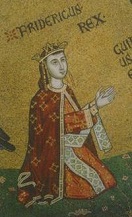

1296 On Feb. 8 Przemsylav (b. 1257) II is kidnapped and murdered by the men working for the electors of Brandenburg, and Wladyslaw (Vladislav) (Ladislas) I Lokietek (the Short) (Elbow-High) (1261-1333) proclaims himself king of the 1-y.-o. revived kingdom of Poland, establishing himself in Lesser Poland and Pomeriania, while Wenceslaus II of Bohemia claims overlordship and vies for the crown (by 1300). On Mar. 25 after the Sicilians revolt and offer the crown to James II's young brother Frederick, he is crowned king Frederick II (III) of Sicily (1272-1337) (technically II but uses III?) (until June 25, 1337), separating Sicily from Aragon under a rival branch of the Aragonese Dynasty for more than a cent. (until 1412); the pissed-off pope excommunicates him, and a war begins. On Mar. 26 the First Scottish War of Independence (ends May 1, 1328) begins after English under Edward I sack the Scottish main port of Berwick-upon-Tweed on the Scottish-English border, and massacre 8K, declaring it a free borough ("county of itself"), pissing-off the Scots (it takes until 1318 to get it back), and on Apr. 5 King John I Balliol renounces his fealty to England and holes up in Berwick Castle, with forces commanded by Sir William the Hardy (le Hardi) of Douglas (1255-98), which is taken by Edward I, with Douglas captured and imprisoned; Sir John Wogan (de Wogan), Lord of Picton (-1321), Norman justiciar of Ireland (since 1295) organizes a force with Richard Og de Burgh, 2nd Earl of Ulster, Theobald Butler, and John FitzGerald, 1st Earl of Kildare to assist English king Edward I Longshanks in his war against the pesky Scots; on Apr. 27 the English, led by John de Warenne, 8th Earl of Surrey (1286-1347) (Balliol's father-in-law) rout the Scots (who are not led by Balliol) at the First Battle of Dunbar (1489, 1650), where Robert Bruce the 8th obeys his father and sides with Edward I in hopes of receiving the kingship of Scotland as a vassal of the English crown; 10K Scots are KIA, and the Stone of Scone is taken to Westminster Abbey and placed under the coronation chair (until 1996) (where English monarchs can fart on it to show what they think of Scottish independence?); Sir William Sinclair of Rosslyn is captured, and ends up dying in the Tower of London, and his son Henry is also captured and imprisoned in St. Briavels Castle; Dundee Castle is taken and garrisoned by English troops; Roxburgh Castle on the Scottish borders, residence of the Scottish kings since David I in 1128 is captured by the English, and goes on to change hands repeatedly until it is destroyed in 1460; on Aug. 22 Edward I appoints John de Warenne "warden of the kingdom and land of Scotland", soon claiming that the Scottish climate is bad for his health and returnin S to England, only to be called back next spring and returning after intially refusing; Sir Hugh de Cressingham (-1297) becomes treasurer of the English admin. in Scotland, and advisor to John de Warenne, becoming hated by the Scots while the English don't like him either; on July 7 after fleeing NE, John Balliol surrenders in Montrose, is taken W to Stracathro, stripped of his royal vestments and forced to denounce his French alliance, then forced to renounce his kingship on July 10 at Brechin; in Aug. he is again ceremonially stripped of his royal regalia by Edward I and made to pay homage to him in his underwear (white shirt and underpants) (hence the nickname Toom Tabard or empty coat), and held in the Tower of London along with his son Edward Balliol; Robert the Bruce requests the kingship of Scotland from Edward I, and is turned down; Scottish landowners are forced to sign the Ragman Rolls, swearing allegiance to Edward I, although many refuse and become rebels, running to the highlands with weapons made out of farm implements; Douglas is released and his estates restored, then joins William Wallace's revolt, is captured again, and dies in the Tower of London in 1298; three English commissioners are appointed by Edward to rule Scotland in his name, but they fail to move against the rebels and alienate everybody; English troops garrison Edinburgh castle (until 1313); English abuses of the Scots, esp. Prima Nocta (Ius Primae Noctis) (Lat. "first night") (first knockup?) AKA Droit du seigneur ("right of the lord") arouse bitter animosity, causing highland revolts by ballsy knight Andrew de Moray (Murray) (1270-97) et al. - just when the Scots are about to wink out, a hero arises and teaches them how to fight for their free-ee-ee-dom? On May 19 Pope (since 1294) Celestine V (b. 1215) dies. On July 20 Sultan Jalaluddin of Delhi is murdered, and is succeeded by Alauddin (Ala ud-din) (Juna Muhammad) Khilji (-1316) as sultan #2 of the Khilji Dynasty of Delhi, becoming one of its most powerful rulers. An English expedition launched against France is undersized and makes little headway, and Edward I goes too far in trying to force the nobility to give money to finance all his wars, causing them to arm themselves against him, but Edward I backs down, and instead squeezes the Church, but Canterbury archbishop (since 1294) Robert Winchelsey (Winchelsea) (1245-1313) tells him to stuff it, and appeals to Pope Boniface VIII, who on Feb. 5 issues the bull Clericis Laicos, which begins "Antiquity reports that laymen are exceedingly hostile to the clergy, and our experience certainly shows this to be true at present", forbidding the clergy of any country (esp. pesky France and England) from paying taxes to lay rulers without his permission; when the English clergy refuse a royal demand for a fifth, Edward I, backed by public opinion outlaws them and withdraws the protection of the royal courts, bringing them to their knees until they get around the bull by giving the crown "presents", while the recalcitrant ones get their lands and manors seized; Philip IV retaliates against the bull by forbidding export of precious metals, threatening papal finances, and waging a propaganda campaign; the pope soon caves in and modifies his bull sheet to permit clergy to pay a tax to a lay ruler in case of an "emergency", practically annulling it - what happened to founder Jesus Christ and his story of the rich man's chances of going to heaven? Count Guy of Flanders is summoned before Philip IV again, and the principal cities of Flanders are taken under royal protection until Guy pays an indemnity and surrenders his territories, to hold them at the grace of the king. Hetum II the One-Eyed is deposed, and Smbat (Sambat) (Sempad) (Smpad) (1277-1310), son of Leo II and Kyranna de Lampron becomes king of Lesser Armenia (until 1298). Architecture: Florence Cathedral is begun by Arnolfo di Cambio. Science: William of St. Cloud complains that astronomers are spending too much time on reading and philosophy instead of observation. Births: Scottish high steward #6 Walter Stewart (d. 1327); son of James Stewart, 5th high steward and Giles (Egidia) de Burgh, daughter of Walter de Burgh, 1st earl of Ulster. Bohemian king (1311-46) (blind) John of Luxembourg (d. 1346); son of HRE Henry VII (1275-1313); father of HRE Charles IV of Luxembourg (1316-78). Greek Orthodox Hesychast theologian monk (St.) Gregory Palamas (d. 1359) (d. 1357?) in Constantinople; feast day: Nov. 14. Lithuanian grand duke (1345-77) (pagan) Olgerd (Algirdas) (d. 1377); one of seven sons of Gediminas (1275-1341); brother of Kestutis (1297-1382); father of Wladyslaw II Jagiello (1362-1434). Deaths: Italian pope (1294) Celestine V (b. 1215) on May 19 in Fumone Castle, Campagna; canonized in 1313; in 2013 his remains are examined, and murder by head trauma is ruled out. English prince Edmund Crouchback, 1st earl of Lancaster (b. 1245) on June 5 in Bayonne, France; buried in Westminster Abbey.
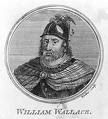



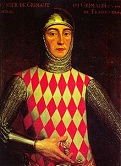
1297 French Franciscan monk Petrus Iohannis Olivi (1247-98) predicts the imminent coming of the Antichrist between 1300 and 1340, followed by the Age of the Holy Spirit, which will end around the year 2000 with Gog and the Last Judgment. On Jan. 8 after being expelled from Genoa and taking refuge in Provence last year, the Guelphs (incl. sword-brandishing monks) led by Francois (Francesco) Grimaldi (-1309) (nicknamed Il Malizia = the Cunning) take the fortress of the Rock of Monaco (Gr. "monoikos" = single house, supposedly because Hercules kicked out all the other gods, and a temple to him alone was erected there) after dressing as a Franciscan friar to gain entrance, founding the House of Grimaldi; the royal motto becomes "Deo Juvante" (With God's Help); his cousin and stepson Rainier I (1267-1314) assists him also disguised as a friar, and later succeeds him. In the spring the Franco-Flemish War (ends 1305) begins when Edward I invades N France with a large force in alliance with Count Guy of Flanders, who hopes to get revenge on Philip IV, to which Philip responds by declaring Flanders annexed to the royal domain, on Aug. 20 the Battle of Furnes (Veurne) sees Guy defeated by Robert II of Artois, causing Edward Ito make peace with Philip next year and leave Guy in the lurch; Count Walram of Julich (Jülich) (b. 1240) is brutally murdered by the French after surrendering, pissing-off the Flemish, who get even at the Battle of the Golden Spurs in 1302; meanwhile Edward leaves John Warenne, earl of Surrey as his gen. in charge of Scotland, giving William Wallace a free hand to attack the English; in May Wallace's new wife Marian Braidfoot (Braidfute) (Murron MacClannough in the "Braveheart" flick), whom he just married in the St. Kentigern Church in Lanark in S Scotland is executed under orders of Lanark sheriff Sir William de Hazelrig, pissing-off Wallace bigtime and causing him to attack the Lanarck garrison and kill Hazelrig; Wallace, who has killed an English sheriff and is now a big rebel attracts many followers, then attempts to surprise the English judiciar at Scone, and holes up with a large force in Selkirk Forest while Robert the Bruce, after conferring with Bishop Robert Wishart of Glasgow and Wallace's daddy's liege lord James Stewart the High Steward of Scotland decides to help Wallace in the summer, in Balliol's name but really with himself in mind, claiming to "join my own people and the nation in which I was born", but on July 9 he and his nobles capitulate to the English at the Capitulation of Irvine in Ayrshire in SW Scotland, and are chastened but allowed to keep their lands; watching the *!?*! nobles sell-out just makes Wallace and Andrew Murray madder, and they take control of the rebel army and consolidate it. In May Pope Boniface VIII removes Cardinal Jacopo Colonna from the College of Cardinals after he disinherits his brothers Ottone, Matteo, and Landolfo and they appeal to him, and Jacopo refuses his orders to hand over the strongholds of Colonna, Palestrina, and other towns; he goes on to excommunicate him and his followers for four generations, causing Jacopo and the rest of the Colonna family to close ranks and declare that Boniface VIII had been elected illegally, causing the pope to strike back by appointing Landolfo as head of an army to crush them, which he does by the end of next year, causing the brothers to receive the Colonna lands and the bad side of the house to flee Italy. On Aug. 11 French king Louis IX (1214-70) is canonized by Pope Boniface VIII to smooth things over with Philip IV, but the truce only lasts until the papal jubilee of 1300 - fast-tracked? Here are Scotland's terms: Your commander will come out here and kiss his own arse, and then you stankin' English will lay down your weapons and march back to England, stopping at every village and hamlet along the way to apologize for a hundred years of rape and pillage, or or we'll slay every last one of you today, erin go bragh - oops? The 1995 Mel Gibson film Braveheart is moose hockey? On Sept. 11 (Sept. 19 Gregorian) (Thur.) after they retake Dundee Castle, the way-outnumbered Scots (nobles and commoners) under the leadership of oh-what-a-man 6'7" (6-6? 6-4? 5-10?) 25-y.-o. William Wallace (1272-1305) (carrying a 5'7" Claymore in a scabbard on his back?) and Andrew Murray (b. 1270) defeat the English army under John de Warenne, 6th Earl of Surrey (1231-1304) in the not-quite-sporting Battle of Stirling Bridge, "the gateway of the Highlands", originally deployed across the impassible Forth River at the end of a valley from Stirling Castle, catching the English marching single file on the bridge then trapping and cutting them in half before slaughtering them with their farm implements and an occasional stolen English weapon or family Claymore (which isn't okay according to the rules of chivalry, which say they must be allowed to set up on the field of battle first?); 5K English are KIA; Wallace has Warrene's back flayed and turns the skin into a souvenir; the Scots shout Alba go Bragh ("Scotland forever", a version of Erin go Bragh or Ireland/Freedom forever); (Erin Go Bragh - go over there baby an' take off your bra, Freedom Forever?); hated Sir Hugh de Cressingham is KIA, and his body is flayed and pieces distributed as souvenirs, with one choice head-to-foot cut used by Wallace as the baldrick (belt) for his sword; Andrew Murray is mortally wounded, leaving posth. son Sir Andrew Murray of Petty and Bothwell (1298-1338), and Wallace becomes sole rebel leader, and by the end of Oct. no English soldiers remain on Scottish soil; on Oct. 18 he invades Northumbria all the way to Durham County, never reaching York, but scaring Longshanks enough to make him swear to destroy Wallace completely; he then recrosses the Tweed River on Christmas; meanwhile Edward I is in Flanders fighting the French, causing him to begin negotiations with Philip IV to free him to kick their kilted butts ASAP; meanwhile after Edward I demands heavy taxes on personal property for the fourth consecutive year, and the barons and the higher clergy protest, along with the middle classes, a coalition led by Archbishop Winchelsea drafts the Confirmation of the Charters (Confirmatio Cartarum), the most important document since the 1215 Magna Charta, confirming it and other charters, with the provision that no non-feudal levy on personal property can be laid by the crown without a parliamentary grant "by the common assent of all the realm"; the English Parliament of the future is foreshadowed, along with the principle of no taxation without representation; too bad, Longshanks never actually grants the concession, leaving it to his son Edward II as regent, and Pope Clement V later frees Longshanks from his promise in exchange for the right to collect annates in England. Genoa and Venice begin a war over trade, and rich Marco Polo becomes a "gentleman commander" of a galley. After going to war in 1295, the Treaty of Alcanices (Alcañices) between King Denis of Portugal and Fernando IV of Castile sets their 754-mi. mutual border ("the Stripe") (La Raya) (A Raia) and establishes an alliance of friendship and mutual defense, leading to 40 years of peace; Fernando marries Denis' daughter Infanta Constance of Portugal, becoming the oldest uninterrupted border in the modern day European Union (EU); the border is undefined for 11 mi. between the Caia River and the Ribeira de Cuncos because of the disputed status of Olivenza/Olivenca; Couto Misto, tied to the House of Braganza and House of Monte-Rei remains disputed until 1868. The first representative Irish Parliament of the Lordship of Ireland meets in Dublin; in 1537 it is expanded to two chambers; it is abolished in 1800. The nobility of Hesbaye (Haspengouw) N of Liege on the Flanders border around Awans begin a 40-year feud which ruins the principality and destroys itself (ends 1335). William de Leyburn is appointed by Edward I as England's first admiral, a corruption of the Arabic term Amir al-Bahr (cmdr. of the sea); the office of Lord High Adm. of England (in charge of the Navy) gradually merges with it. The Seljuk Turks under bey (since 1280) Osman (Osmanli) (Othman) I Gazi ben Ertugrul (Kara) (the Black) (El-Bazi) (1258-1326) (black meaning he attained the highest degree of manly beauty, and and Osman meaning bone-breaker), whose father Ertugrul (-1280) was leader of the Turkic Kayi tribe, who fled from the Mongols W from C Asia to W Anatolia and pledged alliance to Seljuk Sultan Kayqubad I in return for a beylik overrun Bithynia on the S shores of the Black Sea, but cannot conquer all of the fortified cities. Science: The moas (giant giraffe birds) of New Zealand become extinct. Nonfiction: Arnold of Villanova (1238-1310), The Time of the Coming of the Antichrist; claims it will be 1378 - see the learning at leapfrog dot com? Births: Byzantine emperor (1328-41) Andronicus III Palaeologus (Andronikos III Palaiologos) (d. 1341) on Mar. 25 in Constantinople; son of Michael IX (1277-1320) and Princess Rita of Armenia (1278-1333) (daughter of Levon II). Lithuanian grand duke Kestutis (Kiejstut) (d. 1382); son of grand duke Gediminas (1275-1341); brother of Algirdas (1296-1377); uncle of Wladyslaw II Jagiello (1362-1434). Deaths: French bishop St. Louis of Toulouse (b. 1274) on Aug. 19 in Brignoles (typhoid?); dies 6 mo. after being appointed bishop on Feb. 5; canonized on Apr. 7, 1317 by Pope John XXII.


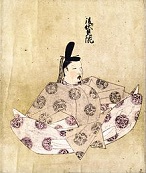

1298 In Mar. William Wallace is knighted by Robert Bruce the 8th in Tor Wood (Selkirk Forest), and elected guardian of Scotland ("governor of Scotland in name of King John") by the Scottish nobles; out of love of Scotland Wallace fights for the return of ineffective King John Balliol (Toom Tabard). In Mar. after ending the French-English Gascony War (begun 1293) with a truce with Philip IV the Fair of France negotiated by Pope Boniface VIII, requiring him to marry Marguerite of France in return for the key city of Guinne and £15K, Edward I Longshanks returns to England, immediately organizing an army to invade pesky Scotland, moving his govt. to York (until 1304); in Apr. a council of war is held, and when the Scottish magnates fail to appear they are declared to be traitors, and Edward I orders his army to assemble in Roxburgh on June 25, and assembles 28.8K men incl. 3K cavalry, 14.8K infantry, and 11K Welsh longbowmen, marching N in early July to take on pesky rebel Sir William Wallace and his ragtag Scots, who deprive them of provisions along the way by removing all food and pop., causing them to begin starving and rioting at Temple Liston near Edinburgh, ended by the English cavalry killing 80 drunken Welshmen; on July 22 after Edward I decides to fall back to Edinburgh then learns that Wallace is holed-up in Callendar Wood near Falkirk only 13 mi. away to harass their retreat, uttering the soundbyte: "As God lives... they need not pursue me, for I will meet them this day", the First Battle of Falkirk (AKA Eaglais Breac, from Gael. "church of speckled stone") (2nd in 1746) in Stirlingshire 3 mi. S of Grangemouth on the Firth of Forth (22 mi. NE of Glasgow) (near the ruins of the Antonine Wall) sees 6K pesky Scottish freedom fighters (incl. 1K cavalry) take on the stankin' English invaders despite being outnumbered almost 5-1; Robert the Bruce fights on Longshanks' side; Wallace introduces the Schiltron (Sheltron) (Shiltron) (Schiltrom) (Sceld-Trome) (shield wall), a phalanx of 12-ft. pikes ("twice as long as a man") to defend against the English heavy horse (actually a hedgehog of men carrying regular spears pointing outward in a circle, which were used in prior battles, and aren't that great, as horses aren't stupid enough to charge into them, they are too immoble, and missile fire can break them); despite positioning themselves in front of a heavy forest and in front of a marsh, the Scots are overwhelmed with numbers, and after the English longbows are finally brought into position to attack the schiltrons, they score the first great longbow V in warfare; after losing 2K and seeing 2K desert, Wallace escapes with his last 2K into the impenetrable Torwood Forest; the starving English lose 2K, the retreat to Carlisle, in which many desert causing Edward to disband his army and remain on the border until the end of the year, after which he returns to England, pissed off at his disloyal barons; Wallace is forced to resign as guardian of Scotland and flees to France to seek support from Philip IV the Fair and later the pope, becoming a hunted man until his last hurrah in 1305; right after the battle, Bruce (who may or may not have helped Wallace escape from the battlefield) revives his claim for the kingship, burning English-held Ayr Castle in Aug., pissing-off Edward I, who chases him into Carrick, where he goes into hiding after razing his own Turnberry Castle to the ground, then joins the patriotic rebel side in the name of King John Balliol, becoming joint guardian of Scotland with his cousin John III "the Red" Comyn, Lord of Badenoch (1270-1306), son of John II "Black" Comyn (a descendant of Donald Ban) and Eleanor Balliol (eldest daughter of King John Balliol), and husband of Joan de Valence, daughter of William de Valence (an uncle of Edward I), whose Celtic-Norman blood and marital connection makes him a leading candidate for Scottish king, pissing-off Robert the Bruce; meanwhile William (de) Lamberton (-1328) is appointed bishop of St. Andrews by the pope. On July 2 after Adolf of Nassau is dethroned by the electors, he is KIA in the decisive Battle of Gollheim (Göllheim) (Hasenbuhl) near Wurms, and Austrian duke Albert (Albrecht) I of Austria (1255-1308) (son of Rudolph I of Hapsburg) succeeds him as king of Germany and HRE. On Aug. 30 emperor (since Nov. 27, 1287) abdicates under the pressure of the shogunate, and his son Go-Fushimi (Fushimi II) (1288-1336) becomes Japanese Yamato emperor #93 (until Mar. 2, 1301). On Sept. 9 Genoa defeats Venice in the naval Battle of Curzola, causing weakened Venice to sign a treaty with the Turks next year; Genoan merchants and bankers begin to get respect. Smbat IV is deposed and imprisoned, and his brother Constantine (Constantin) I/III (1278-1310) becomes king of Lesser Armenia (until 1299). My mind's such a sweet thing, crimson and clover, over and over? Italian world traveler Marco Polo (1254-1324) is captured in battle and thrown in jail in Genoa, which gives him the leisure to write up his cool travels, and he begins dictating his memoirs to his cellmate, incl. a sherbet recipe brought home from Asia, finishing ca. 1300; it takes until 1447, but finally A Description of the Marvels of the World (The Travels of Marco Polo), AKA (by his many doubters) Il Milione (The Million Lies) (The Marco Millions) is pub.; it describes heating coal ("black stones"), oil lamps, asbestos, Chinese scholars wearing eyeglasses, crocodiles, yaks ("grunting oxen"), coconuts, how emperor Kublai Khan's harem is filled with 100 new concubines every two years by special emissaries, the Pacific Ocean, his route across the Asian continent and all the cool wonders and sights, the interior workings of unsaved China, everything except tea, foot binding, and the Great Wall of China?; on the other hand, he claims that a prince "sixth in descent from Prester John" rules a territory W of Peiping (Peking); although there really is a Kublai Khan who rules from Siberia to the Punjab, and he really did go away from age 17-40 and mainly tell it like it is, it takes cents. for him to be believed by members of the Holy Mother Church and its infallible Pope with a pipeline to Christ and God; the stories introduce Japan, Peking, Java, Sumatra, Siam, Burma, Ceylon, the Zanzibar Coast, Madagascar, and Abyssinia to the West, inspiring commerce and travel, and helping inspire Columbus. The entire Jewish pop. of Rottingen, Bavaria, Germany is burned to death after a charge of desecrating a consecrated host; pious Baron Rindfleisch leads an armed band of Roman Catholics to exterminate the Jewish pop. of Wurzburg, plus 698 in Nuremberg, wiping out 140 Jewish congregations in 6 mo. The first doctors of the Roman Catholic Church are named: St. Ambrose, St. Augstine, St. Jerome, and Pope St. Gregory I. Silver is discovered at Kutna Hora in C Bohemia, and Wenceslaus III makes it his royal monopoly, minting the Prague Groschen; between 1300 and 1340 the mine produces up to 20 tons of silver a year. Inventions: Song Dynasty Chinese writer Zhou Mi (1232-98) dies after writing Former Events in Wulin, containing the first mention of the game of Dominoes; in the early 18th cent. they spread to Italy; the name domino comes from a hood worn during the Venice carnival. Births: Austrian Hapsburg duke (1330-58) Albert II (the Wise) (the Lame) (d. 1358) on Dec. 12 in Hapsburg Castle; son of Albert I (1255-1308) and Elisabeth of Tirol (1262-1312); brother of Otto IV the Merry (1301-39); father of Leopold III (1351-86). English bishop of Norwich (1344-55) William Bateman (d. 1355); educated at Cambridge U. Deaths: Italian surgeon Theodoic Borgognoni (b. 1205) (d. 1296?). Italian historian Jacobus de Varagine (b. 1230) on July 13 (16?) in Genoa; leaves The Golden Legend, legendary lives of the saints, which becomes a Middle Ages bestseller. Thai ruler Ramkamhaeng of Sukothai (b. ?).
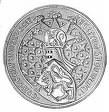



1299 On July 15 Eric II Magnusson (b. 1268) dies without an heir, and his brother Haakon V Magnusson (1270-1319) becomes the last Fairhair king of Norway (until 1319), going on to give preferential treatment to Hanseatic over English traders. Come fly with me, we'll fly away? On July 27 Osman (Osmanli) (Othman) I (the Black) (El-Bazi) (1258-1326) declares independence from the Seljuk Turks, becoming sultan #1 of the Sunni Muslim Ottoman Empire, which lasts until Mar. 3, 1924, calling himself bey not sultan; he is crowned by his blueblood Arab Banu Tamim father-in-law Sheikh Edebali (Baliseyh) (1258-1326) (who converted him to Islam?) with the Sword of Osman (Taklide-Seif), which becomes a custom, proclaiming them as warriors of Allah; he shows how Muslim he is by murdering his uncle at a council for opposing the forceful conquest of surrounding tribes; "If then such murderous slaughter of their kindred be reckoned by the panegyrists of Osmanlis among their praiseworthy acts, what are we to think of those which cannot be praised, and of which their history is therefore silent" (Edward Gibbon); since Ottoman sultans end up going on jihad virtually half of their careers, and have to guard the empire the rest of the time, they eventually decide to skip the Hajj. On Sept. 8 Edward I of England marries Marguerite (Margaret) of France (1279-1318), "the Pearl of France", who turns out to be a model queen, intervening several times to save people from her hubby's wrath, and pleasing him by joining him at the Scottish border a few mo. after he leaves (like his dead babe Eleanor of Castile would have done?); they go on to have three children, Thomas of Brotherton, 1st Earl of Norfolk (1300-38) (who joins Queen Isabelle's revolt against Edward III), Edmund of Woodstock, 1st Earl of Kent (1301-30) (who sides with Edward II against Isabelle and gets executed for it), and short-lived Eleanor of England (1306-10); meanwhile the Scots use Edward I's absence to recapture Stirling Castle, and Sir William Wallace goes to France to seek support for his cause; Bishop William Lamberton of St. Andrews is appointed the 3rd guardian of Scotland to balance Bruce and Comyn after they meet in the summer in Peebles and become violently divided when the Comyns accuse the Bruces of treason for wanting to dump Toom Tabard (King John I Balliol); in July after pressure from France and Scotland, Balliol is released from the Tower of London into papal custody, leaving for exile in Avignon, after which he never leaves France. On Nov. 10 John I (b. 1284) dies in Haarlem, and his son John II of Avesnes (1247-1304) becomes count of Holland (until Aug. 22, 1304). On Dec. 22-23 after the Mongols invade Syria again (last time 1281) with an army of 10K Mongols and 10K Georgians and Armenians, and cross the Euphrates River and seize Aleppo, they win the Third Battle of Homs (Wadi al-Khaznadar) against 60K-90K Mamluks from Damascus, whose banner features a Star and Crescent Moon, which is later erroneously claimed to be adopted by Muslims after taking Constantinople in 1453; the Mongols lose 5K-14K KIA, vs. 40K-50K Mamluks KIA, after which the Mamluks flee S towards Damascus while being harassed by 12K Marionite and Druz bowmen seeking independence, leaving after which the Mongols sack Damascus and seige the citadel until 1300, when they have to retreat across the Euphrates River to stop an invasion by the Chagatais, leaving the Christians briefly in control of Syria and Palestine until the Mamluks return - Merry Christmas? Al-Nasir Muhammad (1293-4) reascends the throne as sultan of the Mamluk Empire (until 1309). HRE Albert I allies with Philip IV of France. Constantin II is deposed and imprisoned, and his brother Hetum III the One-Eyed becomes king of Lesser Armenia for the 3rd and last time (until 1305). Wedem Arad (-1314), brother of Yegbe'u Seyon seizes power from his nephews and becomes Solomonic emperor of Ethiopia (until 1314); he then defuses a revolt led by Muslim sheik Abu-Abdallah by giving them land on the border of Shewa (modern-day Abdalla). After lobbying by abacists, a law is passed in Florence against using "newfangled figures" (Hindu numerals, the zero, decimals) to do accounting; Hindu numerals don't replace Roman numerals until the 16th cent. Sports: The earliest known bowling green to survive to modern times is the Master's Close (now the Old Bowling Green) in Southampton, England. Architecture: The Palazzo Vecchio (Old Palace) (originally the Palazzo della Signoria) (finished 1301) in Florence, Italy is begun on the site of the ruins of two palaces owned by the pesky rebel Uberti family, designed by architect Arnolfo di Cambio (1240-1310), who crowns it with the ancient La Vacca (The Cow) Tower of the Foraboschi family, which becomes the Torre d'Arnolfo, which in 1353 has a large 1-handed clock added by Nicolo Bernardo, and replaced in 1667 with a replica from Augsburg, Germany made by Georg Lederle and installed by Vincenzo Viviani; in May 1540 Duke Cosimo I de'Medici moves his official seat there, renaming it Palazzo Vecchio (Old Palace) after moving to Palazzo Pitti. Inventions: The Farolfi Ledger of Giovanno Farolfi & Co. of Florence becomes the first known double-entry bookkeeping ledger, allowing modern banking and capitalism to bloom in 14th cent. Italy. Births: Spanish king of Aragon and count of Barcelona (1327-36) Alfonso IV (the Kind) (d. 1336) on Nov. 2 in Naples; 2nd son of James II the Just (1267-1327) and Blanche of Anjou (1280-1310). Deaths: Norwegian king (1280-99) Eric II Magnusson (b. 1268) on July 15. Dutch count of Holland (1296-9) John I (b. 1284) on Nov. 10 in Haarlem (dysentery) (murdered?).